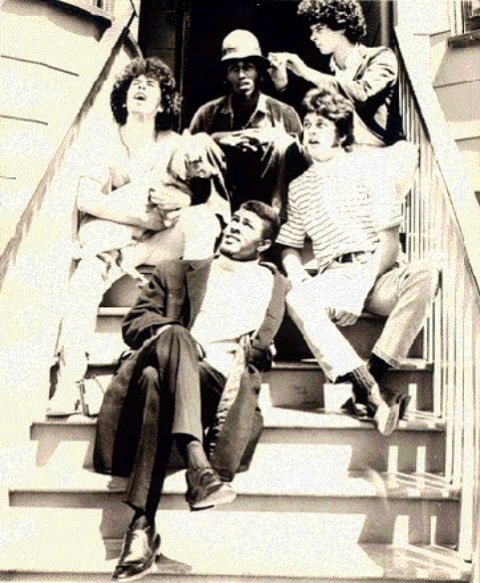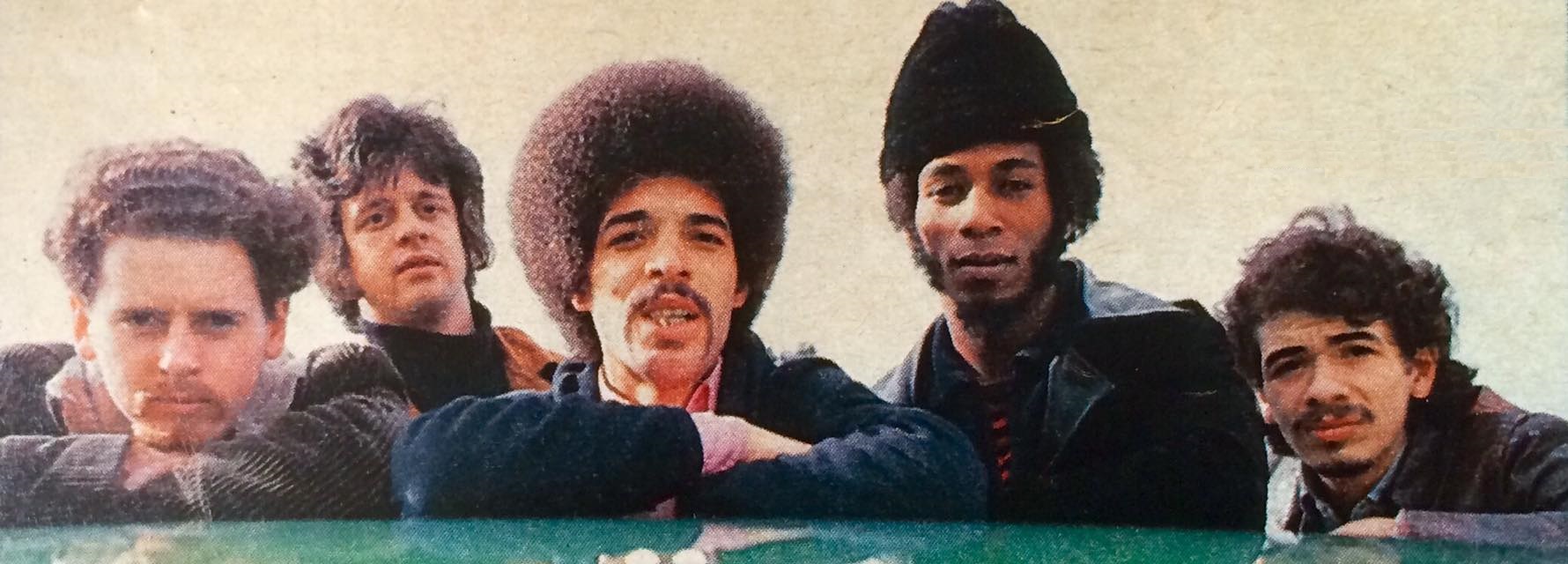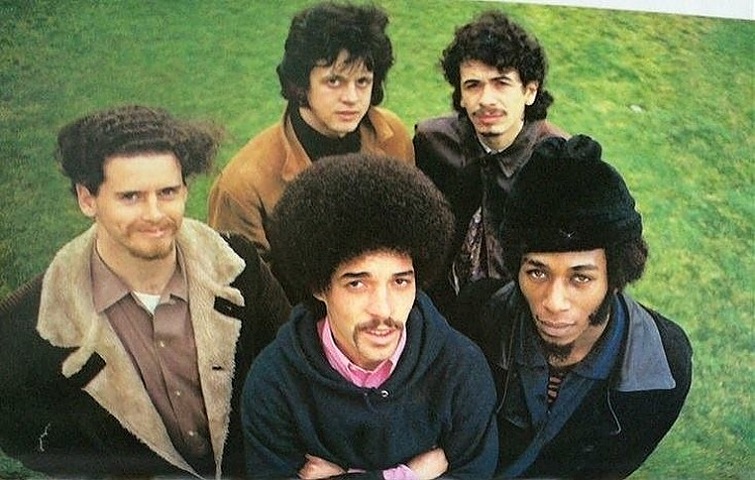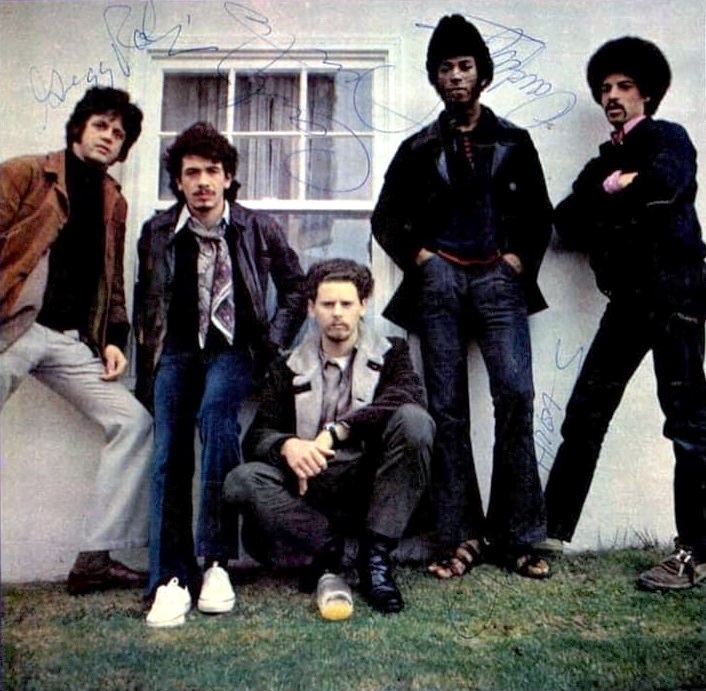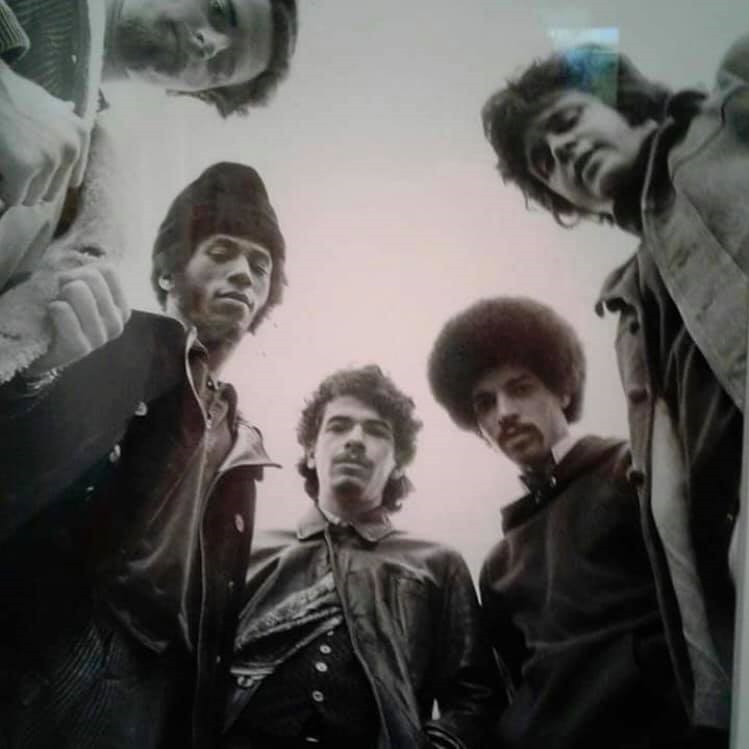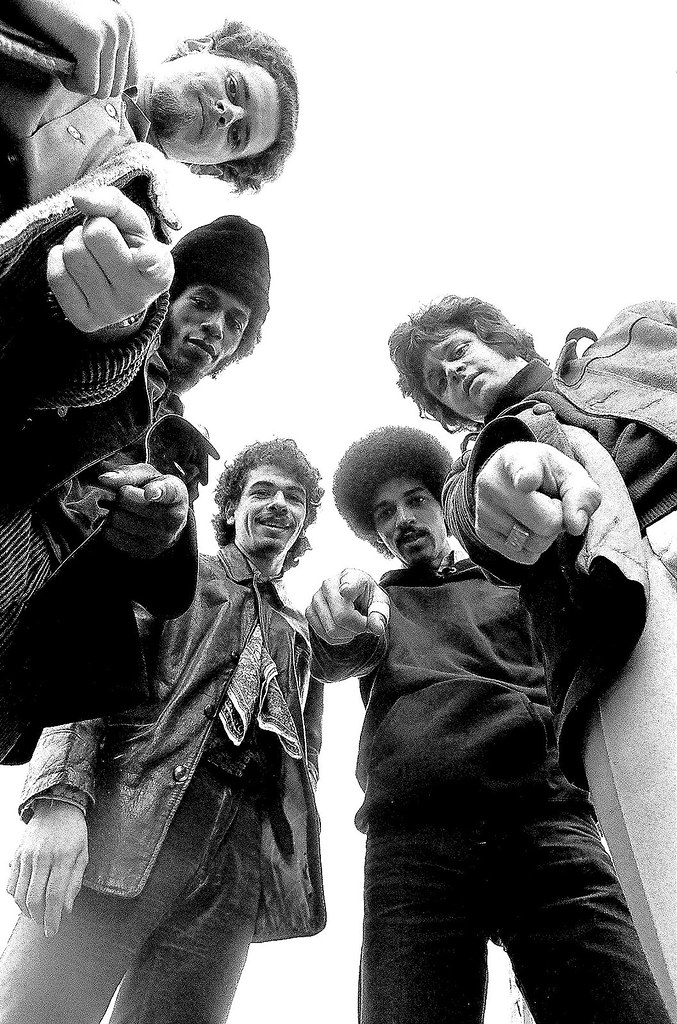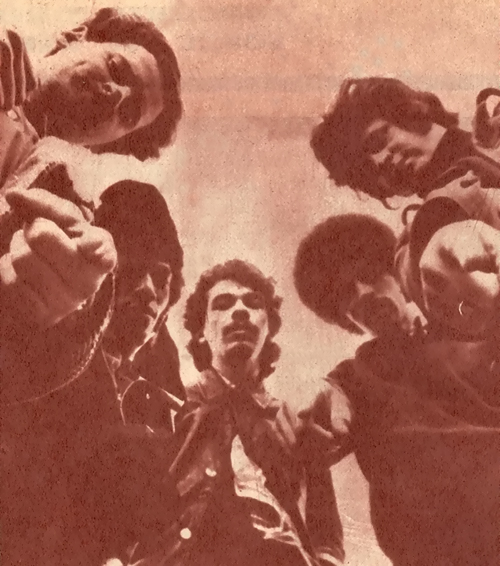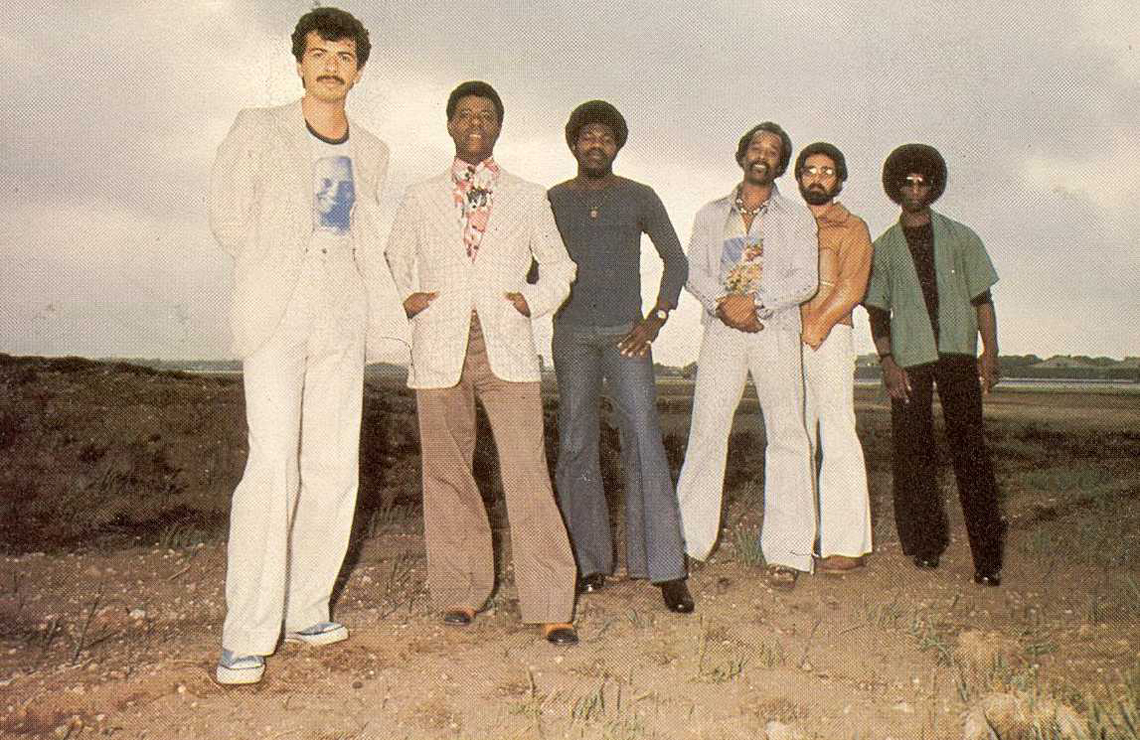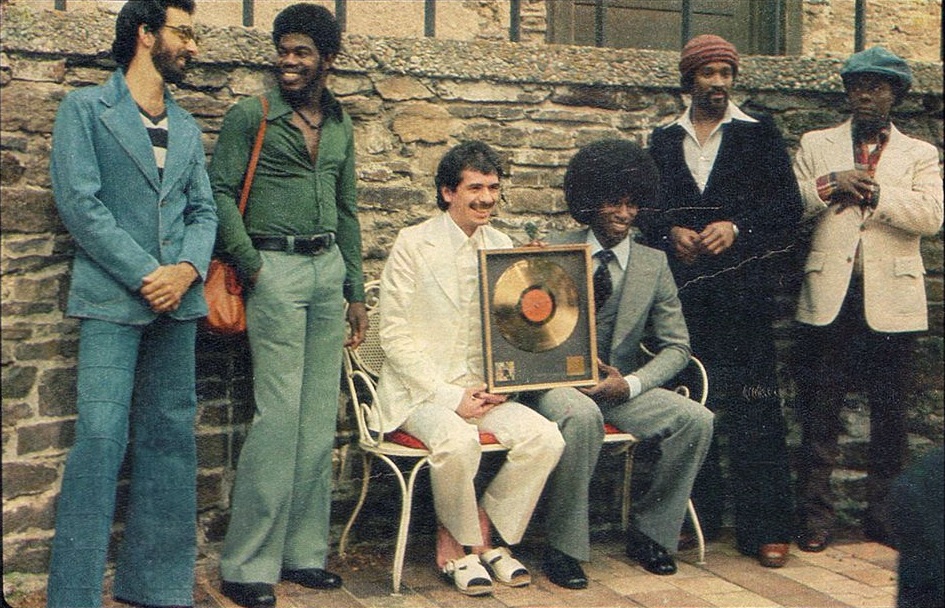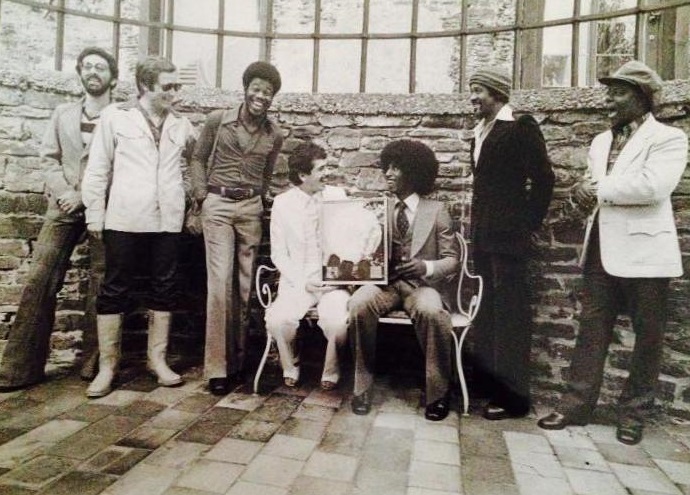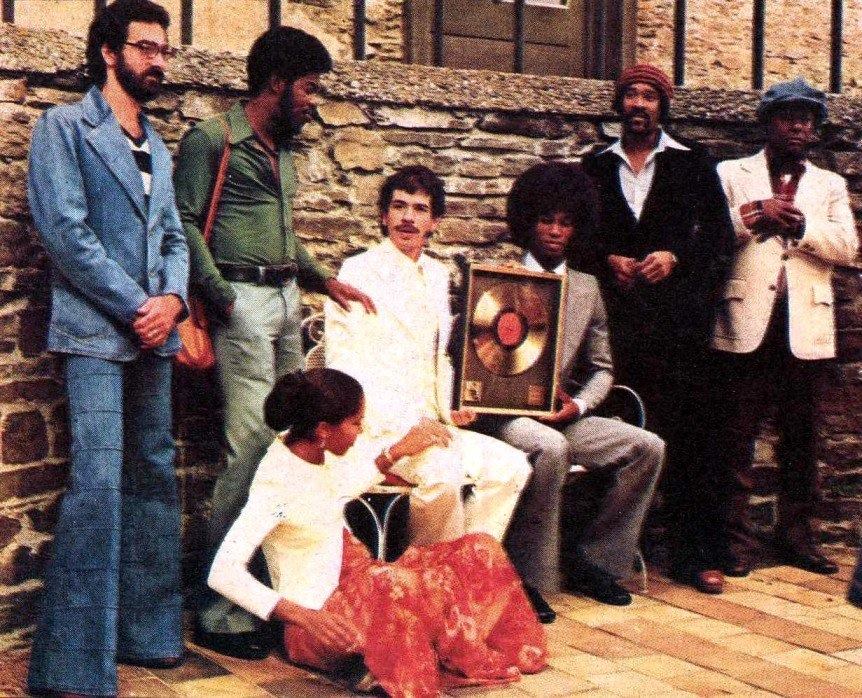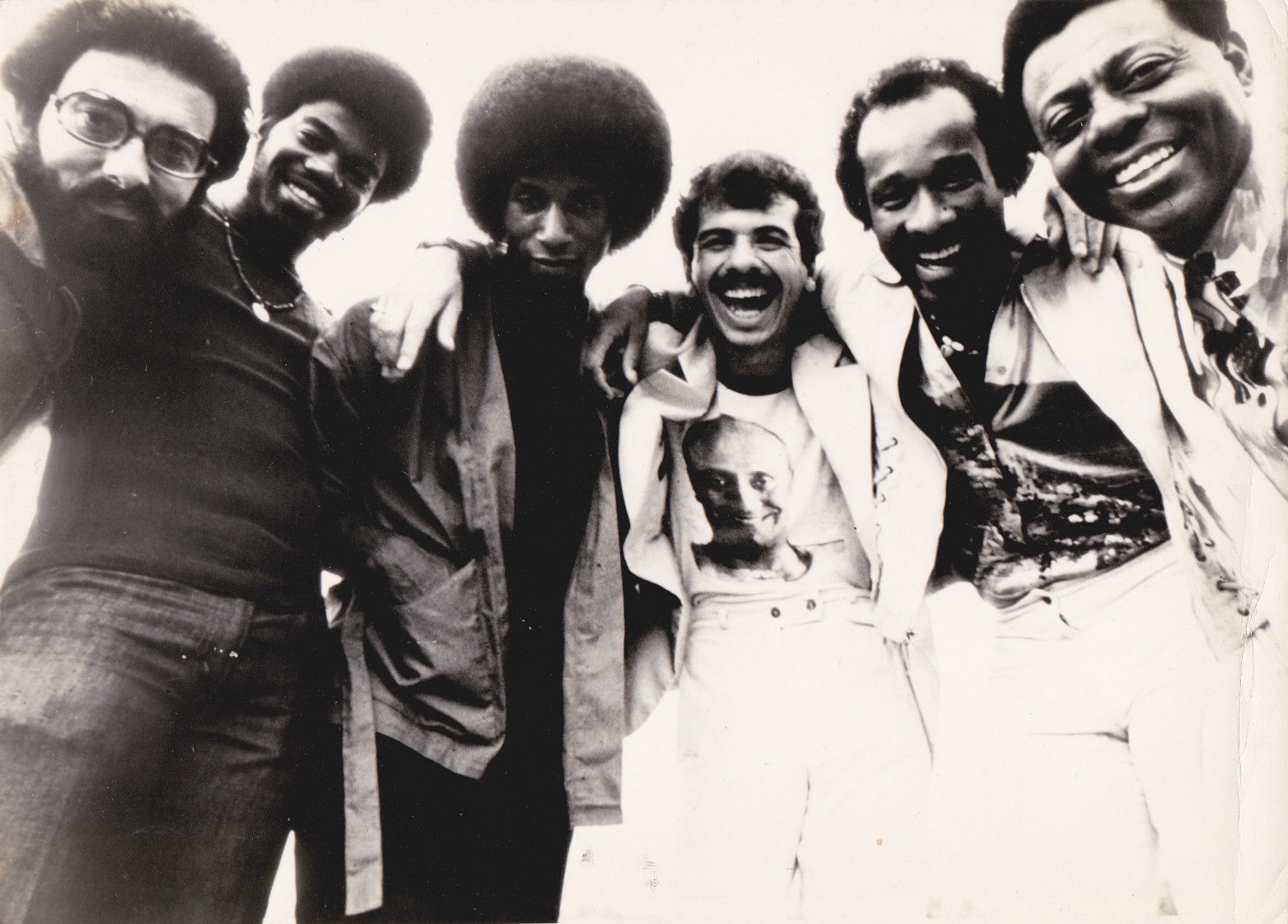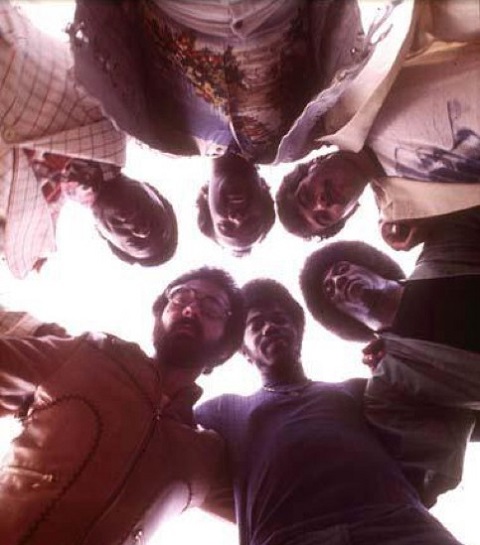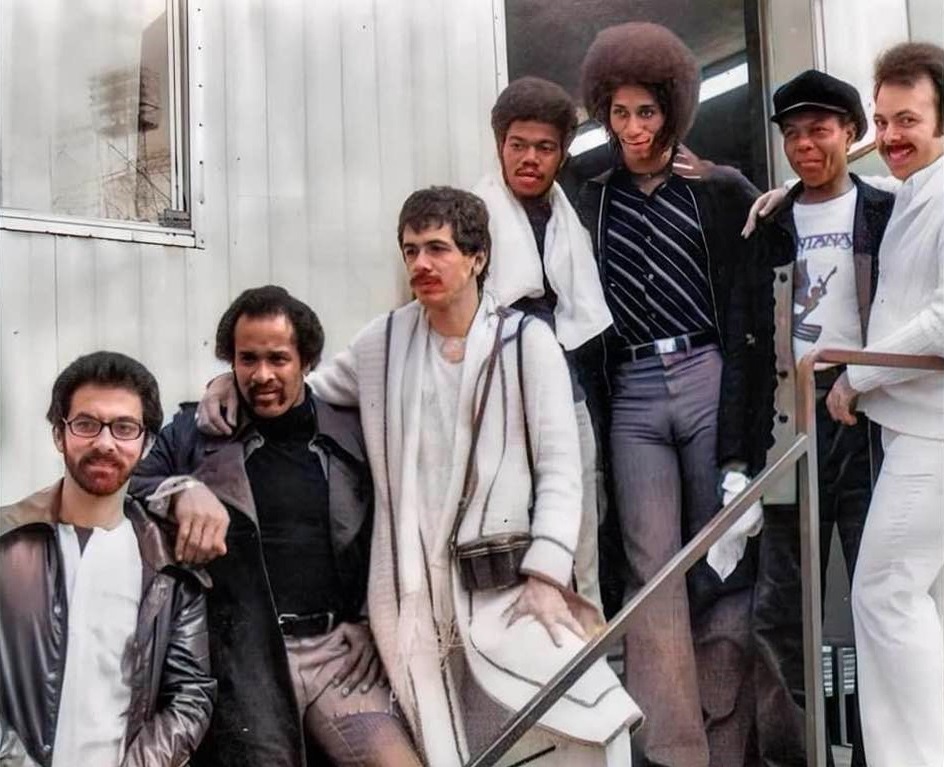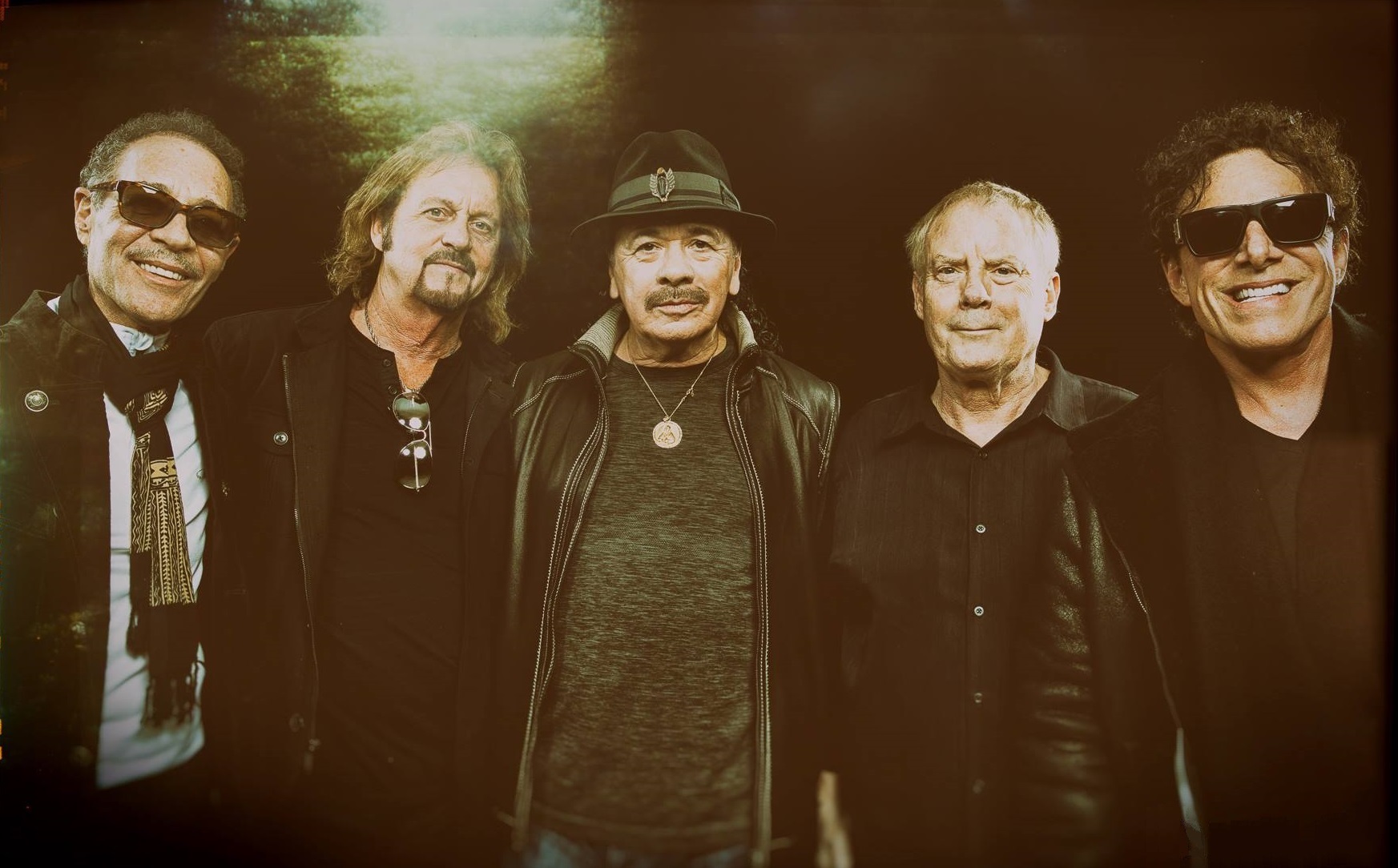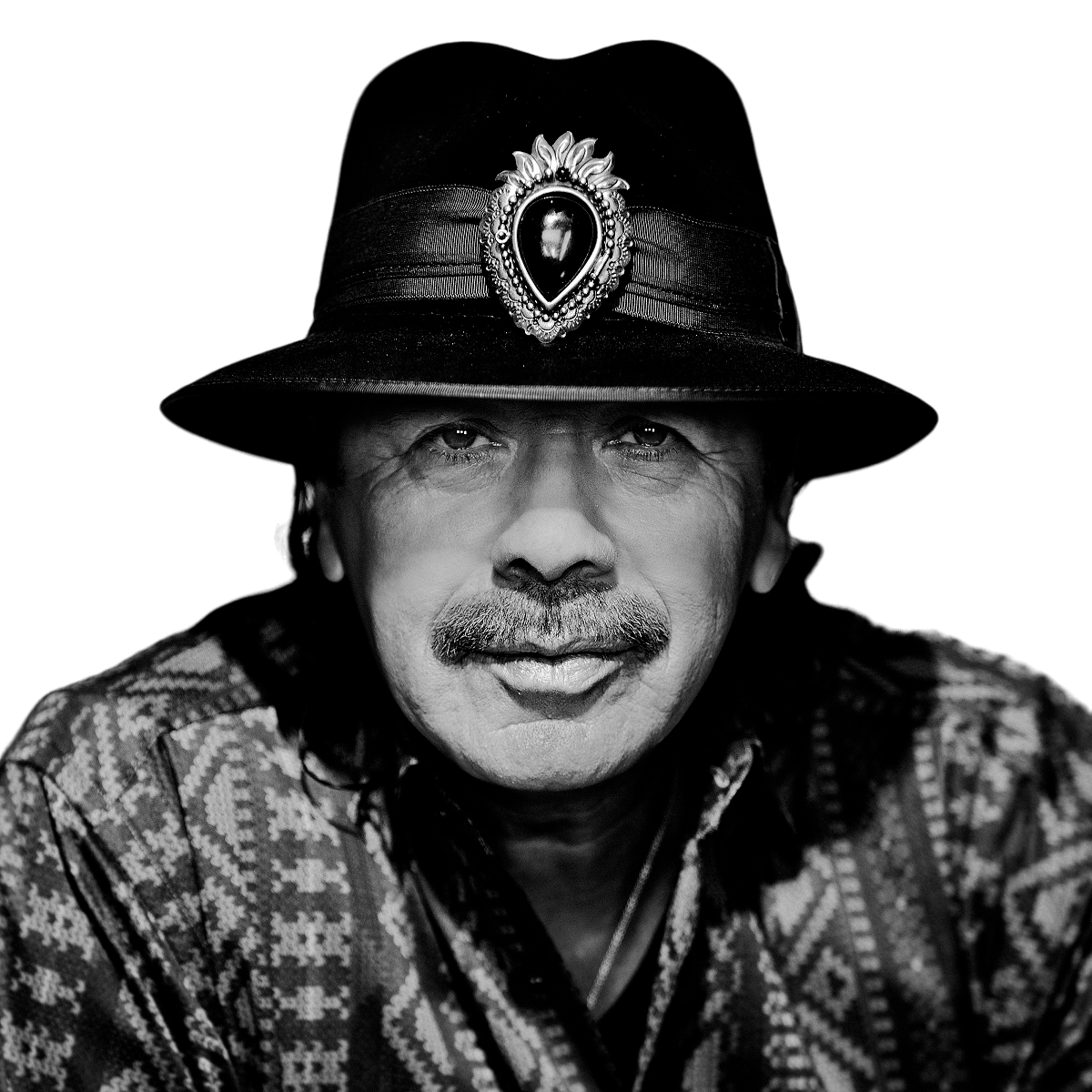|
|
|
|
|
|
"Mr. 50 cents a Song" Trio: 1957-1959
Carlos Santana (violin), ? (acoustic g), ? (acoustic g)
José Santana persuades his son to join two kids, and to play for money in the streets of Tijuana.
Quote from Carlos Santana (The Universal Tone 2014): Feeling the music was the first lesson, but money was a big part of it for my dad. He persuaded me to join up with two brothers who both played acoustic guitars, go out on the street, and make some money. I can’t remember their names, and we didn’t have a name for ourselves, but they were good. (…) We would walk up and down Avenida Revolucion, or take the bus to Tecate or Ensenada, and approach people.”Song mister? Fifty cents a song.” (…) We were good, and it was a good experience---my first band. (…) But one of the best lessons I learned from working with those two was how to carry a melody---how important that is on any instrument, an absolute must. (…) The other thing I got from playing with the brothers was confidence. I started to feel good about my playing and about doing it in public. My father saw this and started to enter me into little music contests around Tijuana. (…) Most of the time I competed with mariachi singers---but one time when I must have been thirteen or fourteen it ended up that my sister Irma and I were the only ones not eliminated at the end of a contest. (p60-61)
|
 |
| "Mr. 50 cents a Song" Trio. Carlos Santana (center) |
| Tijuana, Baja California, Mexico Aug 30, 1959 © Santana Archives |
|
|
|
|
|
Los Cardinales: 1957-1959
On various occasions, Carlos Santana sits in with his father’s mariachi band Los Cardinales.
Quote from Carlos Santana (The Universal Tone 2014): My dad knew his position, how to work hard. (…) Soon he had me playing with his band on some shows. (…) There’s a photo from around this time of my dad and me with a bunch of musicians, all dressed up. (…) I remember that the occasion was something like a twenty-fifth anniversary, a one-time thing, not a regular gig. We were playing waltzes and Italian ballads. (p63)
|
 |
| Los Cardinales. Carlos Santana (3rd from right) |
| Tijuana, Baja California, Mexico 1958 © Santana Archives |
|
|
|
|
|
The Strangers: 1961
Carlos "El Apache" Santana (b/g), Manuel Delgadillo (g), Antonio Vargas “El Bolas” (ds), Jorge Burgos (g), Bibi (g)
Carlos Santana plays bass and guitar with The Strangers. He also sits in at El Convoy.
Quote from Carlos Santana (The Universal Tone 2014): People began to hear that I could play. I sat in a few times with Javier and the TJs at El Convoy and started to meet other musicians and bands who played there, like The Strangers. The leader of the Strangers was Manuel Delgadillo. (…) At one point he needed a bass player, and he asked me if I wanted to give it a try. I already knew how to play violin, which also has four strings, so I was ready to do that. (…) Then we had our first gig---it was either the Aloha Club or Mike’s Bar---but we never got paid. (…) I continued to rehearse with the Strangers anyway, but every time we did someone would tell me that I played too many notes for a bass player---I was beating up Manuel! He decided to let me start playing guitar, and we kept rehearsing. Meanwhile, I was sitting in more at El Convoy, playing with their house band---not the TJs---and I started to get good at it. (…) The one thing I remember is that I was allowed to play the club’s guitar. (p80-81)
|
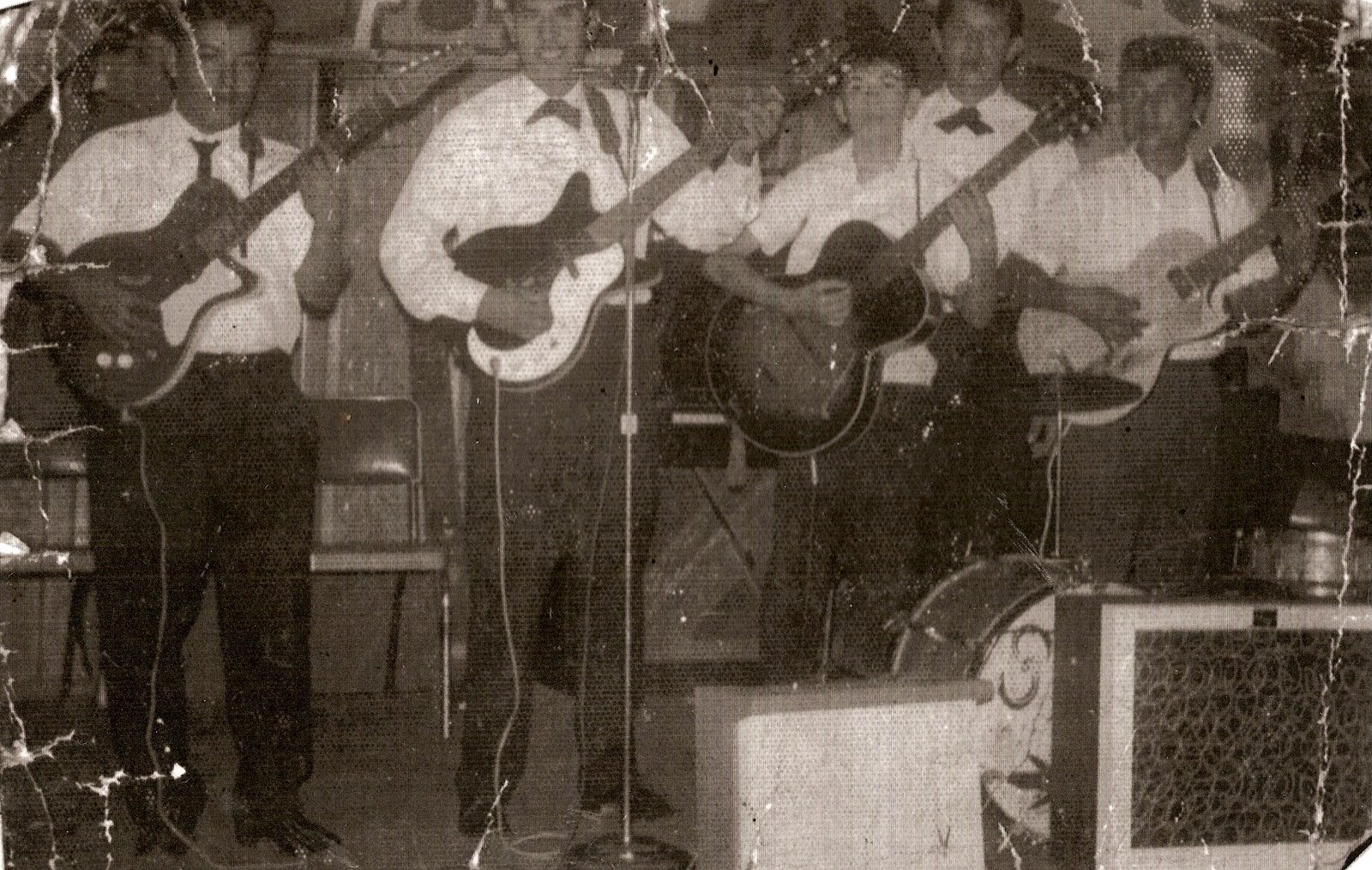 |
| The Strangers. Carlos Santana (3rd from right) |
| Tijuana, Baja California, Mexico 1961 |
|
|
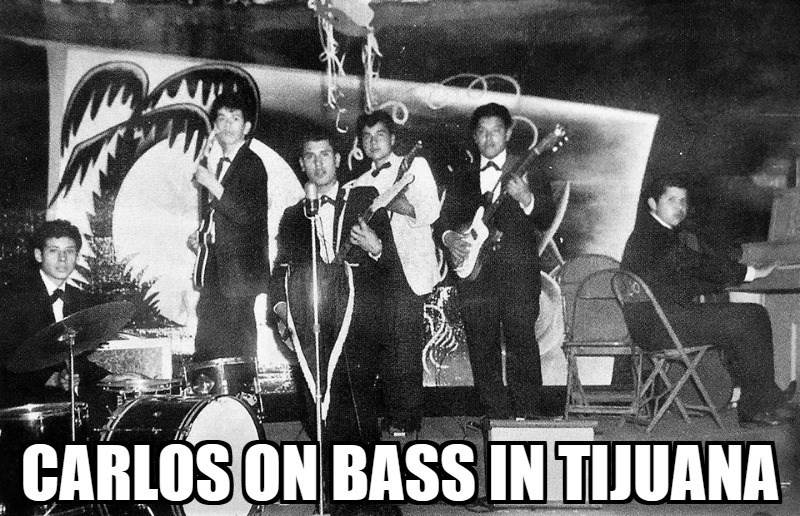 |
| The Strangers. Carlos Santana (2nd from left) |
| Tijuana, Baja California, Mexico 1961 |
|
|
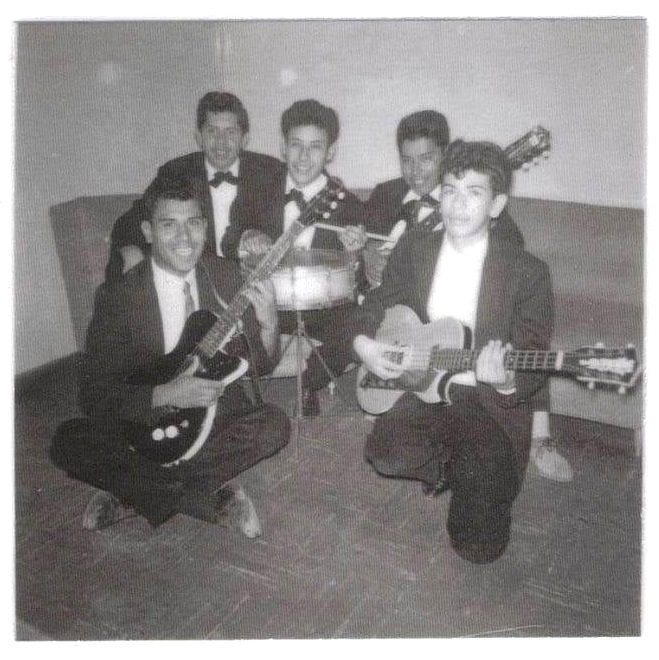 |
| The Strangers. Carlos Santana (1st from right) |
| Tijuana, Baja California, Mexico 1961 |
|
|
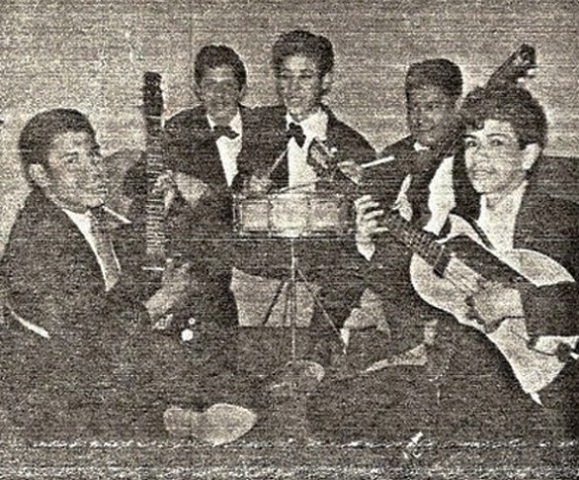 |
| The Strangers. Carlos Santana (1st from right) |
| Tijuana, Baja California, Mexico 1961 |
|
|
|
|
|
Javier Batiz And The TJ's: 1961
Carlos Santana plays bass with the TJ's for a short period of time.
Quote from Carlos Santana (The Universal Tone 2014): I also remember clearly that not long after that I ran into Javier on the street. He told me he was leaving El Convoy, moving to a better gig at the Club Latino Americano, and did I want to go with him and play bass? What could I say? The TJs were the first band I wanted to play with, so I said okay. (p81) (p80-81)
|
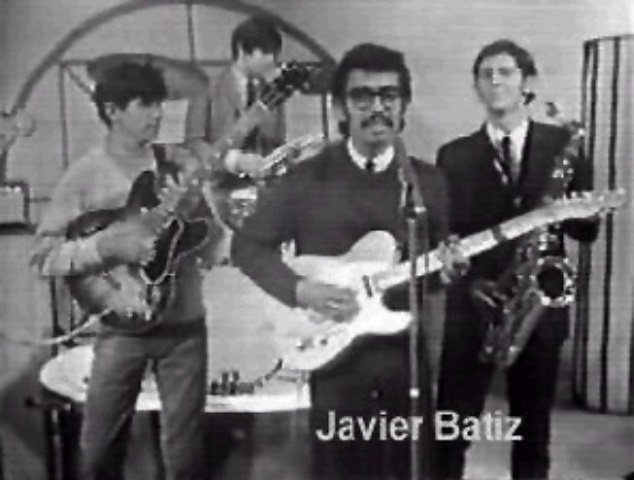 |
| Javier Batiz And The TJ's |
| Tijuana, Baja California, Mexico |
|
|
|
|
|
El Convoy Club's House Band: 1961-Summer 1962
Carlos Santana plays guitar with El Convoy house band. He starts playing the blues.
Quote from Carlos Santana (The Universal Tone 2014): The job with Javier didn’t pay as much---and I wanted to play guitar. So I put down the bass, left Javier, and went back to El Convoy. (…) Within months I could tell I was getting better, and I started to get confidence. (…) Maybe it was because I could do so many things with the guitar that I never felt like singing (p81-82)
Quote from Carlos Santana (The Universal Tone 2014): Over time you start to learn about it---you learn to understand that the blues is a very sacred language. (…) I see the blues as a lake---you can look across it, travel around it, get to know it quickly. But you have to really dive into it, because it can be very, very deep. (p84-85)
Quote from Carlos Santana (The Universal Tone 2014): As time went by, I got more and more into the blues---black blues. (p87)
Quote from Carlos Santana (Richard B. Simon/Carlos Santana The Healer/Relix Vol 32 No 6 Sept/Oct 2005): In Tijuana, I learned a lot about stripping women, literally, with the music. You play music like The Stripper, that’s when they throw the glove off and they do the thing with the tassles on the nipples and stuff. Honky-tonk, the stripper song, Green Onions, Hideaway. I did that on the weekdays, and on Sundays, I would go and play Ave Maria in church with the violin. So my life was pretty balanced.
|
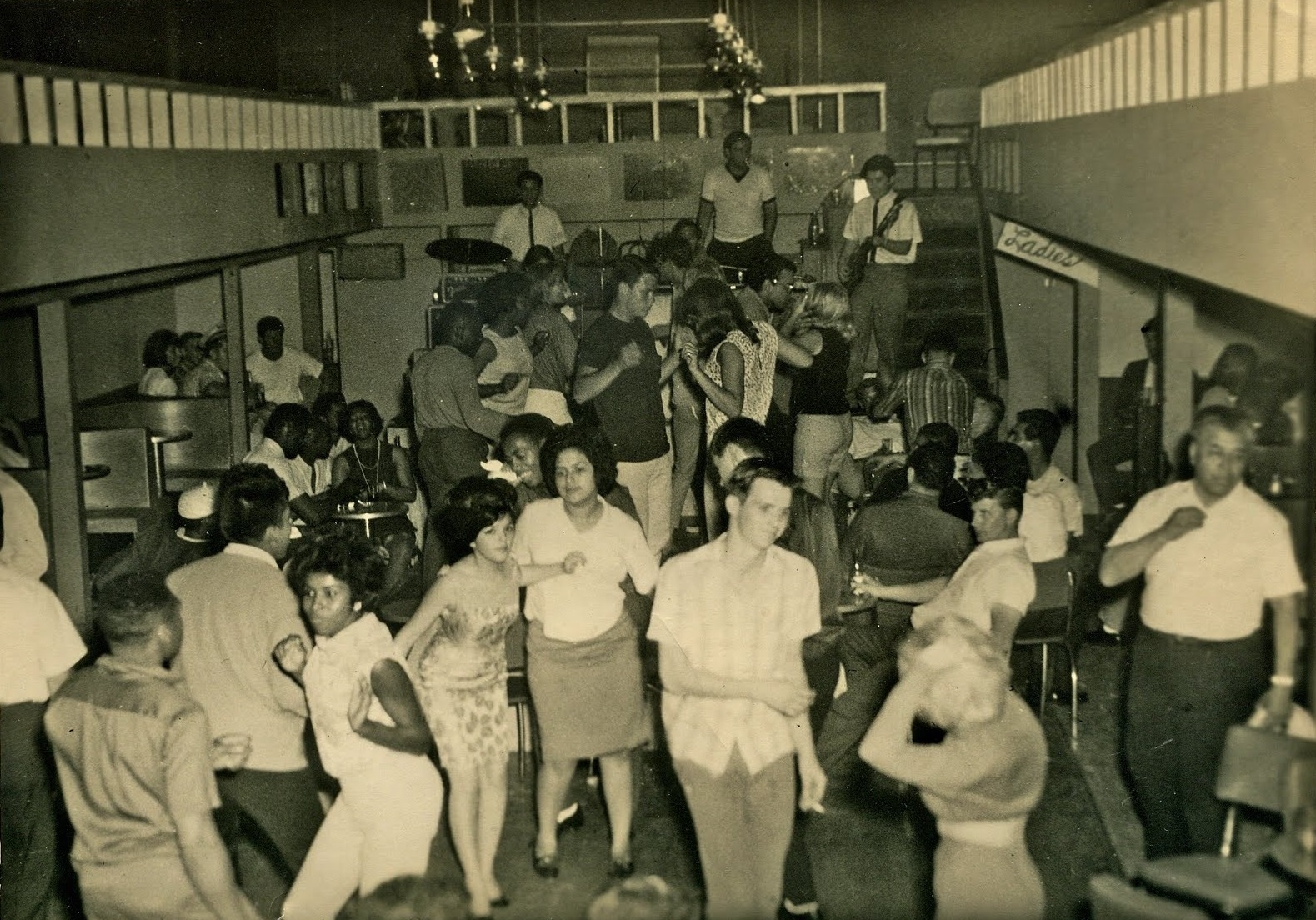 |
| El Convoy Club. Avenida Revolucion, Tijuana, Baja California, Mexico |
|
|
|
|
|
Unnamed Band #1: Sept-Oct 1962
Carlos Santana (g), Sergio “Gus” Rodriguez (b), Danny Haro (ds)
Carlos Santana stays in San Francisco for two months. He meets Danny Haro and Sergio “Gus” Rodriguez with whom he forms an unnamed band, and plays his first gigs in the U.S.
Quote from Carlos Santana (The Universal Tone 2014): It was during these two months in ’62 that I also met two Mexican American guys who lived in the Mission District and were into some good music. One was Sergio Rodriguez, who played bass---we called him Gus. (…) The other was Danny Haro, who played drums. (…) We got together a few times to jam, and they were freaking out because I knew all these songs and I could play chords and a lot of lead. (…) I think we did two gigs together, but it didn’t feel anything like the gigs I was used to playing on Avenida Revolucion. (p102)
Quote from ? (SFGate March 21, 2004): RODRIGUEZ, Sergio "Gus" - April 2, 1948 - March 3, 2004 Gus Rodriguez, 55, passed away on March 3, 2004 in Stockton. He was born in Guadalajara, Jalisco, Mexico on April 2, 1948. Gus and his family moved to the United States venturing on new hopes and dreams when he was 10. Early in his teens Gus formed a band with his brother, Al and friend, Danny Haro that eventually became part of The Santana Blues Band featuring good friend, Carlos Santana. His friends from all over the Bay Area loved him because "Gus was always there" for them.
|
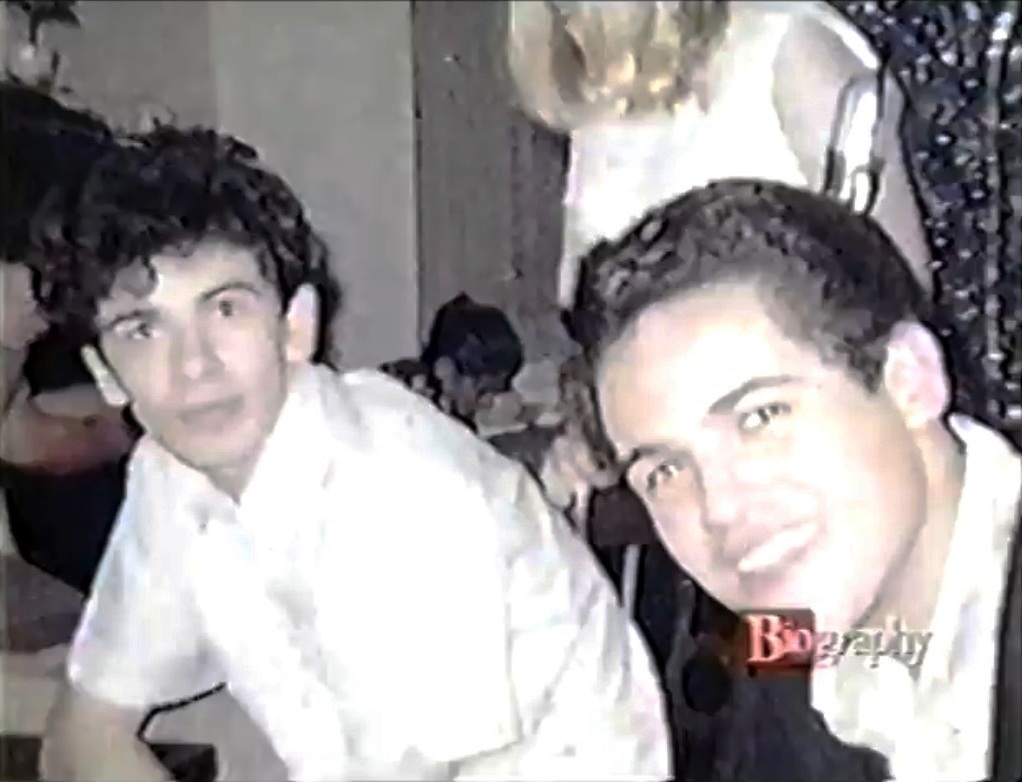 |
| Unnamed Band #1. (left to right) Carlos Santana, Sergio "Gus" Rodriguez |
| San Francisco, CA 1962 |
|
|
 |
| Unnamed Band #1. (left to right) ?, Danny Haro, C. Santana, Sergio "Gus" Rodriguez |
| San Francisco, CA 1962 © Santana Archives |
|
|
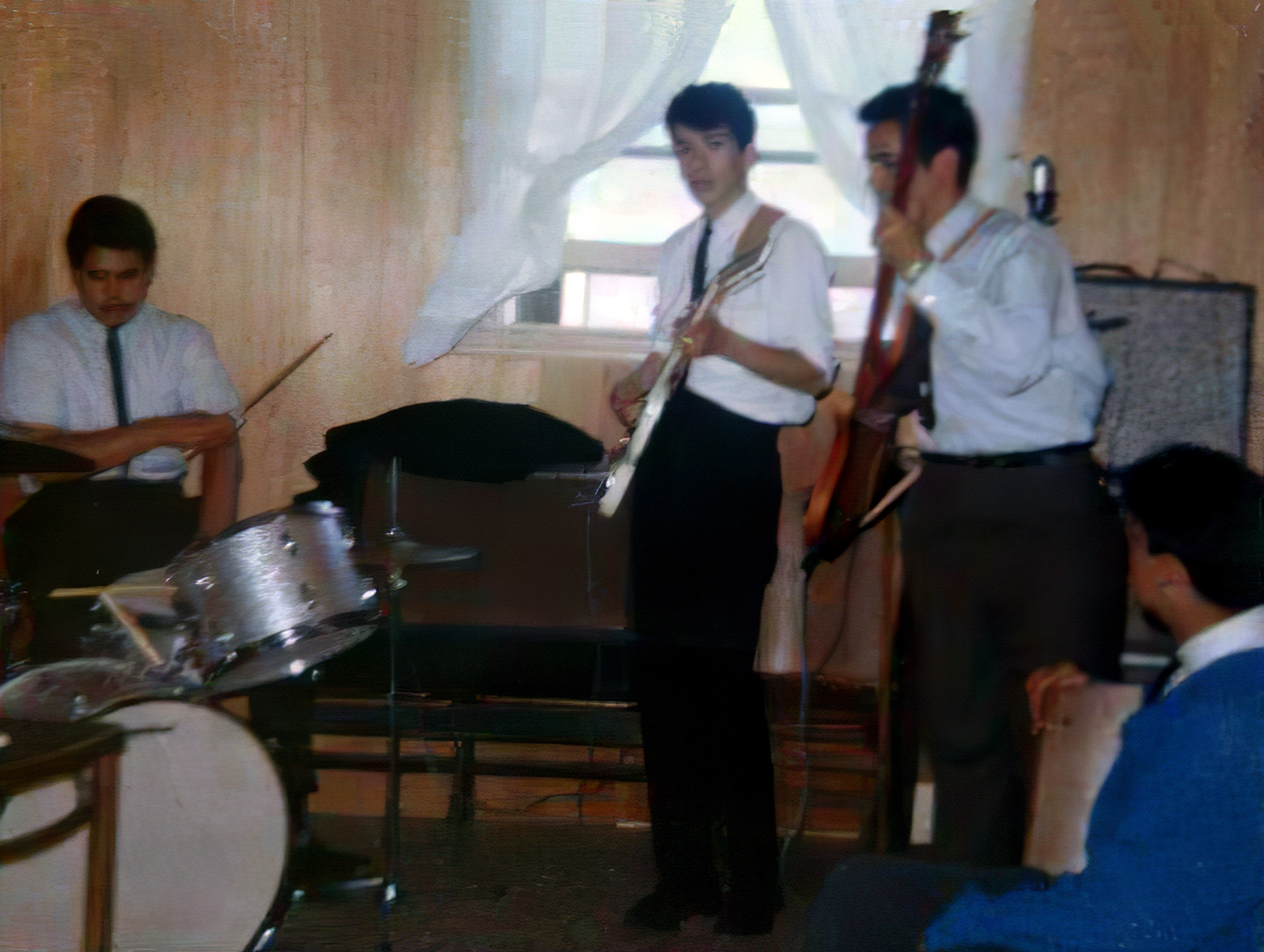 |
| Unnamed Band #1. (left to right) Danny Haro, Carlos Santana, Sergio "Gus" Rodriguez |
| San Francisco, CA 1962 |
|
|
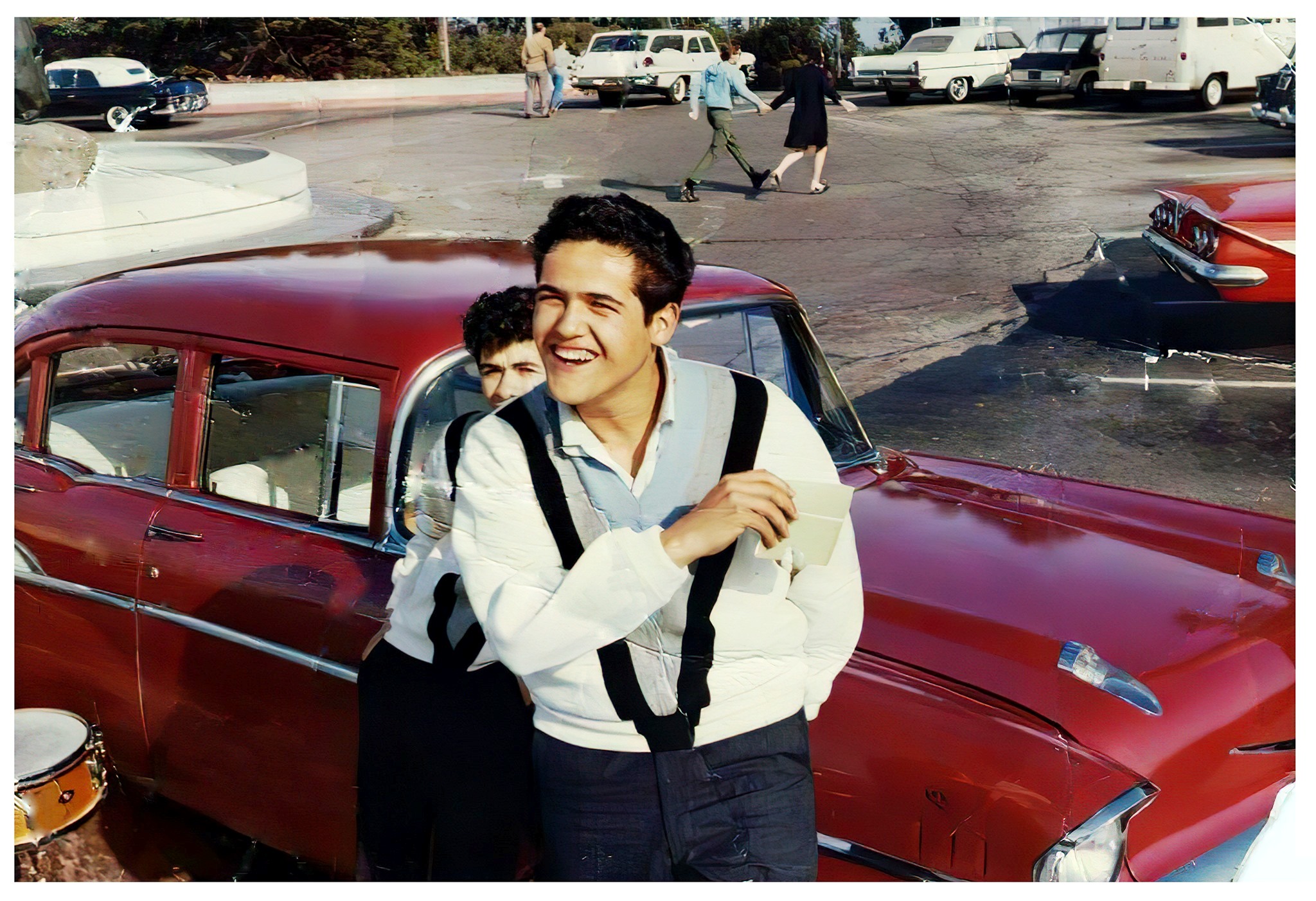 |
| Unnamed Band #1. Sergio "Gus" Rodriguez, Carlos Santana (behind) |
| Coit Tower, San Francisco, CA 1962 © Rodriguez Family |
|
|
|
|
|
El Convoy House Band (resuming): Oct 31, 1962-Late Aug 1963
On Halloween night of 1962, Carlos Santana returns to Tijuana and resumes playing with El Convoy house band.
Quote from Carlos Santana (The Universal Tone 2014): Two months into that first school year in the United States, I really got into it with my mom. (…) I saw a Stratocaster that I actually liked, and I asked my mom for the money. (…) My mom told me she had spent all the money. (…) That’s when I said, “Forget it. You broke a promise to me. I’m going back.” (…) We drove all the way to Tijuana and pulled into town in the middle of the evening. (…) I did something I never expected I’d do on my own---I went to church. (…) On that night I went straight from the church to El Convoy. (p105-107)
Quote from Carlos Santana (The Universal Tone 2014): I learned many things during my year in Tijuana---songs, solos, chord changes. I learned what I had to do to stay in tune. (…) I started to learn about phrasing. (…) I began to really learn about soloing and respecting the song and the melody. (p109-110)
Quote from Carlos Santana (The Universal Tone 2014): I got used to the rhythm of late nights again. (…) I knew it was not healthy living. (…) But I was drinking a lot, and it started catching up to me quickly. (…) In my mind I wasn’t just playing the blues---I was living the blues. (p110-111)
|
|
|
|
Unnamed Band #1 (resuming): Fall 1963
Carlos Santana (g), Sergio “Gus” Rodriguez (b), Danny Haro (ds)
Carlos Santana resumes playing with his two friends that he met the year before, Haro and Rodriguez.
Quote from Carlos Santana (The Universal Tone 2014): And of course I was still playing and hanging out with Danny and Gus. We had our little band that had no name. We had our little gigs, playing parties and dances. (…) We did one gig at the Stonestown YMCA... (p121-122)
Quote from Carlos Santana (The Universal Tone 2014): After the difficulty I felt leaving Tijuana, what really kept me interested in San Francisco and not wanting to go back was my relationship with girls and music. (p125)
|
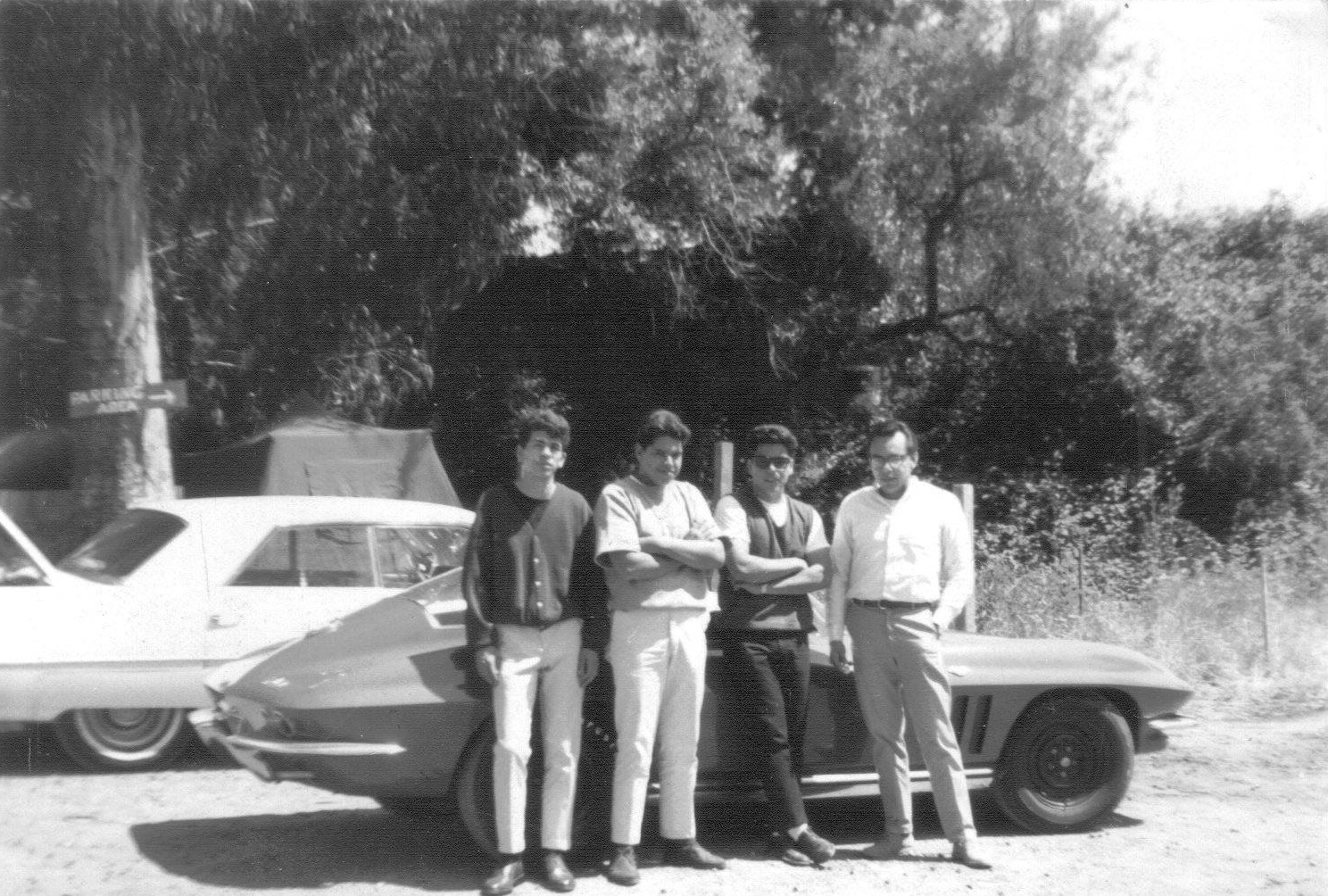 |
| Unnamed Band #1. (left to right) Carlos Santana, Danny Haro, Michael Rodriguez, Ray Rodriguez |
| 1963 |
|
|
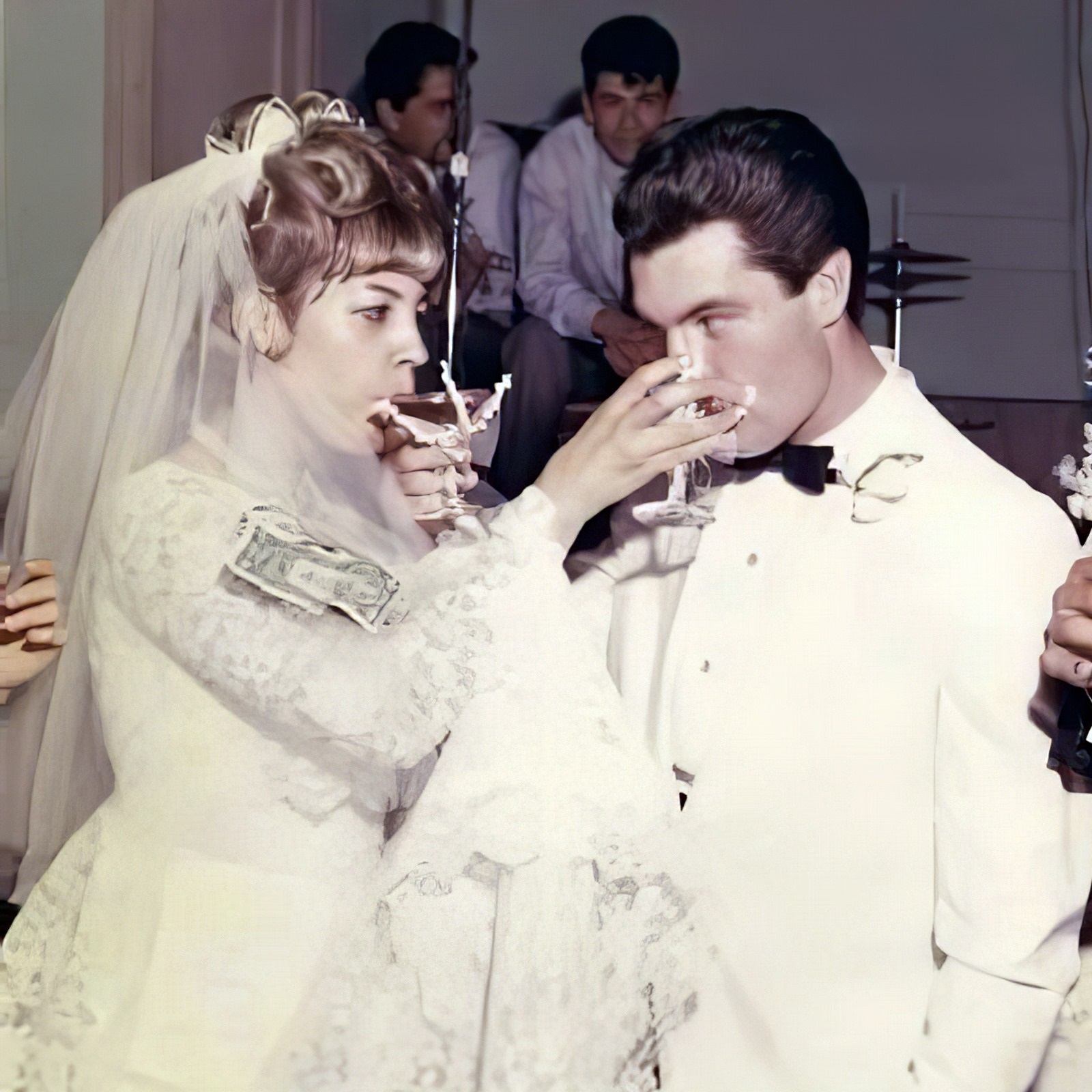 |
| Unnamed Band #1. (left to right in the back) Danny Haro, Carlos Santana |
| Wedding. San Francisco, CA 1964 |
|
|
|
|
|
The Dynamics: Sept 1964
Carlos Santana (g), Sergio “Gus” Rodriguez (b), Danny Haro (ds), Richard Bean (sax), Andy Vargas (sax)
Carlos Santana’s unnamed band becomes one of the best in the Mission District. They eventually team up with another band named The Dynamics.
Quote from Carlos Santana (The Universal Tone 2014): By then my band was one of the best bands at Mission at the time. Like a rhythm section for hire, the three of us would join up with other groups. (…) We were the guys to get. (…) One time we played in the Dynamics, wearing suits and playing with two saxophone players---Andy Vargas and Richard Bean. (p128)
Quote from Richard Bean (Private Facebook Chat with Santanamigos Feb 20, 2012): The members of that band were local musicians who were not that dedicated and that’s why it broke up. My good friend Andy Vargas was the other sax player as well as myself in the band. Carlos went on to form the Santana Blues Band, and I went on to help form Malo and Sapo not much longer there after.
|
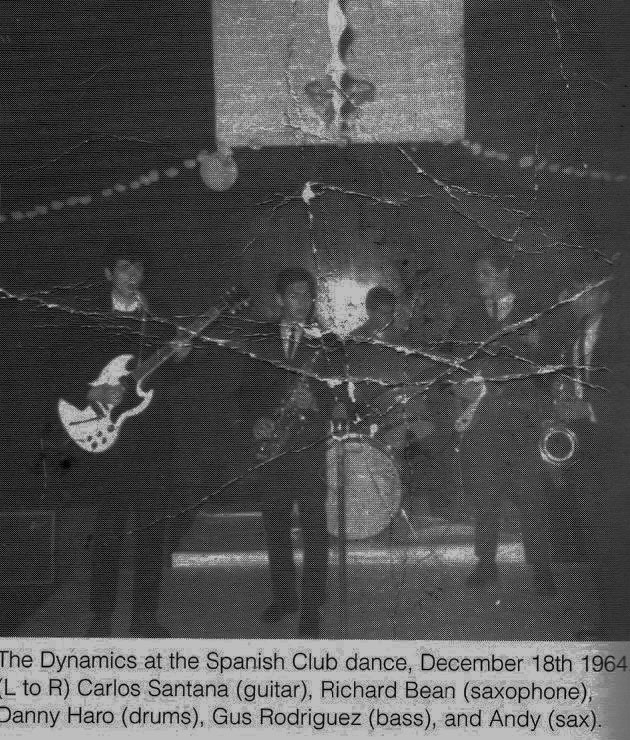 |
| The Dynamics |
| (left to right) Carlos Santana, Richard Bean, Dany Haro, Sergio “Gus” Rodriguez, Andy Vargas |
| Spanish Club Dance, San Francisco, CA Dec 18, 1964 |
|
|
|
|
|
Unnamed Band #2: Late 1964
Carlos Santana (g), Sergio “Gus” Rodriguez (b), Danny Haro (ds), Joyce Dunn (vo)
Carlos Santana’s unnamed band teams up with a female singer.
Quote from Carlos Santana (The Universal Tone 2014): The school used to hold open auditions for their Friday night dance parties, and we would win again and again. (…) We never really had a singer. (…) I met Joyce Dunn at a jam in late ’64---she was a singer singer, with a real blues energy to her voice. (…) It was definitely a new thing at the time---a black singer backed by Mexican Americans and a Mexican guitar player. Michael Carabello would tell me that the first time he ever saw me play was during the few weeks we played with Joyce. (p129-130)
|
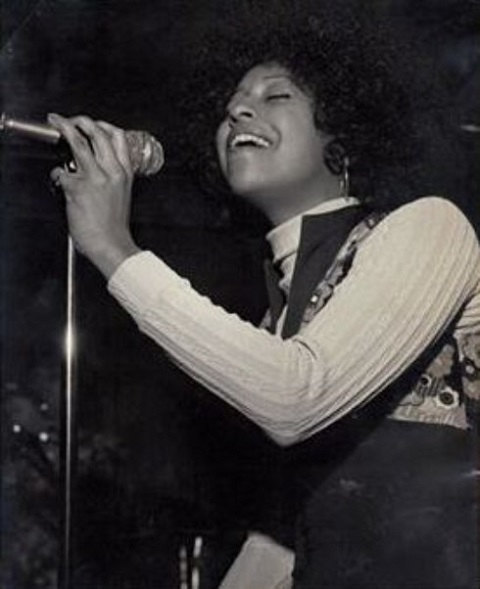 |
| Unnamed Band #2. Joyce Dunn (vo) |
| San Francisco, CA Late 1964 |
|
|
|
|
|
Unnamed Band #3: Fall 1965
Carlos Santana (g), Sergio “Gus” Rodriguez (b), Danny Haro (ds), Michael Carabello (perc)
Carlos Santana starts his second year at Mission High. His unnamed band includes a conga player for the first time.
Quote from Carlos Santana (The Universal Tone 2014): That fall, I met Michael Carabello for the first time. He was a friend of Yvonne’s and would have been at Mission High except that his baseball skills got him into San Francisco Polytechnic. (…) He was hanging out more than playing at the start, but we had the same enthusiasm and intensity about music. (…) Most important, Carabello took me to Aquatic Park. (…) They used to let this circle of conga players play. (…) By the end of ’65, the influence of all these new musical ideas was starting to show in the band’s repertoire---and Carabello was in the band. (p131-132-133)
|
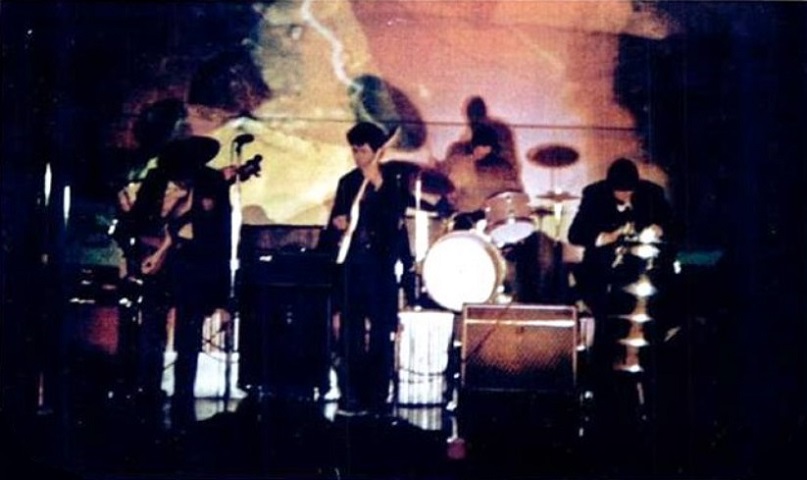 |
| Unnamed Band #3. (left to right) Sergio "Gus" Rodriguez, Carlos Santana, Danny Haro, Michael Carabello |
| San Francisco, CA Fall 1965 |
|
|
|
|
|
Unnamed Band (Ex-The Mockers): Early June 1966
Carlos Santana (g), Steve LaRosa (b), Rod Harper (ds)
Carlos Santana teams up with two other musicians who left a local band, The Mockers.
Quote from Carlos Santana (The Universal Tone 2014): The band’s name was Mocker Manor, and they needed a guitar player. (…) I gave it a try and wanted it to work. (…) I didn’t stay long with Mocker Manor. (p148)
Quote from Steve LaRosa (Facebook Feb 17, 2014): My name is misspelled, but I played with Carlos and Rod pre-Santana days, 1966, in a band called The Mocker Manor Blues Band (yeh...I know! haha). I drove a ‘61 beige Impala. I’d pick-up Carlos where he worked at Tick Tock on 3rd Street, and stop by his house to get his guitar, then off to some gig or other: free concert in the Panhandle or Artist Liberation Front gig or whatever. Have an old tape of Carlos, Rod, me and (the late) Tony Lenzini playing some blues at Rod’s house on 19th and Noe. Great memories of playing the Fillmore, Avalon and Matrix, etc.
Quote from Bruno Ceriotti (http://brunoceriotti.weebly.com/the-mockers--the-mocker-manor-blues-band.html): Steve LaRosa and Rod Harper split from The Mockers and went in search of a guitar player to form a new band together because Tony Lenzini didn't want to leave The Mockers and join them. Within weeks, Steve and Rod ended up at Don Wehr's Music City (where The Mockers used to hung out and bough equipment for years) and the owner, the late Don Wehr (also a drummer) told them he knew a guitarist named Carlos Santana. Steve LaRosa remembered that Don told them that Carlos would be a good fit, but Rod Harper remembered that actually Don told them he didn't think he would be a fit because he was pretty good but was very young and Mexican. Anyway, although Steve and Rod never heard of him, Don gave them Carlos' phone number and they contacted him and then picked him up at his job (at that time Carlos worked as dishwasher at the Tic Tock Drive In on Third Street and King Street). When they picked him up (in Steve's '61 beige Chevrolet Impala) Carlos had tomatoe sause spread on his chest and when they asked him why? he said his mother put it on him because he had a cold. He also had a white Gibson SG electric guitar and a little black Vox amp with him. On the way to Rod's house on 587 Noe Street at 19th Street, in the mostly gay Castro District, Carlos kept telling them how much of a fan he was of The Mockers and how he went to all their gigs. How he dreamed of playing with them and how this was like a dream come true. Steve and Rod were pretty full of theirselves and Carlos had pretty much blew their head up, so they weren't expecting much. However, after the as-yet unnamed trio began practiced in Rod's living room, playing some blues tunes and a few songs written by Steve, the former Mockers members were blown out by Carlos' guitar skills. Steve and Rod had only heard sounds like that from albums that were recorded in professional recording studios, but never from someone who just play a guitar plugged in a probably 6" speaker in someone living room! So, after that first rehearsal together, they knew immediately that Carlos was the perfect fit for them. Great chemistry. He was so special, they liked him, and he was great to be around. In the following weeks the trio continued to practiced in Rod's living room, but because Carlos did not have a car (he was too poor to buy one), it was always Steve who picked him up at the Tic Tock Drive In, and from then they'd go to where he lived with his family (a flat (two units: one upper and one lower) at 704 14th Street at Market Street, in the Upper Market neighborhood of San Francisco) to get his equipments, and then off to rehearse or play somewhere.
|
|
|
|
The Mocker Manor Blues Band: July 1966
Carlos Santana (g), Steve LaRosa (b), Rod Harper (ds), Tony Lenzini (rhythm g, vo)
Sahib Malik (hca, vo) plays with the band for a few days, from late September to early October. Rory Butcher (tambourine, vo) joins the band for two weeks, from early to mid October.
Quote from Bruno Ceriotti (http://brunoceriotti.weebly.com/the-mockers--the-mocker-manor-blues-band.html): After seeing them at the above mentioned "battle of the bands", Tony Lenzini was blown away and quickly quit The Mockers and joined Steve, Rod, and Carlos, making them a quartet. Although Tony previously played lead guitar in The Mockers and was a much more well-rounded player, Carlos' solos were so incredible that Tony agreed to use his rhythm guitar skills behind Carlos' lead guitar skills, to give them a much bigger and better sound. Steve LaRosa have a tape of the as-yet unnamed quartet's first rehearsal in Rod's living room, with the band just playing some blues tunes and chatting. In the tape you can heard Tony playing an old borrowed acoustic guitar with a pickup on it, and Carlos playing his white Gibson SG electric guitar through his little black Vox amp. Carlos solos are youthful, exuberant and exciting. Easily identifiable as we've come to know his playing. And there was much talking between them, at times. At one point, Carlos can be heard asking whether they had a joint or some weed, which they almost always did! The tape, of approximately 30 minutes duration, started with an uptempo blues instrumental, then talking and tuning, then a long and slow blues instrumental, then talking and tuning again, and finally another uptempo blues instrumental that abruptly ends because the tape ran out while they were playing. The rehearsal was recorded using an old reel-to-reel recorder and a single condenser mic (all four instruments are very clearly heard). In 2015 Steve have converted the tape to digital file and send a copy to Carlos as a gift. In late July, some neighbors of the as-yet unnamed band had been complaining about the volume of their rehearsals at Rod's apartment, so they found a new rehearsal space, a huge house that looked like a big stone castle located on Clarendon Avenue in the Twin Peaks neighborhood of San Francisco. They asked the owners if they could use one of their street-level garages for their rehearsals and they agreed. It was the garage, that had been converted to a recreation/storage room, that inspired them to called their band The Mocker Manor Blues Band, because Steve, Rod and Tony came from The Mockers, they were playing in a "manor", and they wanted to be a blues band.
Quote from Bruno Ceriotti (http://brunoceriotti.weebly.com/the-mockers--the-mocker-manor-blues-band.html): In December 1966, The Mocker Manor Blues Band disbanded after Steve LaRosa left them as he needed a "real" job to support a new young wife and child-to-be. Carlos Santana, nedless to say, when to form his own Santana Blues Band few months later (with Stan Marcum as manager), Rod Harper will play with other local bands included the above mentioned Santana Blues Band (1967), and the Allmen Joy (1967-69), and also Tony Lenzini will play with other local bands. Later in 1970 Steve returned to music (after he declined to joined Santana Blues Band back in 1967 only due to his family responsibilities) and teamed up with Rod and Tony again and they formed a new band together called Filet of Soul with singer and organist Billy Dunn (Rod left the band soon thereafter but they continued as a successful funk/originals club band for several years with a new drummer named Steve Koskela).
|
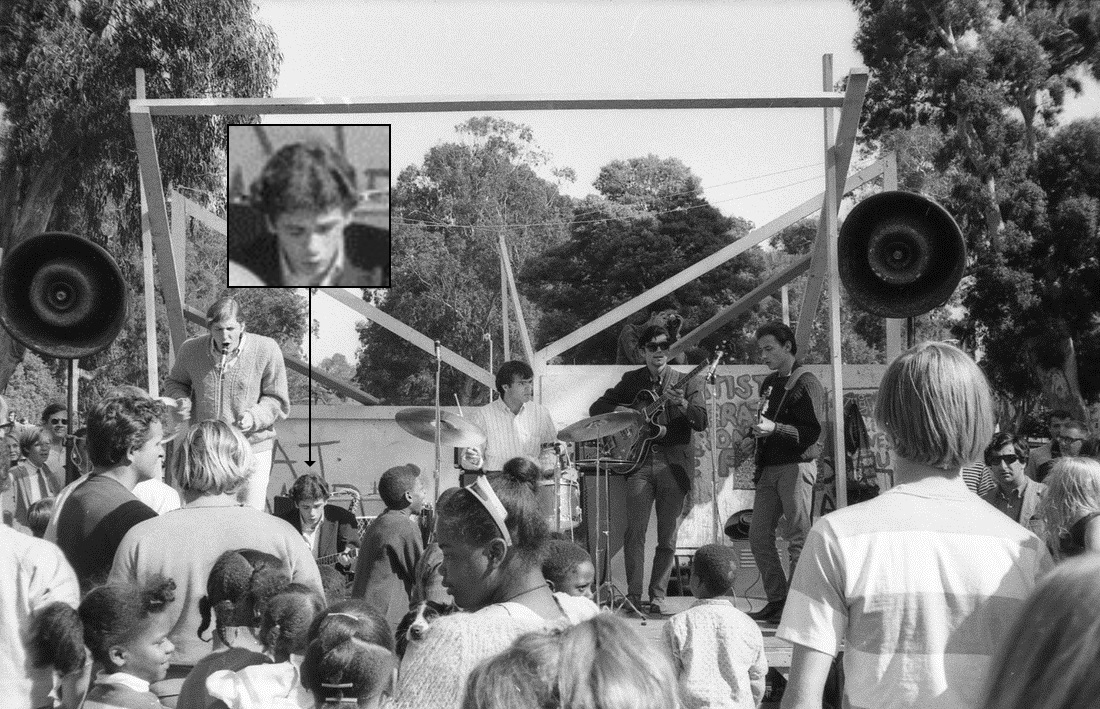 |
| The Mocker Manor Blues Band. (left to right) Rory Butcher, Carlos Santana, Rod Harper, Steve LaRosa, Tony Lenzini |
| Photographer Jim Marshall in the crowd (right with sunglasses) |
| 3rd Artists Liberation Front Free Fair. Panhandle, Golden Gate Park, San Francisco, CA Oct 15, 1966 |
|
|
|
|
|
Unnamed Band #3 (resuming): Dec 1966
Carlos Santana (g), Sergio “Gus” Rodriguez (b), Danny Haro (ds), Michael Carabello (perc)
After the dismantling of The Mocker Manor Blues Band, and before starting the Santana Blues Band in early Feb 1967, Carlos Santana resumes playing with his two friends Haro and Rodriguez (with whom he started the Unnamed Band #1 back in Sept-Oct 1962), plus Michael Carabello.
|
|
|
|
Santana Blues Band #1: Early Feb 1967
Carlos Santana (g), Sergio “Gus” Rodriguez (b), Danny Haro (ds), Michael Carabello (perc), Gregg Rolie (kbd/vo), Tom Fraser (rhythm g)
After seeing Carlos Santana play with Michael Bloomfield at the Fillmore Auditorium in January 1967, Tom Fraser invites Carlos Santana to jam with his friend Gregg Rolie. Together, they form the original Santana Blues Band. After Bill Graham’s invitation to play at the Fillmore, the band needs a name to be put on the posters. Michael Carabello thinks that “Santana Blues Band” is the best idea.
Quote from Carlos Santana (The Universal Tone 2014): Around a week later I was washing dishes at the Tic Tock. (…) A young guy I’d never seen before put his head through the opening to the kitchen. “You’re Santana?” (…) I sing and play guitar with some guys, and we need a guitar player. (…) Tom Fraser was a singer and guitarist who had been looking to put together a band and was at the Fillmore Auditorium that afternoon. (…) Out at the farmouse I started plugging in, and the organ player came over and we started talking. His name was Gregg Rolie. (…) We clicked even before we started playing. (…) We jammed on “Comin’ Home Baby”. (…) Then we played “As The Years Go Passing By”. (…) I could tell he was a good singer, and we needed one in the band. (…) For the next months, we were a band. Gregg was our new lead singer, and we started adding songs he liked to sing. (…) Tom was a good rhythm guitarist, and he was into the blues, but even though he was the guy who’d brought me out, something did not work with us at the end. (…) But Tom gets the credit for being the catalyst that brought Gregg and me together for the first time. (p152-153-154-155)
Quote from Carlos Santana (The Universal Tone 2014): Our name wasn’t even on the poster, but at least we had a name. It was Carabello who came up with the idea. Playing the blues was the thing we were most proud of, and the word blues was in the names of some our favorite groups. (…) He went through our last names. (…) He thought my last name had the most ring to it. Santana Blues Band became our name for the next year and a half. It wasn’t that I was suddenly the leader. We were a leaderless band. (p161)
|
|
|
|
Santana Blues Band #2: July 1967
Carlos Santana (g), Don Wehr (ds), Michael Carabello (perc), Gregg Rolie (kbd/vo), Tom Fraser (rhythm g)
After being fired by Bill Graham for showing up late at the show they were supposed to play at the Fillmore Auditorium on June 17, 1967, Stan Marcum requires from Carlos Santana that Sergio “Gus” Rodriguez and Danny Haro to be left out of the Santana Blues Band. For a few days, Sergio “Gus” Rodriguez is not replaced by any bass player. Danny Haro is replaced by Don Wehr for the show played at the Grant & Green Salon, San Francisco, CA.
Quote from Carlos Santana (The Universal Tone 2014): The summer of 1967 was the Summer of Love in most people’s minds. (…) For me and many musicians, this was also when we started to feel that the resonance of our convictions could change the world. For me, the summer of 1967 was also the summer of decisions. One day I saw the Grateful Dead stop by the Tic Tock in a limousine. (…) I saw them from the sink where I was washing dishes and said to myself, “I shouldn’t be doing this anymore.” (…) The other decision I had to make was to finally leave home. (…) Then I dropped LSD and had a bad trip. (…) I felt like I actually gave birth to myself that day. I went from believing the world was coming to an end to figuring out what I had to do to stop that from happening. (…) I felt like that the whole experience had given me power and brought me to my purpose in life. Stan and Ron listened to me talk. They heard the conviction. “We’ll be your managers,” they said. (…) Stan said one more thing. “You have to get rid of Danny and Gus---that’s the way it is, man. They are not bad people, but they’re not committed. They’re weekend musicians; you’re not. We can tell that. We’ll drop everything for you, but you got to drop them.” (…) I knew they were right, but Danny and Gus were my oldest friends in San Francisco. Making us late at the Fillmore kind of sealed it, but if anybody was going to tell them, I would have to be the one. (…) I said good-bye to Danny and Gus, and I finally said good-bye to living with my mom and dad and moved in with Stan and Ron on Precita Avenue. That was the nest that nurtured the birth of the band. (…) That really was the beginning of Santana right there. (p165-166-167-168-169)
|
|
|
|
Santana Blues Band #3: July 1967
Carlos Santana (g), David Brown (b), Rod Harper (ds), Marcus Malone (perc), Gregg Rolie (kbd/vo), Tom Fraser (rhythm g)
David Brown joins the band after the show played at the Grant & Green Salon, San Francisco, CA in July 1967. Don Wehr is replaced by Rod Harper. Michael Carabello is replaced by Marcus Malone. In his autobiography “The Universal Tone”, Carlos Santana says that Steve LaRosa joins the Santana Blues Band. In fact, his former Mocker Manor Blues Band co-member declines the offer because of family responsabilities.
Quote from Carlos Santana (The Universal Tone 2014): One night we played in a jazz bar. It was called Grant & Green because that’s where it was. A bassist jammed with us on “Jingo”. (…) David Brown was basically a silky person to be around. (…) We asked David to join us that same night. (p174-175)
Quote from Carlos Santana (The Universal Tone 2014): We did gigs at street fairs and small clubs like the Ark in Sausalito with the bass player Steve De La Rosa, who was really good and very attentive to what the drummer was doing. Drummers went in and out for a while. There was Rod Harper, who was good on certain kinds of songs but not on others. (p174)
Quote from Carlos Santana (The Universal Tone 2014): We started to look for another conga player, too. I’m not sure why we had to, but Carabello could be such a goofball sometimes, showing up late or not at all. (…) Anyway, we had to drop Carabello for a while. Then Stan was down listening to the congueros at Aquatic Park when he met this cat named Marcus Malone. He was really good---self-taught, a self-made showman. (…) I started hanging around with him more and more. (…) It only took a few weeks---but by July 1967 we had the foundation of Santana. (…) We continued as the Santana Blues Band---sometimes just Santana Blues---but as our music started changing we didn’t know what style to call it. (…) Carabello was still hanging with us. (p175-176-177)
|
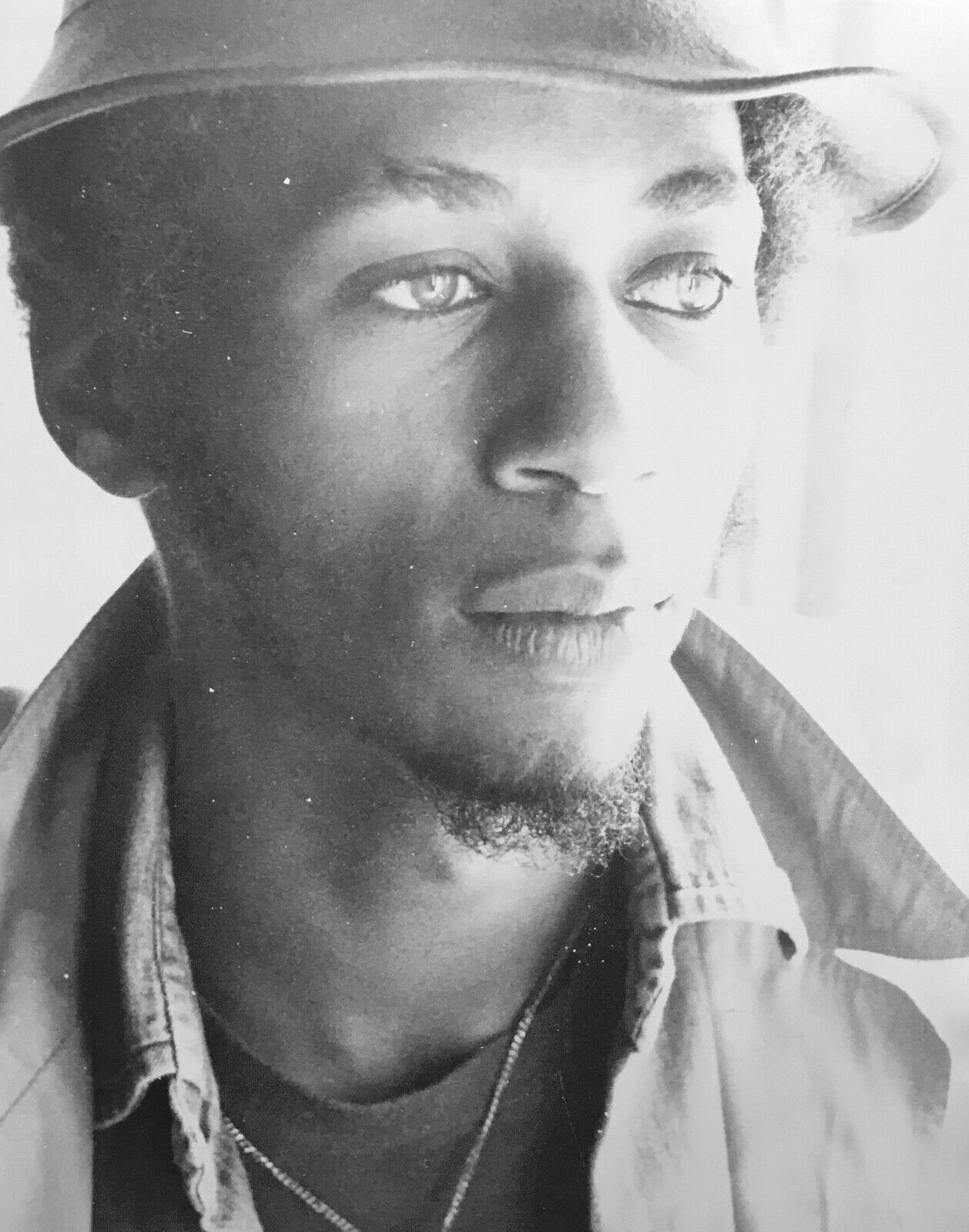 |
| Santana Blues Band #3. David Brown (b). Unknown Date |
|
|
|
|
|
|
|
|
|
Santana Blues Band #5/Santana #1: Nov 2?, 1967
(left to right ✔) Carlos Santana (g), Marcus Malone (perc), Bob “Doc” Livingston (ds) (seated), Gregg Rolie (kbd/vo), David Brown (b)
Rod Harper is replaced by Bob “Doc” Livingston (real name Robert Terry Livingstone). In June 1968, The Santana Blues Band changes its name to Santana, but keeps the same line-up.
Quote from Carlos Santana (The Universal Tone 2014): Then we found Doc Livingston, who came from somewhere in South Bay. He had certain mechanics---he could play double bass drums, but the thing I most liked about him was that when he played with mallets he could create a kind of vortex to play in. (p174)
Quote from Carlos Santana (The Universal Tone 2014): The summer of ’68 was when everything started to roll for us. That was when we started calling ourselves just one word: Santana. You can see it on the posters from that summer. (p192)
|
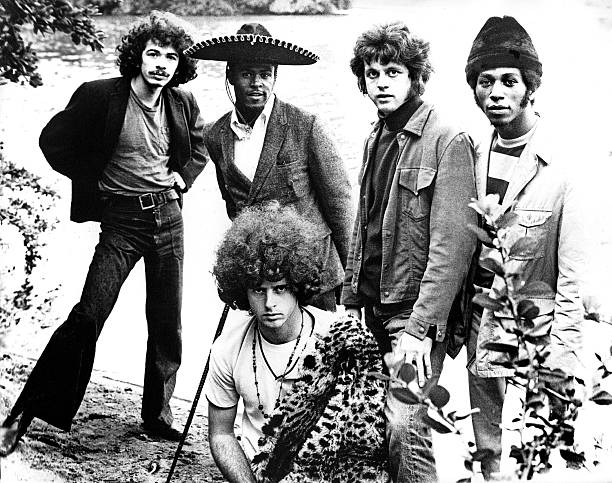 |
| ✔ Santana Blues Band #5/Santana #1 |
| Palace Of Fine Arts, San Francisco, CA © Coni Beeson |
|
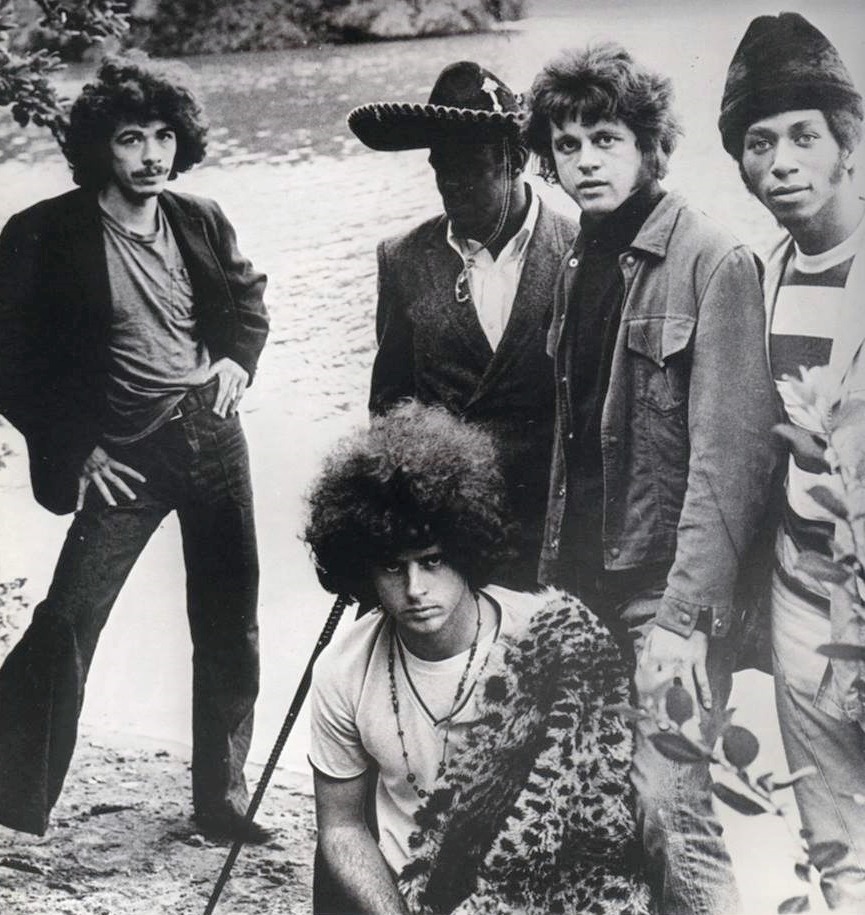 |
| Santana Blues Band #5/Santana #1 |
| Palace Of Fine Arts, San Francisco, CA © Coni Beeson |
|
|
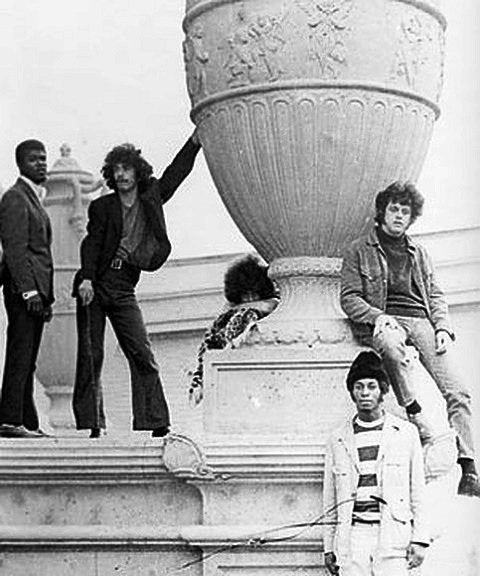 |
| Santana Blues Band #5/Santana #1 |
| Palace Of Fine Arts, San Francisco, CA © Coni Beeson |
|
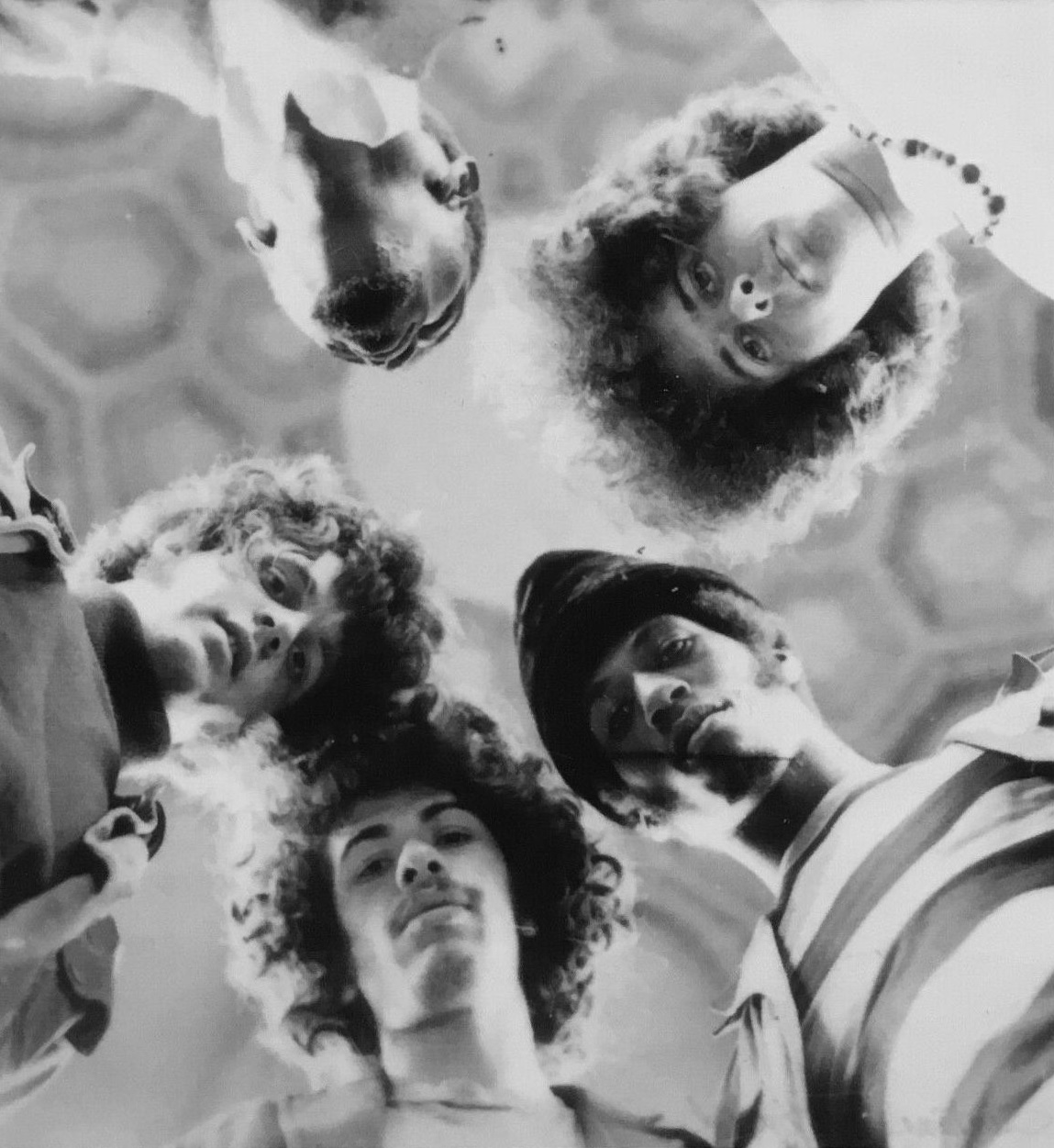 |
| Santana Blues Band #5/Santana #1 |
| Palace Of Fine Arts, San Francisco, CA © Coni Beeson |
|
|
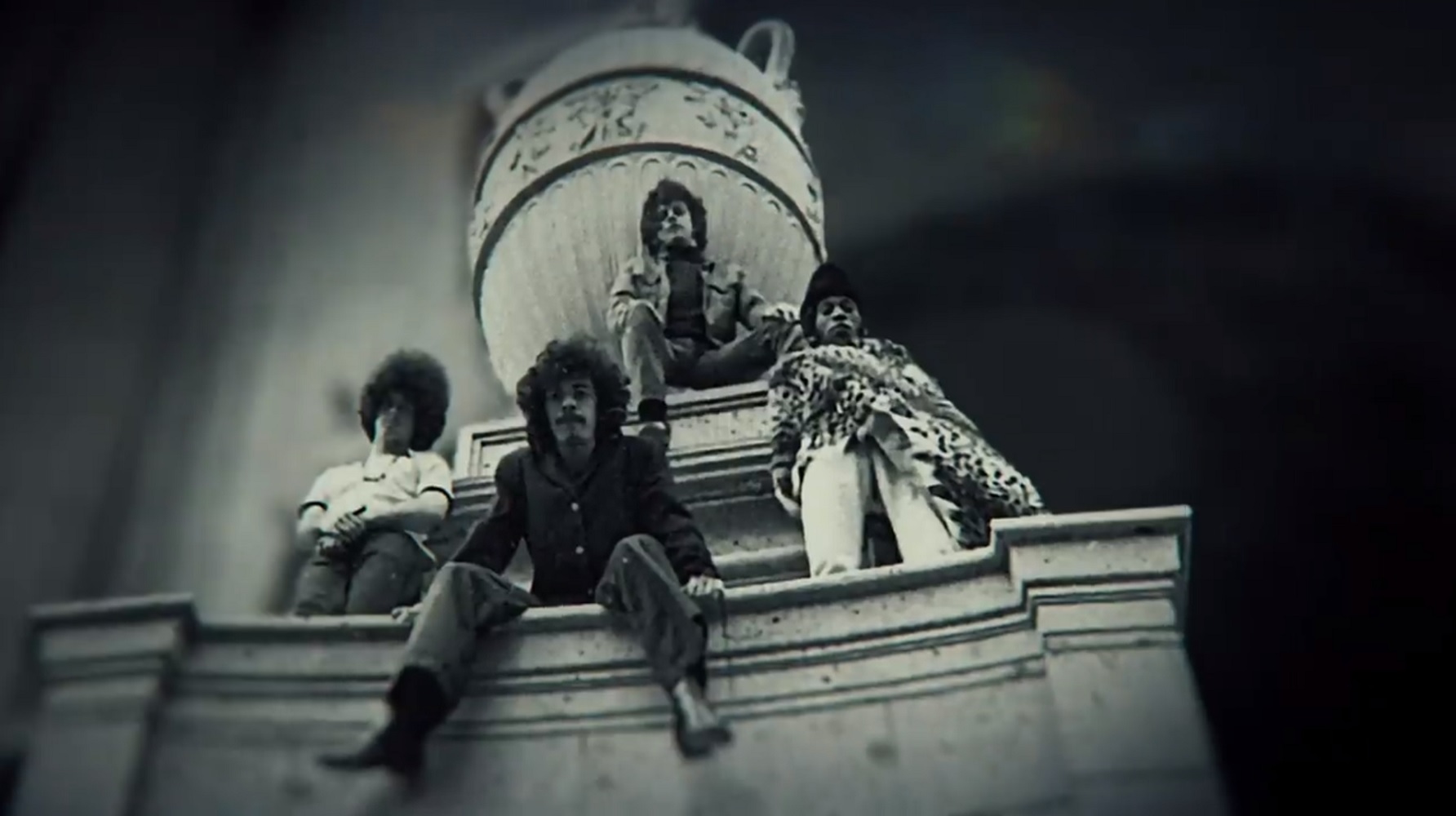 |
| Santana Blues Band #5/Santana #1 |
| Palace Of Fine Arts, San Francisco, CA © Coni Beeson |
|
|
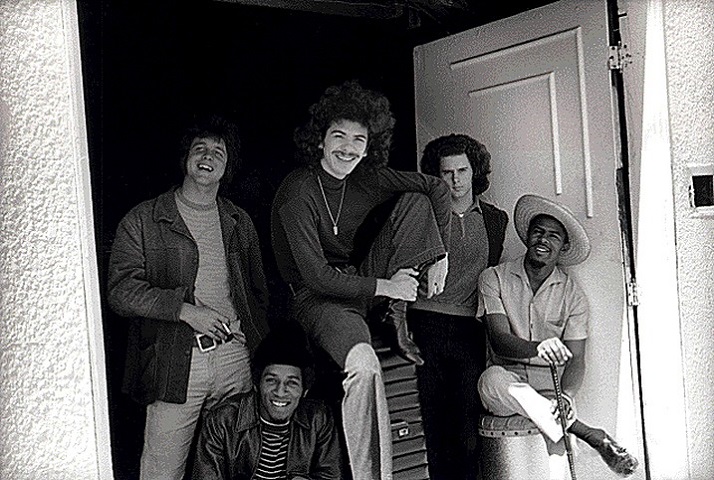 |
| Santana Blues Band #5/Santana #1 |
|
|
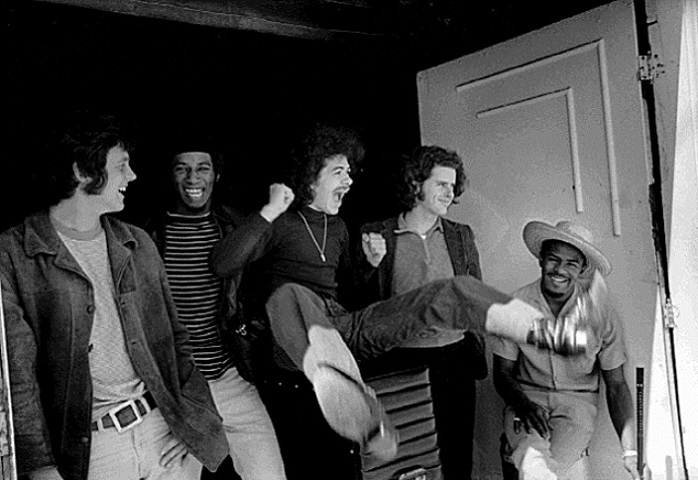 |
| Santana Blues Band #5/Santana #1 |
|
|
|
|
|
|
|
|
|
|
|
Santana #3: Mid-March 1969
Carlos Santana (g/perc/vo), David Brown (b), Johnny Rae (ds), Michael Carabello (perc), Gregg Rolie (kbd/vo)
Bob “Doc” Livingston is replaced by Johnny Rae.
Quote from Carlos Santana (The Universal Tone 2014): We went in and started rehearsing some new tunes, but nothing was coming together at first. This was when we decided to let Doc Livingston go---he kind of fired himself, really. Gregg asked him to leave, then we had a jazz drummer, Johnny Rae, with us for a few gigs---he played often with Cal Tjader and Gabor Szabo. (p206)
Quote from Michael Shrieve (Facebook March 26, 2020): When I was in high school, I would take a train every morning from Redwood City to Mountain View. My Mom was a nurse and, while still dark, she would drop me off at the train station. I loved the train, and still do. But every once in awhile, after she would leave, I would take the train in the opposite direction, to San Francisco. There was a Drum Shop there that was called Drumland and for a high school kid into the drums, it was intoxicating. It was owned by a great guy named Kenny Williams. One of the people that worked at the shop was drummer John Rae, and he was super nice to me. I was in awe of the folks that would come in there because they wore working professional drummers, who would just hang out and shoot the shit. Johnny Rae played with Cal Trader and I thought that was just SO cool.
|
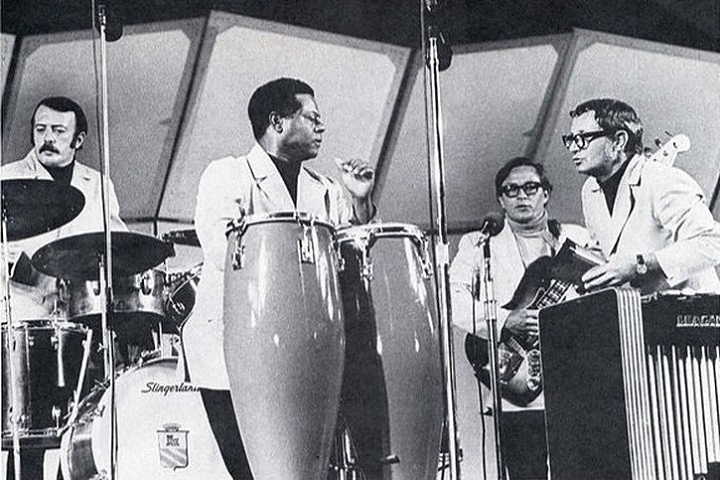 |
| (left to right) Johnny Rae, Armando Peraza, Toots Thielemans, Cal Tjader. Unknown Date |
|
|
|
|
|
Santana #4: Early April 1969
Carlos Santana (g/perc/vo), David Brown (b), Michael Shrieve (ds), Michael Carabello (perc), Gregg Rolie (kbd/vo)
Johnny Rae is replaced by Michael Shrieve.
Quote from Carlos Santana (The Universal Tone 2014): One day I saw Michael Shrieve come into Pacific looking to get some studio time for his band. He was a drummer I knew who hung with some of the guys in Jefferson Airplane, so I invited him to jam with us. (…) We kept playing into the night. (…) We felt a chemistry right off the bat. We asked Michael to join the band almost immediately, and he said yes. (…) Santana had its first stable lineup together, the one the world would get to know from our first three albums---Gregg, David, Carabello, Michael, Chepito, me, and a few people we added later. (p207-208)
Michael Shrieve’s partial speech at the Rock And Roll Hall Of Fame Induction. (Waldorf-Astoria, New York, NY January 12, 1998): (…) But, one night I was visiting a recording studio that I used to frequent to try to hustle free studio time for my own group. I’m walking in the front door and the drummer from Santana is walking out. I go inside and Santana was in the studio recording their first album for Columbia and Clive Davis, and they had just had a big falling out with their drummer! A couple of the guys recognized me from a year ago and asked me if I’d like to jam. Well, we jammed. We played all night long and at the end of the night we all gathered in a small room off to the side. Actually, I think it was just Carlos, Gregg, and I. Carlos asked me if I would like to join the band. I said, “You know, let me check my schedule.” Just kidding! That night they followed me home and I went into the house and woke my folks up and said, “See you later. This is where I get off.” I ran out to the street, jumped into the car and drove up to San Francisco’s Mission District where the band was living in a house together. I took my appropriate place on the couch and, despite the excitement and because of the late hour, fell asleep. I was in the band. And what a band it was! I soon saw this was no peace, love, hippie thing. This band was like a street gang and its weapon was music. (…)
|
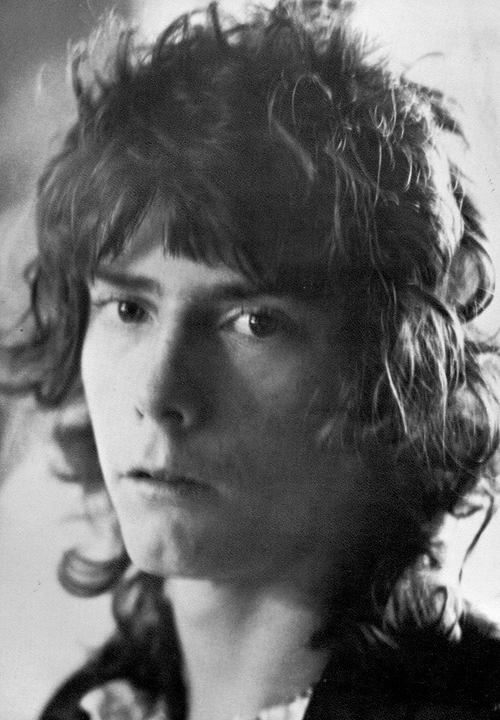 |
| Santana #4. Michael Shrieve (ds). Unknown Date |
|
|
|
|
|
Santana #5: Early May 1969
(left to right ✔) Michael Shrieve (ds), Carlos Santana (g/perc/vo), Gregg Rolie (kbd/vo) (bottom), Jose “Chepito” Areas (perc), David Brown (b), Michael Carabello (perc)
A second percussionist joins the band, Jose “Chepito” Areas. This is the first Santana lineup to have an album released.
Quote from Carlos Santana (The Universal Tone 2014): Carabello used to go to the beach and play there with whoever was hanging out. While we were waiting to find out what was happening with Marcus, Carabello met a guy who played percussion and was part of a group called the Aliens. (…) The guy, Jose Areas, played congas on one tune, then timbales on another---then soloed on trumpet, too! He was incredible. (…) He was from Nicaragua and kind of small, and they called him Chepito. (…) By the time Santana went back to the studio in May for a second try, Chepito was part of the band. (p204-205)
Quote from Michael Carabello (Interview by J. Rudy Ramirez 1996): Michael reported leaving the early Santana Blues Band due to a dispute with the other members, who wanted to continue to play while Carlos was in the hospital with tuberculosis. A flashy conga showman named Marcus Malone was brought in to replace Michael and continued with the band even after Carlos’ recovery. Marcus’ later arrest for manslaughter would open the door for Michael’s return, but he felt insecure and nervous trying to find a way to compensate for Marcus’ crowd-pleasing flair. The answer came to him at a percussion jam near San Francisco’s Ocean Beach. As Michael describes it, “One Sunday I was out at Playland at the Beach, on Great Highway, playing congas with two other guys. You know, somebody always comes along and wants to play your drum.” “So this guy comes up and asks me if his friend could play and I said ‘Sure,’ and this guy sits down and plays some shit I had never heard. That was Chepito.” Impressed by the new guy’s playing at the jam session, Michael went to see him perform at the Nite Life Night Club on San Bruno Avenue with The Aliens, a Top 40 band. There was “Chepito,” (José Areas, a recent immigrant from Nicaragua,) on stage, alternating between congas, timbales, and trumpet…Michael was further blown away, as were Carlos Santana and Gregg Rolie on a subsequent visit, and Chepito was invited to join Santana. The merging and blending of Michael and Chepito’s percussion styles proved to be very potent, and became a major strength of the Santana band, as did their input into the band’s arrangements and repertoire. One of Michael’s contributions was his insistence that Santana record Tito Puente’s song “Oye Como Va,” which became one of their biggest hits.
|
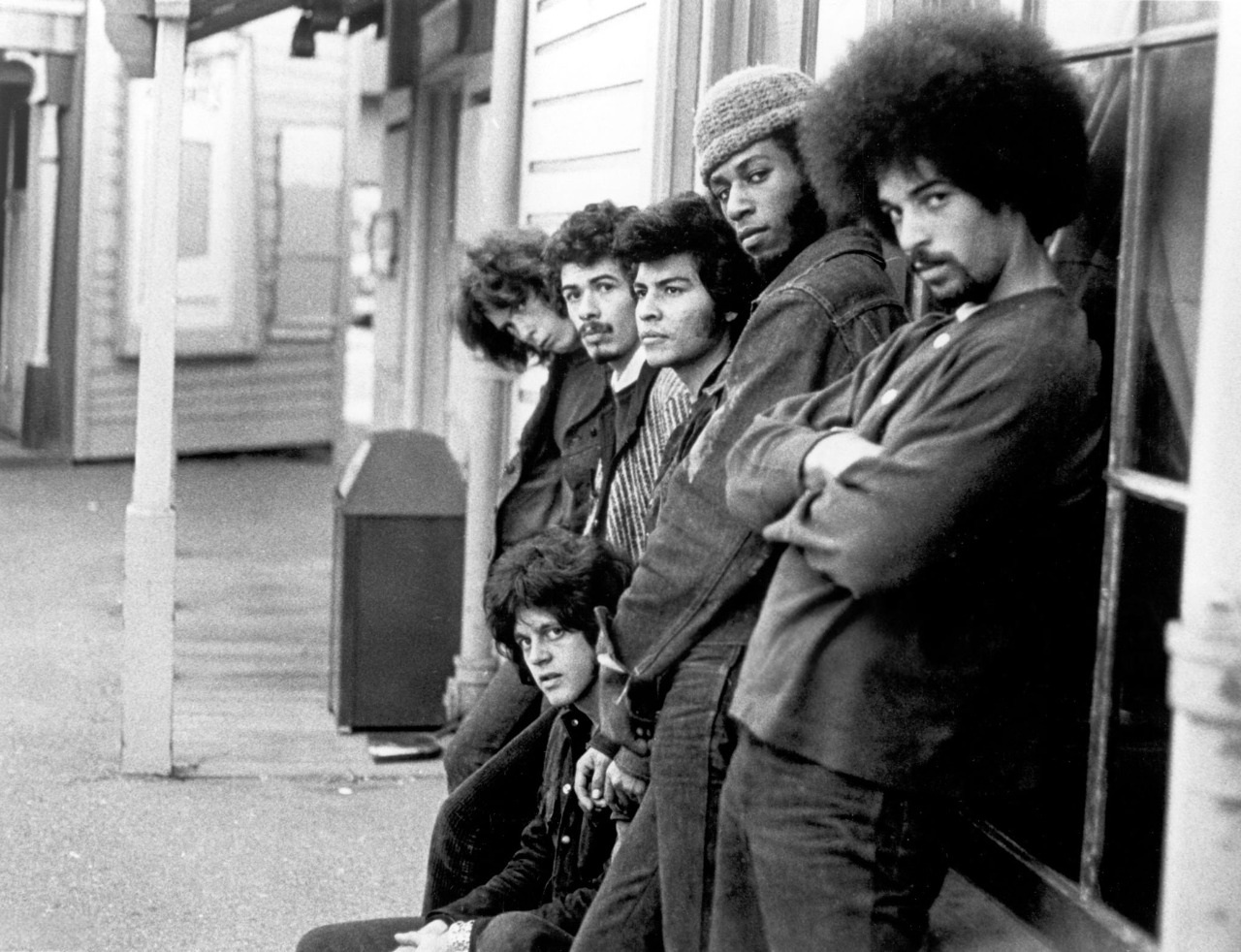 |
| ✔ Santana #5 © Michael Ochs |
|
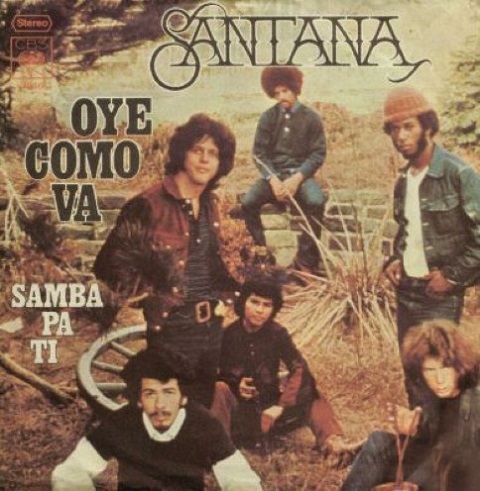 |
| Santana #5 © Michael Ochs |
|
|
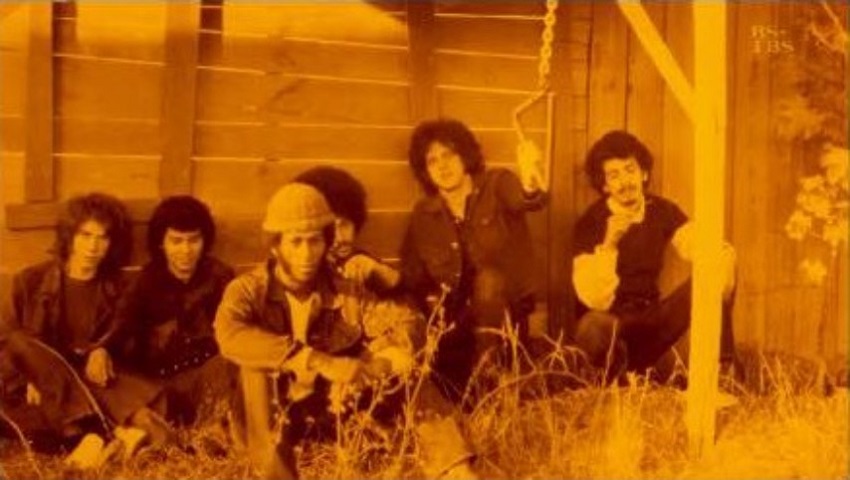 |
| Santana #5 © Michael Ochs |
|
|
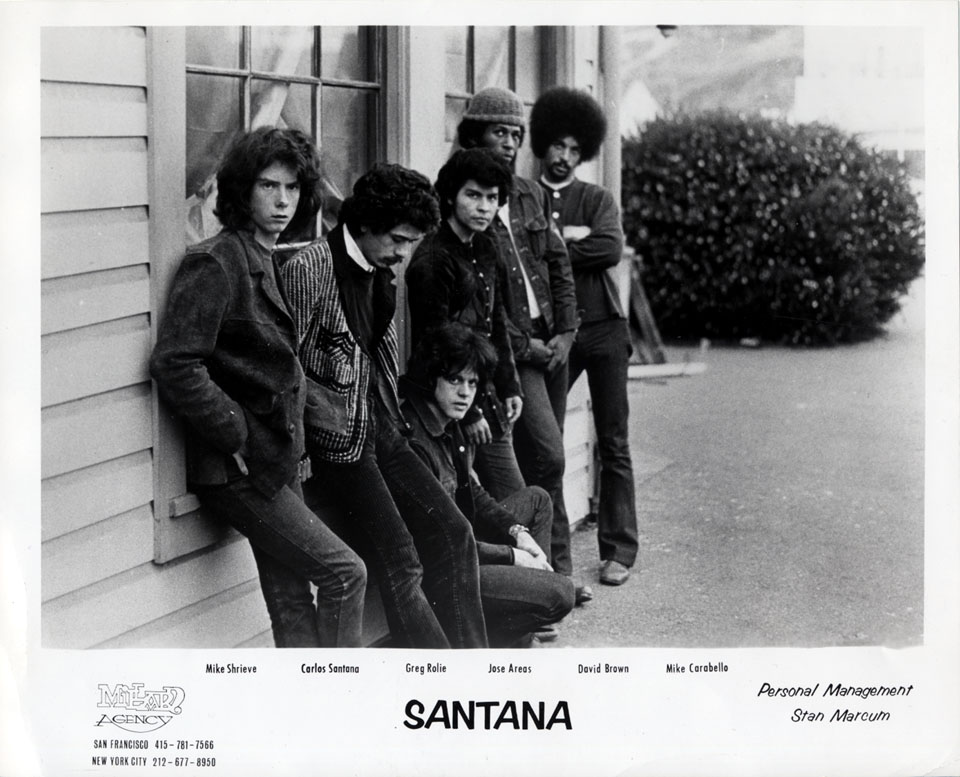 |
| Santana #5 © Michael Ochs |
|
|
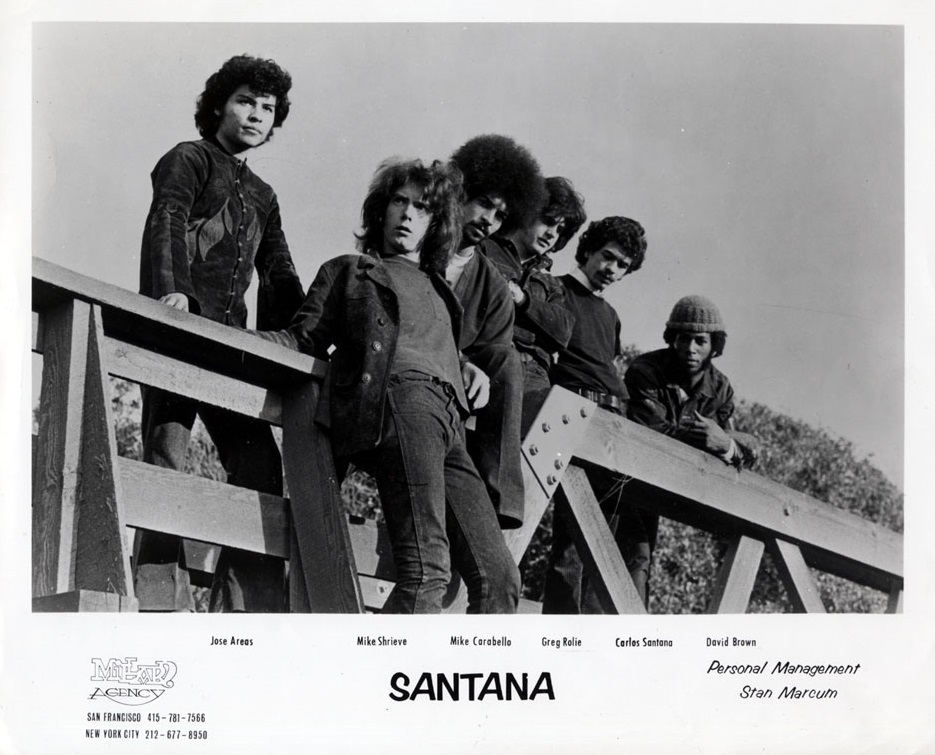 |
| Santana #5 © Michael Ochs |
|
|
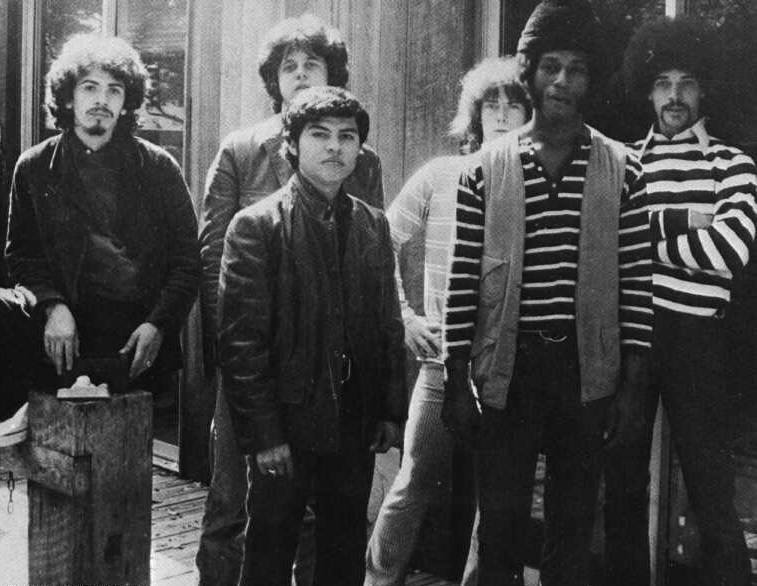 |
| Santana #5 © Coni Beeson |
|
|
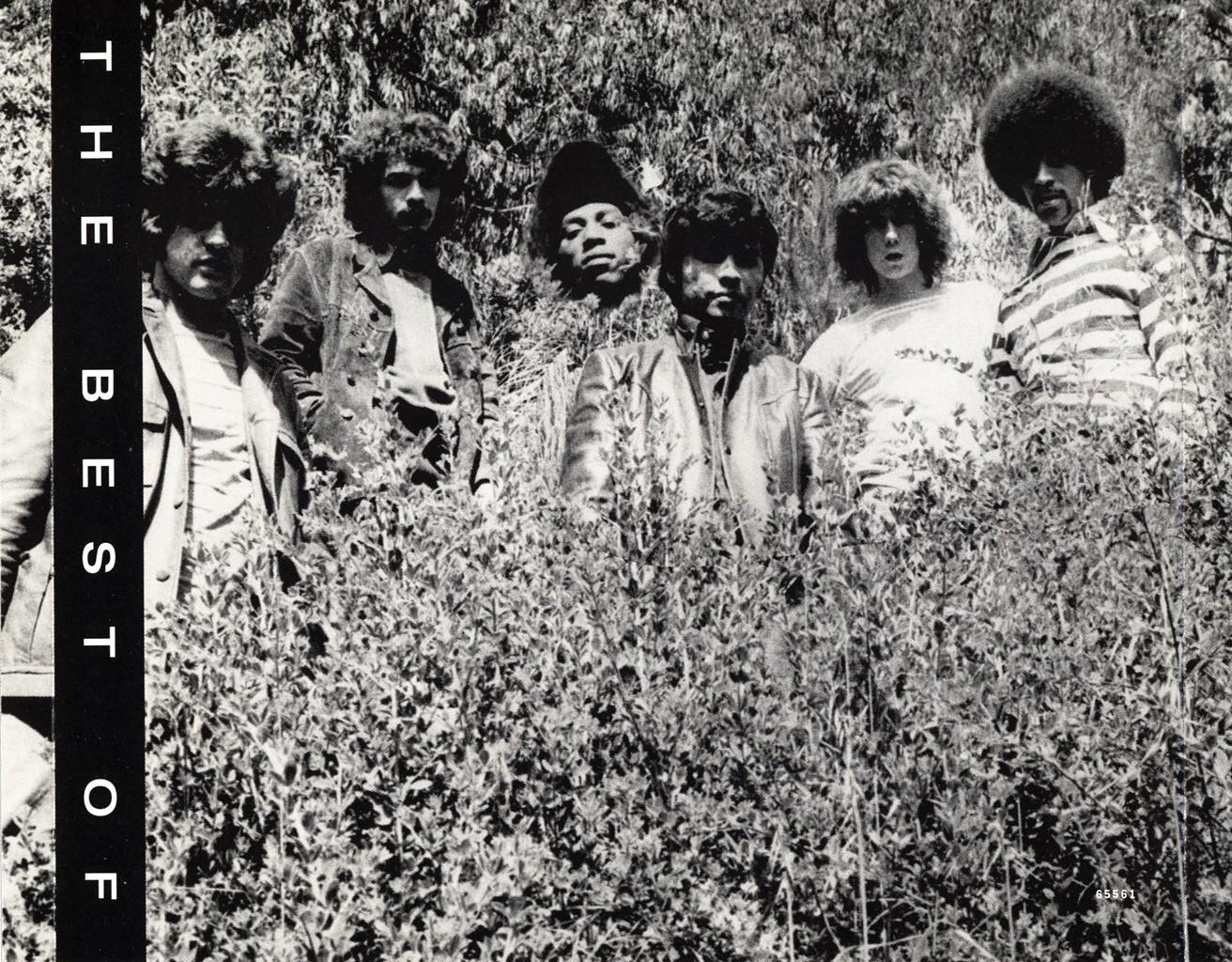 |
| Santana #5 |
|
|
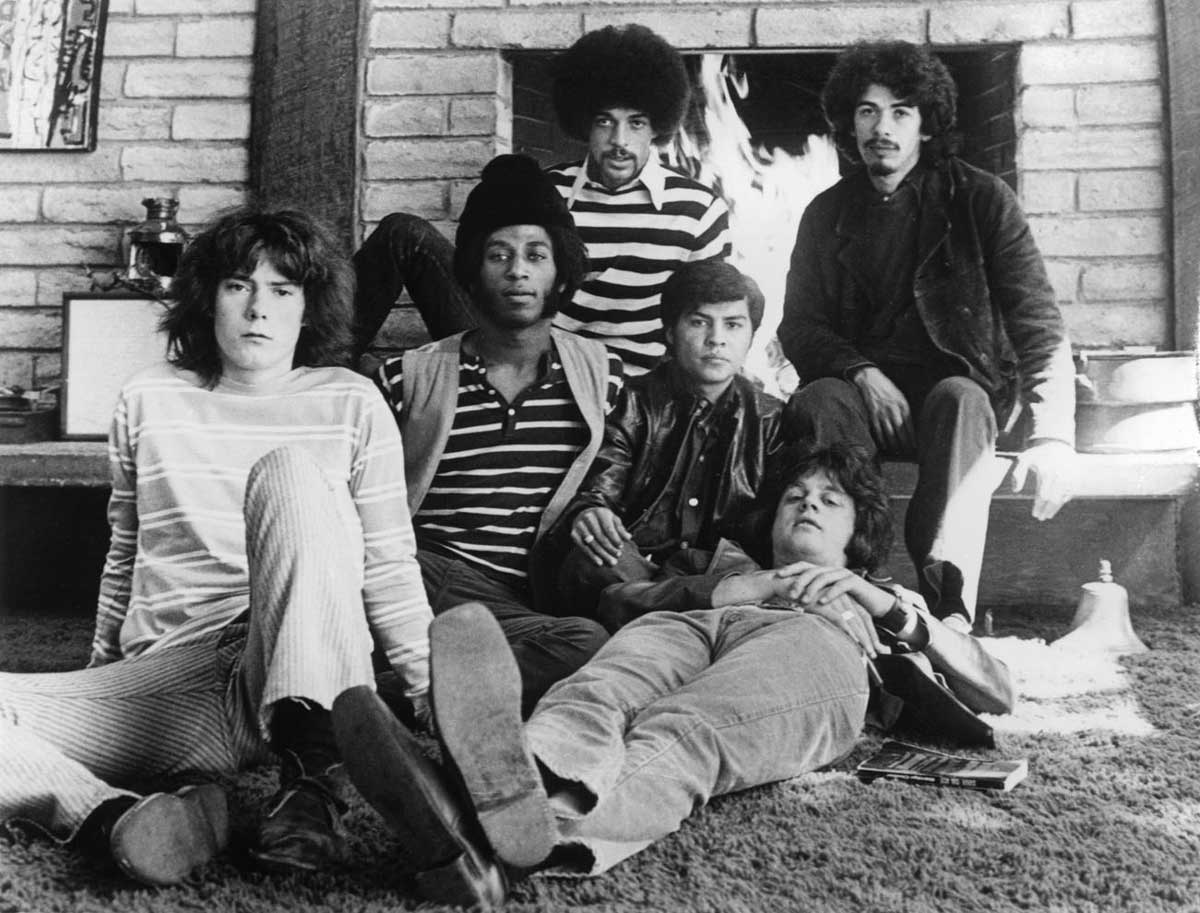 |
| Santana #5 © Coni Beeson |
|
|
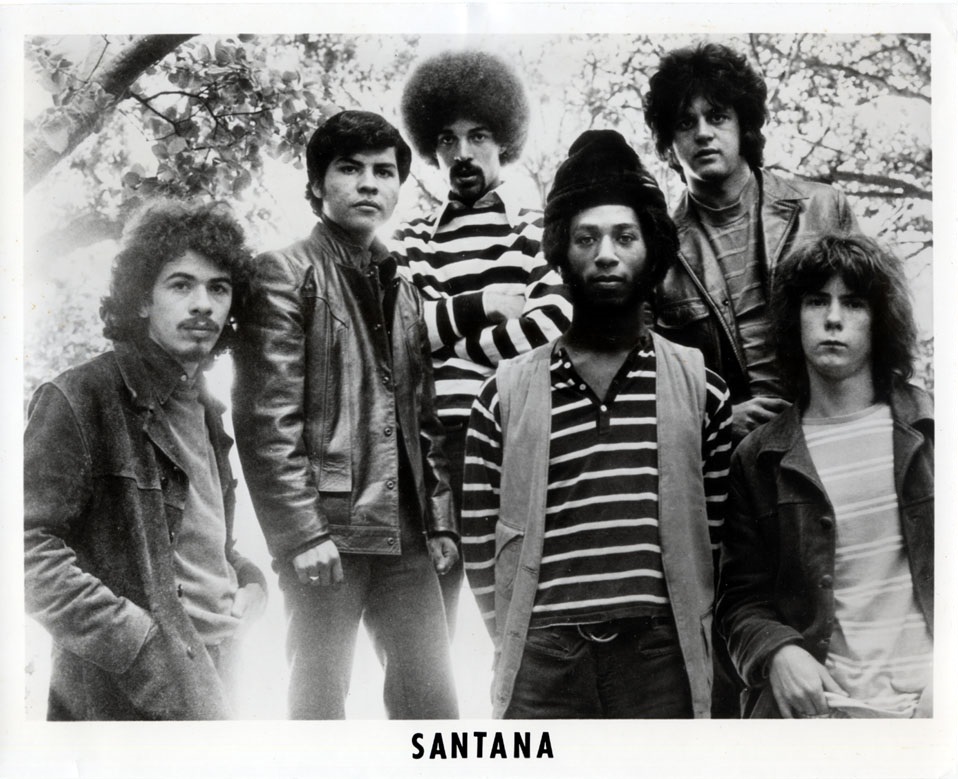 |
| Santana #5 © Coni Beeson |
|
|
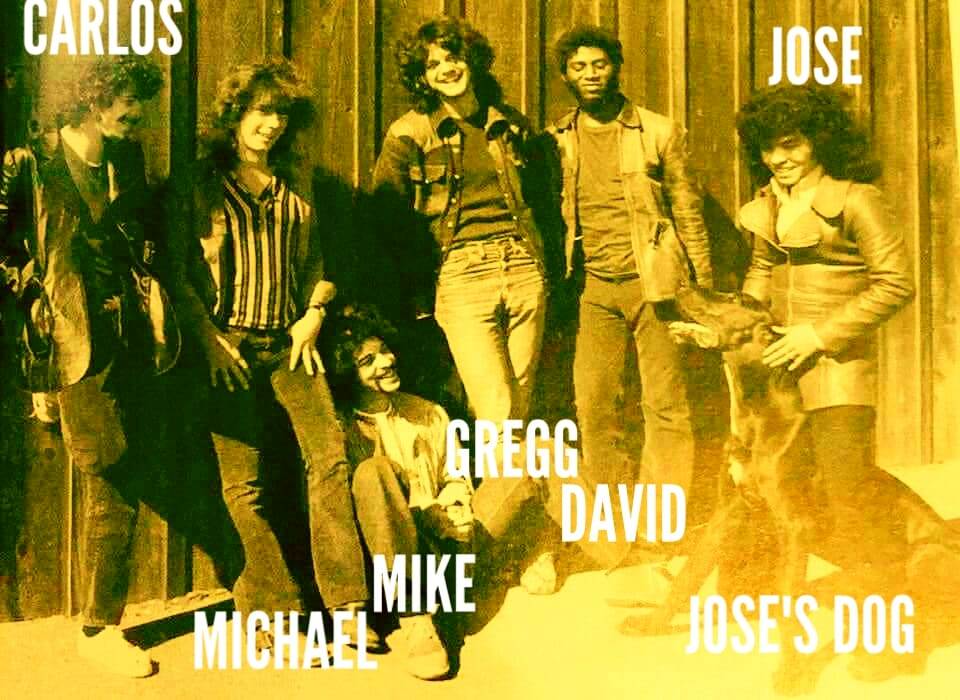 |
| Santana #5 |
|
|
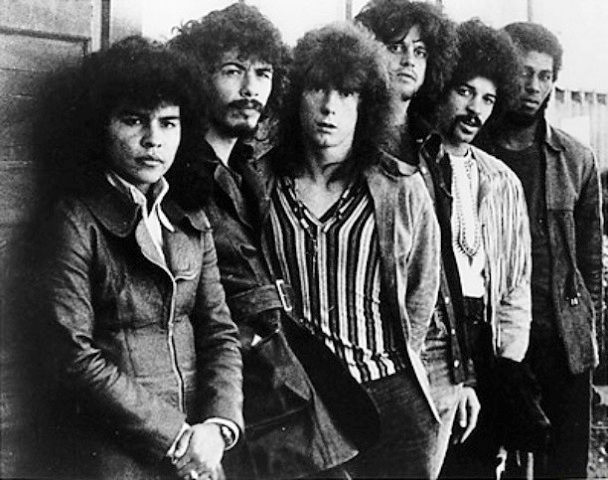 |
| Santana #5 |
|
|
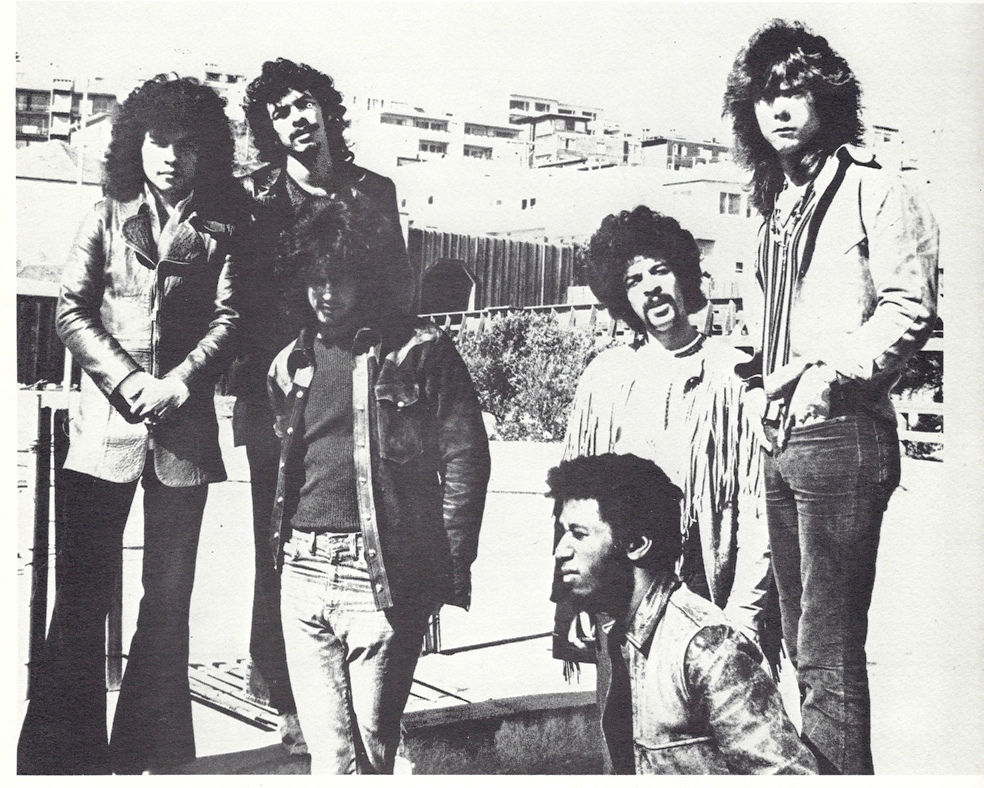 |
| Santana #5 |
|
|
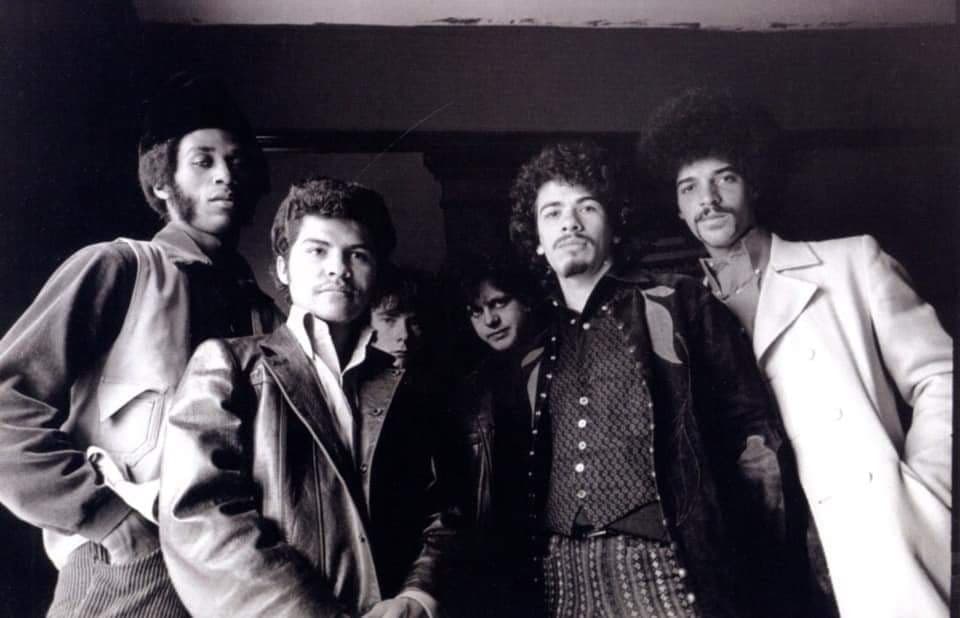 |
| Santana #5 |
|
|
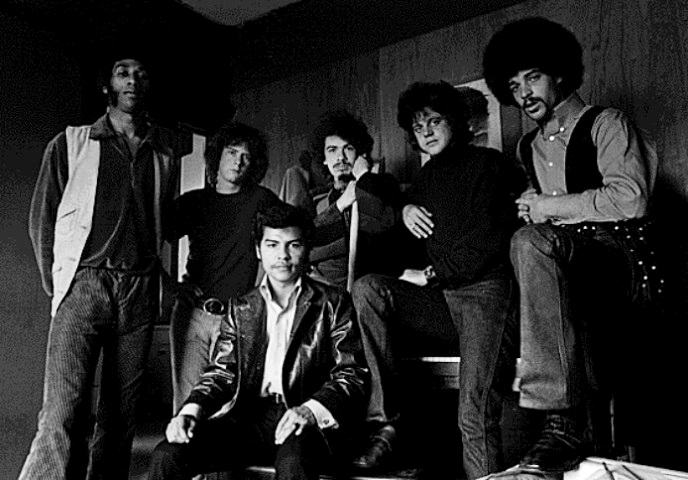 |
| Santana #5 |
|
|
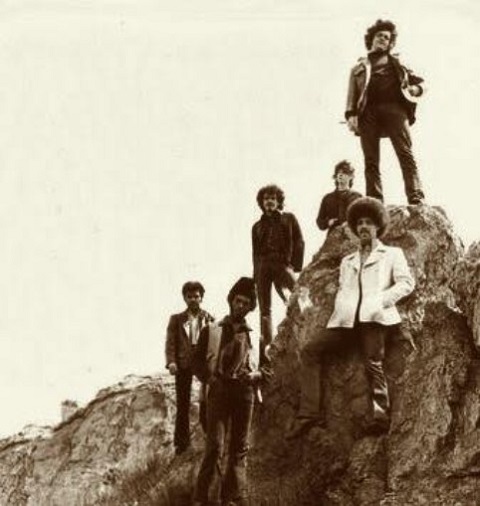 |
| Santana #5 |
|
|
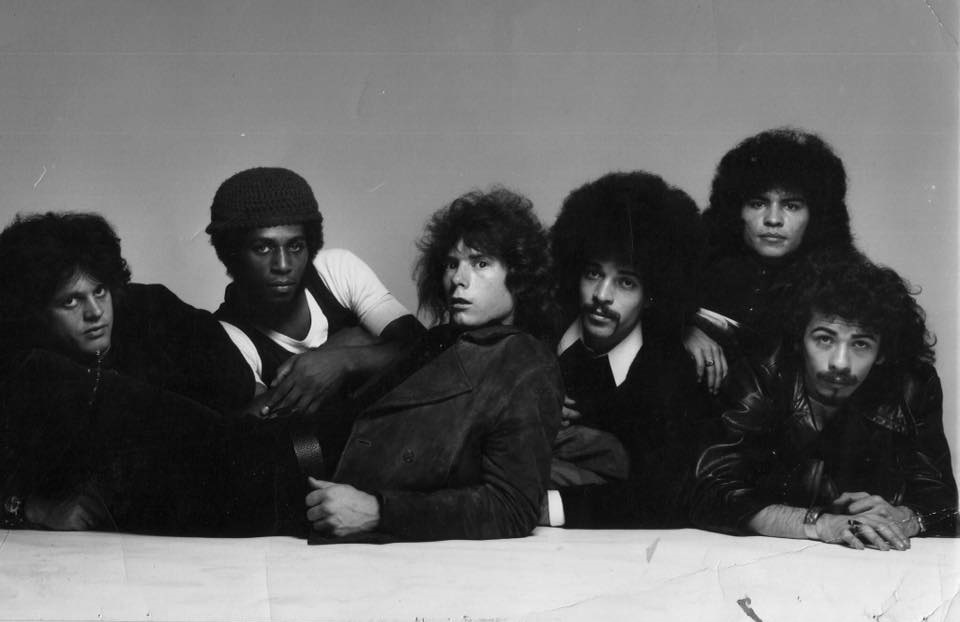 |
| Santana #5 © Richard Avedon |
|
|
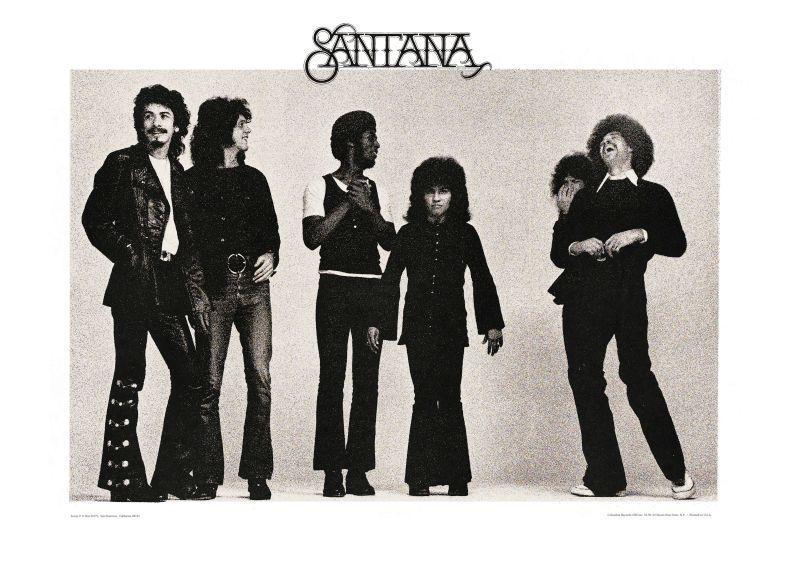 |
| Santana #5 |
|
|
 |
| Santana #5 with Clive Davis Jan 1970 |
|
|
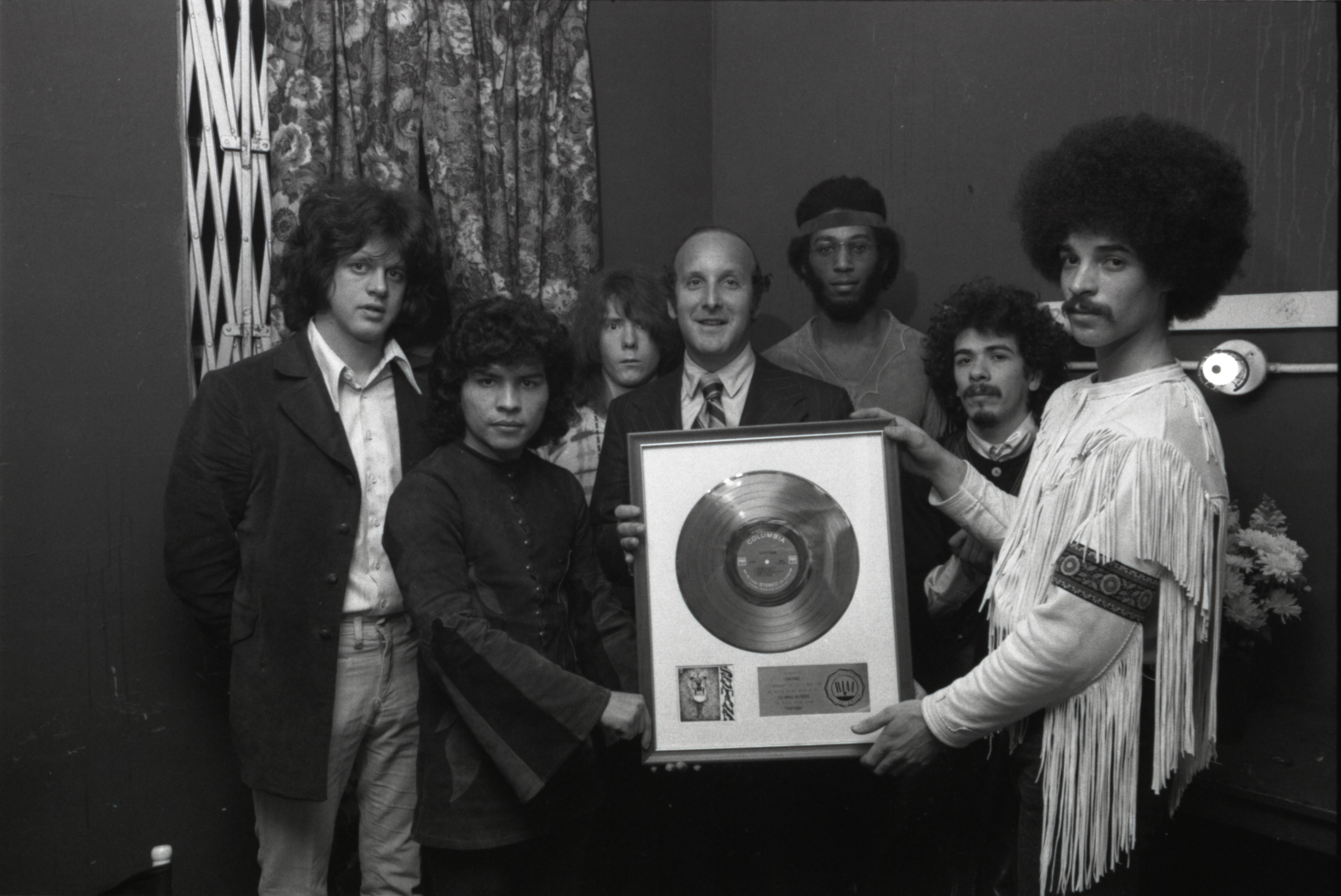 |
| Santana #5 with Clive Davis Jan 1970 |
|
|
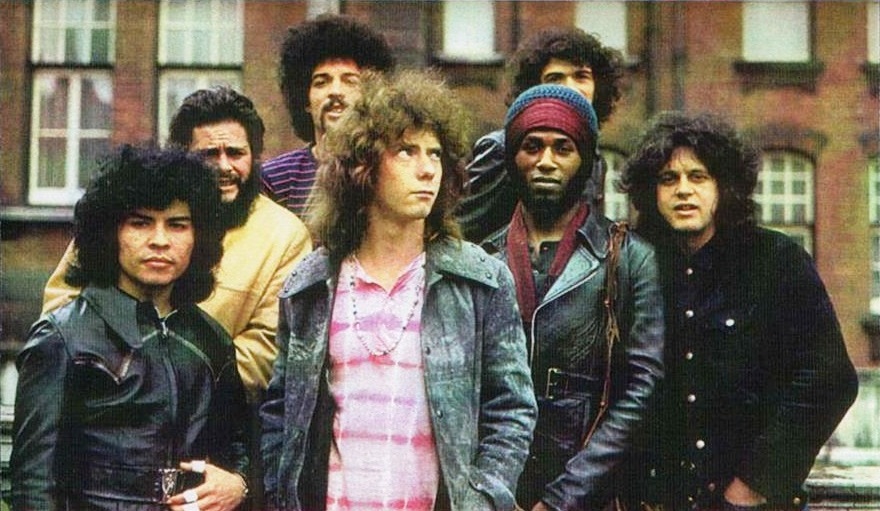 |
| Santana #5 with Alberto Gianquito (p) (1st from left). London, UK April 1970 |
|
|
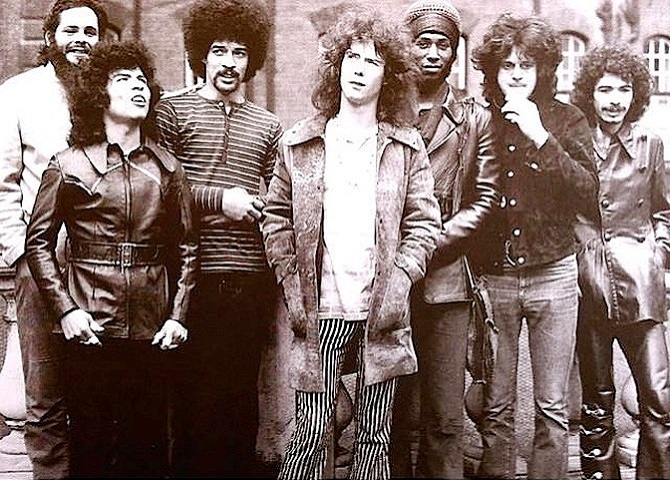 |
| Santana #5 with Alberto Gianquito (p) (1st from left). London, UK April 1970 |
|
|
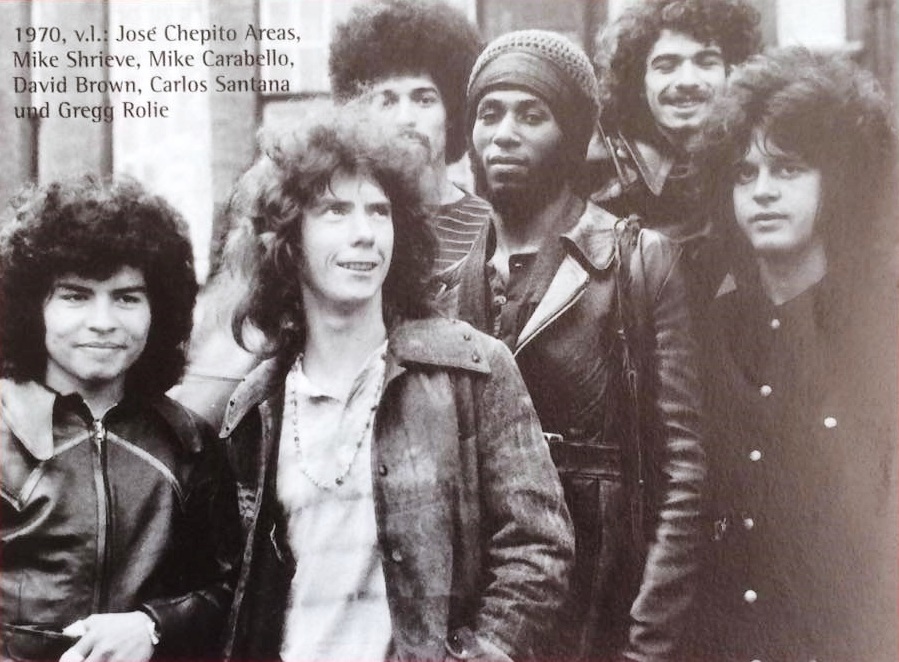 |
| Santana #5 without Alberto Gianquito (p). London, UK April 1970 |
|
|
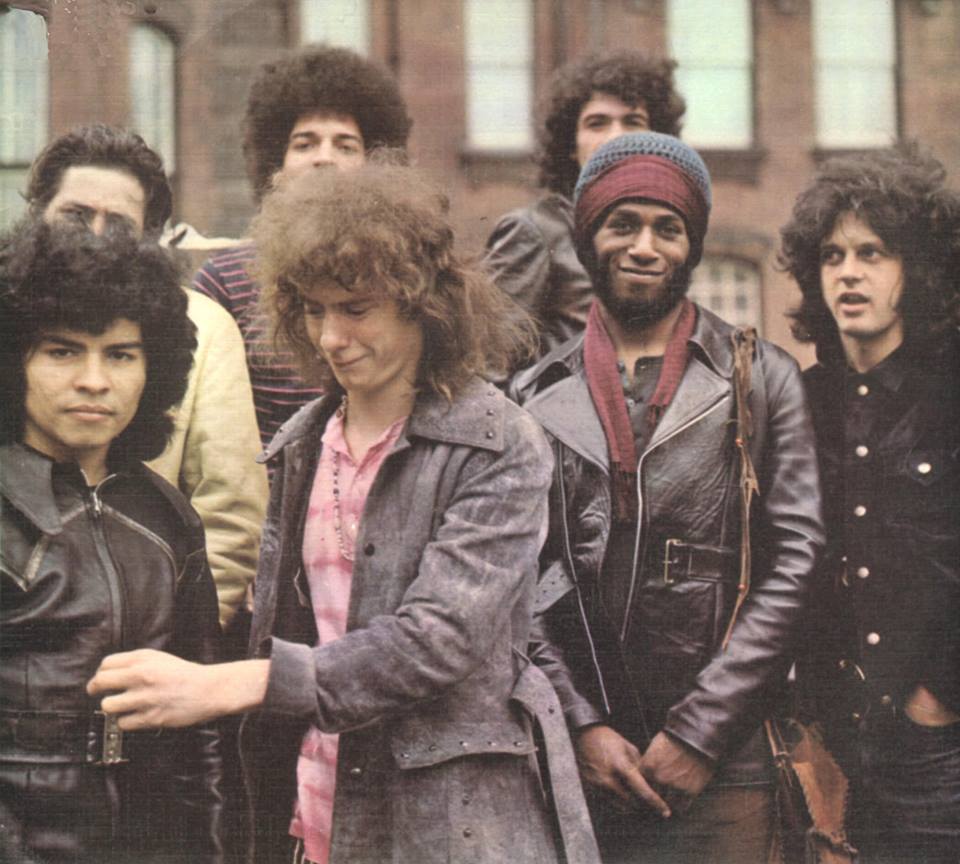 |
| Santana #5 with Alberto Gianquito (p) (1st from left). London, UK April 1970 |
|
|
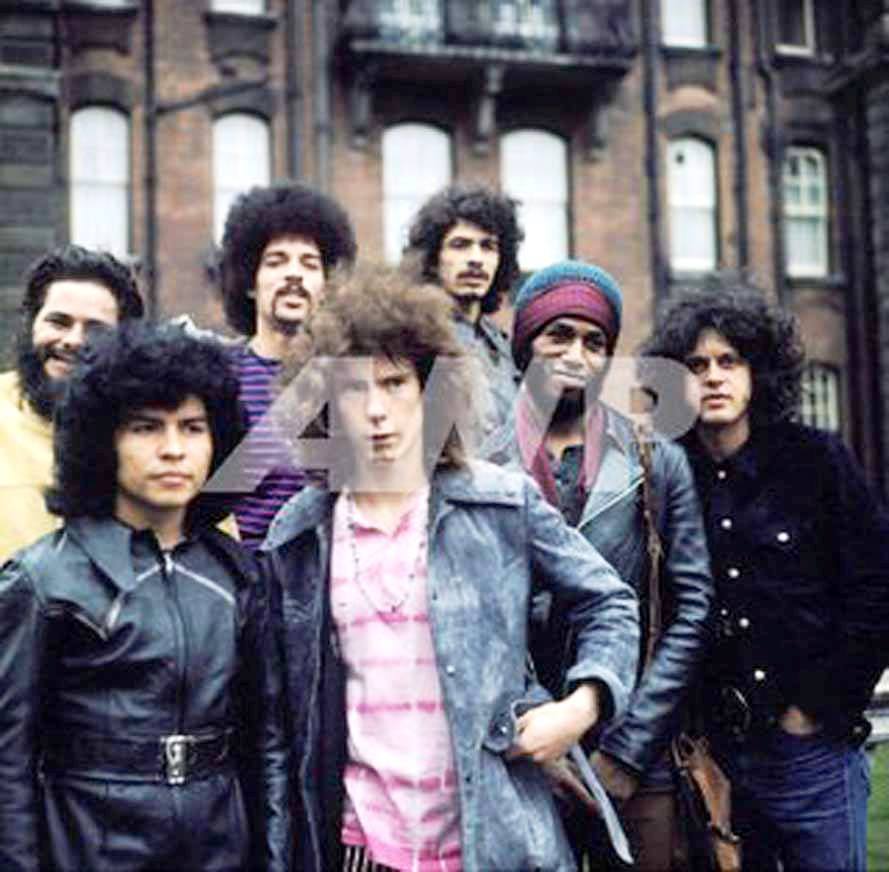 |
| Santana #5 with Alberto Gianquito (p) (1st from left). London, UK April 1970 |
|
|
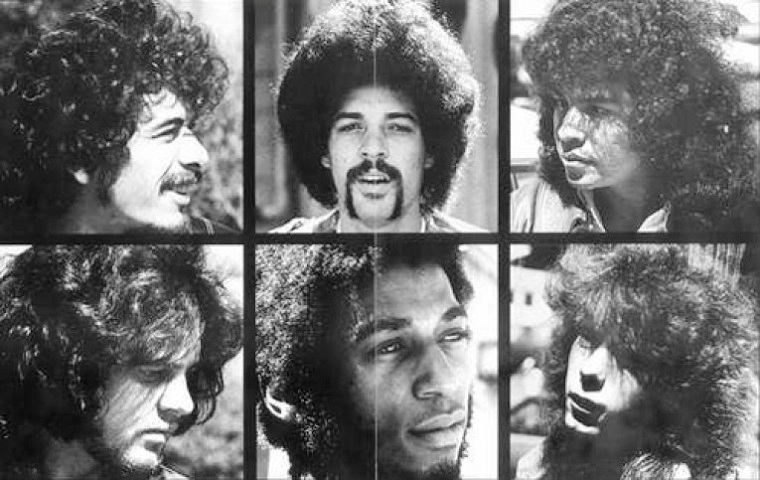 |
| Santana #5 |
|
|
|
|
|
Santana #6: Thursday Nov 19, 1970
(left to right ✔) Neal Schon (g), Michael Shrieve (ds), David Brown (b), Carlos Santana (g/perc/vo), Gregg Rolie (kbd/vo), Jose “Chepito” Areas (perc), Michael Carabello (perc)
A second guitarist joins the band, Neal Schon.
Quote from Carlos Santana (The Universal Tone 2014): By the end of 1970, Neal Schon had been hanging around for a while, jamming with us. (…) I liked Neal’s dexterity, and he brought a lot of fire for someone so young, yet in a humble way. (…) It was my decision to ask him to join us, after I spoke with the rest of the band. Neal said yes, and by December he was part of Santana. (…) I asked Neal to join not because I was thinking about who played which parts or that it would free me up---it was much more about adding more flames to the band, the sound and energy we had together. The fire that Neal brought was a white, white heat. (p264-265)
|
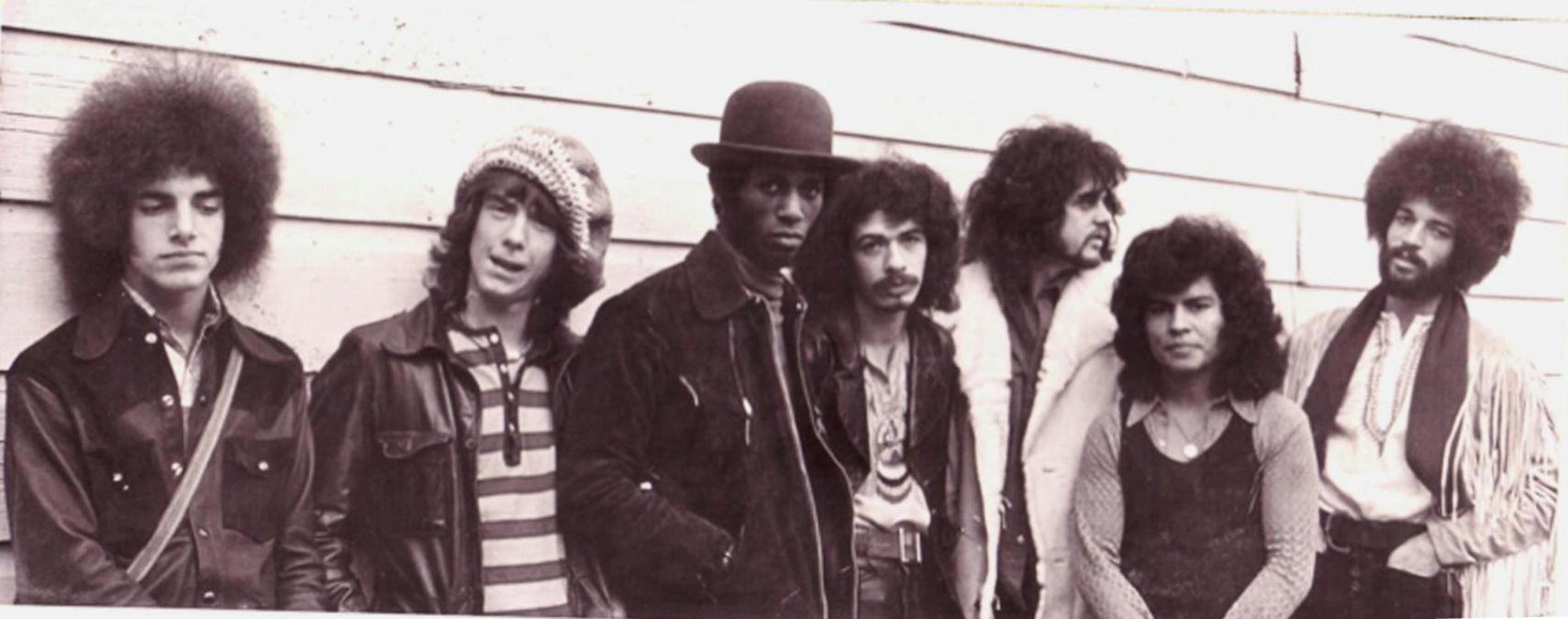 |
| ✔ Santana #6 © Joan Chase |
|
|
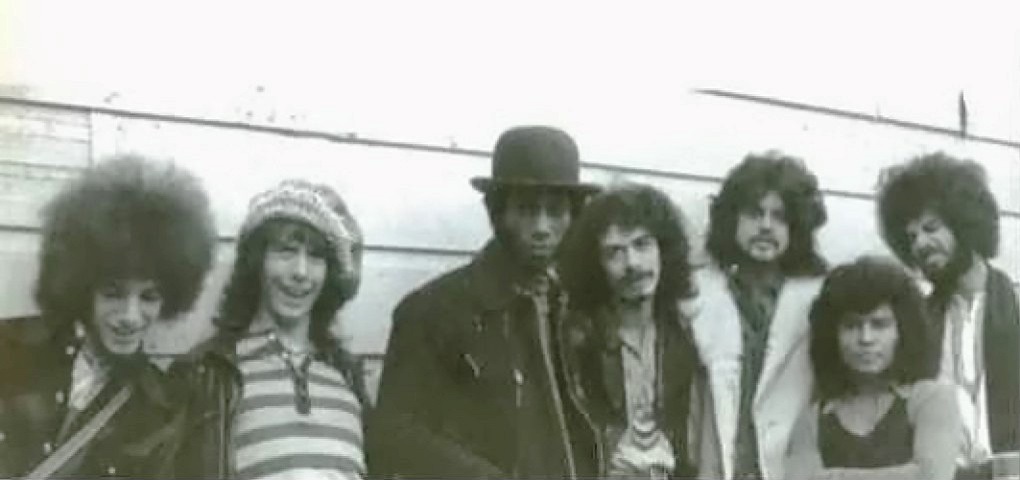 |
| Santana #6 © Joan Chase |
|
|
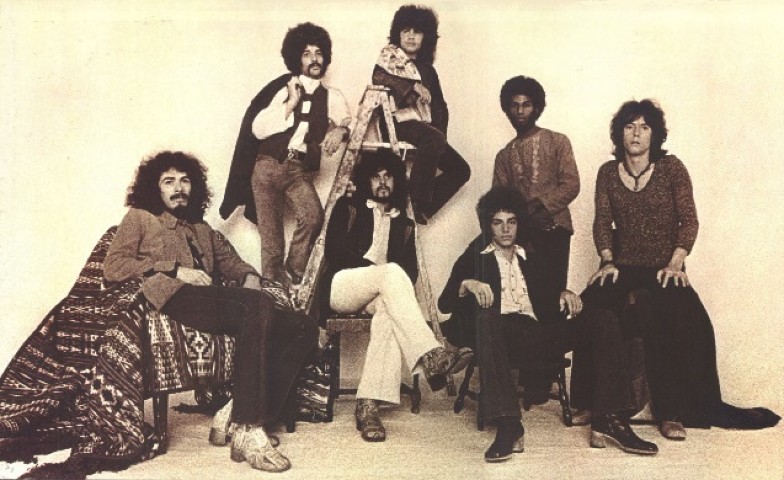 |
| Santana #6 © Joan Chase |
|
|
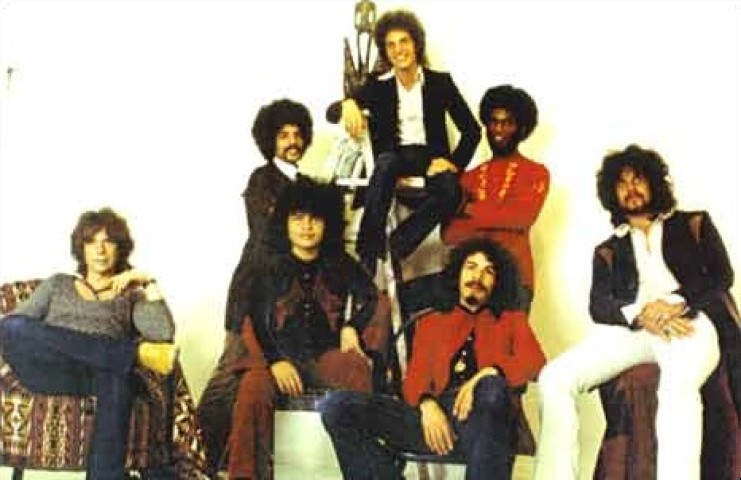 |
| Santana #6 © Joan Chase |
|
|
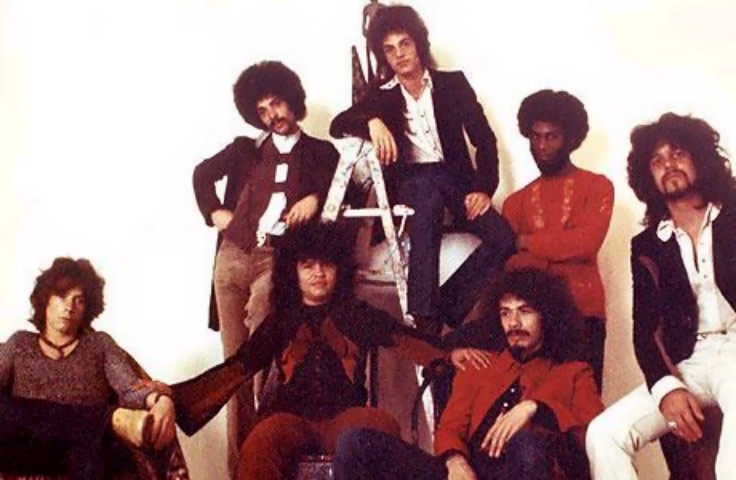 |
| Santana #6 © Joan Chase |
|
|
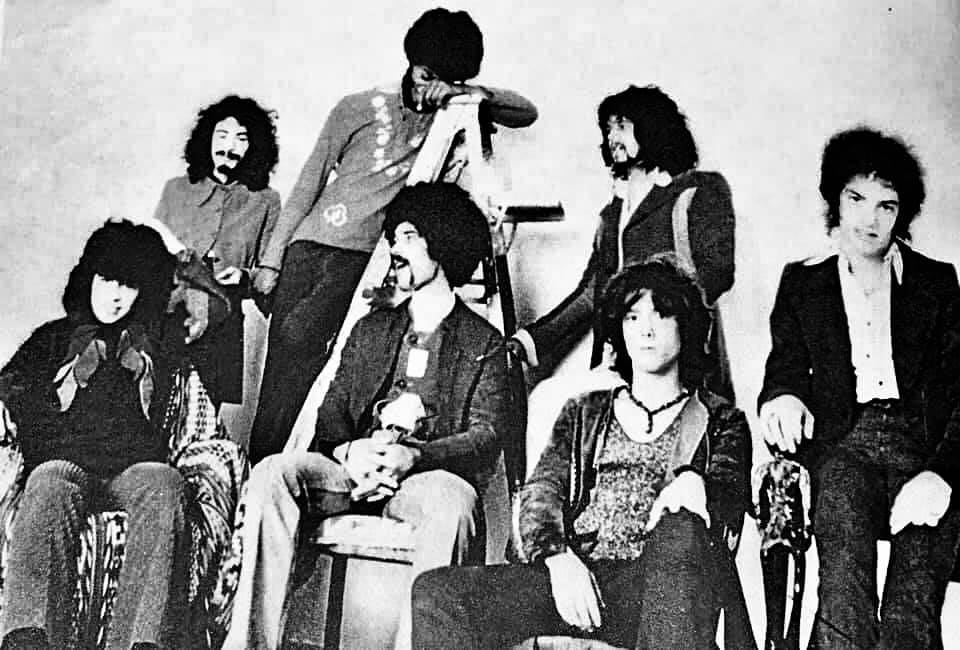 |
| Santana #6 © Joan Chase |
|
|
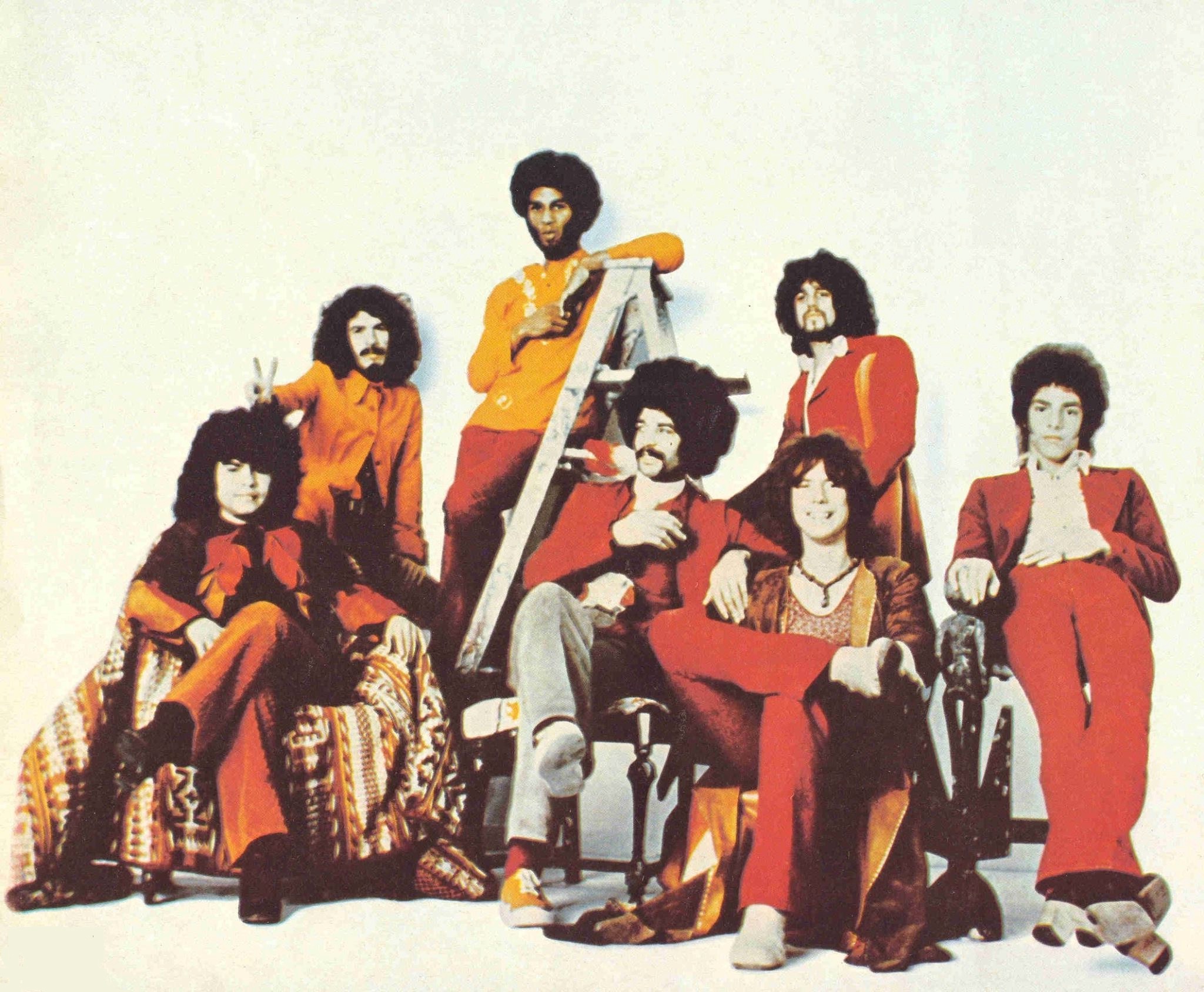 |
| Santana #6 © Joan Chase |
|
|
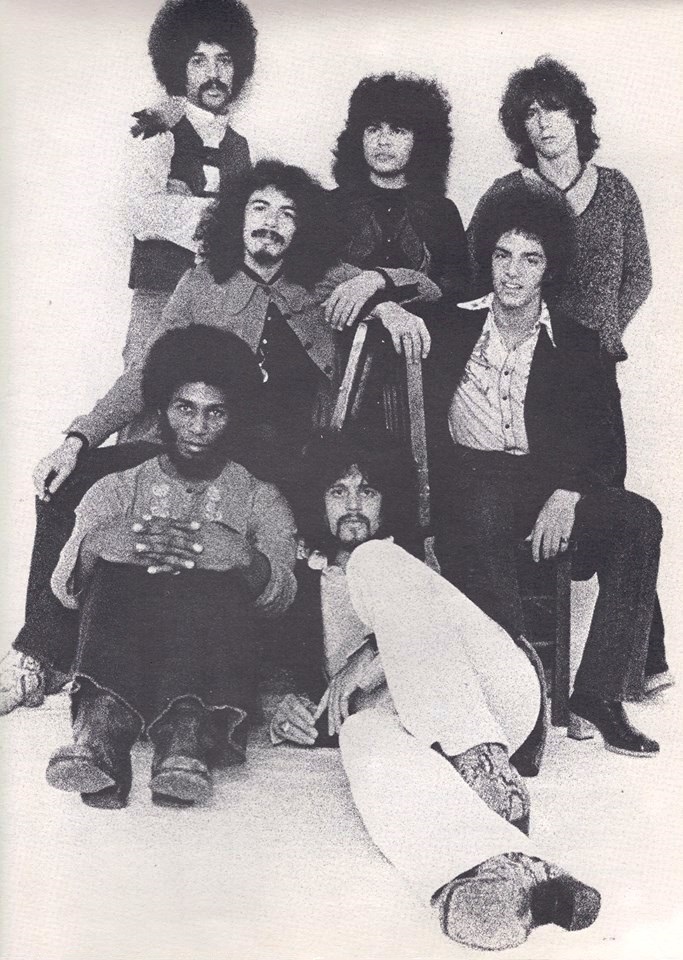 |
| Santana #6 © Joan Chase |
|
|
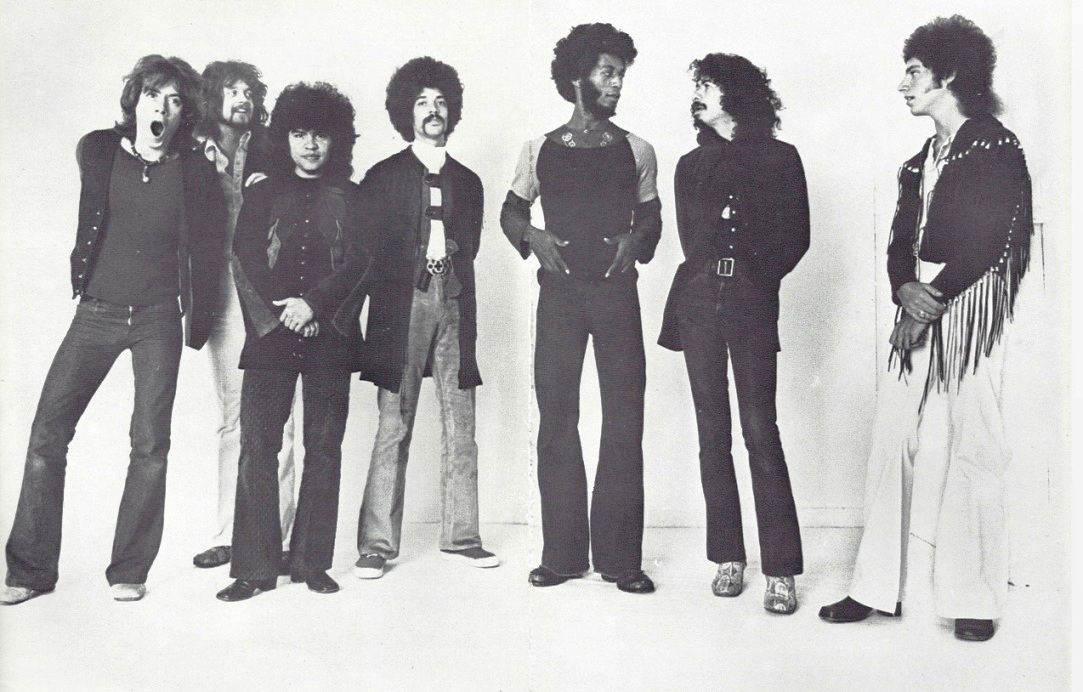 |
| Santana #6 |
|
|
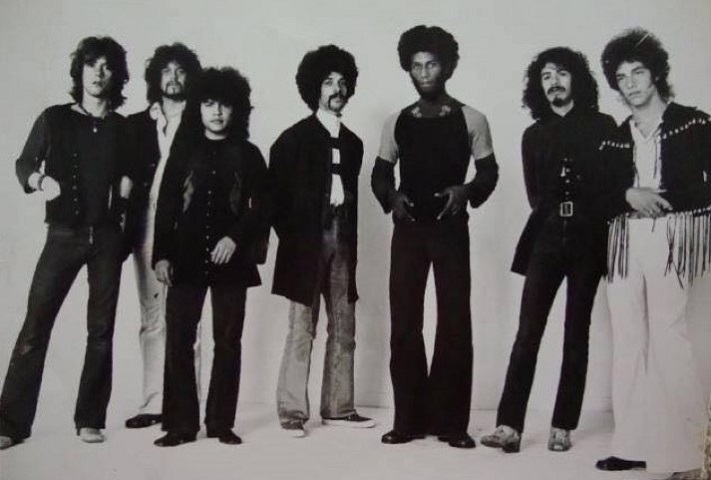 |
| Santana #6 |
|
|
|
|
|
Santana #7: March 1971
(left to right ✔) Coke Escovedo (perc), David Brown (b), Michael Carabello (perc), Jose "Chepito" Areas (perc), Neal Schon (g), Gregg Rolie (kbd/vo), Carlos Santana (g/perc/vo), Michael Shrieve (ds)
A third percussionist joins the band, Coke Escovedo. Doug Rauch (b) travels with them for the European tour. Victor Pantoja (perc) and Rico Reyes (perc) play with the band occasionally after the European tour.
Quote from Carlos Santana (The Universal Tone 2014): That’s how things flowed in San Francisco. Santana was never exclusive---like many bands, we played and jammed and did sessions with each other and found new ideas and people to go on the road with. (…) Coke came in and added so much to the sessions from the start that we had to give him credit for the inspiration he brought to that album. (…) Coke helped write “No One To Depend On,” the second single from Santana III, and he started touring with us. (p272-273)
Quote from Carlos Santana (The Universal Tone 2014): Chepito recovered from his aneurysm, and he and Coke Escovedo joined us after we got back from Africa. (p283)
|
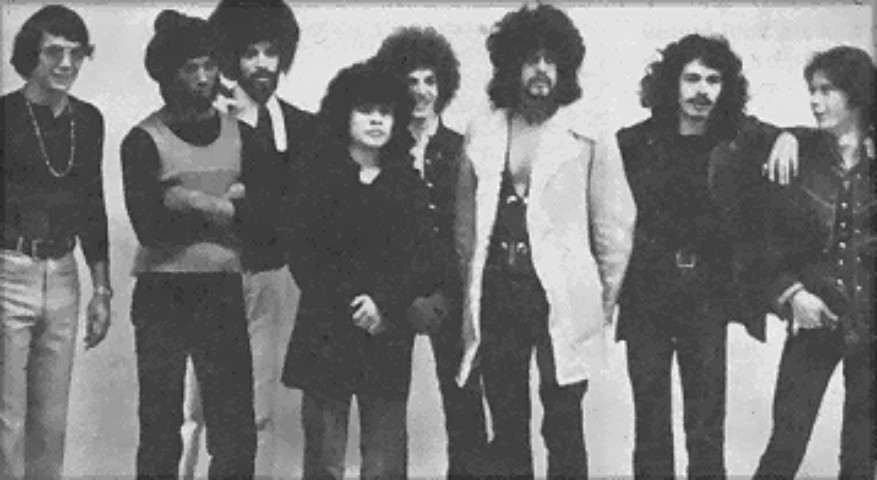 |
| ✔ Santana #7 |
|
|
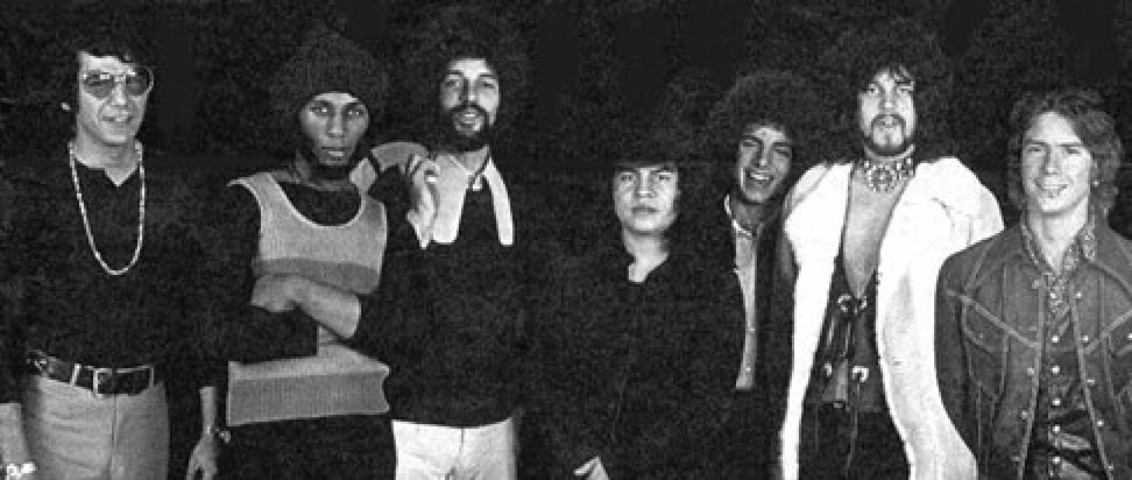 |
| Santana #7. Bandleader Carlos Santana (g,perc,vo) not pictured |
|
|
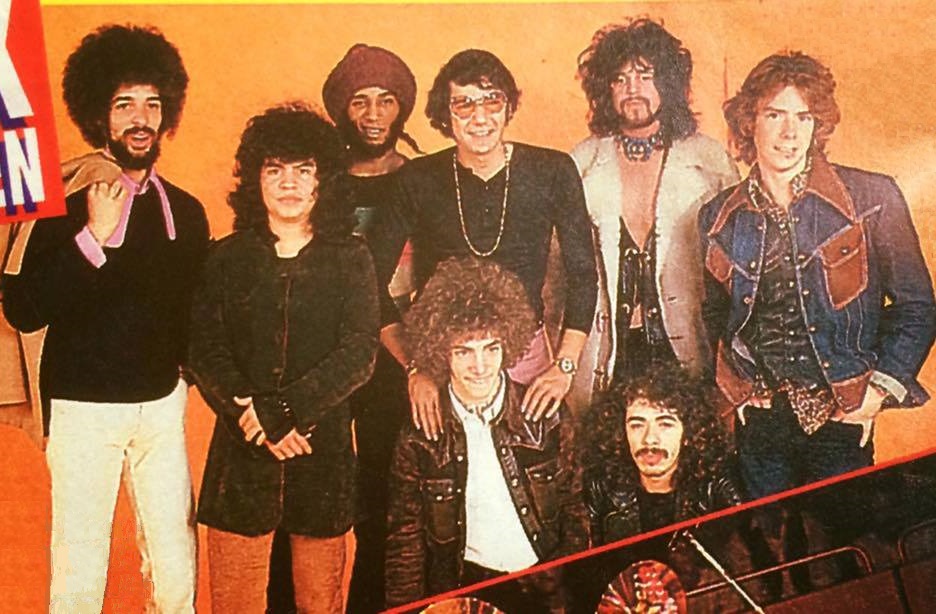 |
| Santana #7 © Didi Zill. Circus Krone-Bau, Munich, Germany April 20, 1971 |
|
|
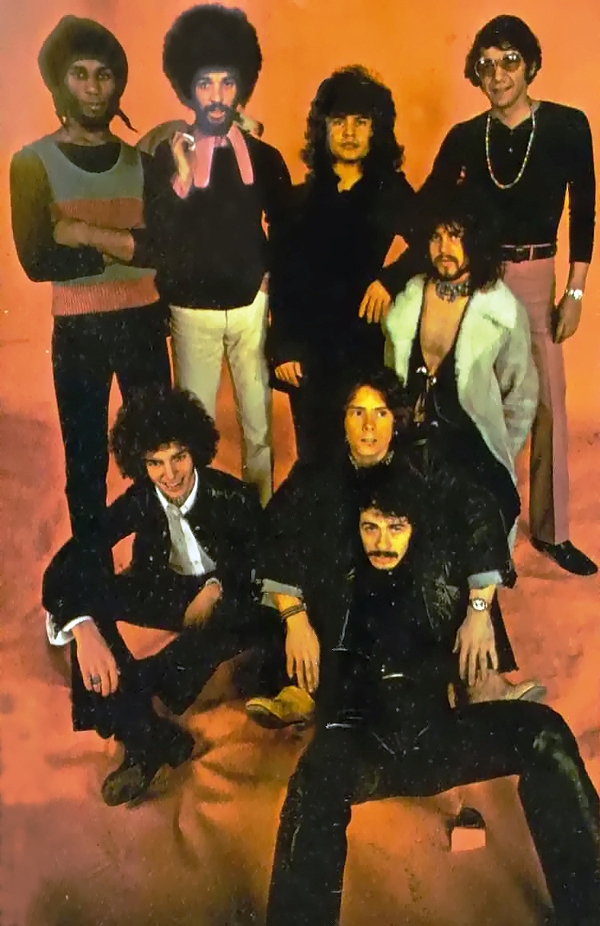 |
| Santana #7 © Didi Zill. Circus Krone-Bau, Munich, Germany April 20, 1971 |
|
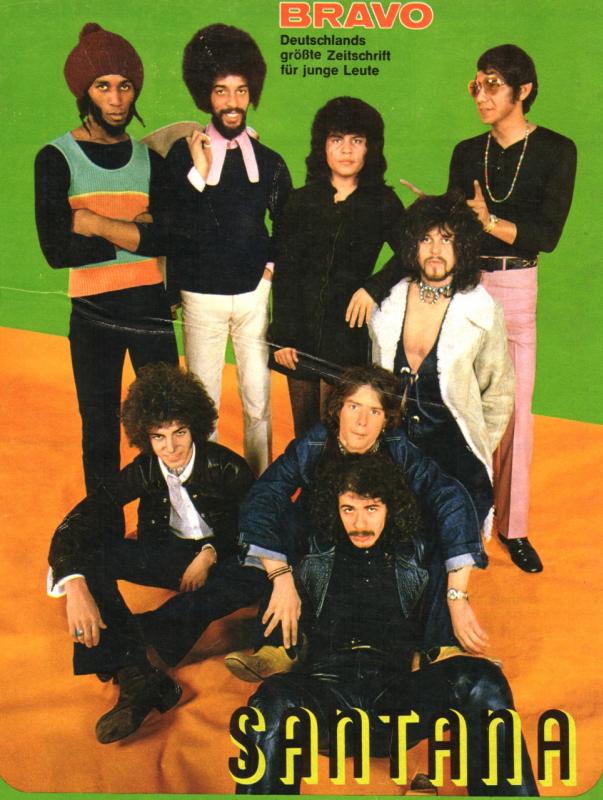 |
| Santana #7 © Didi Zill. Circus Krone-Bau, Munich, Germany April 20, 1971 |
|
|
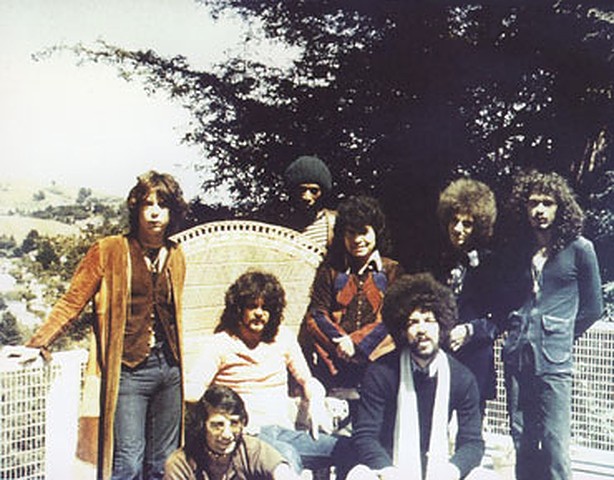 |
| Santana #7 |
|
|
|
|
|
Santana #8: Aug 1971
Carlos Santana (g/perc/vo), Tom Rutley (b), Michael Shrieve (ds), Michael Carabello (perc), Jose “Chepito” Areas (perc), Coke Escovedo (perc), Gregg Rolie (kbd/vo), Neal Schon (g)
David Brown is replaced by Tom Rutley.
Quote from Carlos Santana (The Universal Tone 2014): Not long after that it was clear to everyone that David was not doing well---his heroin use was showing, and his playing and the music were starting to suffer. (…) I made the decision to fire David. (…) We had dates to play; so we replaced David with Tom Rutley, an acoustic bass player Shrieve had worked with in a big band in college. (…) He was only with us for a short time before Dougie Rauch took over, but Tom helped us at just the right time. (p288-289)
|
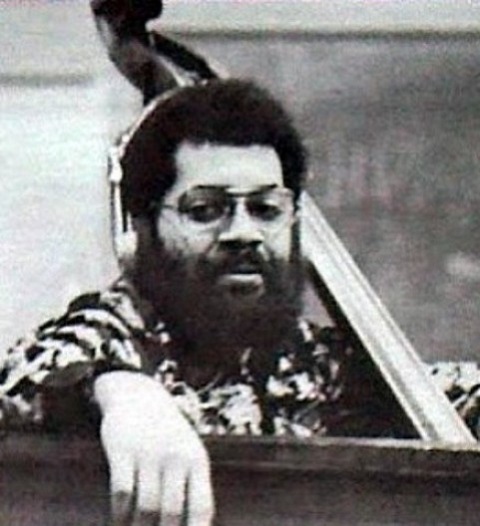 |
| Santana #8. Tom Rutley (b). Unknown Date |
|
|
|
|
|
Santana #9: Late Sept 1971
Tom Rutley (b), Michael Shrieve (ds), Michael Carabello (perc), Jose “Chepito” Areas (perc), Coke Escovedo (perc), Gregg Rolie (kbd/vo), Neal Schon (g)
Due to serious tensions between members, the band goes on tour without Carlos Santana.
Quote from Carlos Santana (The Universal Tone 2014): Sometime in September, before another tour across the country, I opened my mouth, and there was an argument, and by the end of it I said, “I’m not going unless we get rid of Stan Marcum and Carabello, because they’re suppling the band with the heavy stuff and we sound like shit. We’re not practicing, and it’s embarrassing. Either those guys are out or I’m out.” I had to do what I had to do. Stan and Carabello were in the room and I said this in front of them. They laughed and said I coldn’t do that. “We leave on Monday, man. If you don’t show up, then you’re not in the band.” And that’s exactly what happened. It felt horrible. It felt really, really horrible to be part of a band that just left on tour without me. But that was it---there was no official separation announcement, no press release, and no legal agreement. Everyone left, and I stayed behind, licking my wounds. (p291)
|
|
|
|
Santana #10: Mid-Oct 1971
(left to right) Tom Rutley (b), Carlos Santana (g/perc/vo), James “Mingo” Lewis (perc), Jose “Chepito” Areas (perc), Michael Shrieve (ds), Gregg Rolie (kbd/vo), Neal Schon (g)
Michael Carabello is taken out of the band, and Carlos Santana returns to the band for the rest of the tour. During a show in New York, NY, a young percussionist, James “Mingo” Lewis, is taken from the audience, and is invited to join the band. Pete Escovedo plays with the band occasionally.
Quote from Carlos Santana (The Universal Tone 2014): Three weeks after Santana left for the road (minus this Santana), the phone rang. It was Neal. The band was going through the East Coast and was at the Felt Forum in New York. “Hey, Man, I don’t want to say this, because it’s probably bad for your ego, but the audience are screaming and booing---they want to hear you. They know you’re in Santana. Come on---why don’t you get on the next plane?” I wasn’t changing my mind. “No. Not unless you put Carabello and Stan on the next plane home. Then I’ll be there.” I heard later that when the band made up its mind to get me back and send Carabello and Stan home, the two of them went around to everyone’s room, letting people know how upset and hurt they were. (…) The feeling right away was that this was going to be a new chapter for Santana. It wasn’t just that we had to find a new conguero; we also needed to do that while we were thousands of miles from the musicians we knew best. So one night in New York City we decided to put it out into the world, and we asked if there was a conga player in the audience. That’s how we found Mingo Lewis. He was a street musician with a lot of energy. (…) During those first shows there was definitely a division, or the feeling of a divide, in the band. (p292-293)
Quote from Carlos Santana (The Universal Tone 2014): But at the end of 1971, Santana was falling apart. Two of my oldest friends were gone from the band, and the mood in the band wasn’t pleasant---things were getting intense. (…) When something is over, it’s over. (…) We had gone from rooting each other to tolerating each other to being two bands in one, in conflict musically and philosophically. (p296)
Quote from Carlos Santana (The Universal Tone 2014): I am Santana---if I’m not in the band and it has the name Santana, then it’s a Santana tribute. (p298-299)
|
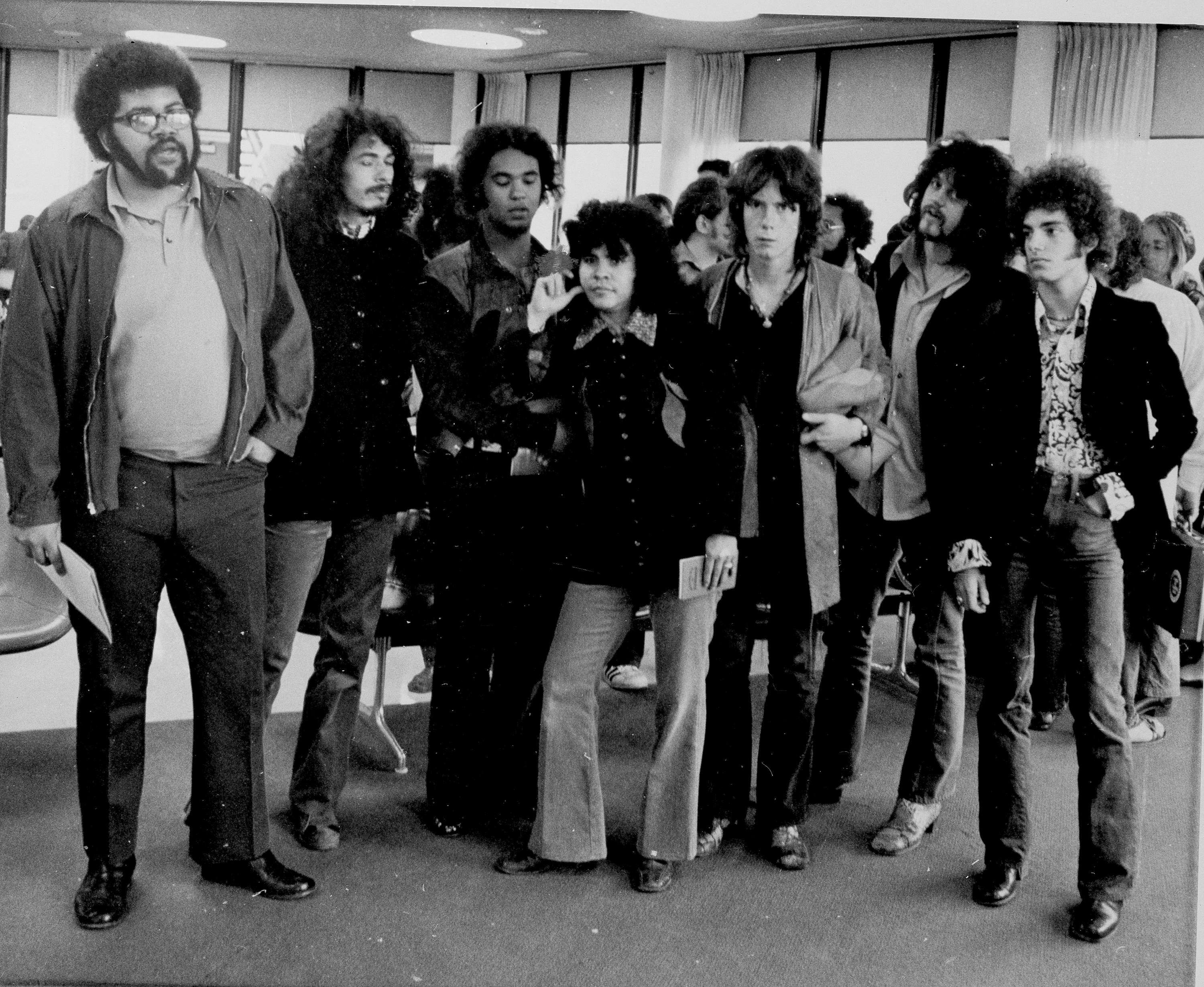 |
| Santana #10 after being deported from Peru. San Francisco International Airport, CA Dec 10, 1971 |
|
|
|
|
|
Santana #11 ("Caravanserai" Recording Band): Jan 1972
Carlos Santana (g/perc/vo), Tom Rutley (b), Doug Rauch (b/g), Michael Shrieve (ds), Jose "Chepito" Areas (perc), James "Mingo" Lewis (perc), Armando Peraza (perc/vo), Rico Reyes (perc/vo), Gregg Rolie (kbd/vo), Tom Coster (kbd/vo), Neal Schon (g)
Gregg Rolie and Neal Schon still record with the band in the studio, but are no longer touring members. Rico Reyes and Tom Rutley leave just after the recording of "Caravanserai". Doug Rauch, Tom Coster and Armando Peraza join the band.
Quote from Carlos Santana (The Universal Tone 2014): When Dougie came in on bass, and with Mingo on the congas, it was a whole new kind of rhythm---more flexible and looser. That really was when I started to feel that maybe Santana could go in a different direction, one that would be evident on our fourth album, Caravanserai. (p293)
Quote from Carlos Santana (The Universal Tone 2014): For me, Armando Peraza was the most important person to come into Santana that year---maybe any year. (…) Armando was an amazing spirit and force in the band. For me, he became a mentor and a tutor and a divine angel. (p306)
|
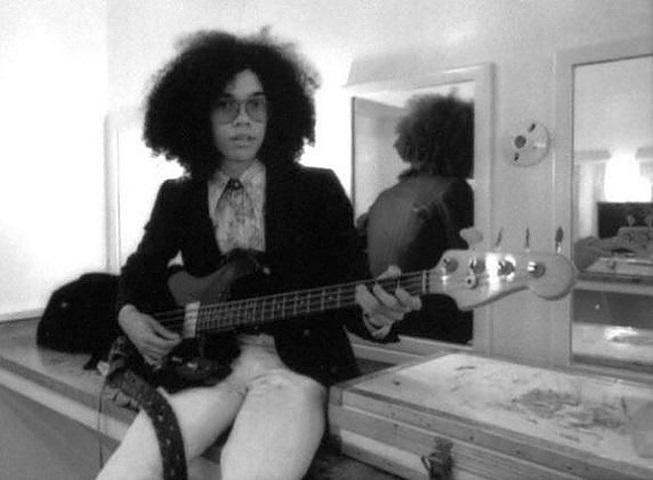 |
| Santana #11. Doug Rauch (b/g) |
|
|
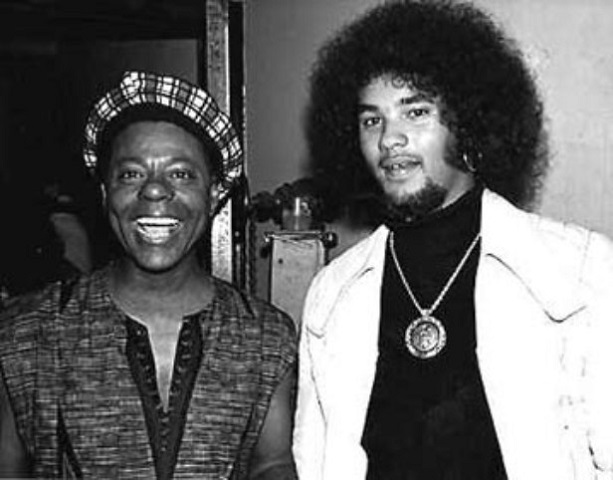 |
| Santana #11. (left to right) Armando Peraza (perc/vo), James "Mingo" Lewis (perc) |
|
|
|
|
|
Santana #12: Sept 1972
(left to right ✔) Armando Peraza (perc/vo), Carlos Santana (g/perc/vo), Jose “Chepito” Areas (perc), James “Mingo” Lewis (perc), Richard Kermode (kbd), Michael Shrieve (ds), Doug Rauch (b/g), Tom Coster (kbd/vo)
Richard Kermode joins the band.
Quote from Carlos Santana (The Universal Tone 2014): That was a really nice combination---TC and Kermode. (p316)
|
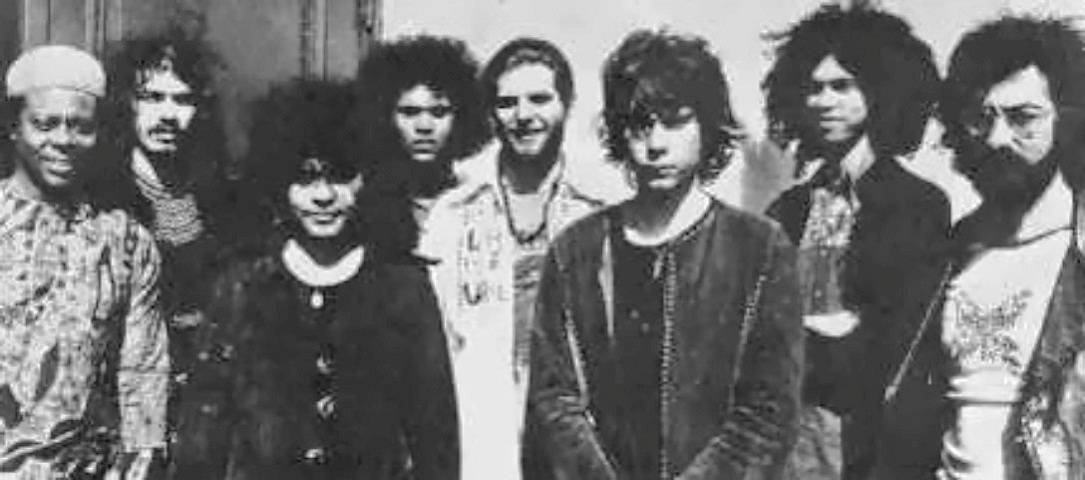 |
| ✔ Santana #12 |
|
|
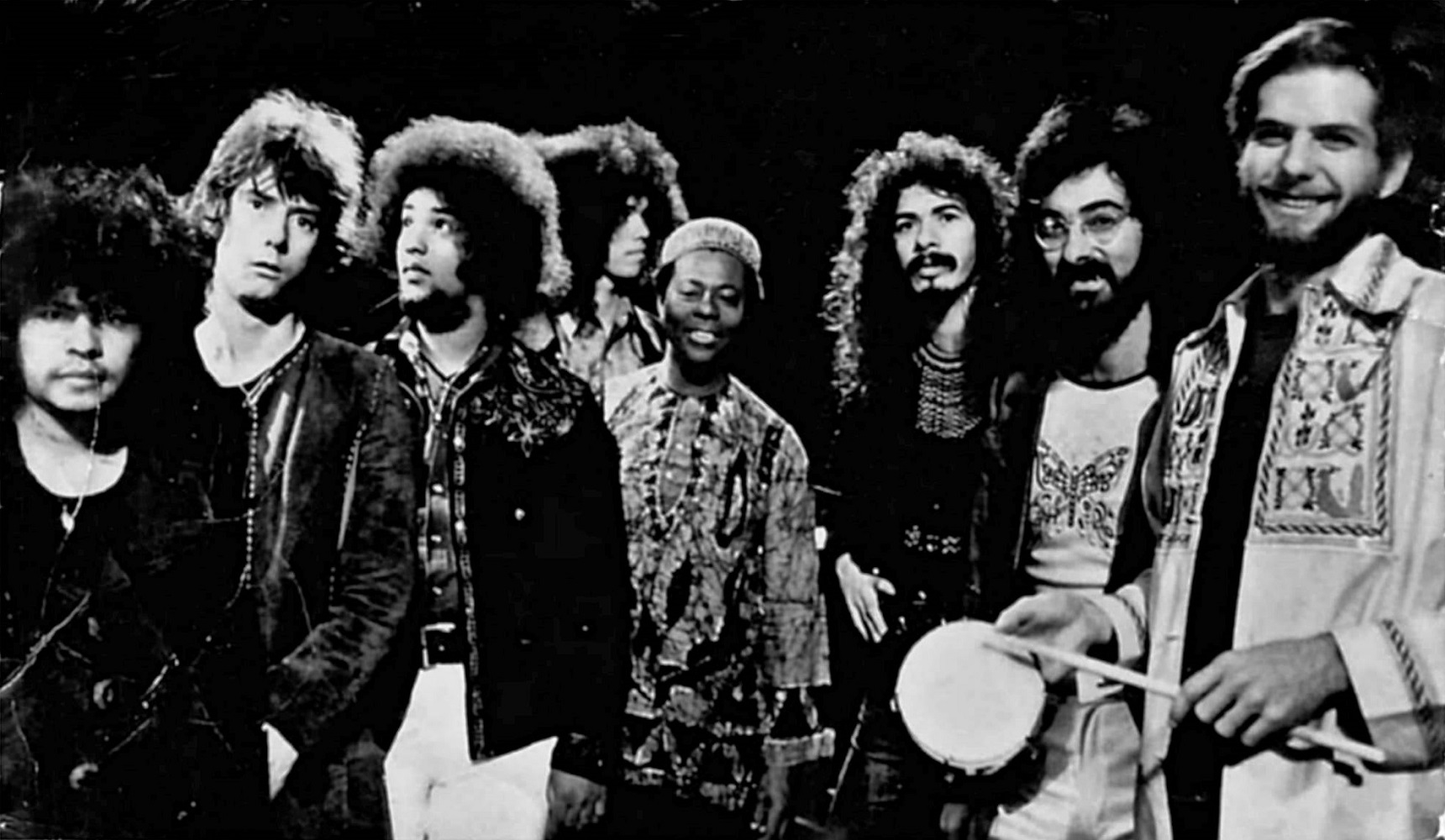 |
| Santana #12 |
|
|
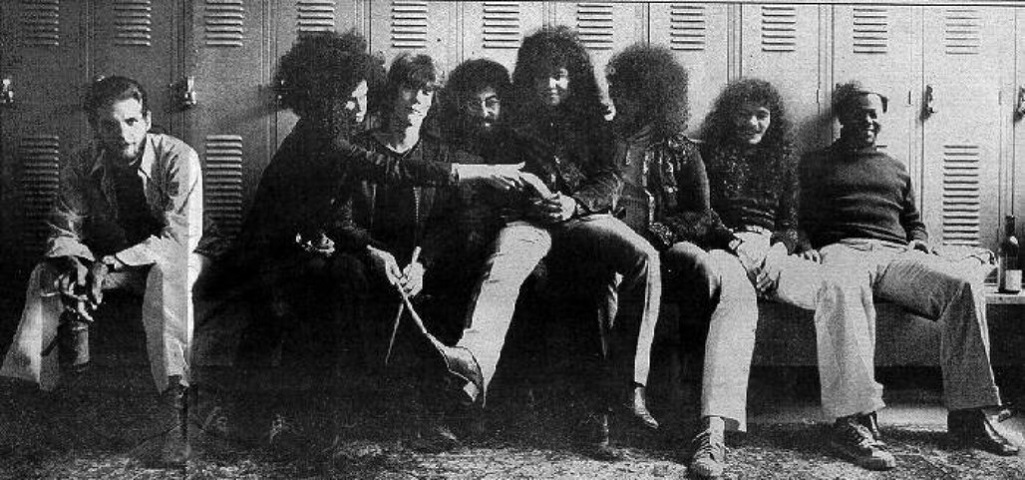 |
| Santana #12. Edmundson Pavilion, University Of Washington, Seattle, WA Oct 15, 1972 |
|
|
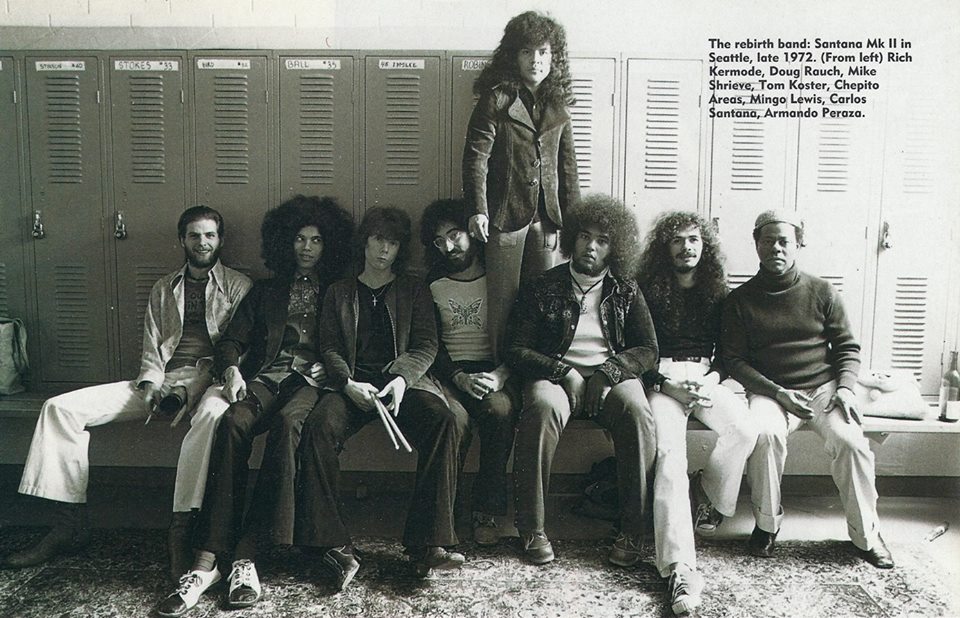 |
| Santana #12. Edmundson Pavilion, University Of Washington, Seattle, WA Oct 15, 1972 |
|
|
|
|
|
Santana #13: April 1973
(left to right ✔) Jose "Chepito" Areas (perc), Michael Shrieve (ds), Carlos Santana (g/perc/vo), Tom Coster (kbd/vo), Richard Kermode (kbd), Doug Rauch (b/g), Armando Peraza (perc/vo)
|
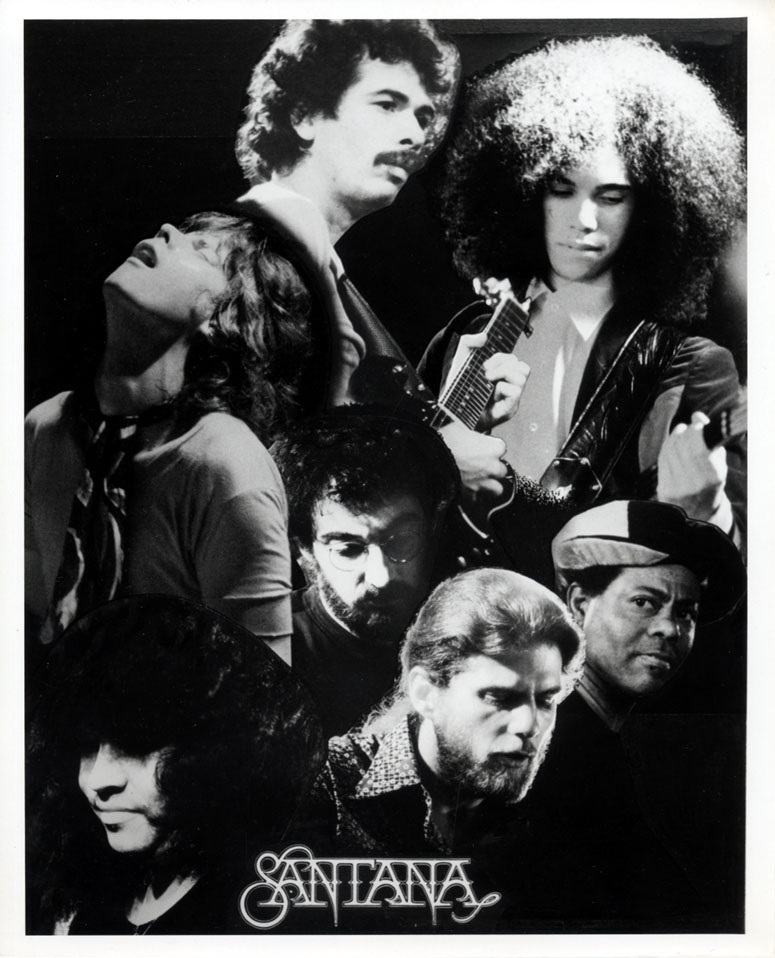 |
| ✔ Santana #13 |
|
|
|
|
|
Santana #14: June 1973
(left to right ✔) Leon Thomas (vo), Tom Coster (kbd/vo), Michael Shrieve (ds), Richard Kermode (kbd), Jose "Chepito" Areas (perc), Armando Peraza (perc/vo), Carlos Santana (g/perc/vo) (seated), Doug Rauch (b/g) (seated)
Leon Thomas joins the band.
Quote from Carlos Santana (The Universal Tone 2014): The big question for the Welcome album was vocals---who was going to sing after Gregg left Santana? (…) I really liked Pharoah Sanders’s album Karma, on which the song “The Creator Has A Master Plan” was sung by Leon Thomas, who sometimes liked to yodel. (…) Asking him to record and tour with us was Shrieve’s idea. (…) Leon became an important part of Santana. (p347)
Quote from Carlos Santana (The Universal Tone 2014): Actually, I’ll put it this way: in hindsight, that 1973 band---with Leon Thomas, Armando and Chepito, TC and Kermode, Dougie, Shireve, and me---was musically the best and most challenging band I’ve ever been in. (…) That lineup was the closest I think Santana ever came to being a jazz band. (p356)
|
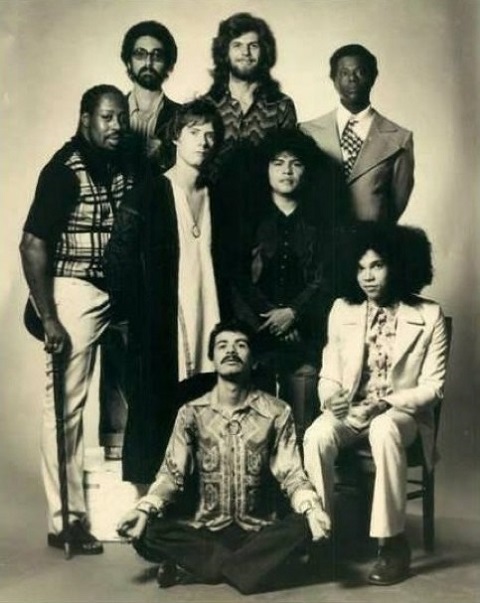 |
| ✔ Santana #14 |
|
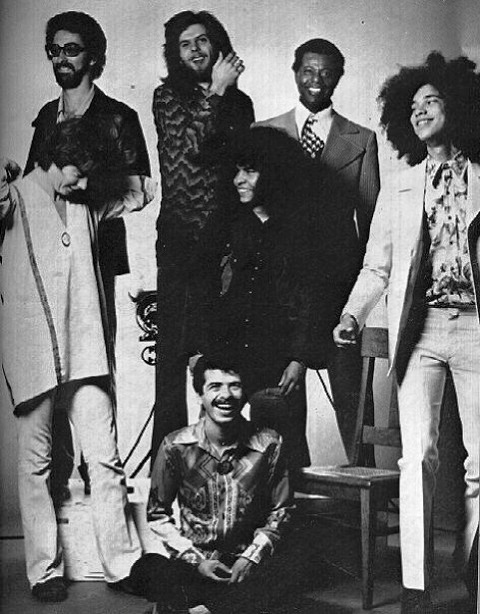 |
| Santana #14 |
|
|
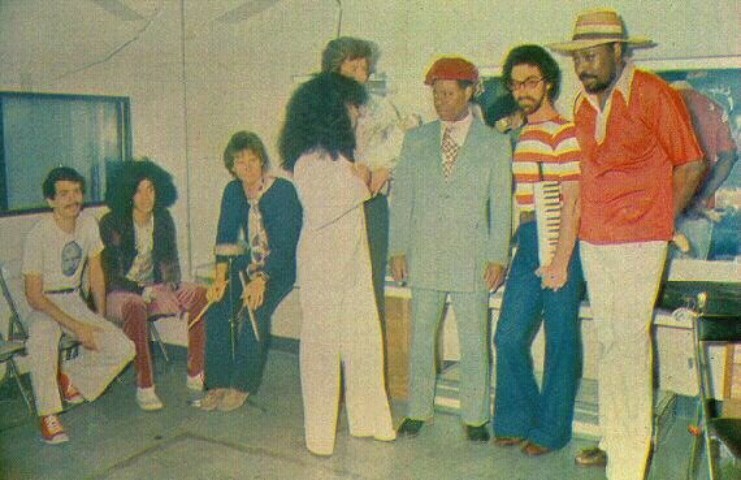 |
| Santana #14 |
|
|
 |
| Santana #14 |
|
|
|
|
|
Carlos Santana/John McLaughlin Band: Aug 1973
Carlos Santana (g/perc/vo), John McLaughlin (g/p), Doug Rauch (b/g), Billy Cobham (ds), Armando Peraza (perc/vo), Larry Young (Khalid Yasin) (org)
|
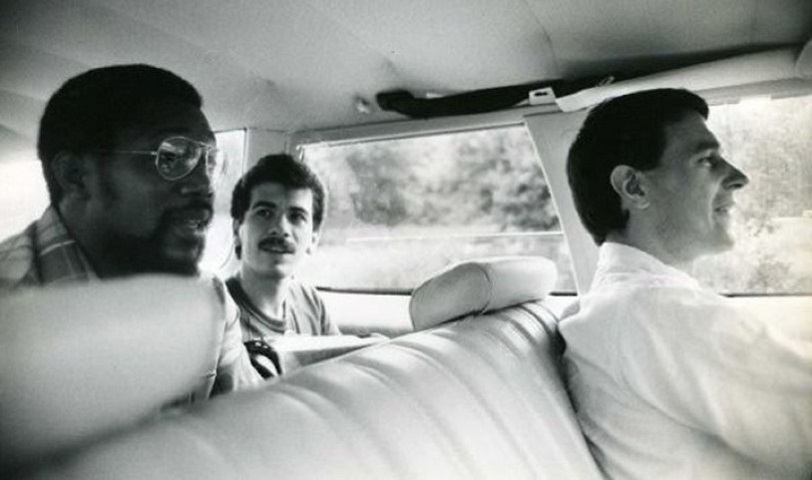 |
| Carlos Santana/John McLaughlin Band. (left to right) Billy Cobham (ds), Carlos Santana (g/perc/vo), John McLaughlin (g/p) |
|
|
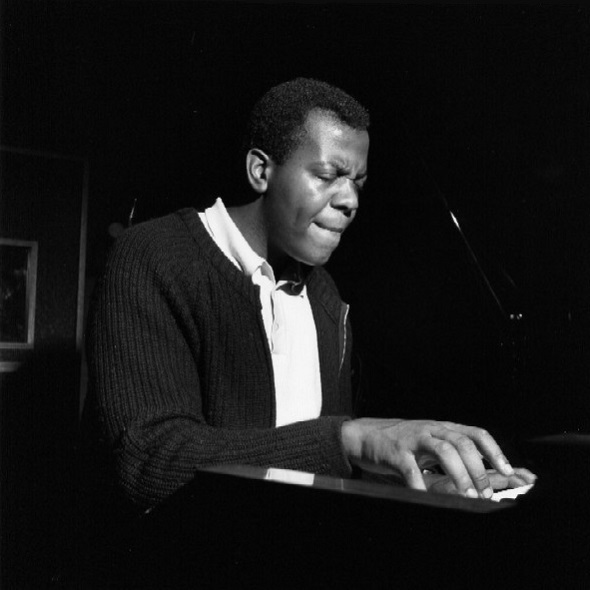 |
| Carlos Santana/John McLaughlin Band. Larry Young (Khalid Yasin) (org) Unknown Date |
|
|
|
|
|
Santana #14 (resuming): Sept 1973
(left to right ✔) Carlos Santana (g/perc/vo), Michael Shrieve (ds), Jose "Chepito" Areas (perc), Armando Peraza (perc/vo), Doug Rauch (b/g), Richard Kermode (kbd), Tom Coster (kbd/vo), Leon Thomas (vo)
|
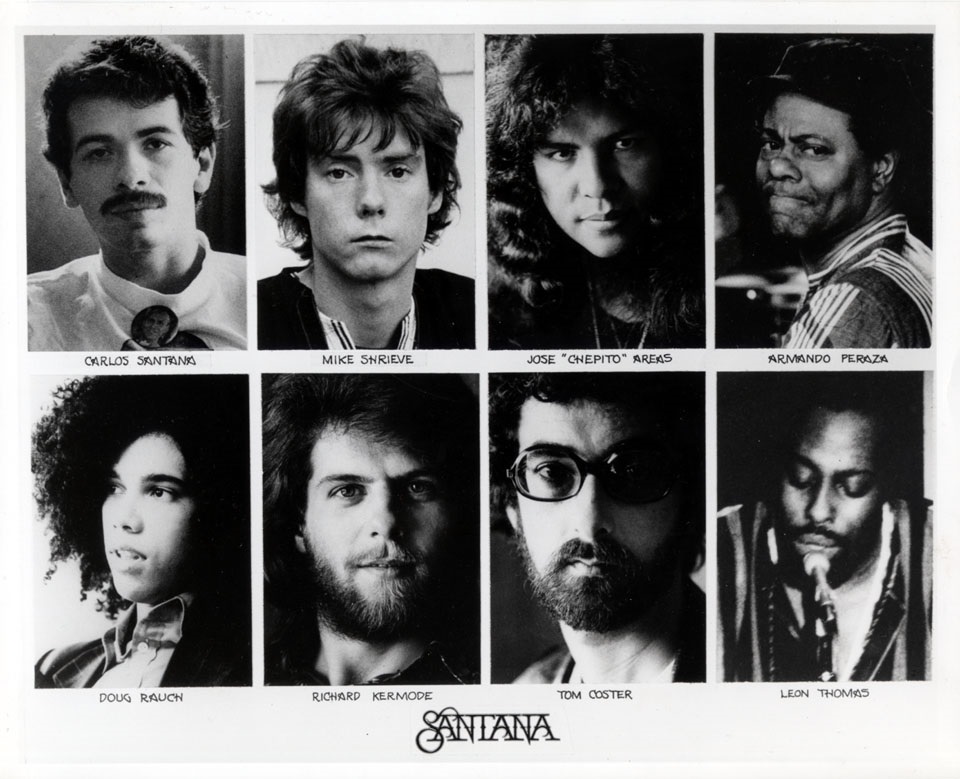 |
| ✔ Santana #14 |
|
|
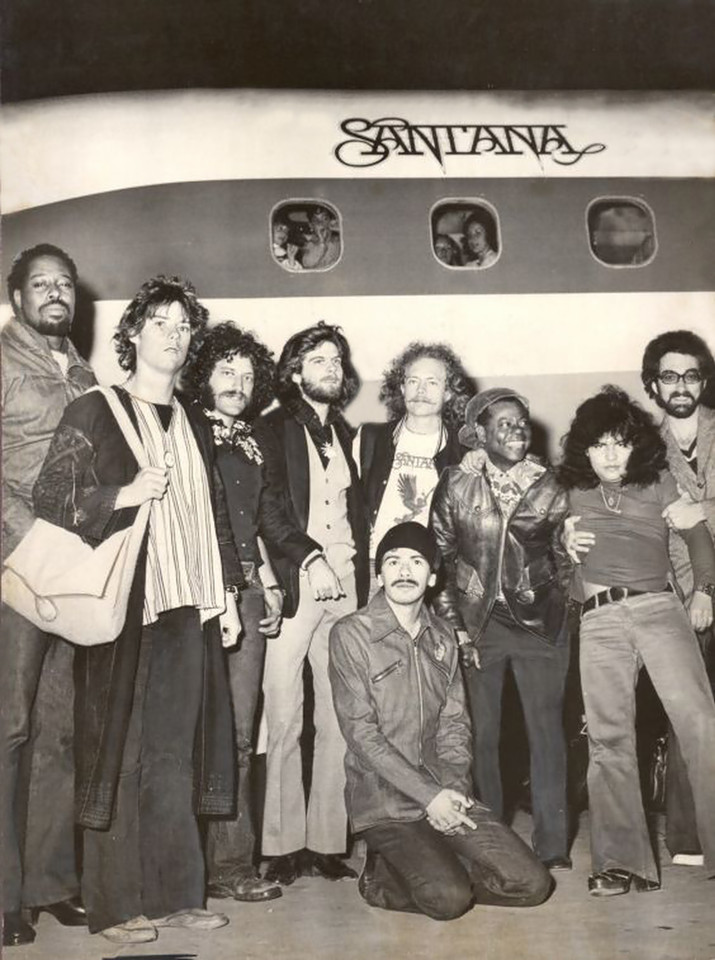 |
| Santana #14. Doug Rauch (b) not pictured. 3rd & 5th from left (standing) are crew members |
|
|
|
|
|
Santana #15: Jan 1974
Carlos Santana (g/perc/vo), Michael Shrieve (ds), Armando Peraza (perc/vo), Tom Coster (kbd/vo)
|
|
|
|
Carlos Santana/John McLaughlin/Alice Coltrane Band: March 1974
Carlos Santana (g/perc/vo), John McLaughlin (g), Alice Coltrane (harp/kbd), Reggie Workman (b), Michael Shrieve (ds), Armando Peraza (perc/vo), Tom Coster (kbd/vo), Jules Broussard (fl/sax)
|
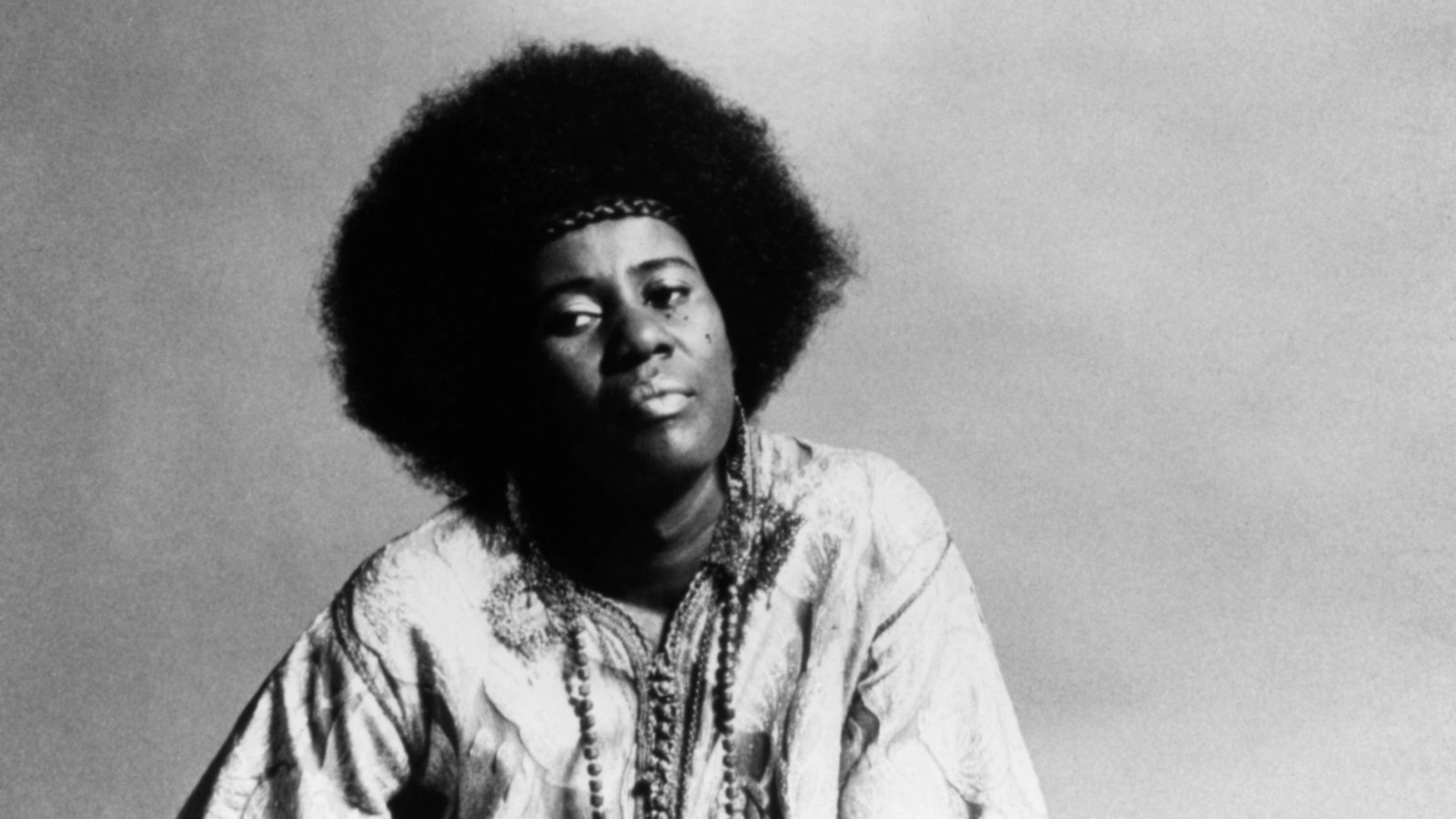 |
| Carlos Santana/John McLaughlin/Alice Coltrane Band. Alice Coltrane (harp/kbd) Unkonwn Date |
|
|
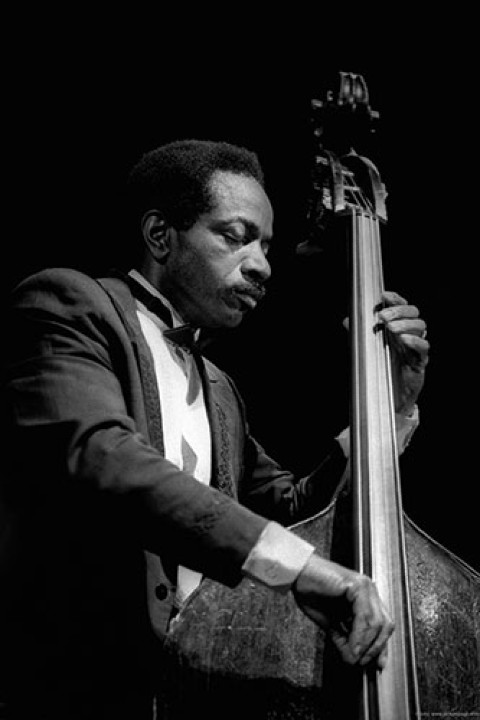 |
| Carlos Santana/John McLaughlin/Alice Coltrane Band. Reggie Workman (b) |
| Unkonwn Date © Jacky Lepage |
|
|
|
|
|
|
|
|
|
Santana #17: Late June 1974
(left to right ✔) "Ndugu" Leon Chancler (ds), Jules Broussard (fl/sax), David Brown (b), Carlos Santana (g/perc/vo), Leon Patillo (kbd/vo), Armando Peraza (perc/vo), Tom Coster (kbd/vo), Jose "Chepito" Areas (perc)
Michael Shrieve is replaced by “Ndugu” Leon Chancler.
Quote from Carlos Santana (The Universal Tone 2014): We were almost done with the new album and getting ready for our first tour in six months when Shrieve got very sick and had to go into the hospital with kidney stones. I called Ndugu---he played on one track for Borboletta because it looked like Shrieve needed more time to recover---and I asked him to come on the road with us. (…) I wasn’t thinking of disengaging Michael Shireve from the band when he got sick, but that was what happened. (…) Shrieve leaving Santana was the band’s final step in its evolution from being a collective to being a group with two leaders to finally being a group in which I alone was in charge. Shrieve was the last connection to the old band, the last person whom I would confer with and sometimes defer to. (p368-369)
|
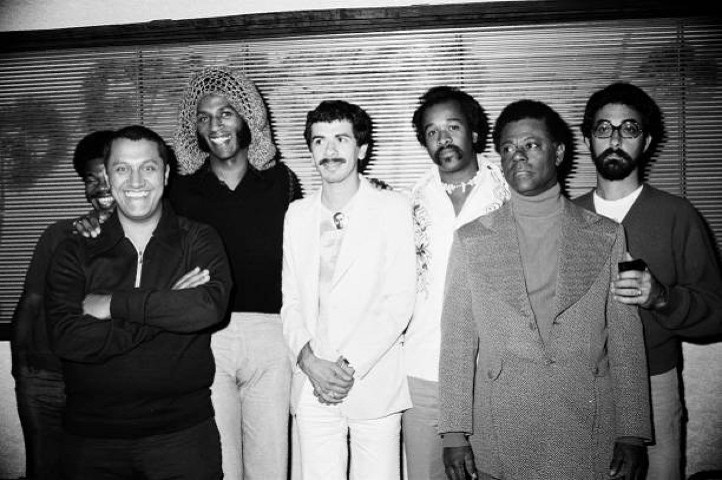 |
| ✔ Santana #17. Jose "Chepito" Areas (perc) not pictured. Press Conference. Tokyo, Japan Dec 8 or 9, 1974 © Koh Hasebe |
|
|
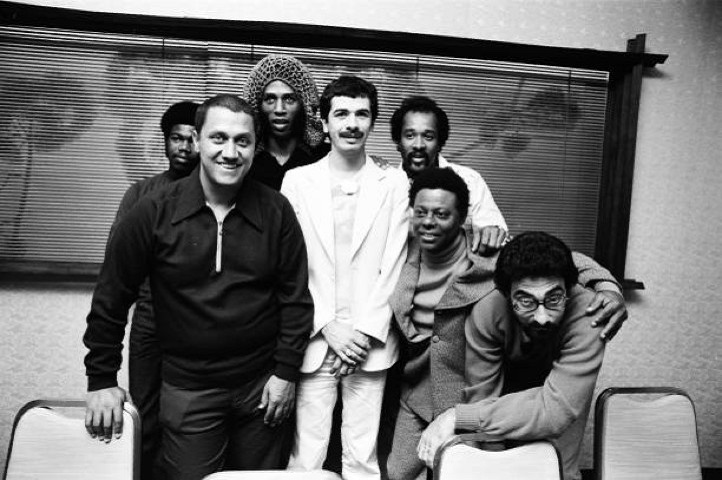 |
| Santana #17. Jose "Chepito" Areas (perc) not pictured. Press Conference. Tokyo, Japan Dec 8 or 9, 1974 © Koh Hasebe |
|
|
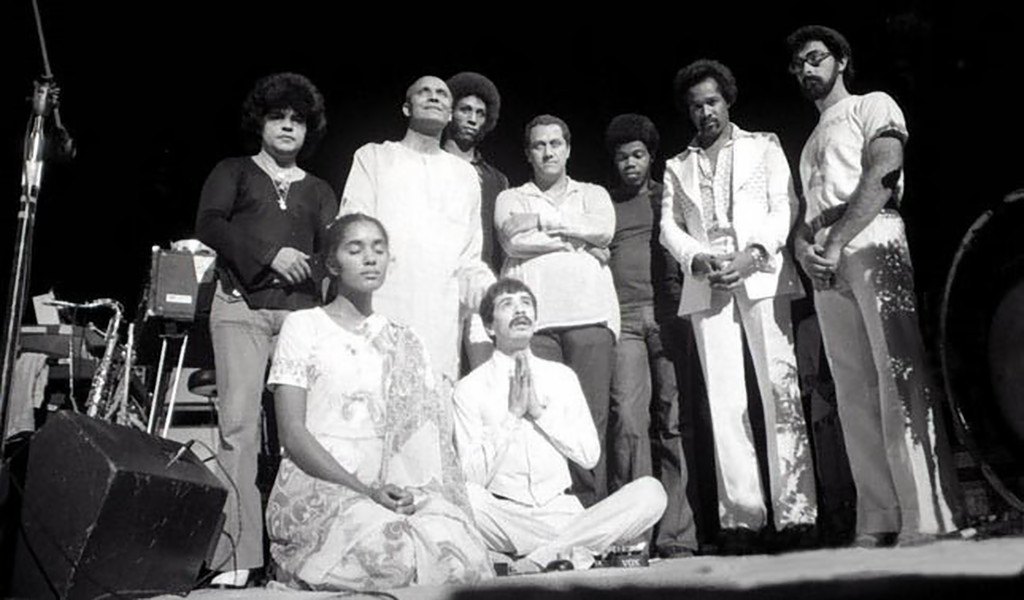 |
| Santana #17 with Deborah Santana, Sri Chinmoy. Armando Peraza (perc) not pictured © Chuck Pulin |
|
|
|
|
|
|
|
|
|
Sri Chinmoy Rainbow: Sept 1975
(left to right) “Narada” Michael Walden (piano), Carlos Santana (g), “Sutunga” Harry Austin (perc), “Premik” Russell Tubbs (flute), Russ DeSalvo (g), “Voirabh” Lewis Kahn (violin), Frank Burrows (b), “Ribhu” ? (tablas), Marty Solomon (tambura)
Carlos Santana is asked by his guru Sri Chinmoy to form a group that would play short sets of his songs.
Quote from “Narada” Michael Walden (Facebook April 11, 2024): Rainbow bans id something I did with brother Carlos Santana and disciples. We would do shows concerts for Guru! Not many memories. Too high from meditation.
|
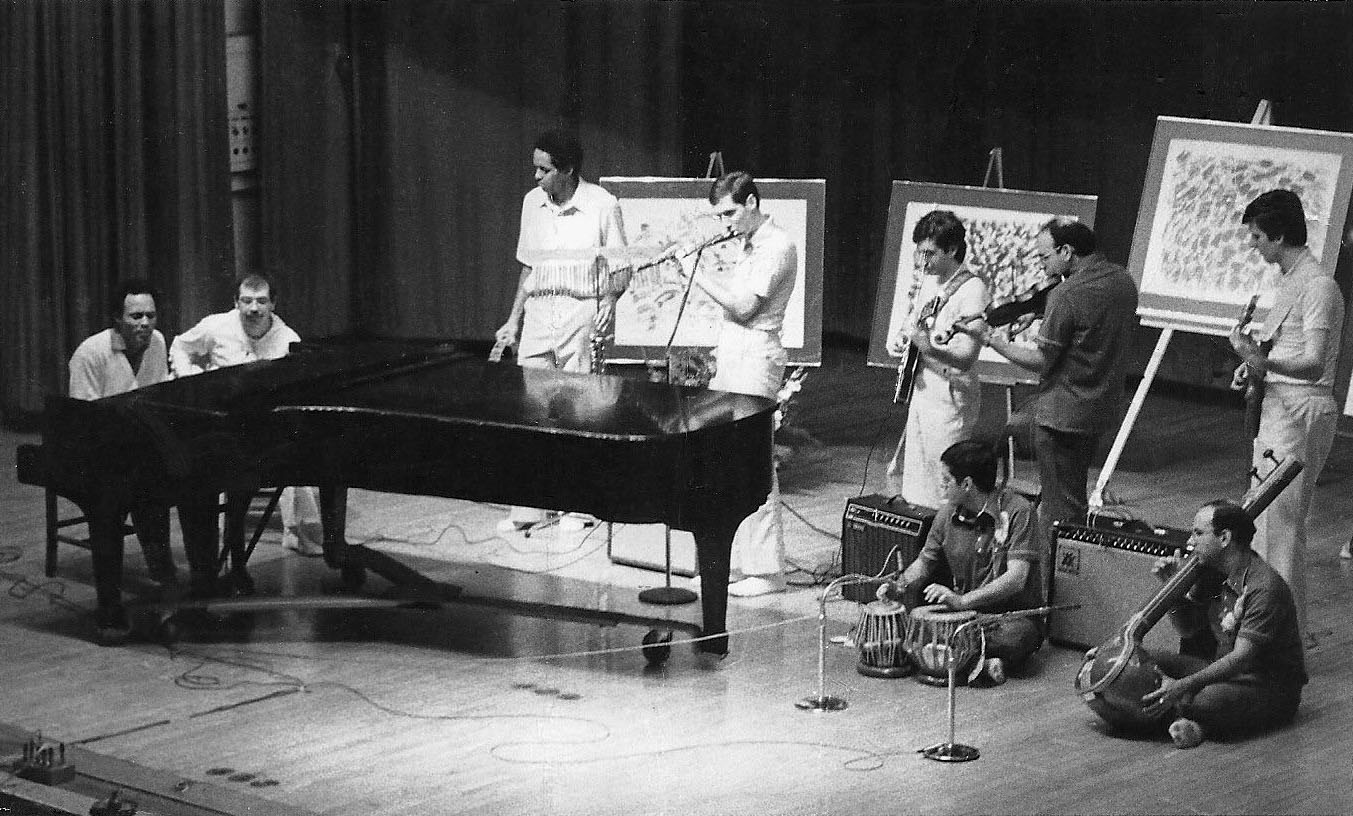 |
| Sri Chinmoy Rainbow |
|
|
|
|
|
Santana #19: Dec 1975
(left to right ✔) Greg Walker (vo), David Brown (b), Tom Coster (kbd/vo), Armando Peraza (perc/vo), "Ndugu" Leon Chancler (ds), Carlos Santana (g/perc/vo)
Leon Patillo is replaced by Greg Walker.
Quote from Carlos Santana (The Universal Tone 2014): Greg Walker is a very, very soulful singer, and we needed someone new in 1975, when Leon Patillo left. Ndugu brought Greg to a rehearsal at SIR in San Francisco, and that was it. (p381)
|
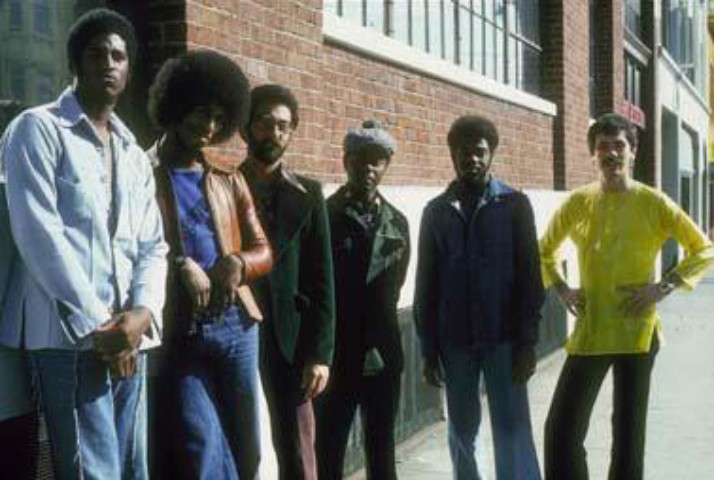 |
| ✔ Santana #19 |
|
|
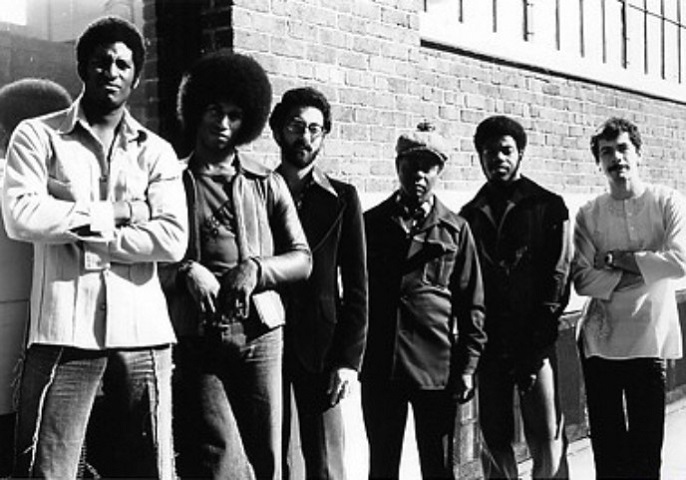 |
| ✔ Santana #19 |
|
|
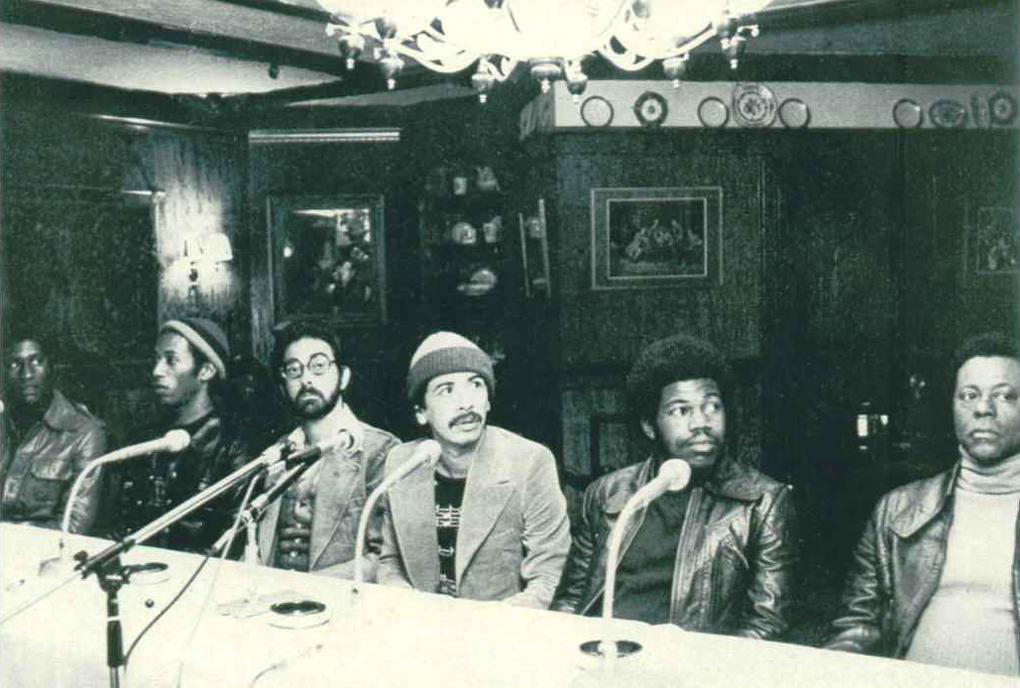 |
| Santana #19 |
|
|
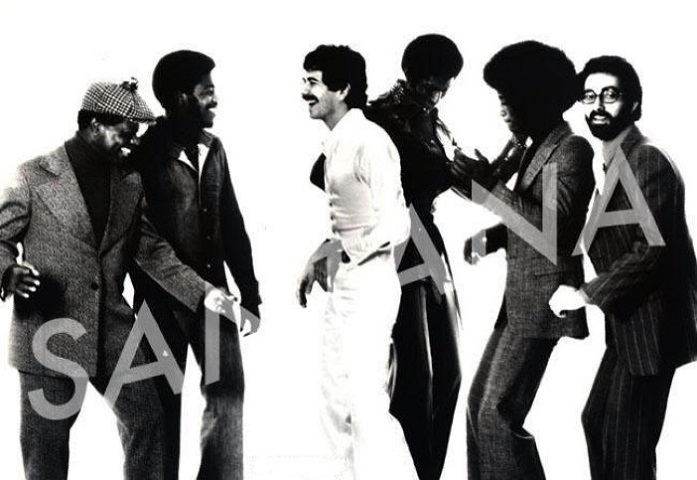 |
| Santana #19 |
|
|
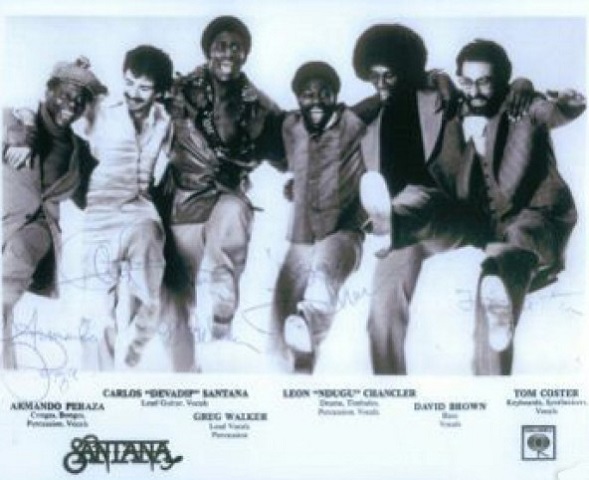 |
| Santana #19 |
|
|
|
|
|
Santana #20: April 1976
(left to right ✔) Byron Miller (b), Greg Walker (vo), Carlos Santana (g/perc/vo), Tom Coster (kbd/vo), "Ndugu" Leon Chancler (ds), Armando Peraza (perc/vo)
David Brown is replaced by Byron Miller.
|
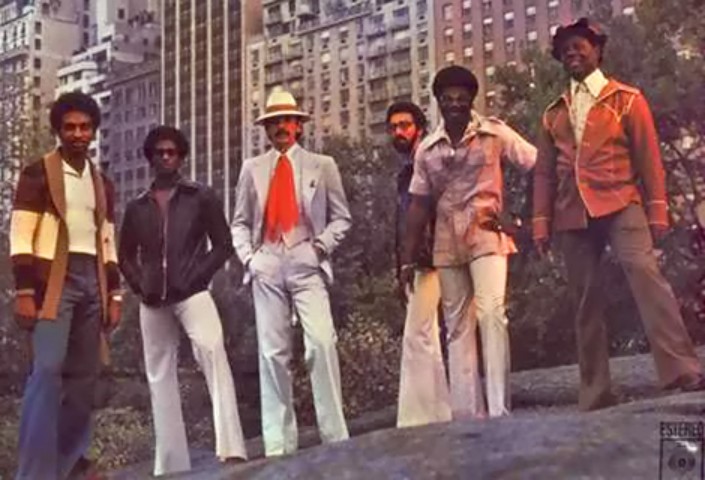 |
| ✔ Santana #20 |
|
|
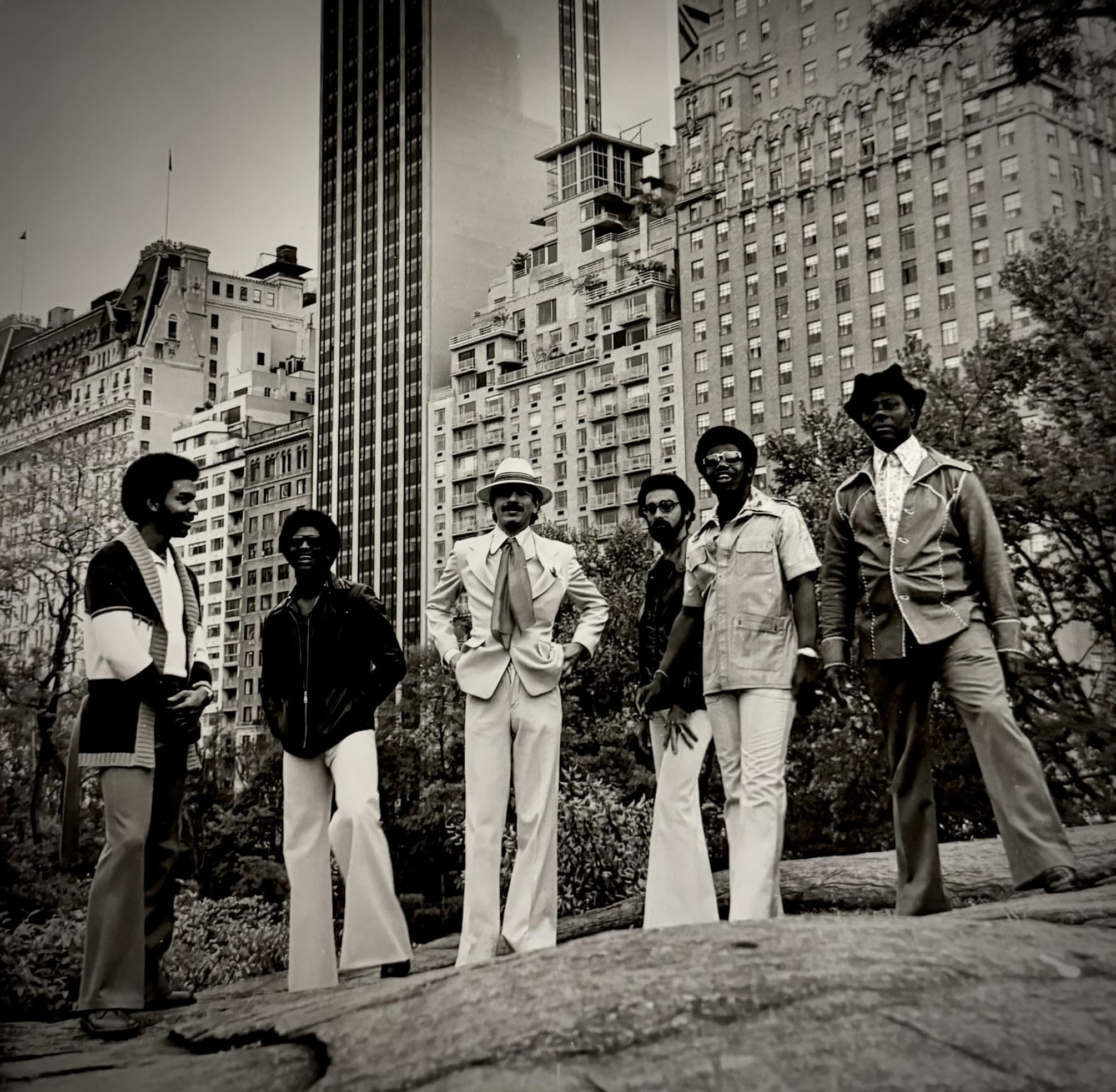 |
| Santana #20 |
|
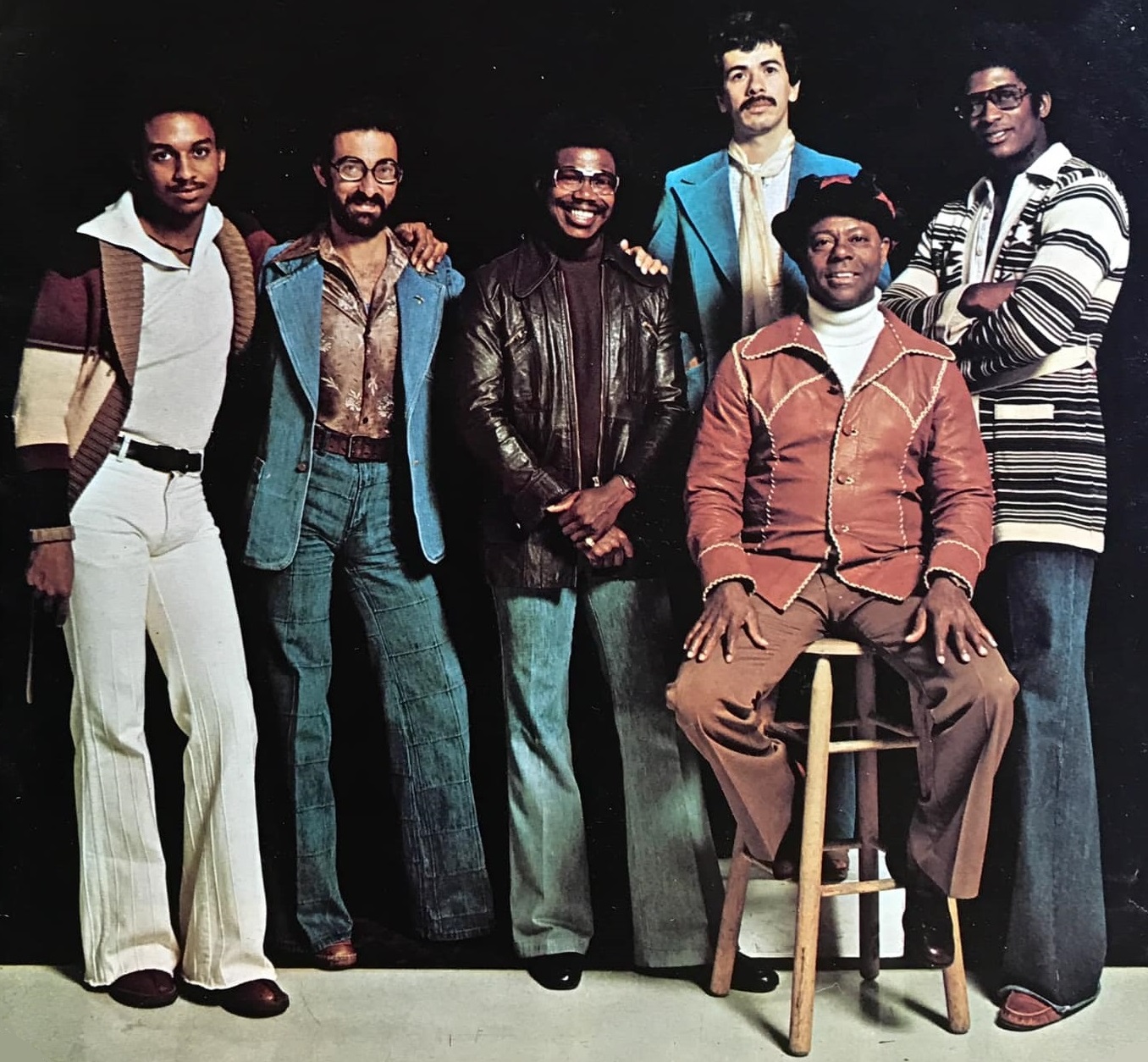 |
| Santana #20 |
|
|
|
|
|
Santana #21: June 1976
Carlos Santana (g/perc/vo), Byron Miller (b), “Ndugu” Leon Chancler (ds), Armando Peraza (perc/vo), Francisco Aguabella (perc), Tom Coster (kbd/vo), Greg Walker (vo)
Francisco Aguabella joins the band.
|
|
|
|
Santana #22: July 1976
Carlos Santana (g/perc/vo), Pablo Tellez (b/vo), Gaylord Birch (ds), Jose “Chepito” Areas (perc), Raul Rekow (perc/vo), Tom Coster (kbd/vo)
“Ndugu” Leon Chancler is replaced by Gaylord Birch. Armando Peraza and Francisco Aguabella are replaced by Raul Rekow and Jose “Chepito” Areas. Byron Miller is replaced by Pablo Tellez.
Quote from Carlos Santana (The Universal Tone 2014): Ndugu left and recommended Gaylord. (…) Very seldom will people leave because thet want to. But Ndugu had other things to do, and he was the one who decided to leave. (…) In 1988 we got Ndugu to come back as part of the Santana-Shorter Band. (p383)
|
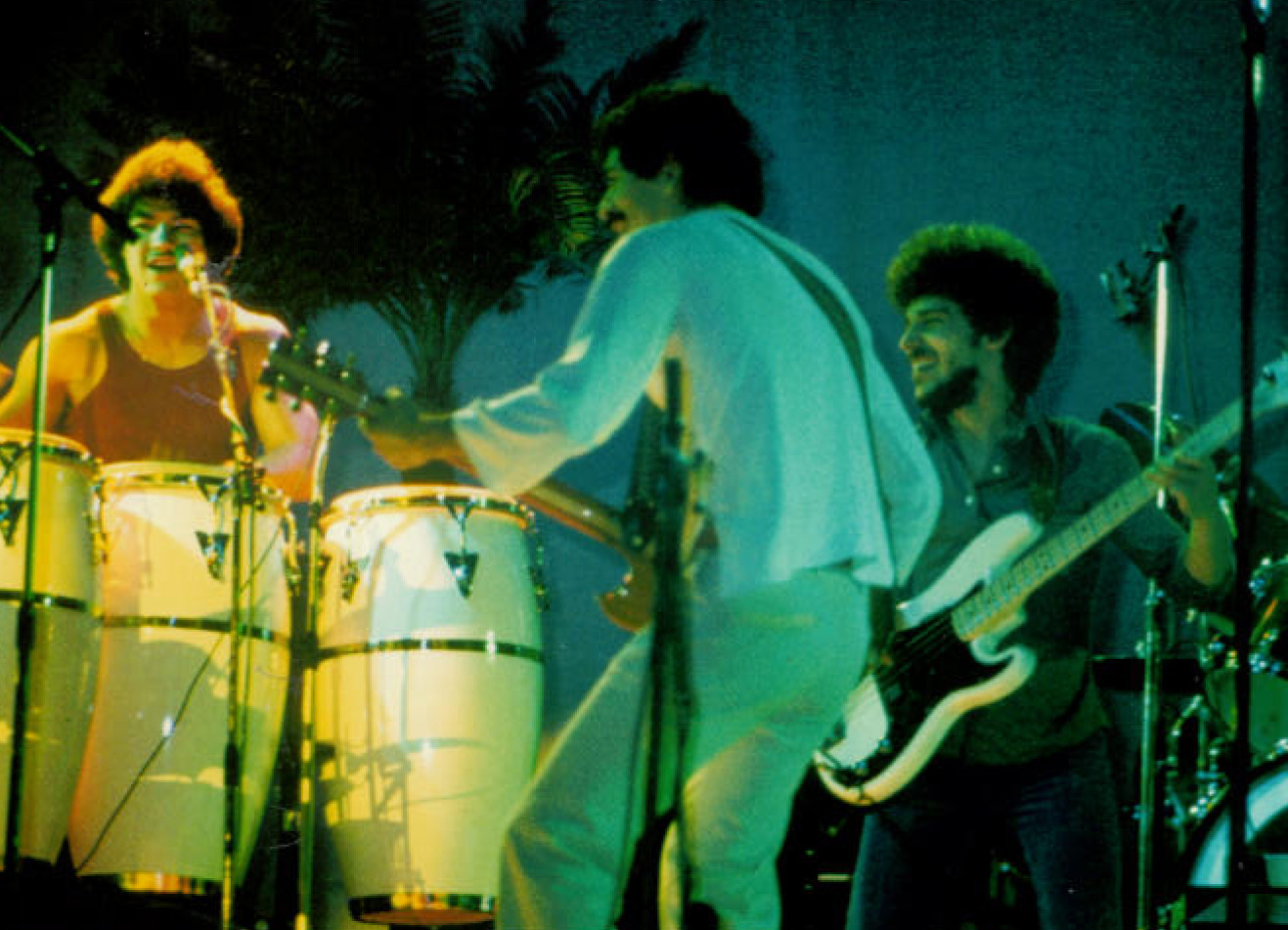 |
| Santana #22. (left to right) Raul Rekow (perc/vo), Carlos Santana (g/perc/vo), Pabo Tellez (b/vo) |
| The Ahoy, Rotterdam, Netherlands Nov 30, 1976 © Andre Looijestijn |
|
|
|
|
|
Santana #23: Sept-Oct 1976
(left to right) Ray Etzler (Santana Management), Tom Coster (kbd/vo), ? (floor), Leon Patillo (kbd/vo), Gaylord Birch (ds) (white hat), Joel Badie (master of ceremony, hand perc) (red hat), ? (black jacket), Raul Rekow (perc/vo), Carlos Santana (g/perc/vo), Bill Graham (Santana Management) (floor), Pablo Tellez (b/vo), Jose “Chepito” Areas (perc), ? (black hat)
Leon Patillo returns to the band. Joel Badie (master of ceremony, hand perc) joins the band occasionally.
|
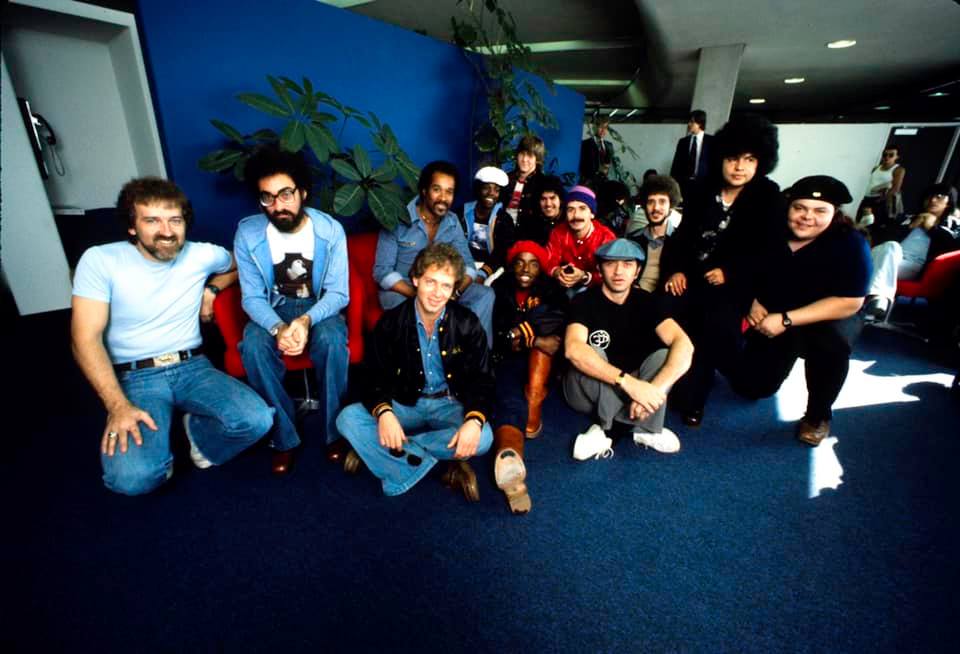 |
| Santana #23 © Alan Bagshaw |
|
|
|
|
|
Santana #24: Nov 1976
(left to right ✔) Raul Rekow (perc/vo), Graham Lear (ds), Luther Rabb (vo), Jose "Chepito" Areas (perc), Carlos Santana (g/perc/vo), Pablo Tellez (b/vo), Tom Coster (kbd/vo)
Gaylord Birch is replaced by Graham Lear. Leon Patillo is replaced by Luther Rabb. Joel Badie (master of ceremony, hand perc) joins the band during the European tour.
Quote from Carlos Santana (The Universal Tone 2014): We did Amigos, and a year later Gaylord Birch left and we got Graham Lear on drums---another Ndugu recommendation. (…) He stayed with us for almost seven years, into the ‘80s, and I learned a lot from him. (p385)
|
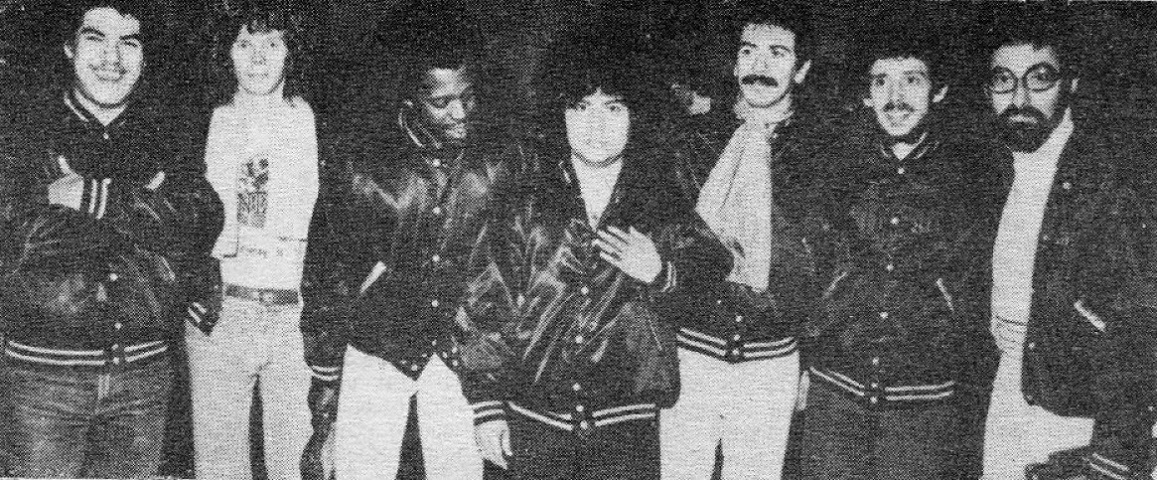 |
| ✔ Santana #24 © Tom Sheehan |
|
|
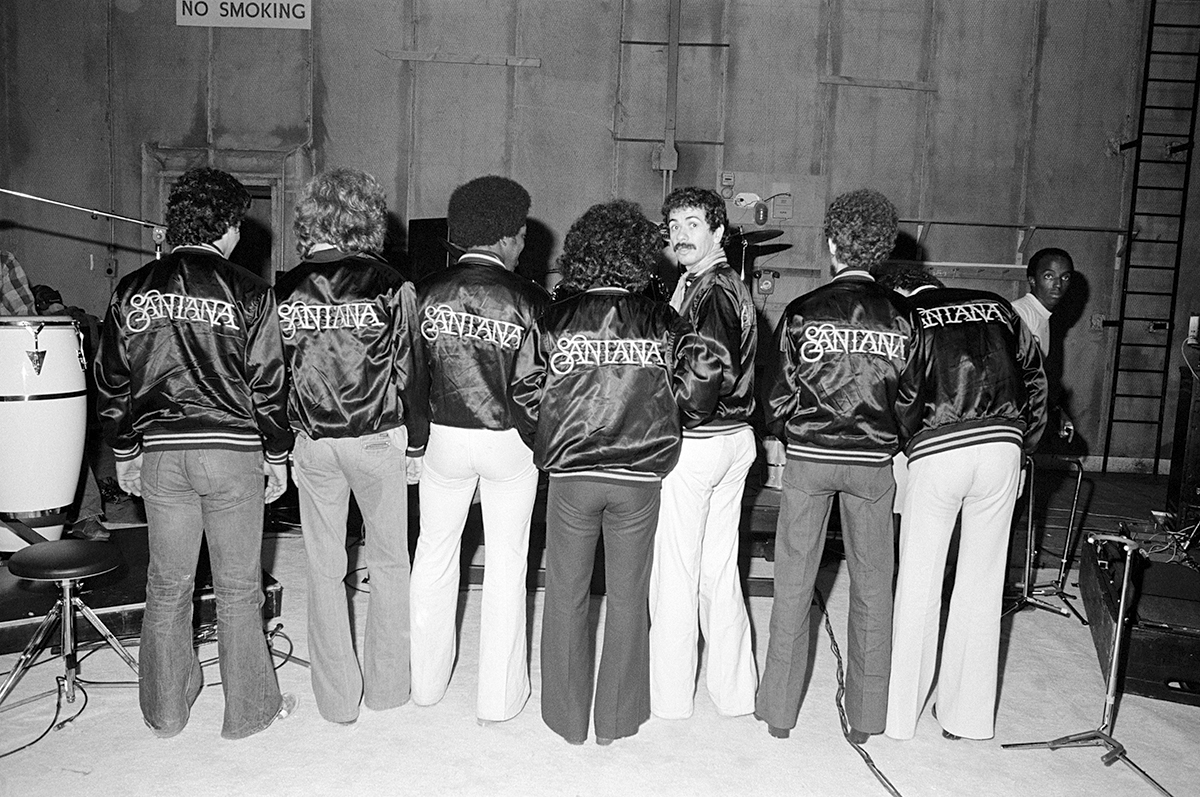 |
| Santana #24 © Tom Sheehan |
|
|
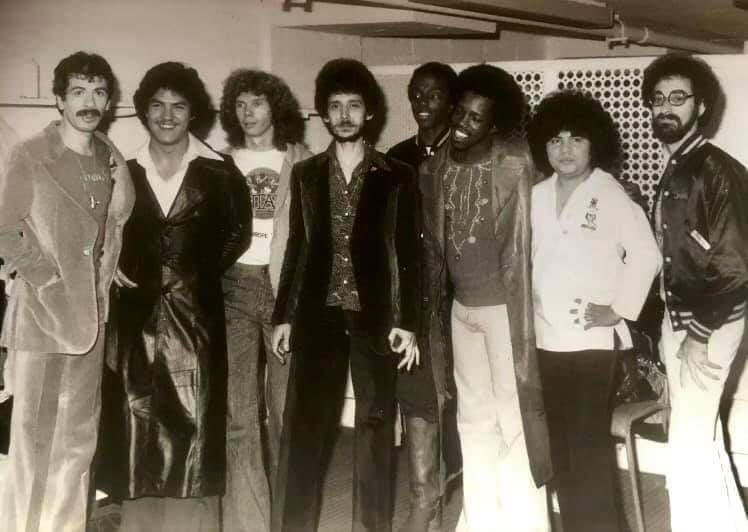 |
| Santana #24 with Joel Badie (mc/hand perc) (5th from left) London, UK Dec 15, 1976 |
|
|
|
|
|
Santana #25: Jan 1977
(left to right ✔) Pablo Tellez (b/vo), Tom Coster (kbd/vo), Raul Rekow (perc/vo), Carlos Santana (g/perc/vo), Jose "Chepito" Areas (perc), Graham Lear (ds), Greg Walker (vo)
Luther Rabb is replaced by Greg Walker.
|
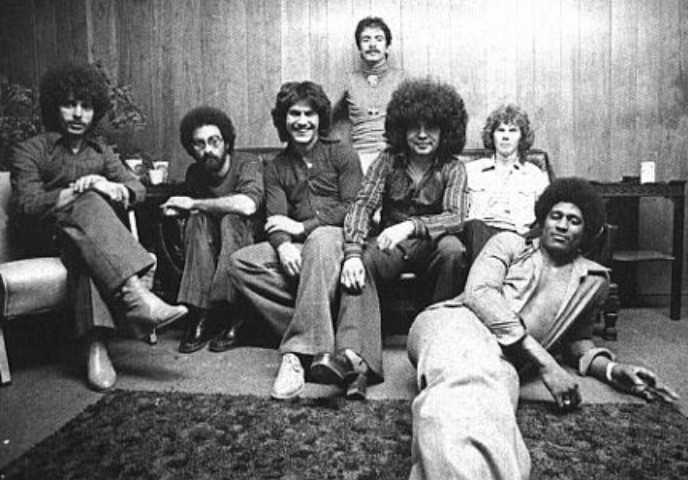 |
| ✔ Santana #25 |
|
|
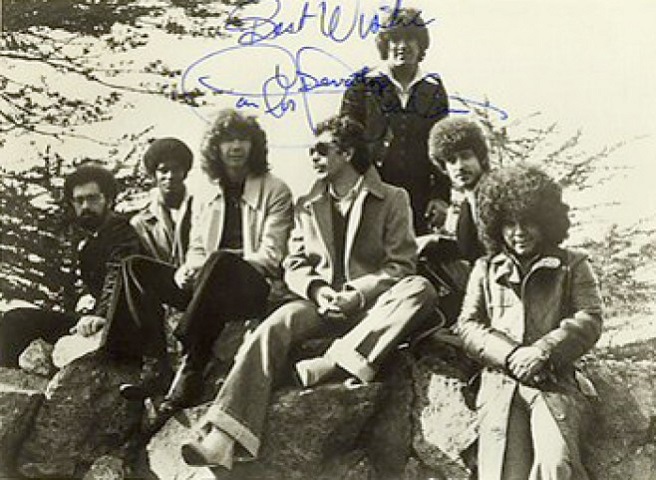 |
| Santana #25 |
|
|
|
|
|
Santana #26: June 1977
(left to right ✔) Tom Coster (kbd/vo), Greg Walker (vo), Raul Rekow (perc/vo), Carlos Santana (g/perc/vo), Graham Lear (ds), Pete Escovedo (perc), David Margen (b)
Pablo Tellez is replaced by David Margen. Jose “Chepito” Areas is replaced by Pete Escovedo.
|
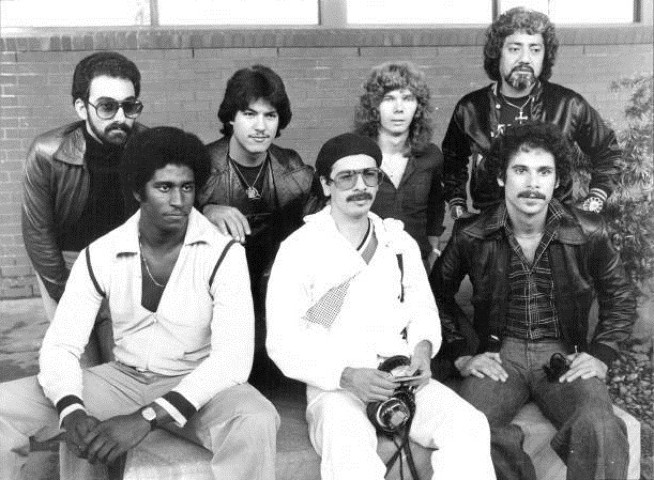 |
| ✔ Santana #26 © Antony Matheus Linsen |
|
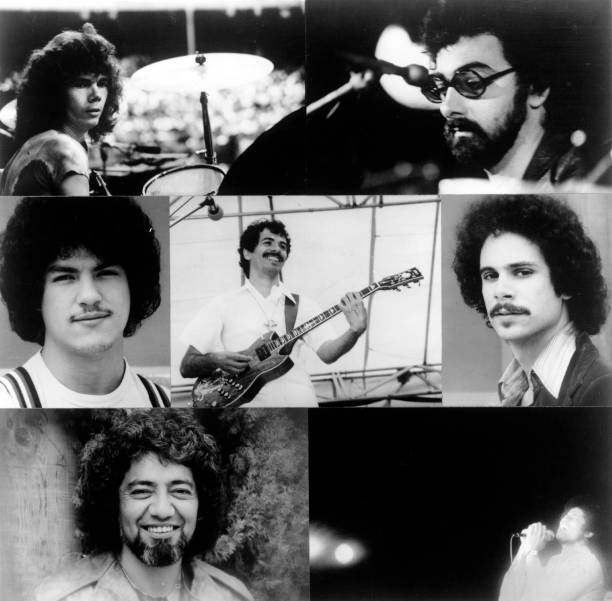 |
| Santana #26 |
|
|
|
|
|
Santana #27: Oct 1977
Carlos Santana (g/perc/vo), David Margen (b), Graham Lear (ds), Pete Escovedo (perc), Raul Rekow (perc/vo), Armando Peraza (perc/vo), Tom Coster (kbd/vo), Greg Walker (vo)
Armando Peraza returns to the band.
|
|
|
|
Santana #28: June 1978
(left to right ✔) Raul Rekow (perc/vo), Chris Rhyne (kbd), Greg Walker (vo), Carlos Santana (g/perc/vo), Chris Solberg (g/kbd), Graham Lear (ds), Pete Escovedo (perc, David Margen (b), Armando Peraza (perc/vo)
Tom Coster is replaced by Chris Rhyne. Chris Solberg joins the band.
|
 |
| ✔ Santana #28 © Norman Seeff |
|
|
 |
| Santana #28 © Norman Seeff |
|
|
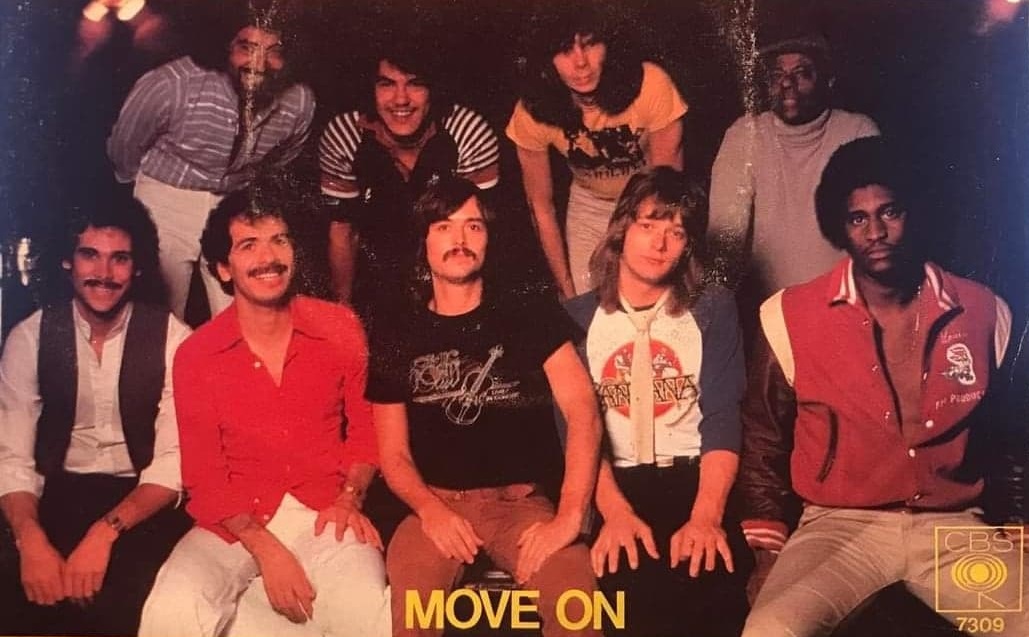 |
| Santana #28 |
|
|
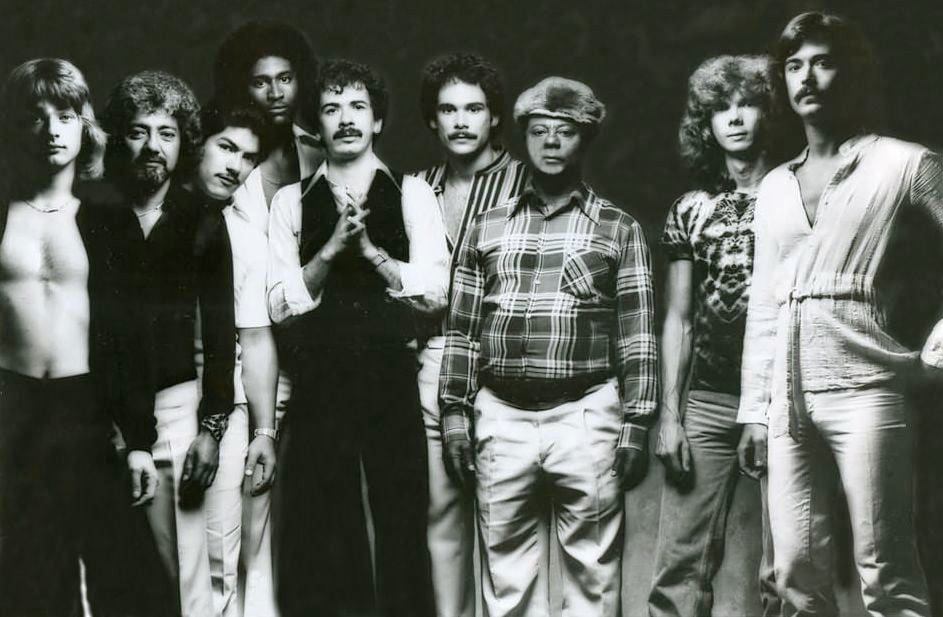 |
| Santana #28 |
|
|
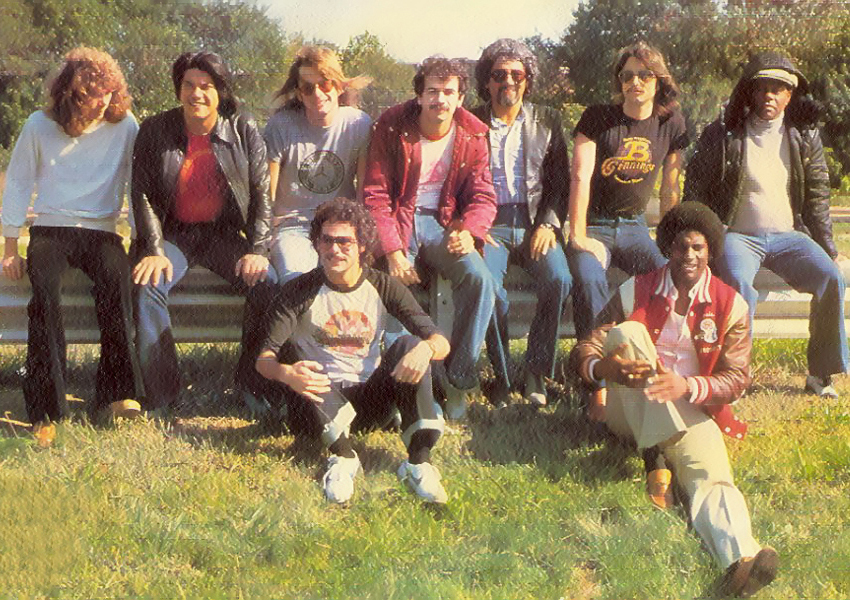 |
| Santana #28 |
|
|
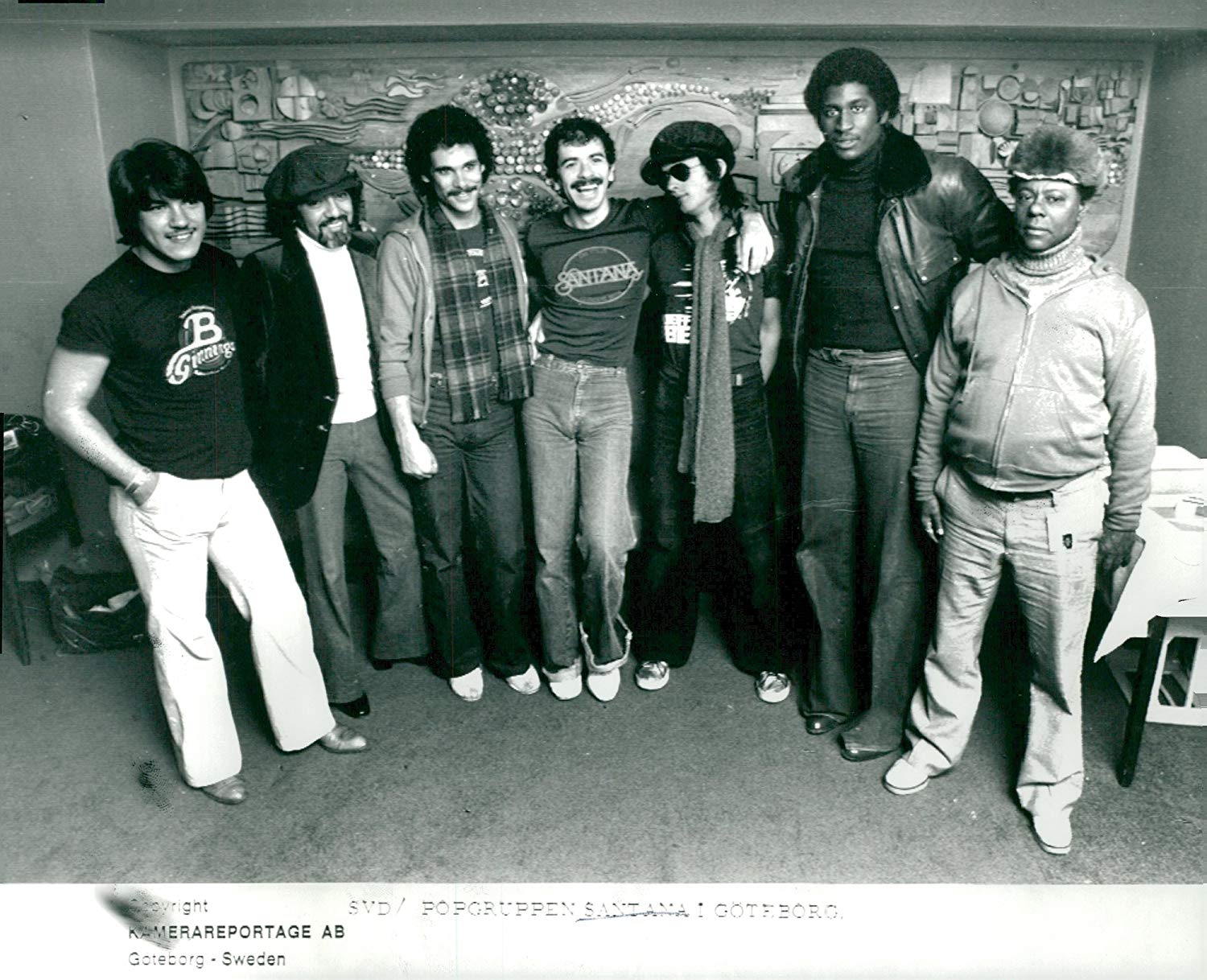 |
| Santana #28. Chris Rhyne (kbd), Graham Lear (ds) not pictured. Goteborg, Sweden Nov 10, 1978 |
|
|
|
|
|
|
|
|
|
Santana #29: April 1979
(left to right ✔) Alan Pasqua (kbd), Armando Peraza (perc/vo), Alex Ligertwood (g/vo), David Margen (b), Carlos Santana (g/perc/vo), Chris Solberg (g/kbd), Graham Lear (ds), Raul Rekow (perc/vo)
Chris Rhyne is replaced by Alan Pasqua. Greg Walker is replaced by Alex Ligertwood.
Quote from Carlos Santana (The Universal Tone 2014): I first heard him when he was singing in David Sancious’s band, Tone, and they opened for us at the Beacon Theatre in 1975. (…) He can make you feel God in his singing---as he did when he sang “Somewhere In Heaven” on the Milagro album in ’92. You believe him. (p385-386)
|
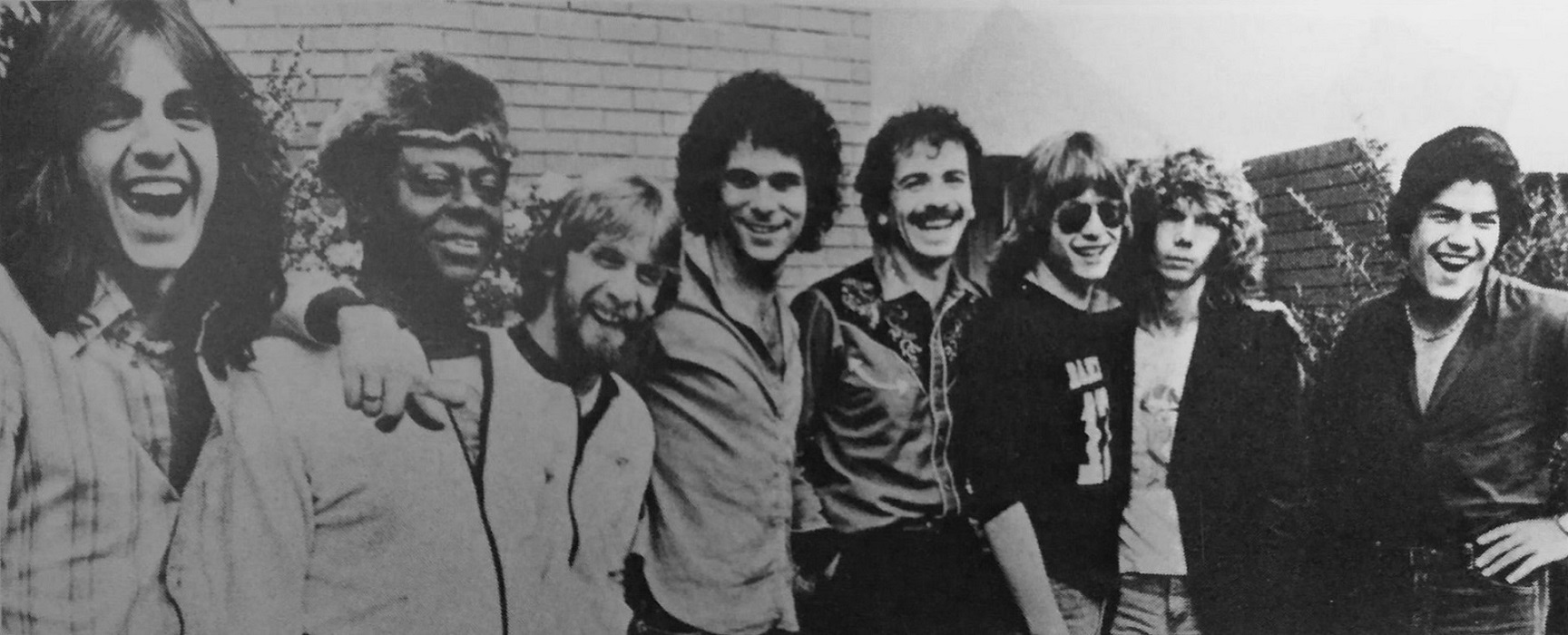 |
| ✔ Santana #29 |
|
|
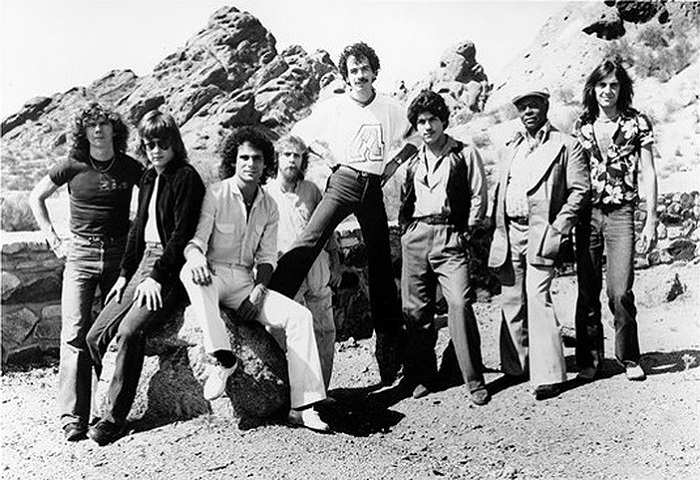 |
| Santana #29 |
|
|
|
|
|
Santana #30: March 1980
(left to right ✔) Armando Peraza (perc/vo), Graham Lear (ds), David Margen (b), Carlos Santana (g/perc/vo), Richard Baker (kbd), Alex Ligertwood (g/vo), Orestes Vilato (perc/vo), Raul Rekow (perc/vo)
Orestes Vilato joins the band. Alan Pasqua is replaced by Richard Baker.
|
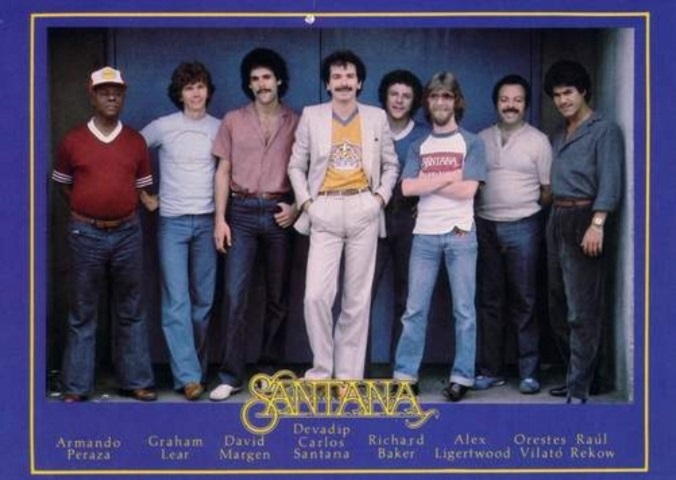 |
| ✔ Santana #30 |
|
|
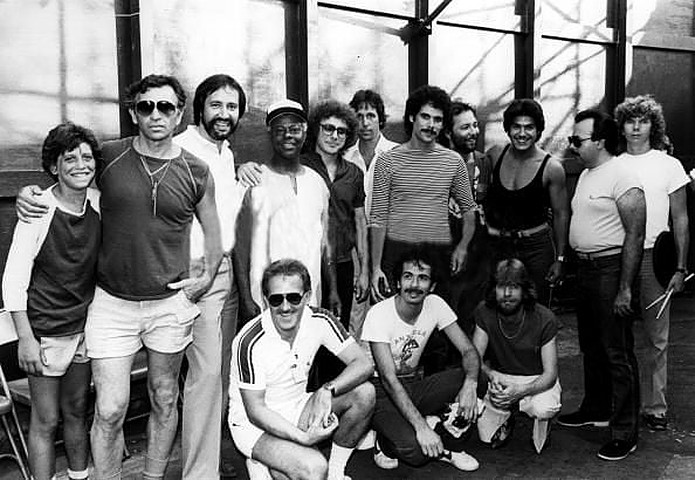 |
| Santana #30. (left to right) David Graham, Bill Graham (Santana Management), ?, Armando Peraza (perc/vo) |
| Richard Baker (kbd), ?, David Margen (b), ?, Raul Rekow (perc/vo), Orestes Vilato (perc/vo), Graham Lear (ds) |
| (seated) Ray Etzler (Santana Management), Carlos Santana (g/perc/vo), Alex Ligertwood (g/vo) |
|
|
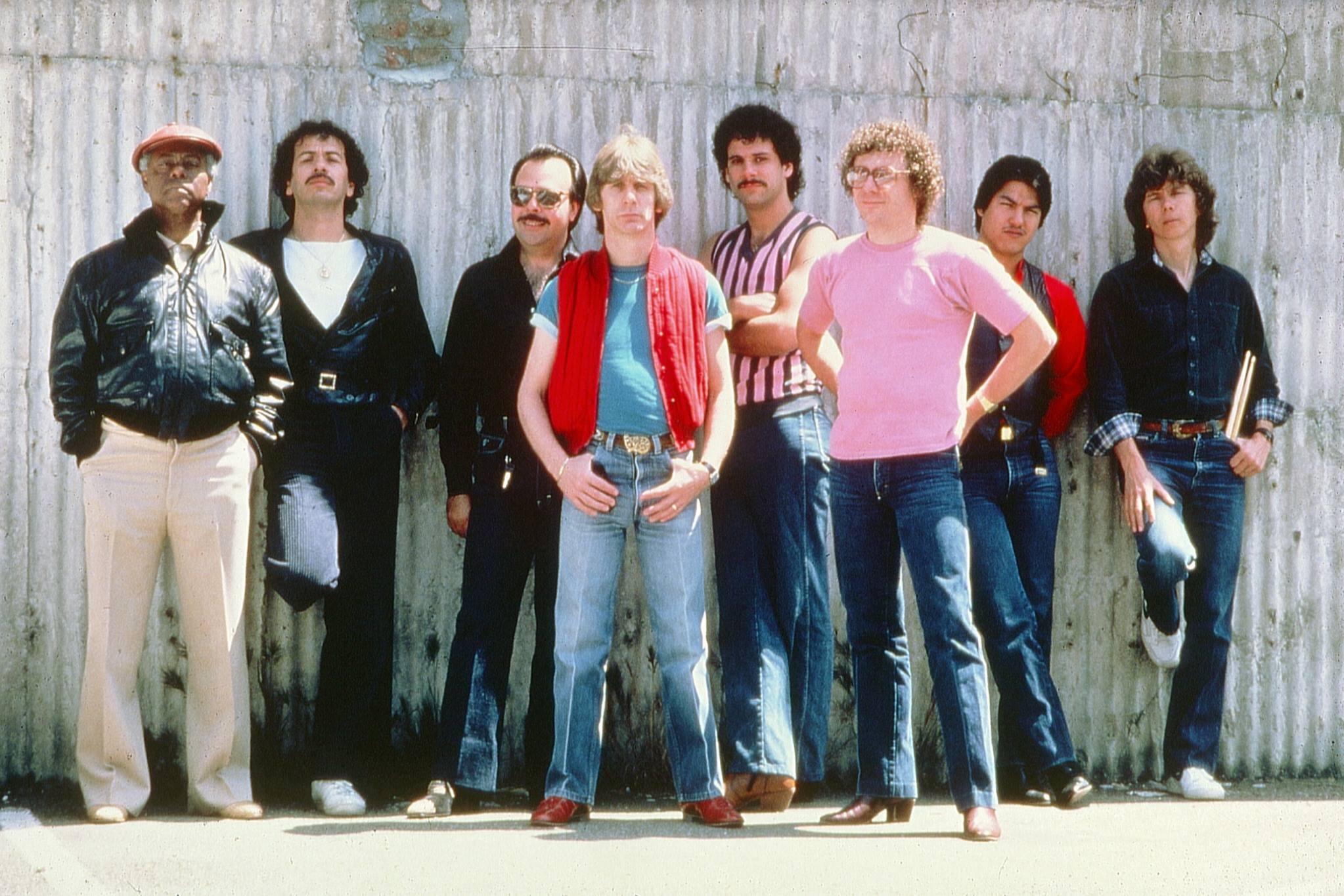 |
| Santana #30 |
|
|
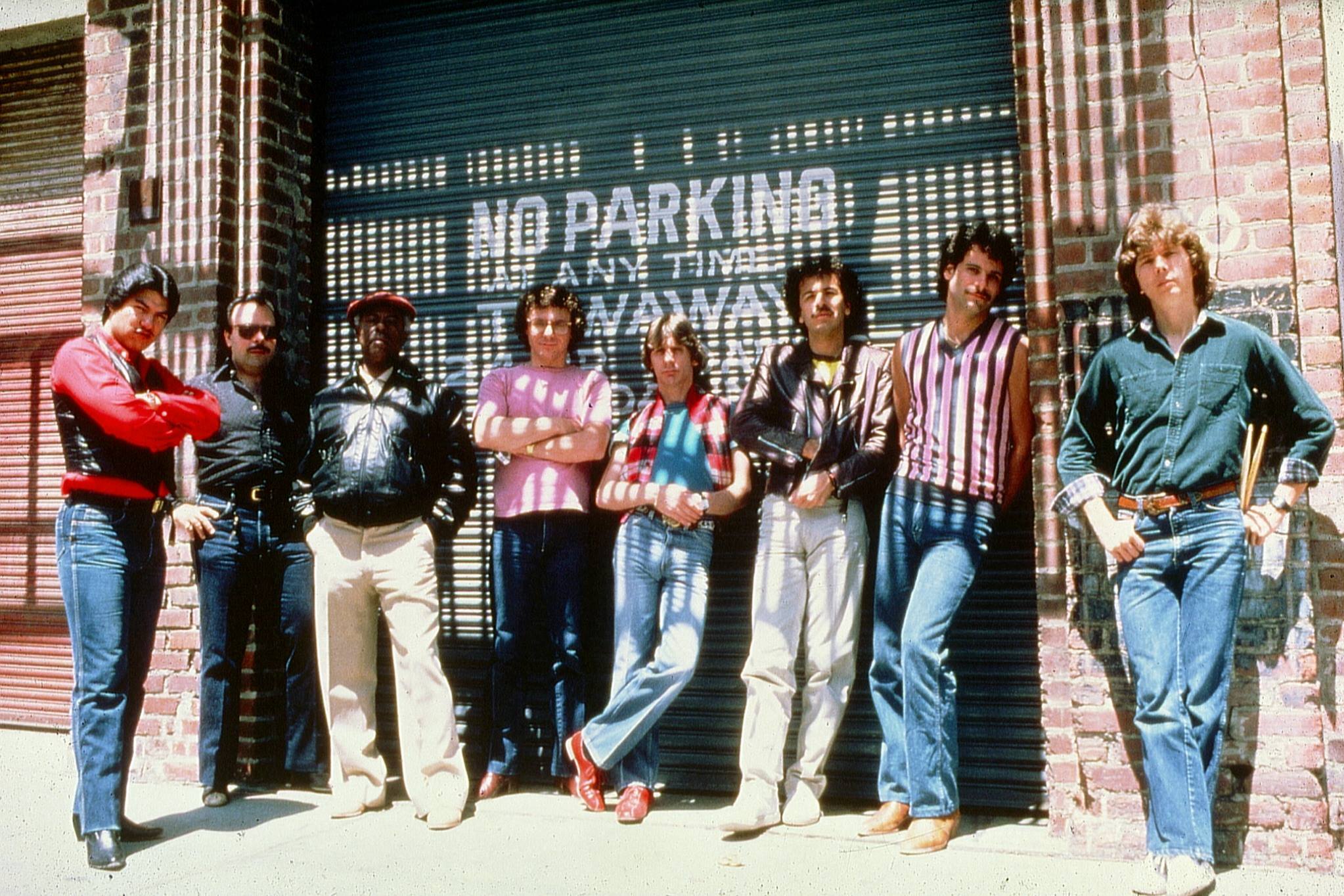 |
| Santana #30 |
|
|
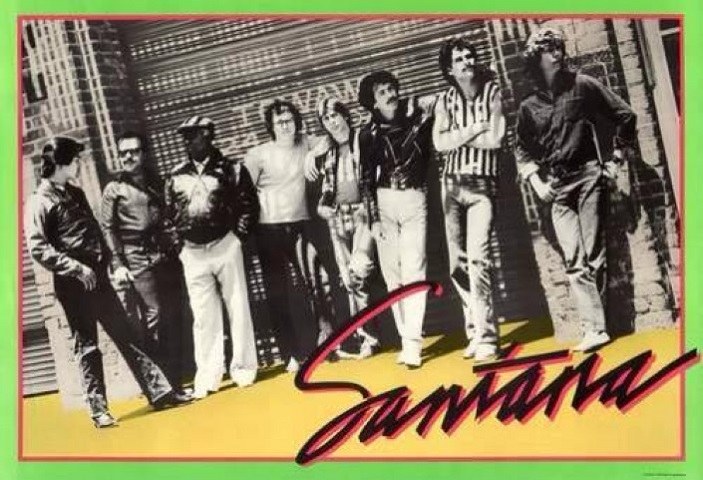 |
| Santana #30 |
|
|
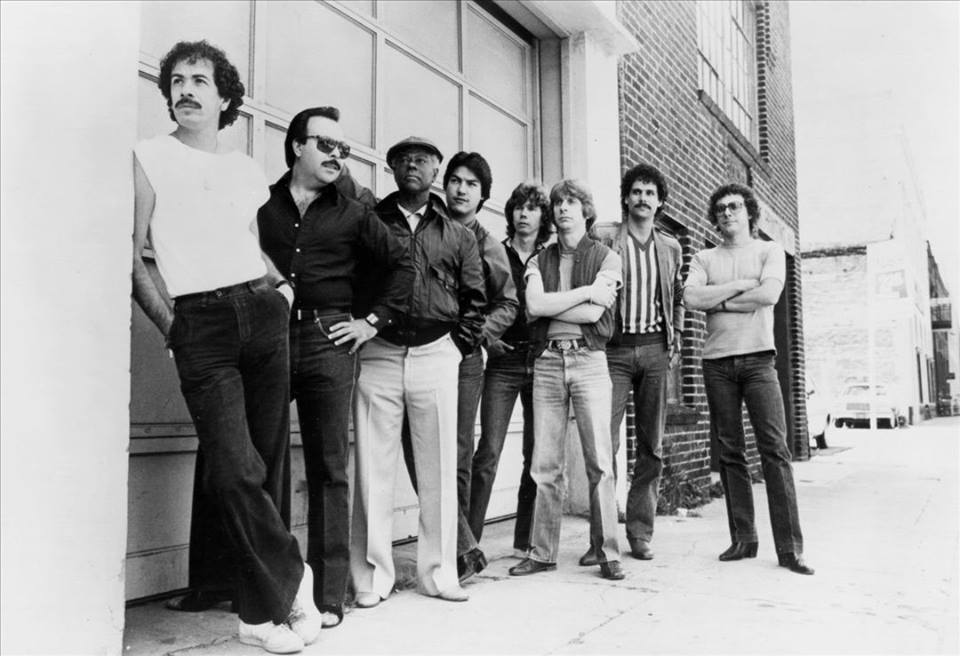 |
| Santana #30 |
|
|
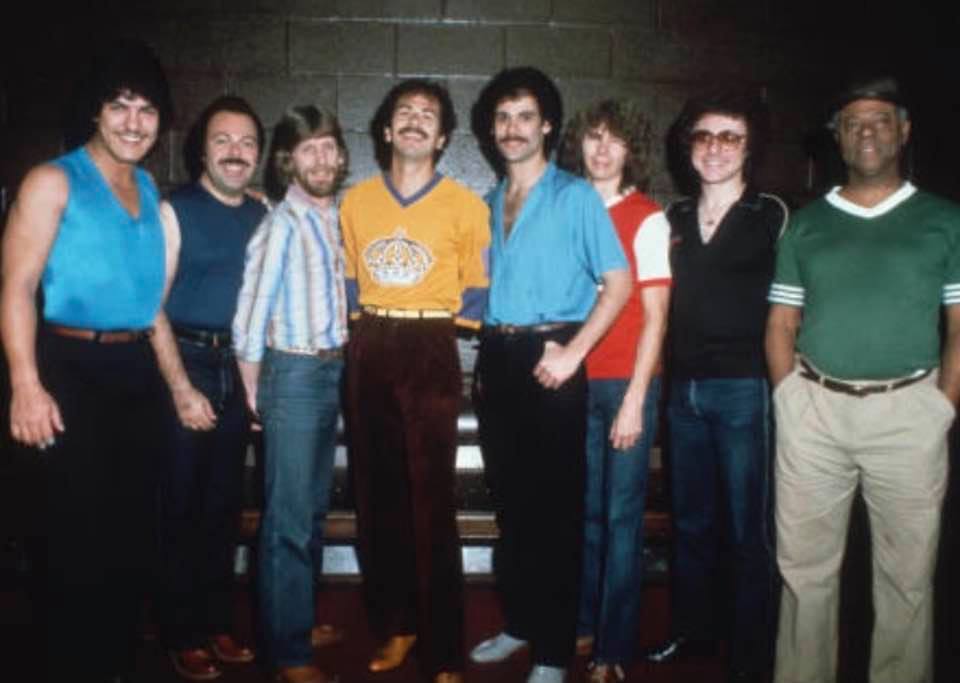 |
| Santana #30 |
|
|
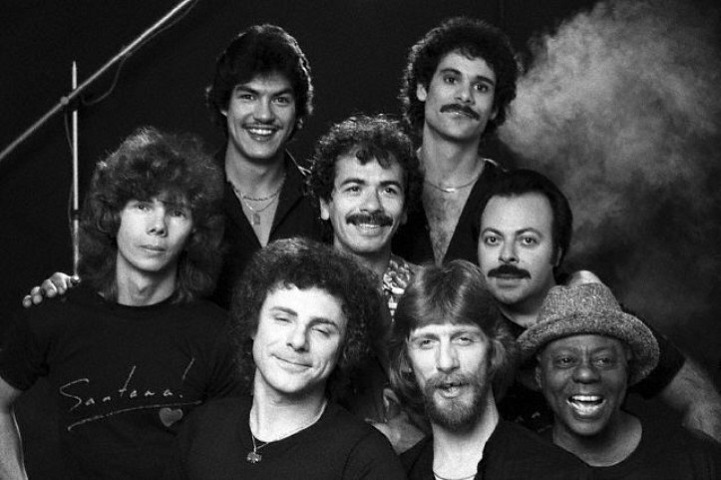 |
| Santana #30. Feb 4, 1981 © Roger Ressmeyer |
|
|
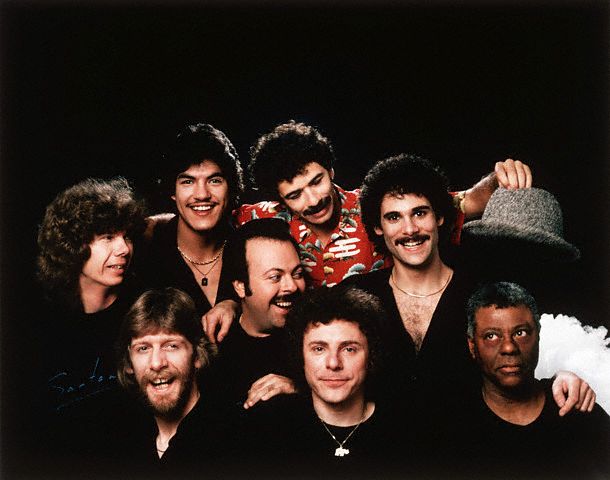 |
| Santana #30. Feb 4, 1981 © Roger Ressmeyer |
|
|
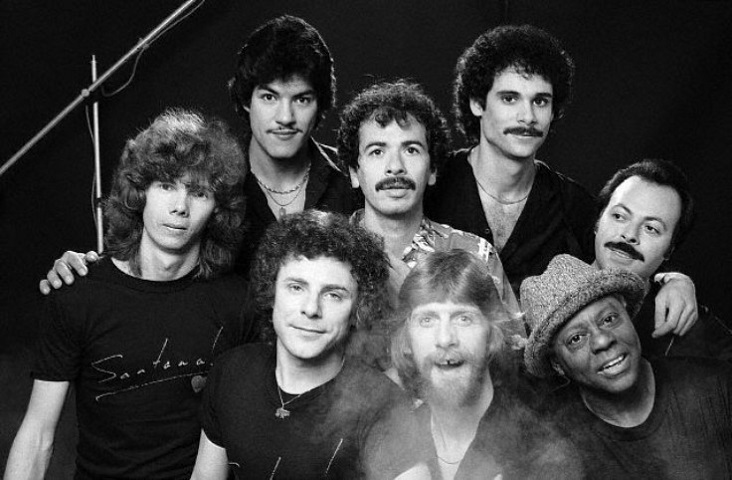 |
| Santana #30. Feb 4, 1981 © Roger Ressmeyer |
|
|
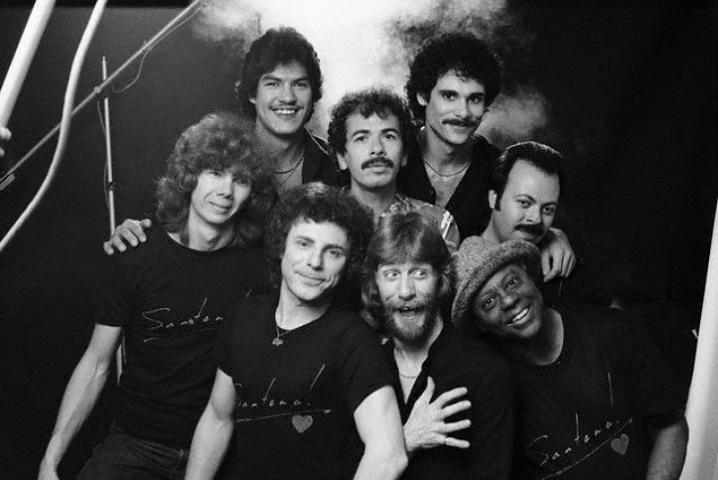 |
| Santana #30. Feb 4, 1981 © Roger Ressmeyer |
|
|
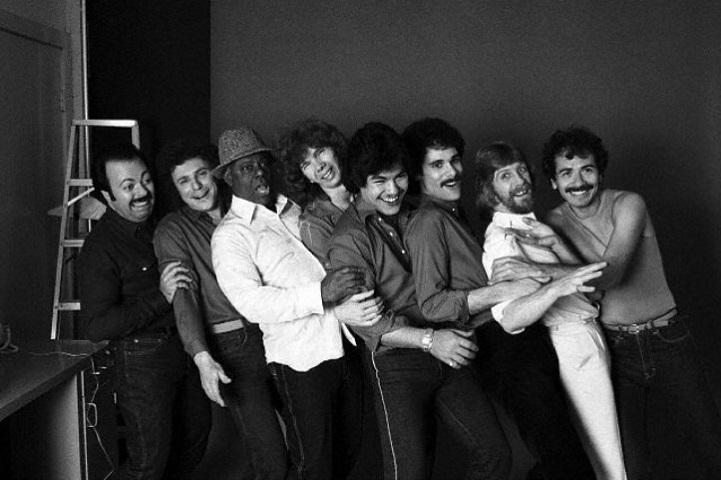 |
| Santana #30. Feb 4, 1981 © Roger Ressmeyer |
|
|
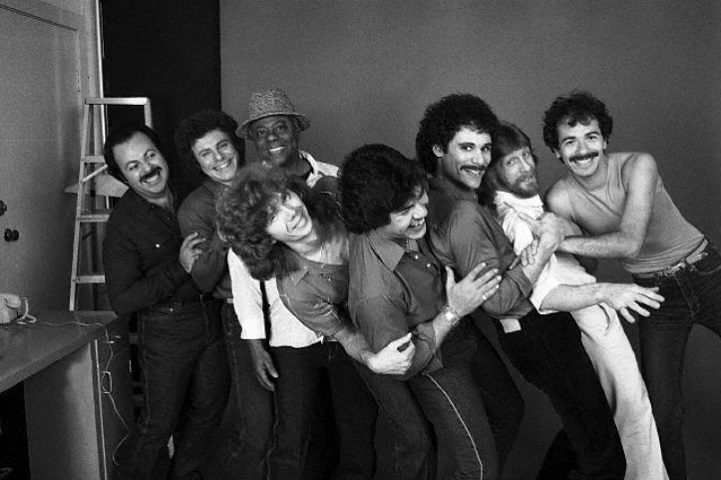 |
| Santana #30. Feb 4, 1981 © Roger Ressmeyer |
|
|
 |
| Santana #30. Feb 4, 1981 © Roger Ressmeyer |
|
|
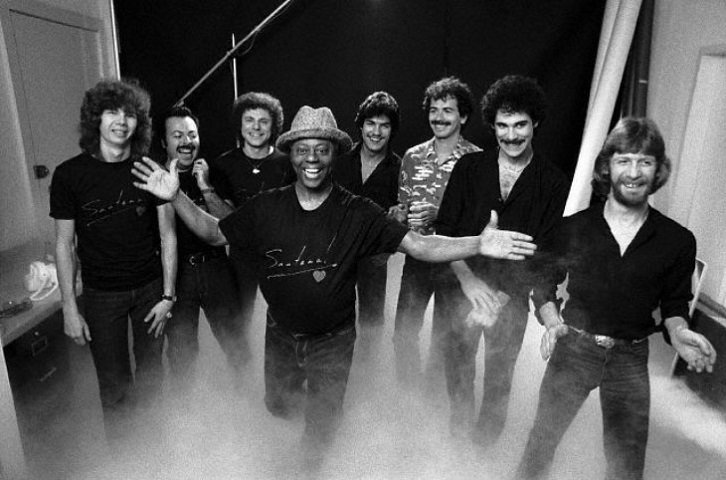 |
| Santana #30. Feb 4, 1981 © Roger Ressmeyer |
|
|
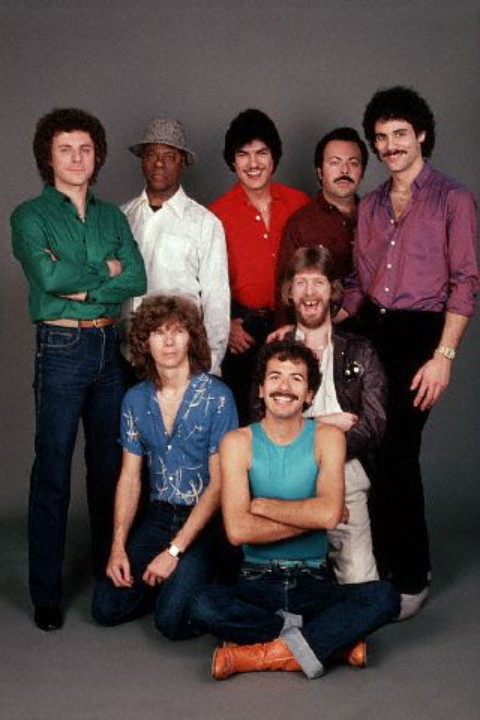 |
| Santana #30. Feb 4, 1981 © Roger Ressmeyer |
|
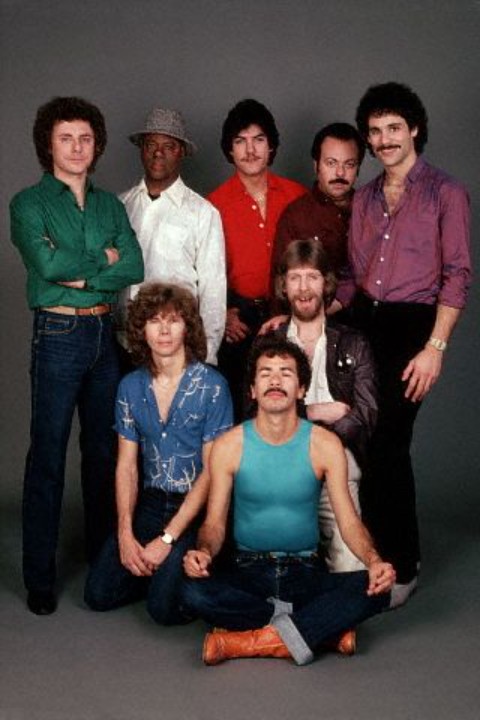 |
| Santana #30. Feb 4, 1981 © Roger Ressmeyer |
|
|
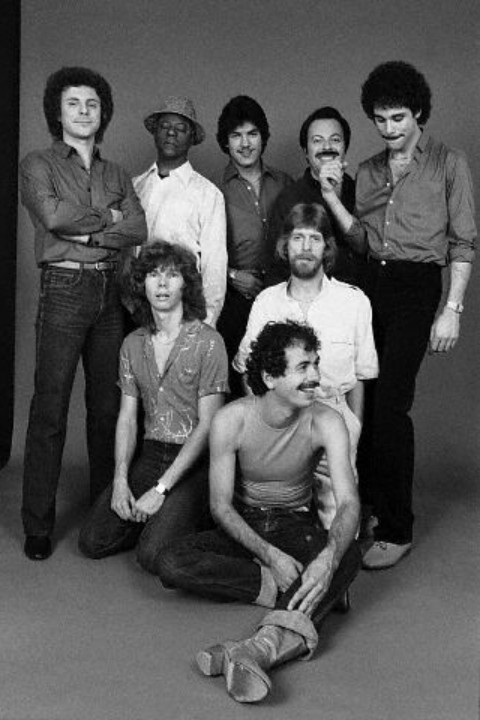 |
| Santana #30. Feb 4, 1981 © Roger Ressmeyer |
|
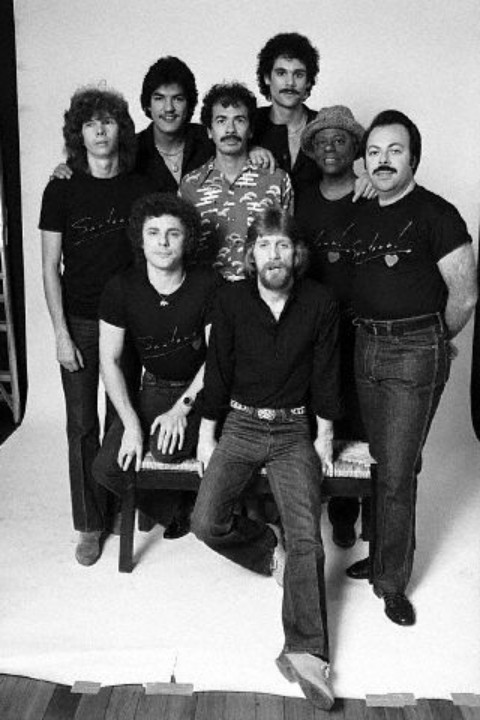 |
| Santana #30. Feb 4, 1981 © Roger Ressmeyer |
|
|
|
|
|
Santana #31: March 1983
Carlos Santana (g/perc/vo), Keith Jones (b), Graham Lear (ds), Raul Rekow (perc/vo), Armando Peraza (perc/vo), Orestes Vilato (perc/vo), Tom Coster (kbd/vo), Chester Thompson (kbd/vo), Greg Walker (vo)
David Margen is replaced by Keith Jones. Richard Baker is replaced by Tom Coster and Chester Thompson. Alex Ligertwood is replaced by Greg Walker.
|
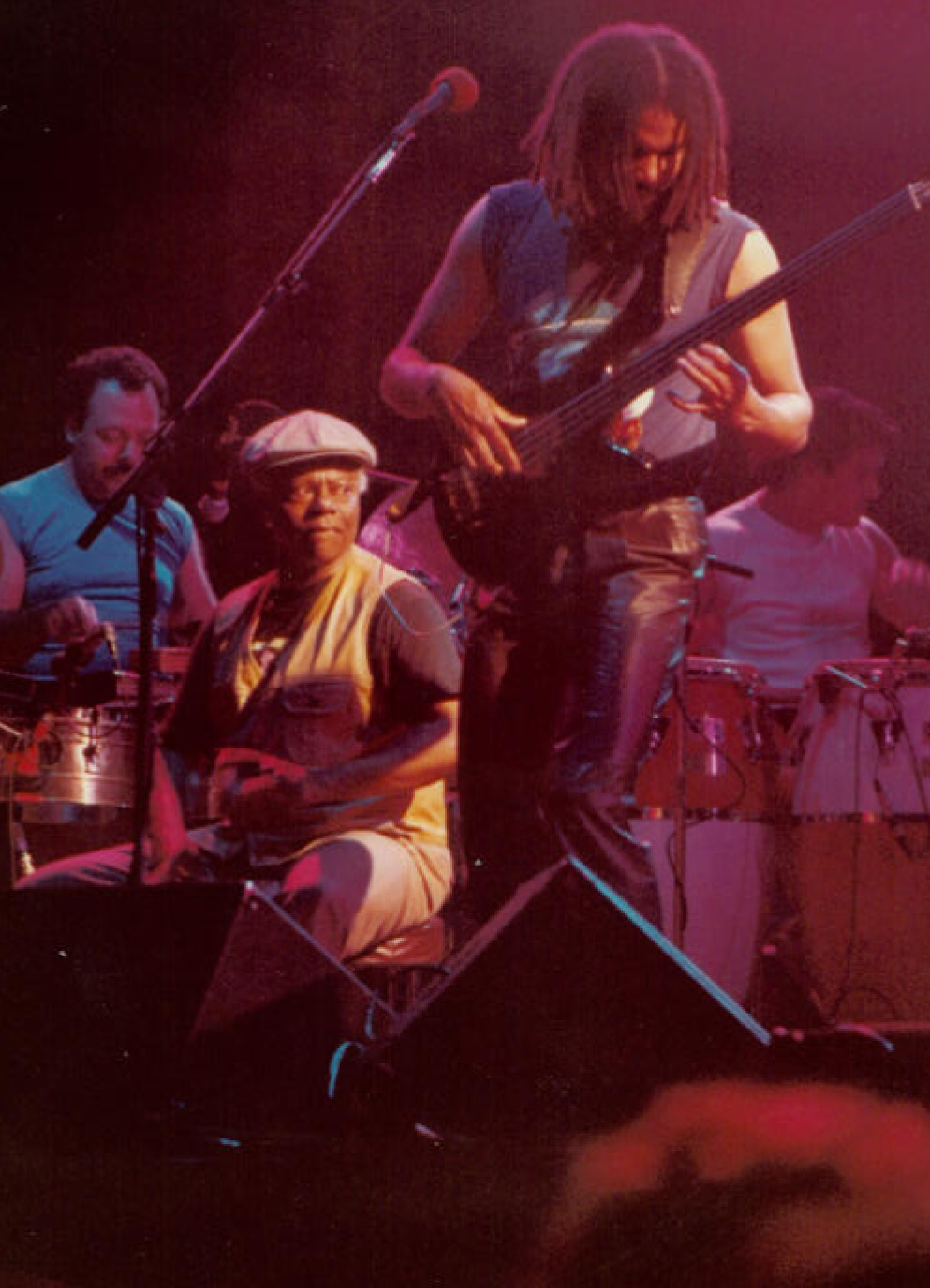 |
| Santana #31 |
| (left to right) Orestes Vilato (perc/vo), Armando Peraza (perc/vo), Keith Jones (b), Raul Rekow (perc/vo) |
| The Ahoy, Rotterdam, Netherlands April 22, 1983 © Andre Looijestijn |
|
|
|
|
|
Santana #32: March 1984
(left to right ✔) Alphonso Johnson (b), Alex Ligertwood (g/vo), David Sancious (kbd), Raul Rekow (perc/vo), Chester Cortez Thompson (ds), Chester Thompson (kbd/vo), Orestes Vilato (perc/vo), Armando Peraza (perc/vo), Carlos Santana (g/perc/vo), Greg Walker (vo)
Keith Jones is replaced by Alphonso Johnson. Graham Lear is replaced by Chester Cortez Thompson. David Sancious joins the band. Alex Ligertwood returns to the band.
Quote from Carlos Santana (The Universal Tone 2014): On bass we had Alphonso Johnson, who came with us in ’83 and had just the right kind of mix and experience for Santana at the time. (…) Alphonso is intelligent and warm, and I could hear that in his playing. (…) We also had David Sancious in that band. I admire him like crazy. (…) We had two Chester Thompsons. One was the amazing Chester C. Thompson on drums, who had played in Weather Report with Alphonso and later in Genesis. The other Chester Thompson played organ, piano, and synthesizers, and just as Ndugu was vitally important to the sound of the band in the late ‘70s, this guy was the cat who helped to define where Santana went after the mid-‘80s and for the following twenty-five years. (p407-408)
|
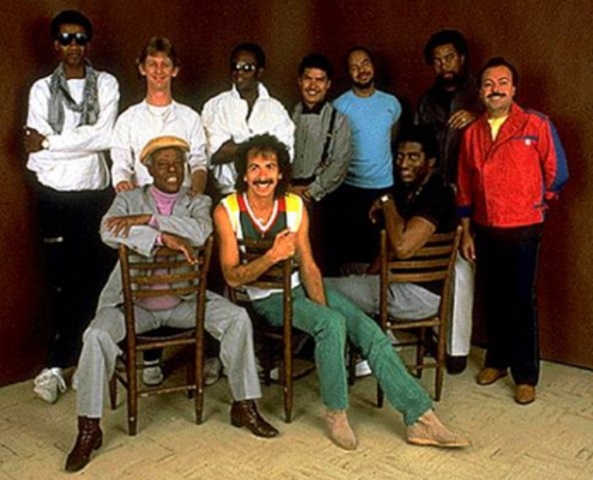 |
| ✔ Santana #32 |
|
|
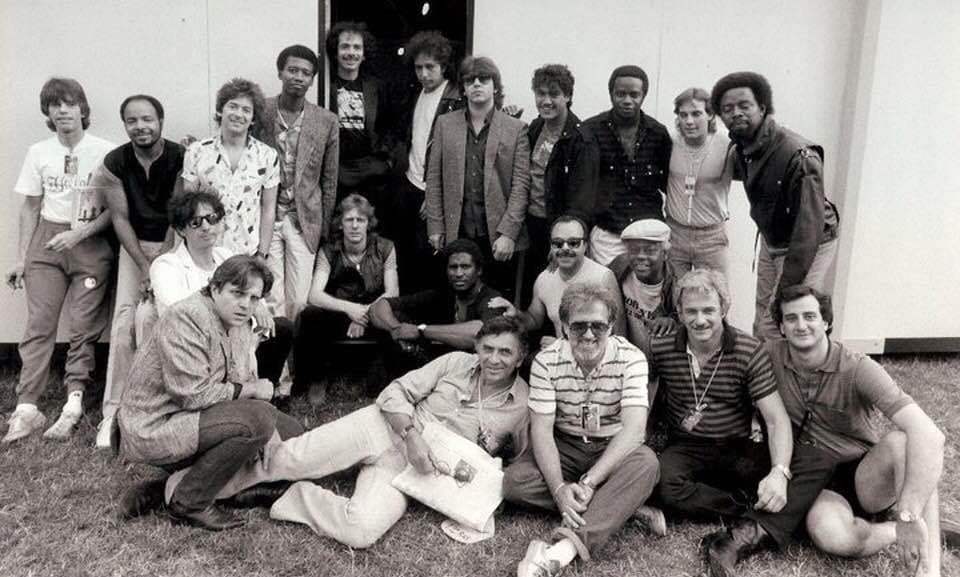 |
| Santana #32 with Bob Dylan's Band. March 1984 |
|
|
|
|
|
Santana #33: Oct 1984
Carlos Santana (g/perc/vo), Alphonso Johnson (b), Graham Lear (ds), Raul Rekow (perc/vo), Armando Peraza (perc/vo), Orestes Vilato (perc/vo), Chester Thompson (kbd/vo), Greg Walker (vo), Alex Ligertwood (g/vo)
Chester Cortez Thompson is replaced by Graham Lear.
|
|
|
|
Santana #34: April 1985
(left to right) Alex Ligertwood (g/vo), Graham Lear (ds), Alphonso Johnson (b), Chester Thompson (kbd/vo), Sterling Crew (kbd), Orestes Vilato (perc/vo), Armando Peraza (perc/vo), Raul Rekow (perc/vo), Greg Walker (vo), Carlos Santana (g/perc/vo)
Sterling Crew joins the band.
|
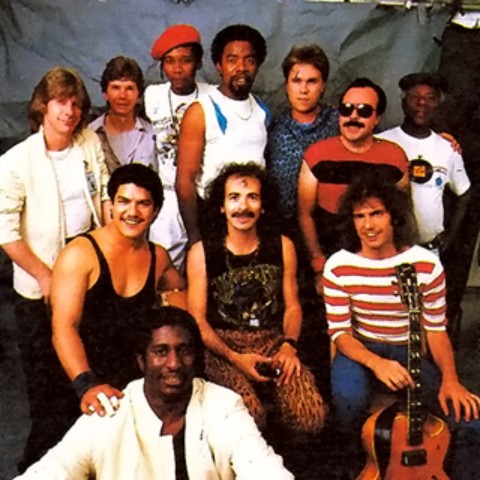 |
| Santana #34 with guest Pat Metheny (g) |
| Live Aid. JFK Stadium, Philadelphia, PA July 13, 1985 |
|
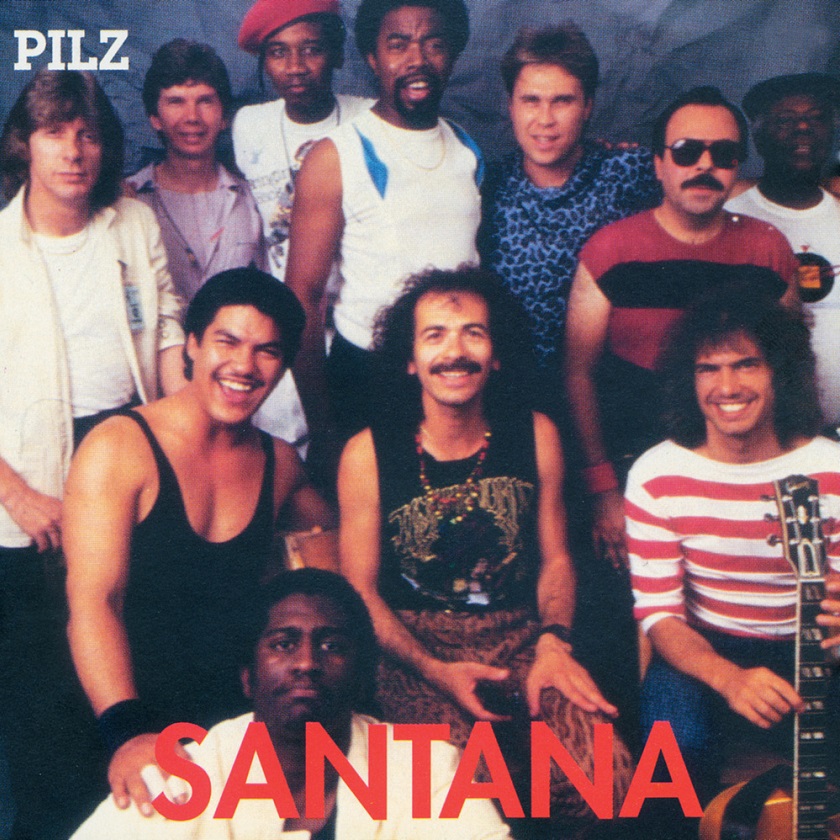 |
| Santana #34 with guest Pat Metheny (g) |
| Live Aid. JFK Stadium, Philadelphia, PA July 13, 1985 |
|
|
|
|
|
Santana #35: May 1986
Carlos Santana (g/perc/vo), Alphonso Johnson (b), Graham Lear (ds), Raul Rekow (perc/vo), Armando Peraza (perc/vo), Orestes Vilato (perc/vo), Chester Thompson (kbd/vo), Tom Coster (kbd/vo), Buddy Miles (g/vo)
Sterling Crew is replaced by Tom Coster. Greg Walker, Alex Ligertwood are replaced by Buddy Miles.
|
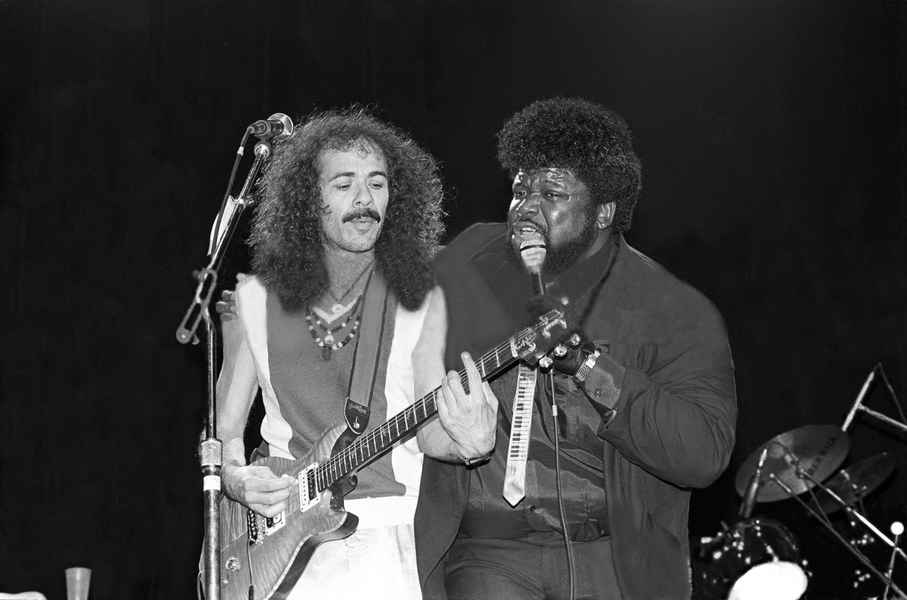 |
| Santana #35. (left to right) Carlos Santana (g/perc/vo), Buddy Miles (g/vo) |
| Crackdown Concert. Madison Square Garden, New York, NY Oct 31, 1986 © Ebet Roberts |
|
|
|
|
|
Santana #36: Feb 1987
(left to right) Graham Lear (ds), Carlos Santana (g/perc/vo), Raul Rekow (perc/vo), Orestes Vilato (perc/vo), Alphonso Johnson (b), Buddy Miles (g/vo), Chester Thompson (kbd/vo), Armando Peraza (perc/vo), Alex Ligertwood (g/vo)
Alex Ligertwood returns to the band.
|
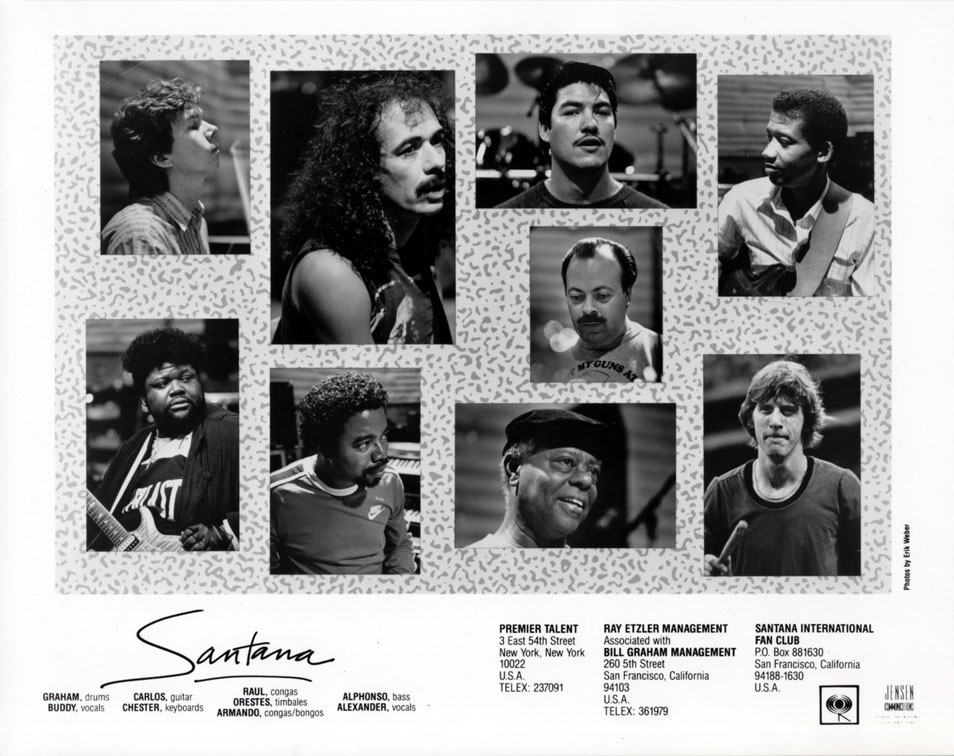 |
| Santana #36 © Erik Weber |
|
|
|
|
|
Santana #37: July 1987
Carlos Santana (g/perc/vo), Alphonso Johnson (b), Graham Lear (ds), Raul Rekow (perc/vo), Armando Peraza (perc/vo), Orestes Vilato (perc/vo), Chester Thompson (kbd/vo), Alex Ligertwood (g/vo)
|
|
|
|
|
|
|
|
Carlos Santana/Wayne Shorter Band: June 1988
(left to right) Carlos Santana (g/perc/vo), Armando Peraza (perc/vo), Wayne Shorter (sax), Patrice Rushen (kbd), "Ndugu" Leon Chancler (ds), Alphonso Johnson (b), missing Jose "Chepito" Areas (perc), Chester Thompson (kbd/vo)
|
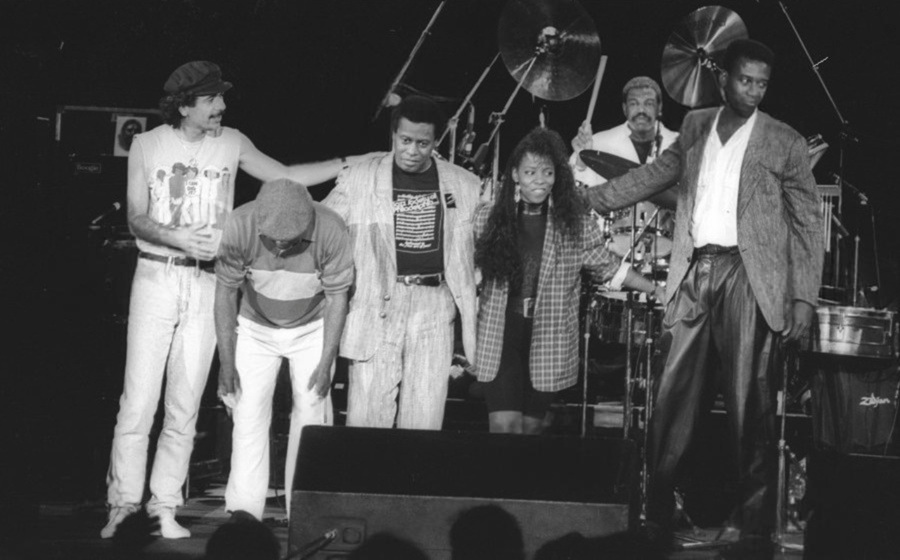 |
| Carlos Santana/Wayne Shorter Band. Paris Jazz Festival. Palais Des Sports, Paris, France July 11, 1988 © Christian Rose |
|
|
|
|
|
Santana #39 (Reunion Band): Aug 1988
(left to right ✔) Chester Thompson (kbd/vo), Armando Peraza (perc/vo), Michael Shrieve (ds), Jose "Chepito" Areas (perc), Alphonso Johnson (b), Carlos Santana (g/perc/vo), Gregg Rolie (kbd/vo)
|
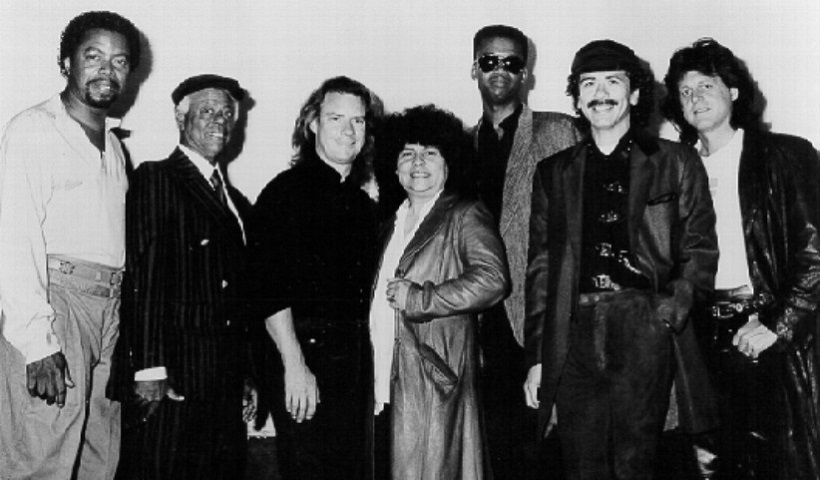 |
| ✔ Santana #39 (Reunion Band) © Ken Friedman |
|
|
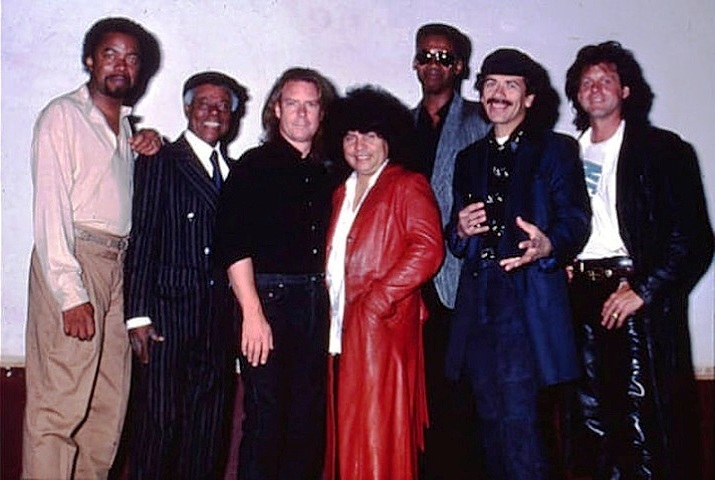 |
| Santana #39 (Reunion Band) © Ken Friedman |
|
|
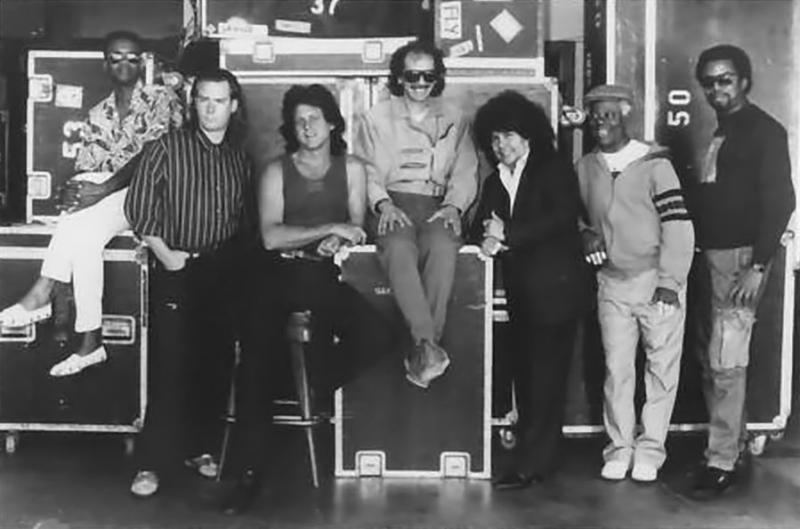 |
| Santana #39 (Reunion Band) © Ken Friedman |
|
|
|
|
|
Santana #40: April 1989
(left to right) Chester Thompson (kbd/vo), Jose "Chepito" Areas (perc), Alex Ligertwood (g/vo), Carlos Santana (g/perc/vo), Alphonso Johnson (b), Armando Peraza (perc/vo), Walfredo De Los Reyes (ds)
Michael Shrieve is replaced by Walfredo De Los Reyes. Gregg Rolie is replaced by Alex Ligertwood.
|
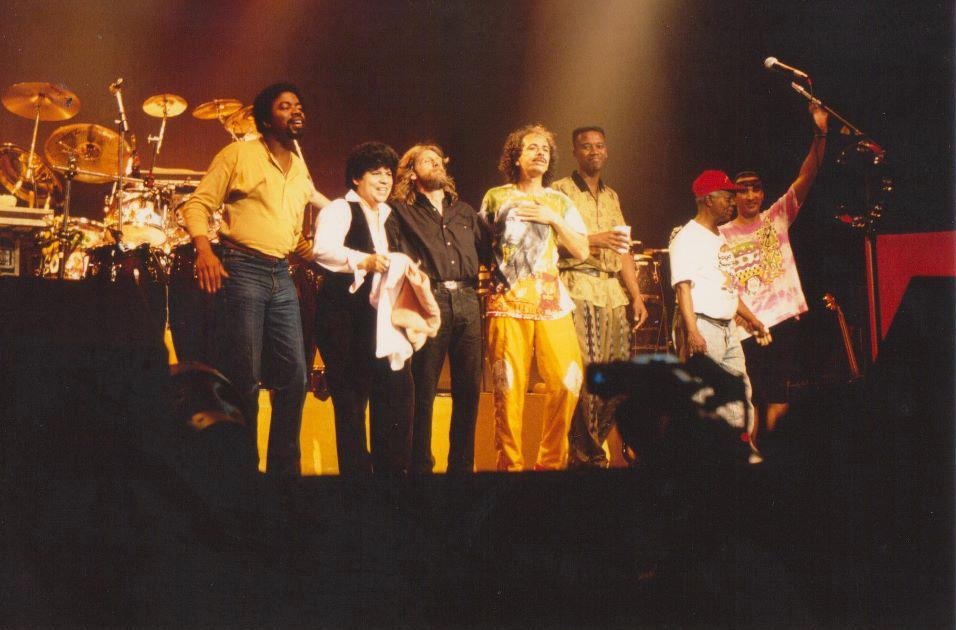 |
| Santana #40 |
|
|
|
|
|
Santana #41: Sept 1989
Carlos Santana (g/perc/vo), Keith Jones (b), Walfredo De Los Reyes (ds), Armando Peraza (perc/vo), Chester Thompson (kbd/vo), Alex Ligertwood (g/vo)
Alphonso Johnson is replaced by Keith Jones.
|
|
|
|
Santana #42: March 1990
(left to right ✔) Armando Peraza (perc/vo), Walfredo De Los Reyes (ds), Carlos Santana (g/perc/vo), Alex Ligertwood (g/vo), Benny Rietveld (b) (seated), Chester Thompson (kbd/vo)
Keith Jones is replaced by Benny Rietveld.
|
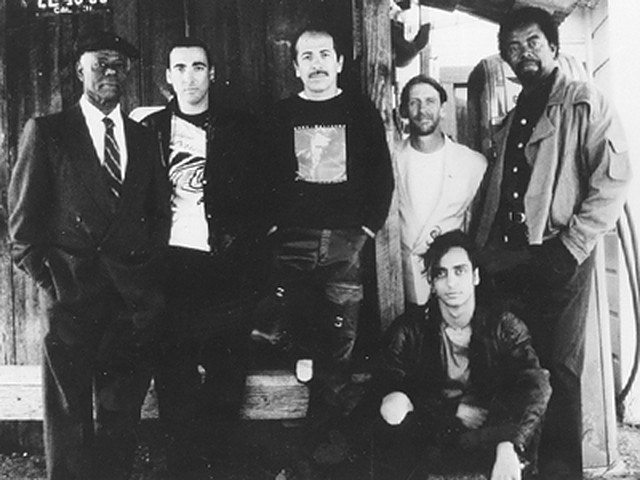 |
| ✔ Santana #42 © Diego Uchitel |
|
|
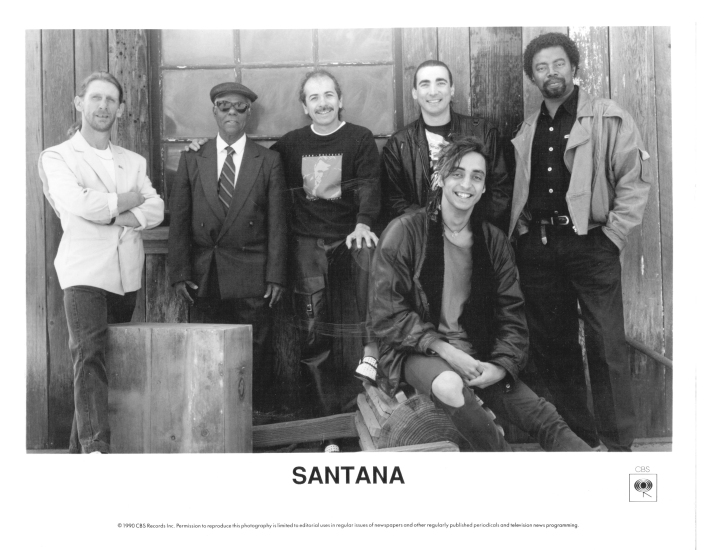 |
| Santana #42 © Diego Uchitel |
|
|
|
|
|
Santana #43: Oct 1990
Carlos Santana (g/perc/vo), Benny Rietveld (b), Walfredo De Los Reyes (ds), Raul Rekow (perc/vo), Chester Thompson (kbd/vo), Alex Ligertwood (g/vo)
Armando Peraza is replaced by Raul Rekow.
|
|
|
|
Santana #44: April 1991
Carlos Santana (g/perc/vo), Benny Rietveld (b), Gaylord Birch (ds), Raul Rekow (perc/vo), Karl Perazzo (perc/vo), Chester Thompson (kbd/vo), Tony Lindsay (vo)
Walfredo De Los Reyes is replaced by Gaylord Birch. Karl Perazzo joins the band. Alex Ligertwood is replaced by Tony Lindsay.
|
|
|
|
Santana #45: June 1991
Carlos Santana (g/perc/vo), Benny Rietveld (b), Billy Johnson (ds), Raul Rekow (perc/vo), Karl Perazzo (perc/vo), Chester Thompson (kbd/vo), Tony Lindsay (vo)
Gaylord Birch is replaced by Billy Johnson.
|
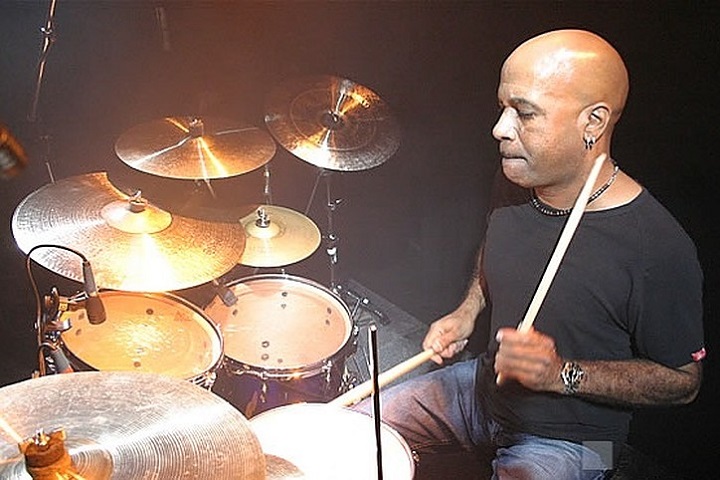 |
| Santana #45. Billy Johnson (ds) Unknown Date |
|
|
|
|
|
Santana #46: Jan 1992
Carlos Santana (g/perc/vo), Benny Rietveld (b), Walfredo De Los Reyes (ds), Raul Rekow (perc/vo), Karl Perazzo (perc/vo), Chester Thompson (kbd/vo), Alex Ligertwood (g/vo)
Billy Johnson is replaced by Walfredo De Los Reyes. Tony Lindsay is replaced by Alex Ligertwood.
|
|
|
|
Santana #47: June 1992
Carlos Santana (g/perc/vo), Alphonso Johnson (b), Walfredo De Los Reyes (ds), Raul Rekow (perc/vo), Karl Perazzo (perc/vo), Chester Thompson (kbd/vo), Alex Ligertwood (g/vo)
Benny Rietveld is replaced by Alphonso Johnson.
|
|
|
|
Santana #48: July 1992
Carlos Santana (g/perc/vo), Myron Dove (b), Walfredo De Los Reyes (ds), Raul Rekow (perc/vo), Karl Perazzo (perc/vo), Chester Thompson (kbd/vo), Alex Ligertwood (g/vo)
Alphonso Johnson is replaced by Myron Dove.
|
|
|
|
Santana #49: Aug 1993
Carlos Santana (g/perc/vo), Myron Dove (b), Rodney Holmes (ds), Raul Rekow (perc/vo), Karl Perazzo (perc/vo), Chester Thompson (kbd/vo), Alex Ligertwood (g/vo), Vorriece Cooper (vo), Jorge Santana (g)
Walfredo De Los Reyes is replaced by Rodney Holmes. Vorriece Cooper, Jorge Santana join the band.
Quote from Carlos Santana (The Universal Tone 2014): Rodney is one of those musicians who is the whole package: he’s smart and can listen and react, and he has the right combination of chops and musicality. (p463)
|
|
|
|
Santana #50: Feb 1994
Carlos Santana (g/perc/vo), Myron Dove (b), Rodney Holmes (ds), Raul Rekow (perc/vo), Karl Perazzo (perc/vo), Chester Thompson (kbd/vo), Alex Ligertwood (g/vo)
|
|
|
|
Santana #51: June 1994
Carlos Santana (g/perc/vo), Myron Dove (b), Tommie Bradford, Jr. (ds), Raul Rekow (perc/vo), Karl Perazzo (perc/vo), Chester Thompson (kbd/vo), Alex Ligertwood (g/vo)
Rodney Holmes is replaced by Tommie Bradford, Jr.
|
|
|
|
Santana #52: Aug 1994
Carlos Santana (g/perc/vo), Myron Dove (b), Billy Johnson (ds), Raul Rekow (perc/vo), Karl Perazzo (perc/vo), Chester Thompson (kbd/vo), Alex Ligertwood (g/vo), Jorge Santana (g)
Tommie Bradford, Jr. is replaced by Billy Johnson. Jorge Santana returns to the band.
|
|
|
|
Santana #53: May 1995
Carlos Santana (g/perc/vo), Myron Dove (b), Billy Johnson (ds), Raul Rekow (perc/vo), Karl Perazzo (perc/vo), Chester Thompson (kbd/vo), Curtis Salgado (hca/vo)
Alex Ligertwood is replaced by Curtis Salgado.
|
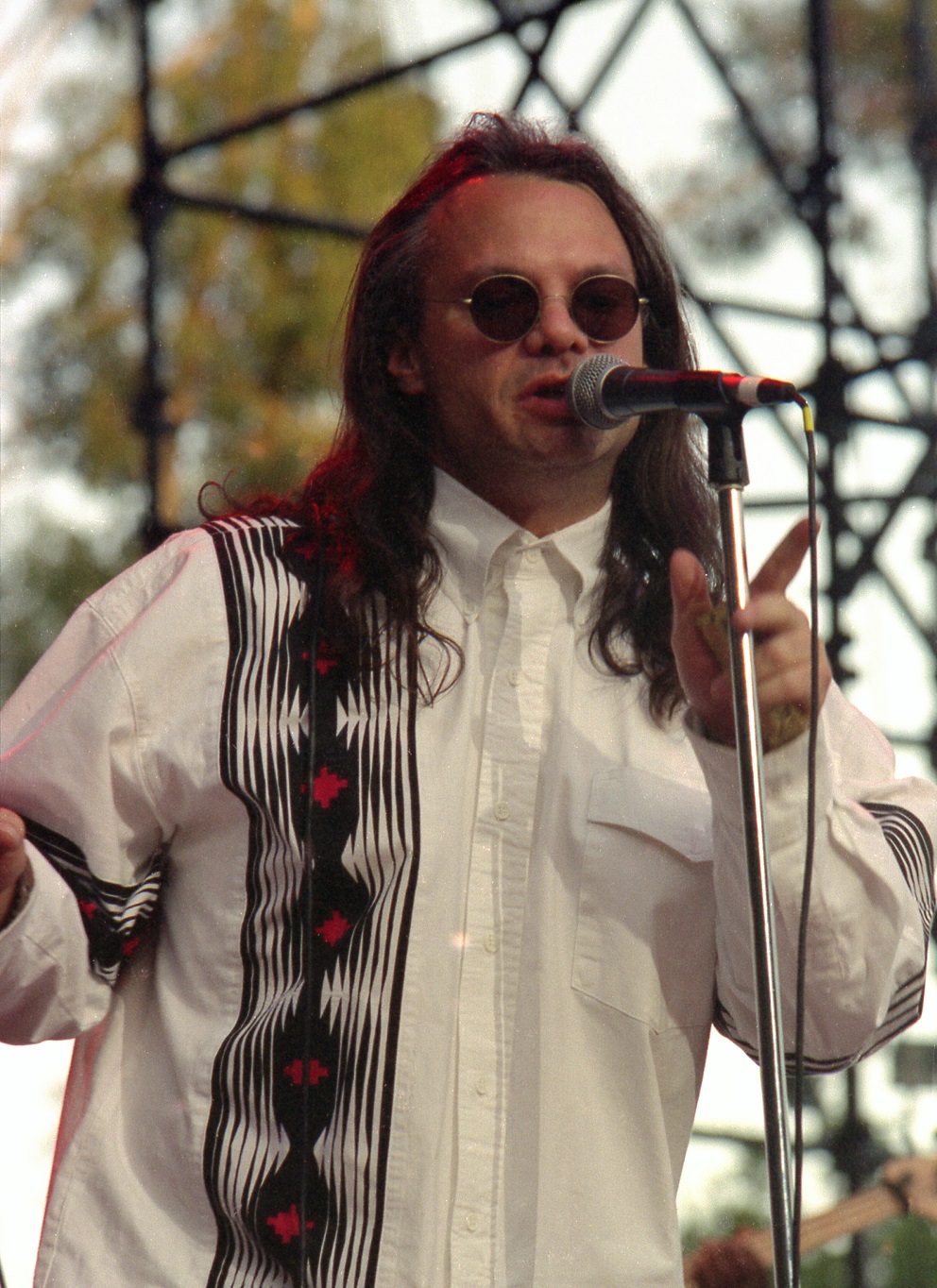 |
| Santana #53. Curtis Salgado (hca/vo) |
| County Bowl, Santa Barbara, CA May 26, 1995 © Joseph Peduto |
|
|
|
|
|
Santana #54: July 1995
Carlos Santana (g/perc/vo), Myron Dove (b), Billy Johnson (ds), Raul Rekow (perc/vo), Karl Perazzo (perc/vo), Chester Thompson (kbd/vo), Tony Lindsay (vo)
Curtis Salgado is replaced by Tony Lindsay.
|
|
|
|
Santana #55: March 1997
Carlos Santana (g/perc/vo), Benny Rietveld (b), Horacio “El Negro” Hernandez (ds), Raul Rekow (perc/vo), Karl Perazzo (perc/vo), Chester Thompson (kbd/vo), Tony Lindsay (vo)
Myron Dove is replaced by Benny Rietveld. Billy Johnson is replaced by Horacio “El Negro” Hernandez.
|
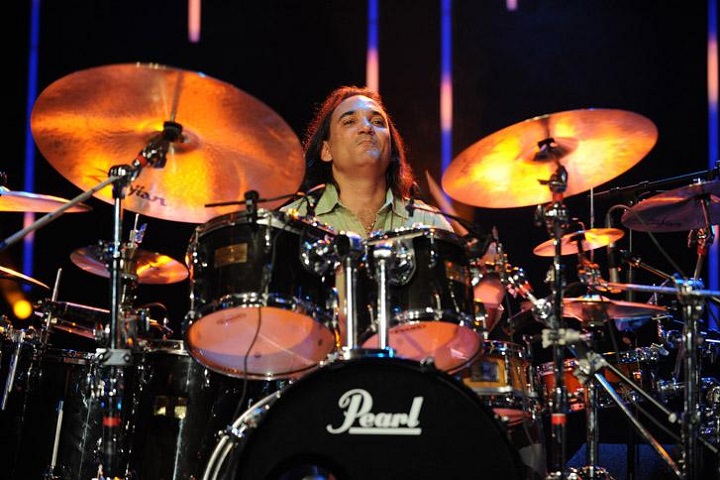 |
| Santana #55. Horacio “El Negro” Hernandez Unknown Date |
|
|
|
|
|
Santana #56: Sept 1997
Carlos Santana (g/perc/vo), Benny Rietveld (b), Horacio “El Negro” Hernandez (ds), Ricky Wellman (ds), Raul Rekow (perc/vo), Karl Perazzo (perc/vo), Chester Thompson (kbd/vo), Tony Lindsay (vo)
A second drummer joins the band, Ricky Wellman.
|
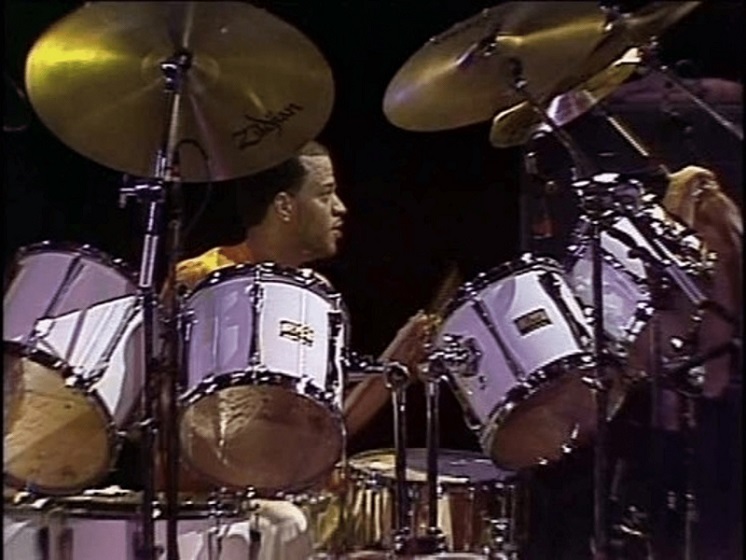 |
| Santana #56. Ricky Wellman (ds) Unknown Date |
|
|
|
|
|
Santana #57: Dec 1997
Carlos Santana (g/perc/vo), Benny Rietveld (b), Rodney Holmes (ds), Raul Rekow (perc/vo), Karl Perazzo (perc/vo), Chester Thompson (kbd/vo), Tony Lindsay (vo)
Horacio “El Negro” Hernandez and Ricky Wellman are replaced by Rodney Holmes.
|
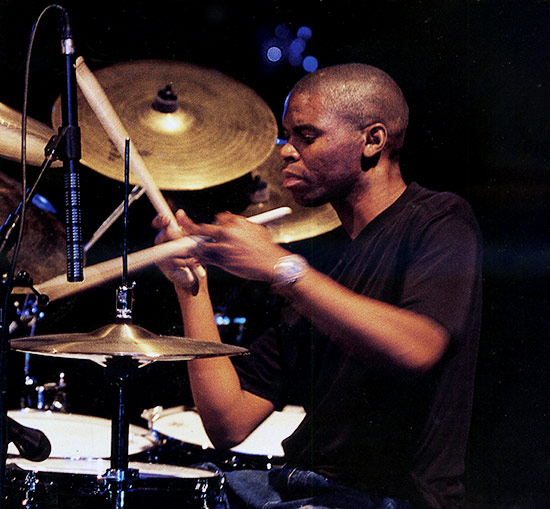 |
| Santana #57. Rodney Holmes (ds) Unknown Date |
|
|
|
|
|
Santana #58: Sept 1999
Carlos Santana (g/perc/vo), Benny Rietveld (b), Rodney Holmes (ds), Raul Rekow (perc/vo), Karl Perazzo (perc/vo), Chester Thompson (kbd/vo), Tony Lindsay (vo), Andy Vargas (vo)
A second vocalist joins the band, Andy Vargas.
|
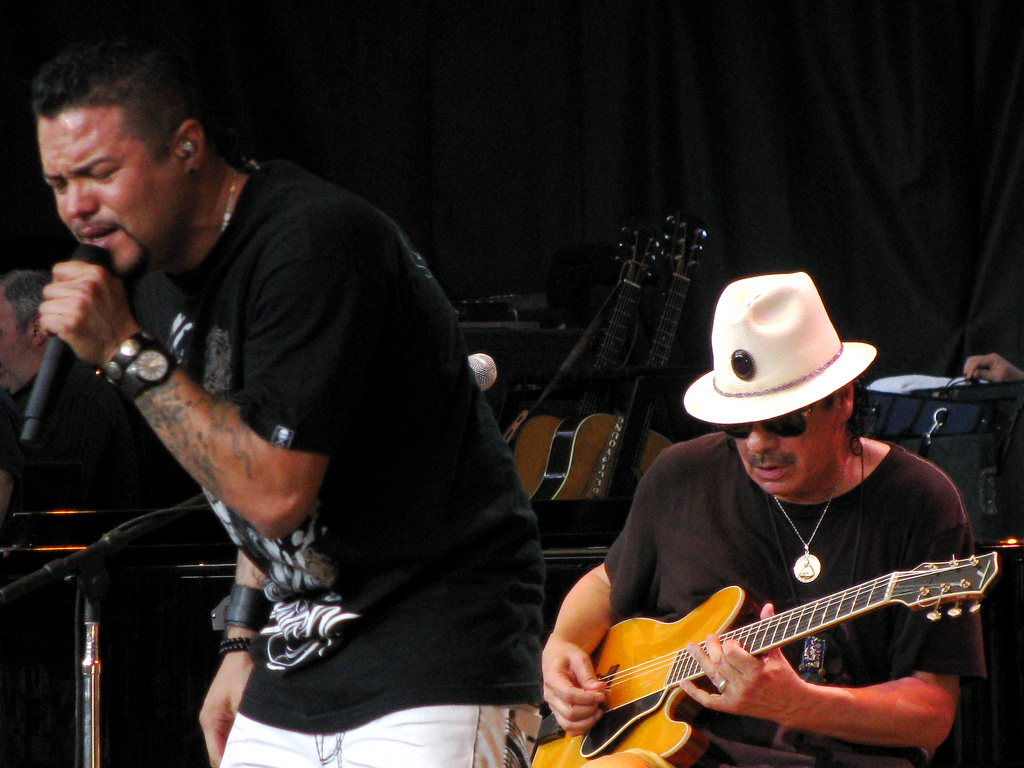 |
| Santana #58. (left to right) Andy Vargas (vo), Carlos Santana (g/perc/vo) Unknown Date |
|
|
|
|
|
Santana #59: May 2000
Carlos Santana (g/perc/vo), Benny Rietveld (b), Rodney Holmes (ds), Raul Rekow (perc/vo), Karl Perazzo (perc/vo), Chester Thompson (kbd/vo), Tony Lindsay (vo), Andy Vargas (vo)
Sidemen: Jeff Cressman (tb), William Ortiz (tp)
A trombone player, Jeff Cresman, and a trumpet player, William Ortiz, join the band as sidemen.
|
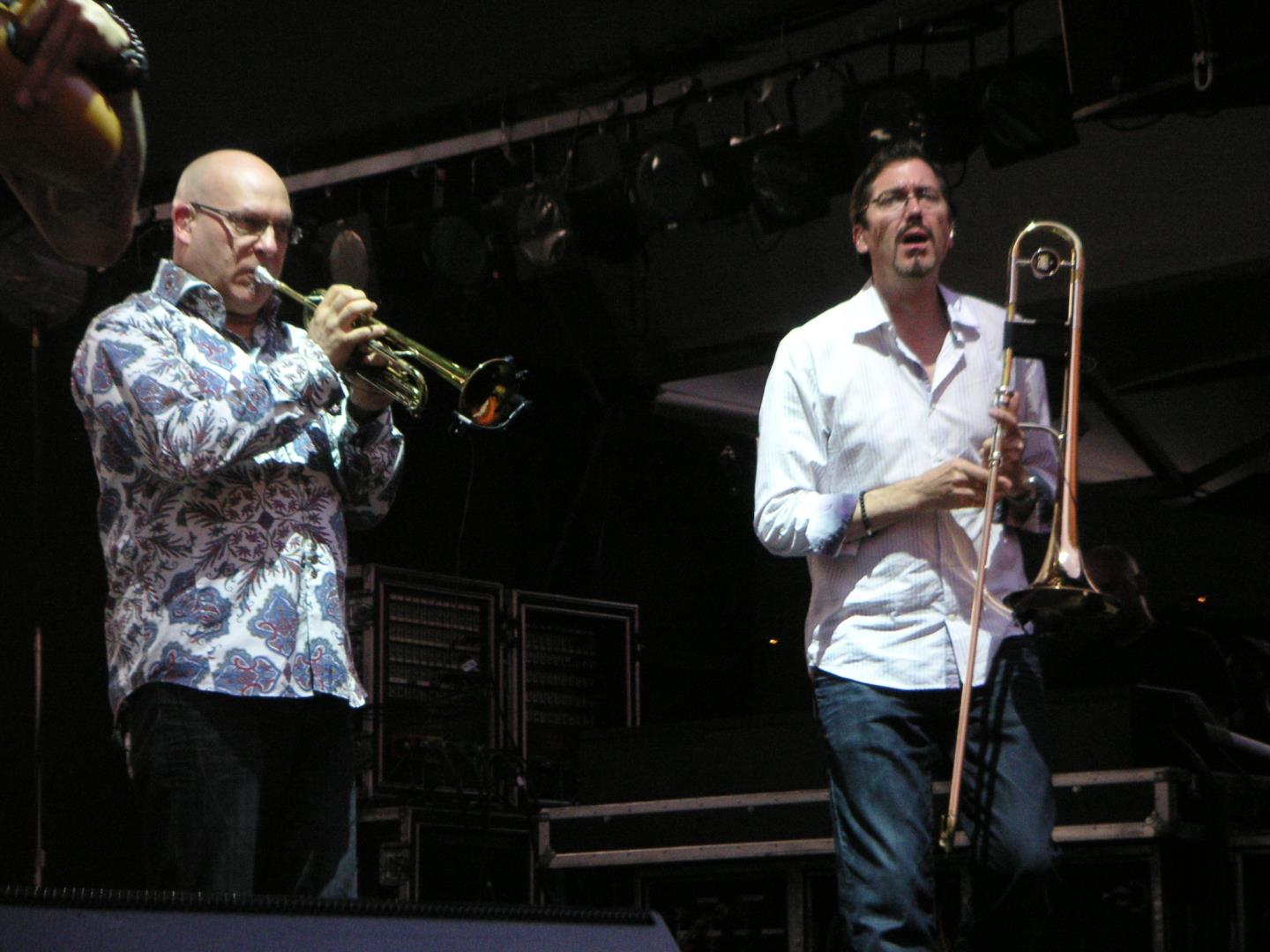 |
| Santana #59. (left to right) William Ortiz (tp), Jeff Cressman (tb) Unknown Date |
|
|
|
|
|
Santana #60: July 2000
(left to right) Andy Vargas (vo), Karl Perazzo (perc/vo), Raul Rekow (perc/vo), Carlos Santana (g/perc/vo) (seated), Tony Lindsay (vo), Tracy Chapman (seated), Benny Rietveld (b), Billy Johnson (ds), Chester Thompson (kbd/vo)
Sidemen (not pictured): Jeff Cressman (tb), William Ortiz (tp)
Rodney Holmes is replaced by Billy Johnson.
|
 |
| Santana #60 with MC Tracy Chapman. Sidemen Jeff Cressman (tb), William Ortiz (tp) not pictured |
| 2001 California Music Awards. Henry J. Kaiser Auditorium, Oakland, CA April 28, 2001 |
|
|
|
|
|
Santana #61: March 2002
Carlos Santana (g/perc/vo), Benny Rietveld (b), Dennis Chambers (ds), Raul Rekow (perc/vo), Karl Perazzo (perc/vo), Chester Thompson (kbd/vo), Tony Lindsay (vo), Andy Vargas (vo)
Sidemen: Jeff Cressman (tb), William Ortiz (tp), Myron Dove (rhythm g)
Billy Johnson is replaced by Dennis Chambers. Bass player Benny Rietveld is occasionally replaced by sidemen Myron Dove for the 2003 "Shaman" European Tour.
Quote from Carlos Santana (The Universal Tone 2014): Dennis is maybe the best power-groove drummer on the planet right now---such a serious pocket. (p463)
Quote from Carlos Santana (The Universal Tone 2014): New people were coming into the band, such as “Gentleman” Jeff Cressman on the trombone, and I was getting to meet more musicians than I usually would. (p464)
|
|
|
|
Santana #62: June 2004
Carlos Santana (g/perc/vo), Benny Rietveld (b), Dennis Chambers (ds), Raul Rekow (perc/vo), Karl Perazzo (perc/vo), Chester Thompson (kbd/vo), Andy Vargas (vo)
Sidemen: Jeff Cressman (tb), William Ortiz (tp), Myron Dove (rhythm g)
After Tony Lindsay’s departure, Andy Vargas becomes the only vocalist of the band.
|
|
|
|
Santana #63: March 2005
Carlos Santana (g/perc/vo), Benny Rietveld (b), Dennis Chambers (ds), Karl Perazzo (perc/vo), Bobby Allende (perc/vo), Chester Thompson (kbd/vo), Salvador Santana (kbd), Andy Vargas (vo), Jeff Cressman (tb), William Ortiz (tp), Tommy Anthony (rhythm g)
Sidemen Jeff Cressman, William Ortiz become full band members. Myron Dove is replaced by Tommy Anthony. Raul Rekow is replaced by Bobby Allende. Salvador Santana joins the band.
|
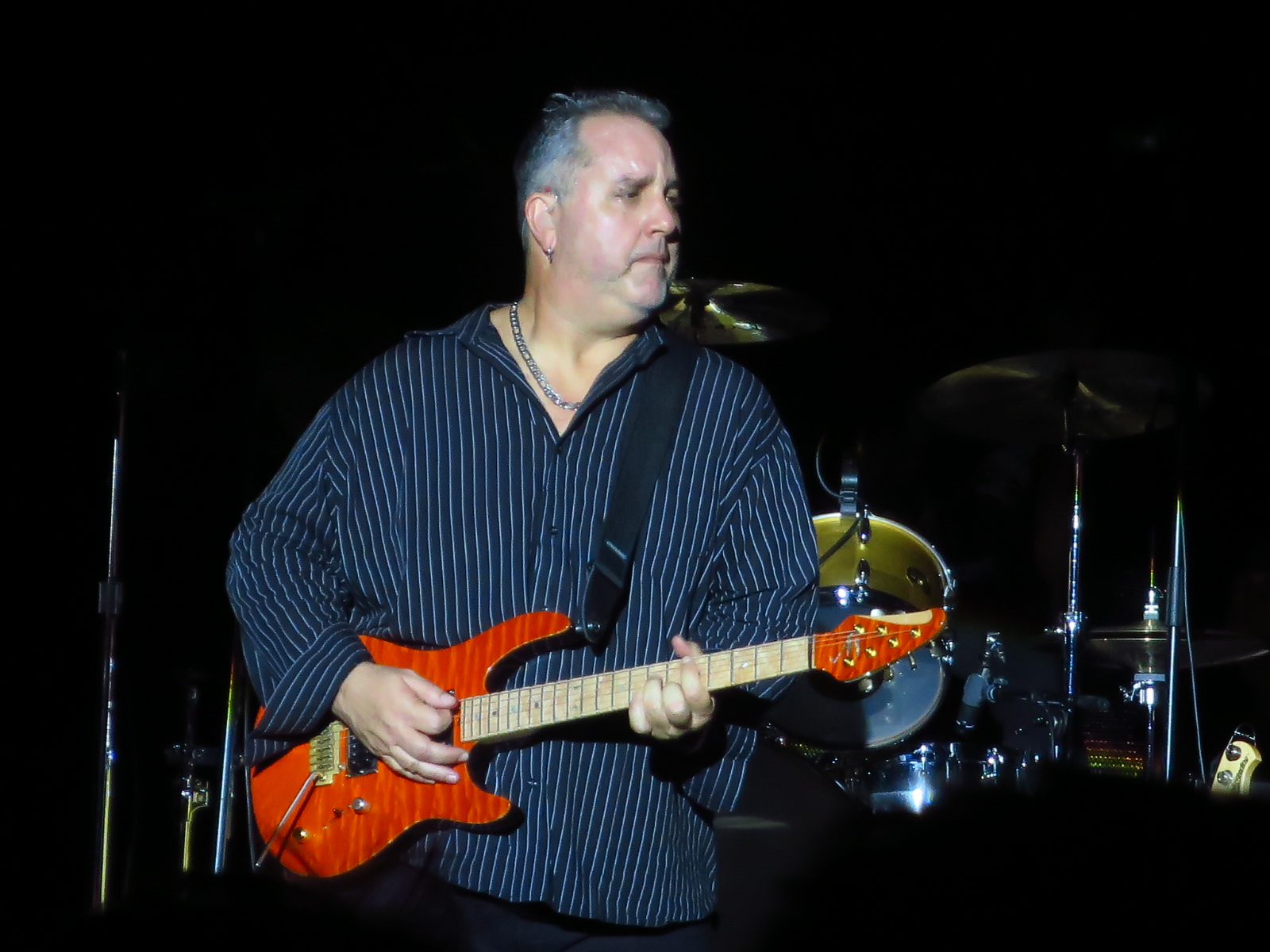 |
| Santana #63. Tommy Anthony (rhythm g) Unknown Date |
|
|
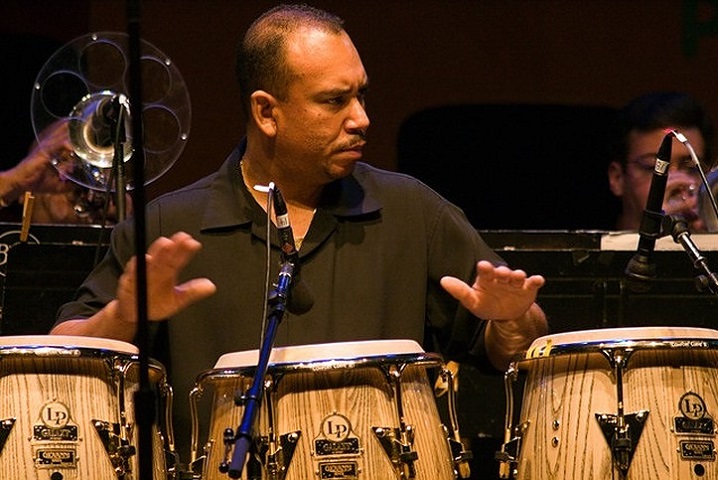 |
| Santana #63. Bobby Allende (perc/vo) Unknown Date |
|
|
|
|
|
Carlos Santana/Herbie Hancock/Wayne Shorter Band: July 2005
Carlos Santana (g/perc/vo), Herbie Hancock (kbd), Wayne Shorter (sax), Benny Rietveld (b), Dennis Chambers (ds), Karl Perazzo (perc/vo), Chester Thompson (kbd/vo), Andy Vargas (vo), Jeff Cressman (tb), William Ortiz (tp), Tommy Anthony (rhythm g), Lionel Loueke (g/vo)
|
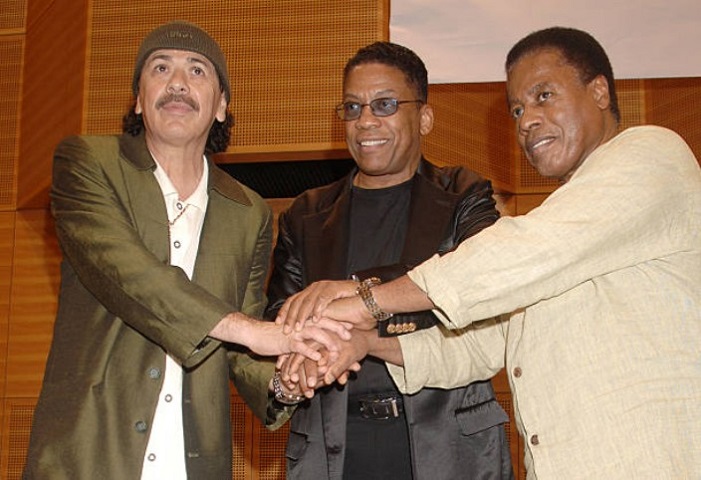 |
| (left to right) Carlos Santana, Herbie Hancock, Wayne Shorter. Min-On Culture Center, Tokyo, Japan July 26, 2005 © Jun Sato |
|
|
|
|
|
Santana #64: Aug 2005
(left to right) Carlos Santana (g/perc/vo), Jeff Cressman (tb), Benny Rietveld (b), Andy Vargas (vo), William Ortiz (tp), Dennis Chambers (ds), Tommy Anthony (rhythm g), Karl Perazzo (perc/vo), Raul Rekow (perc/vo), Chester Thompson (kbd/vo)
Raul Rekow returns to the band. Jeff Cressman, William Ortiz are not present for the 2005 "All That I Am" European Promotional Tour.
|
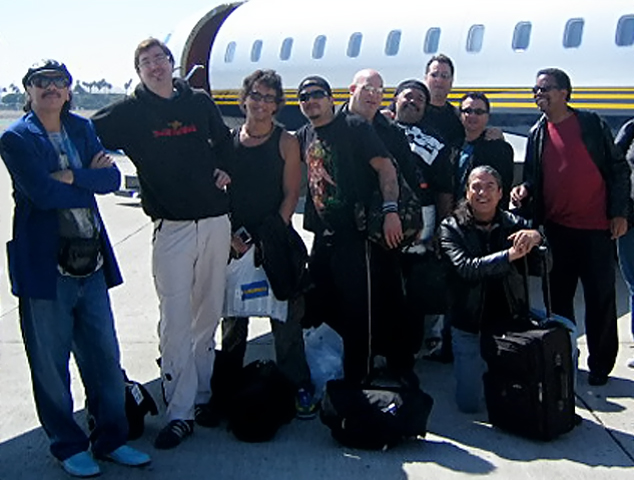 |
| Santana #64 |
|
|
|
|
|
Santana #65: Sept 2007
Carlos Santana (g/perc/vo), Benny Rietveld (b), Dennis Chambers (ds), Raul Rekow (perc/vo), Karl Perazzo (perc/vo), Chester Thompson (kbd/vo), Tony Lindsay (vo), Andy Vargas (vo), Jeff Cressman (tb), William Ortiz (tp), Tommy Anthony (rhythm g)
Tony Lindsay returns to the band.
|
|
|
|
Santana #66: July 2009
Carlos Santana (g/perc/vo), Benny Rietveld (b), Dennis Chambers (ds), Raul Rekow (perc/vo), Karl Perazzo (perc/vo), Freddie Ravel (kbd/vo), Tony Lindsay (vo), Andy Vargas (vo), Jeff Cressman (tb), William Ortiz (tp), Tommy Anthony (rhythm g)
Chester Thompson is replaced by Freddie Ravel.
Quote from Carlos Santana (The Universal Tone 2014): We pulled away from jams, and Chester and I didn’t write as much as before. CT stayed with us until 2009, but I think his desire to leave started with the Supernatural tours and the changes we were going through. (p471)
|
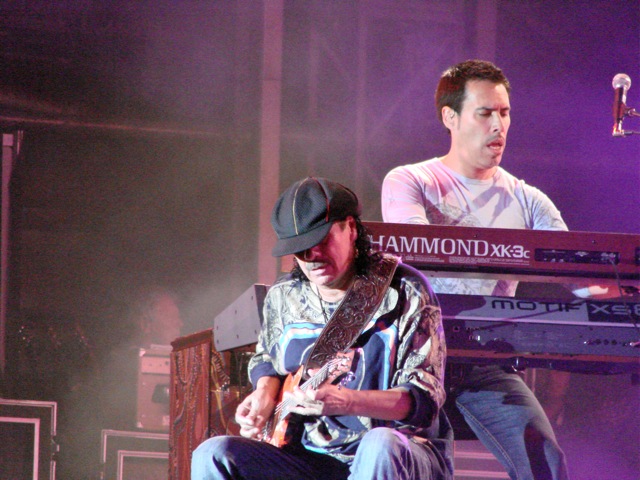 |
| Santana #66. (left to right) Carlos Santana (g/perc/vo), Freddie Ravel (kbd/vo) Unknown Date |
|
|
|
|
|
Santana #67: Aug 2010
(left to right) Karl Perazzo (perc/vo), Benny Rietveld (b), William Ortiz (tp), Raul Rekow (perc/vo), Andy Vargas (vo), Carlos Santana (g/perc/vo), Dennis Chambers (ds), David K. Mathews (kbd/vo), Jeff Cressman (tb), Tony Lindsay (vo), Tommy Anthony (rhythm g)
Freddie Ravel is replaced by David K. Matthews. Raul Rekow is not present for the end of the 2011 "Sound Of Collective Consciousness" American/Canadian/Mexican Tour (last show played on Sept 7, 2011). Raul Rekow is not present for the end of the 2013 "Sentient" European Tour (last show played on July 19, 2013).
|
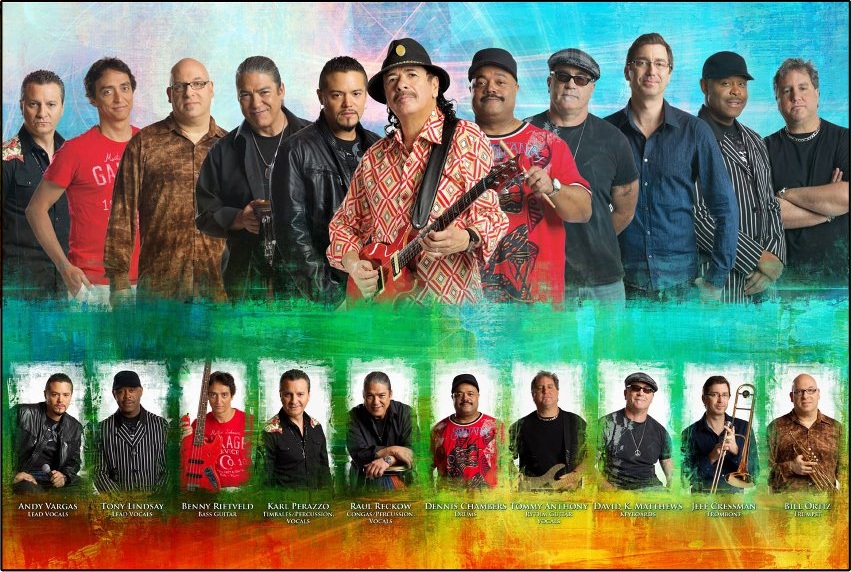 |
| Santana #67. April 26, 2011 © Erik Kabik |
|
|
|
|
|
Santana #68: Sept 2013
Carlos Santana (g/perc/vo), Benny Rietveld (b), Dennis Chambers (ds), Paoli Mejias Ramos (perc/vo), Karl Perazzo (perc/vo), David K. Mathews (kbd/vo), Tony Lindsay (vo), Andy Vargas (vo), Jeff Cressman (tb), William Ortiz (tp), Tommy Anthony (rhythm g)
Raul Rekow is replaced by Paoli Mejias Ramos.
|
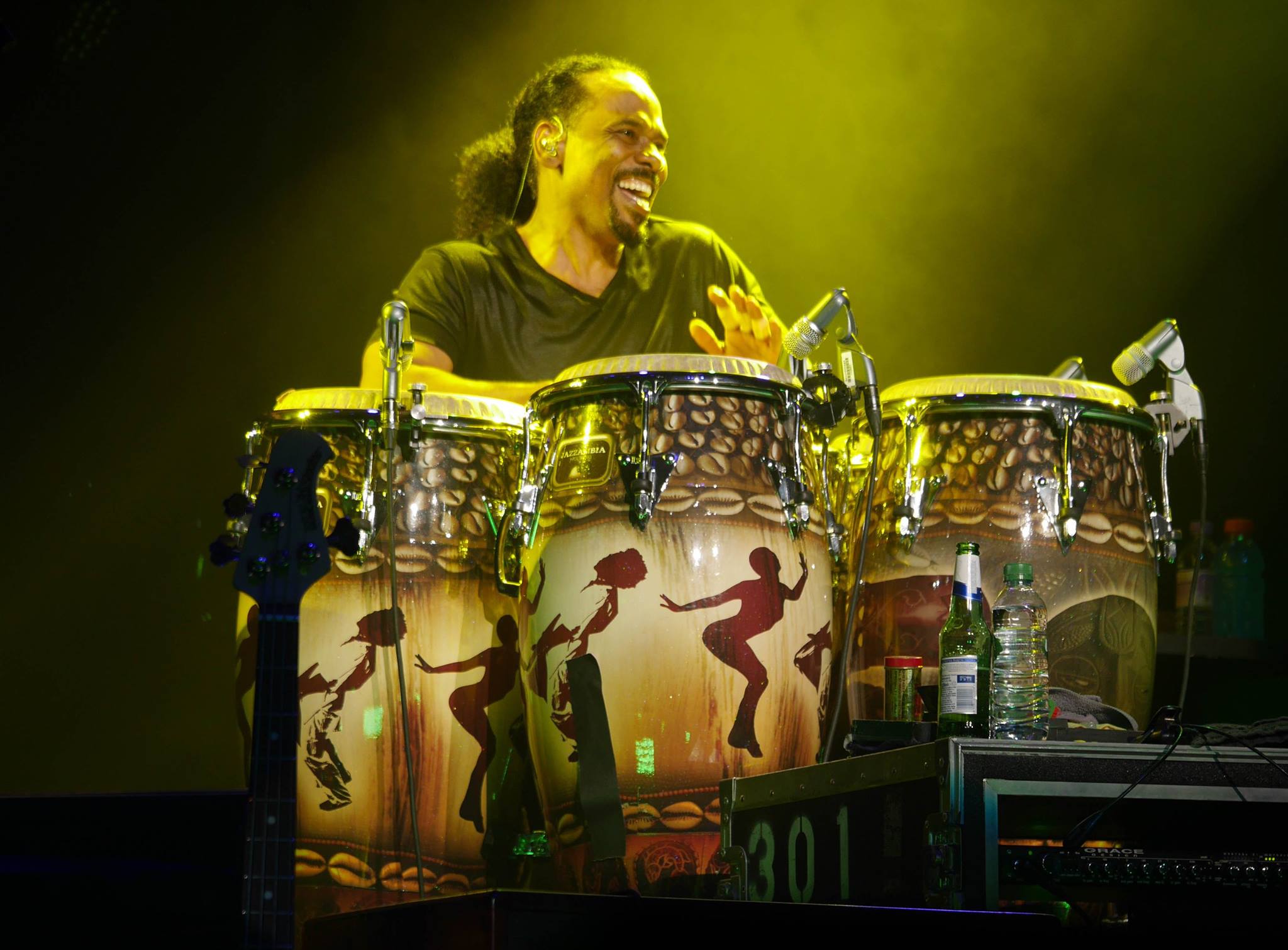 |
| Santana #68. Paoli Mejias Ramos (perc/vo) Unknown Date |
|
|
|
|
|
Santana #69: Nov 2013
Carlos Santana (g/perc/vo), Benny Rietveld (b), Jose Pepe Jimenez (ds), Paoli Mejias Ramos (perc/vo), Karl Perazzo (perc/vo), David K. Mathews (kbd/vo), Tony Lindsay (vo), Andy Vargas (vo), Jeff Cressman (tb), William Ortiz (tp), Tommy Anthony (rhythm g)
Drummer Dennis Chambers is momentarily replaced by Walfredo De Los Reyes (ds) for the beginning of the “Intimate Evening With Santana. Greatest Hits Live Yesterday, Today & Tomorrow” 7th leg (first 4 shows). Jose Pepe Jimenez (ds) first show with the band is on Nov 13, 2013. Carlos Santana’s wife drummer Cindy Blackman-Santana joins the band momentarily for the March 2015 "Corazon" American/Mexican Tour (15 shows).
|
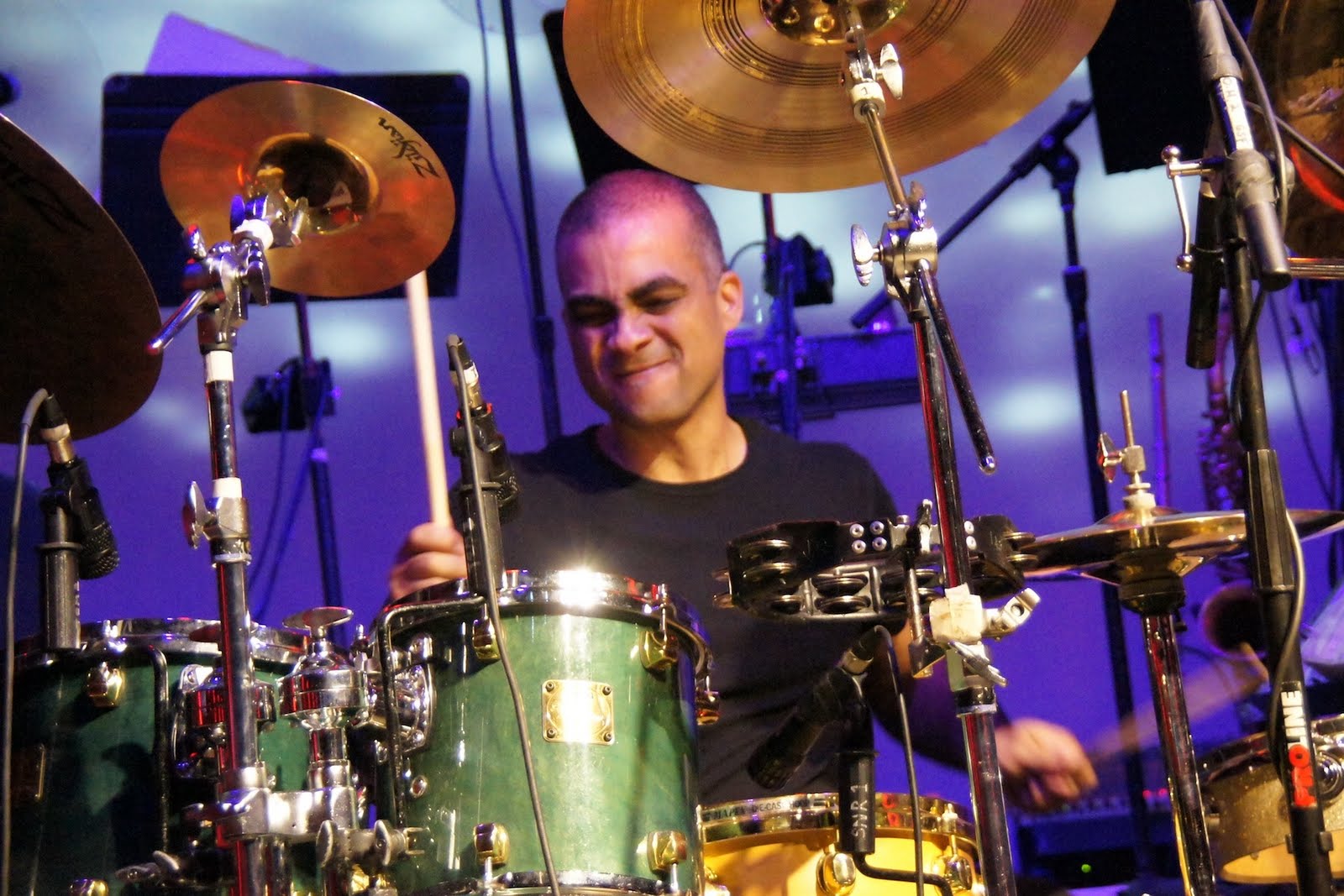 |
| Santana #69. Jose Pepe Jimenez (ds) Unknown Date |
|
|
|
|
|
Santana #70: Jan 2016
Carlos Santana (g/perc/vo), Benny Rietveld (b), Cindy Blackman-Santana (ds), Paoli Mejias Ramos (perc/vo), Karl Perazzo (perc/vo), David K. Mathews (kbd/vo), Andy Vargas (vo), Jeff Cressman (tb), William Ortiz (tp), Tommy Anthony (rhythm g)
Jose Pepe Jimenez is replaced by Cindy Blackman-Santana. After Tony Lindsay’s departure, Andy Vargas becomes the only vocalist of the band.
|
 |
| Santana #70. Cindy Blackman-Santana (ds) Unknown Date |
|
|
|
|
|
Santana #71: Feb 2016
Carlos Santana (g/perc/vo), Benny Rietveld (b), Cindy Blackman-Santana (ds), Paoli Mejias Ramos (perc/vo), Karl Perazzo (perc/vo), David K. Mathews (kbd/vo), Ray Greene (vo/tb), Andy Vargas (vo), Jeff Cressman (tb), William Ortiz (tp), Tommy Anthony (rhythm g)
A second vocalist joins the band, Ray Greene.
|
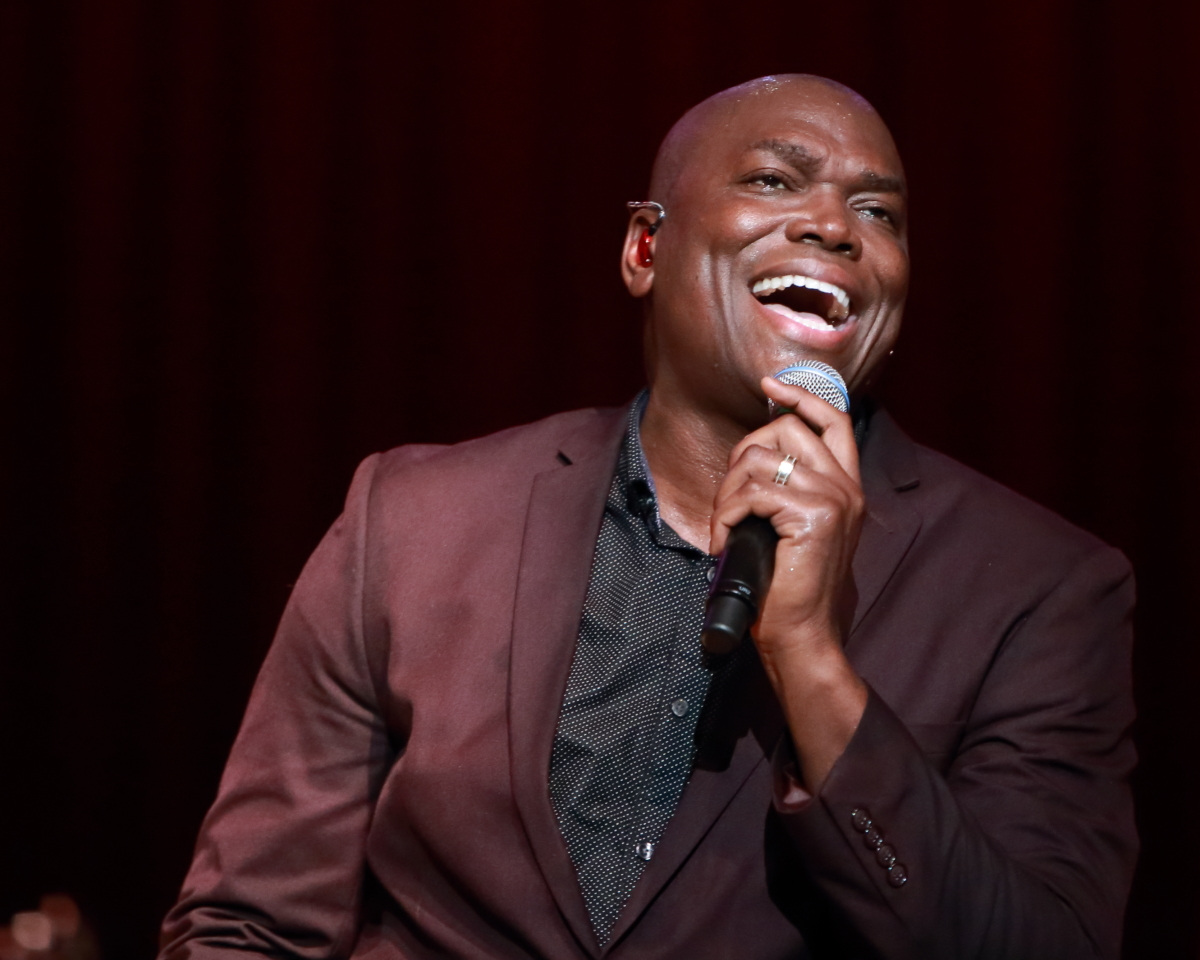 |
| Santana #71. Ray Greene (vo/tb) Unknown Date |
|
|
|
|
|
"Santana IV" Reunion Band ("Santana IV" Recording Band): March 2016
(left to right ✔) Gregg Rolie (kbd/vo), Michael Carabello (perc), Carlos Santana (g/perc/vo), Neal Schon (g), Michael Shrieve (ds)
Re-incarnation of the 1970 Santana #6 Band without David Brown (b) and Jose “Chepito” Areas (perc). In 2015, this band records the album "Santana IV" (released on April 15, 2016) with Benny Rietveld (b) and Karl Perazzo (perc/vo).
|
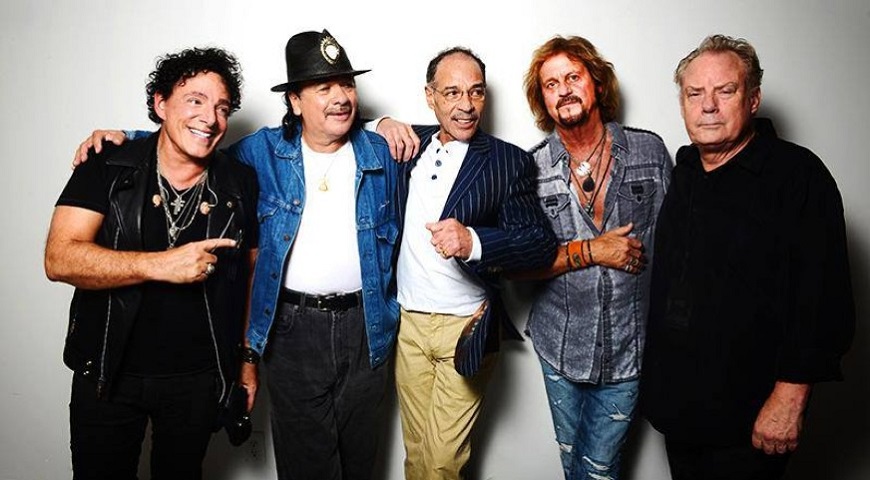 |
| Future "Santana IV" Reunion Band Meeting. Pearl Concert Theatre At Palms Casino Resort, Las Vegas, NV Aug 28, 2013 |
|
|
 |
| ✔ "Santana IV" Reunion Band © Maryanne Bilham |
|
|
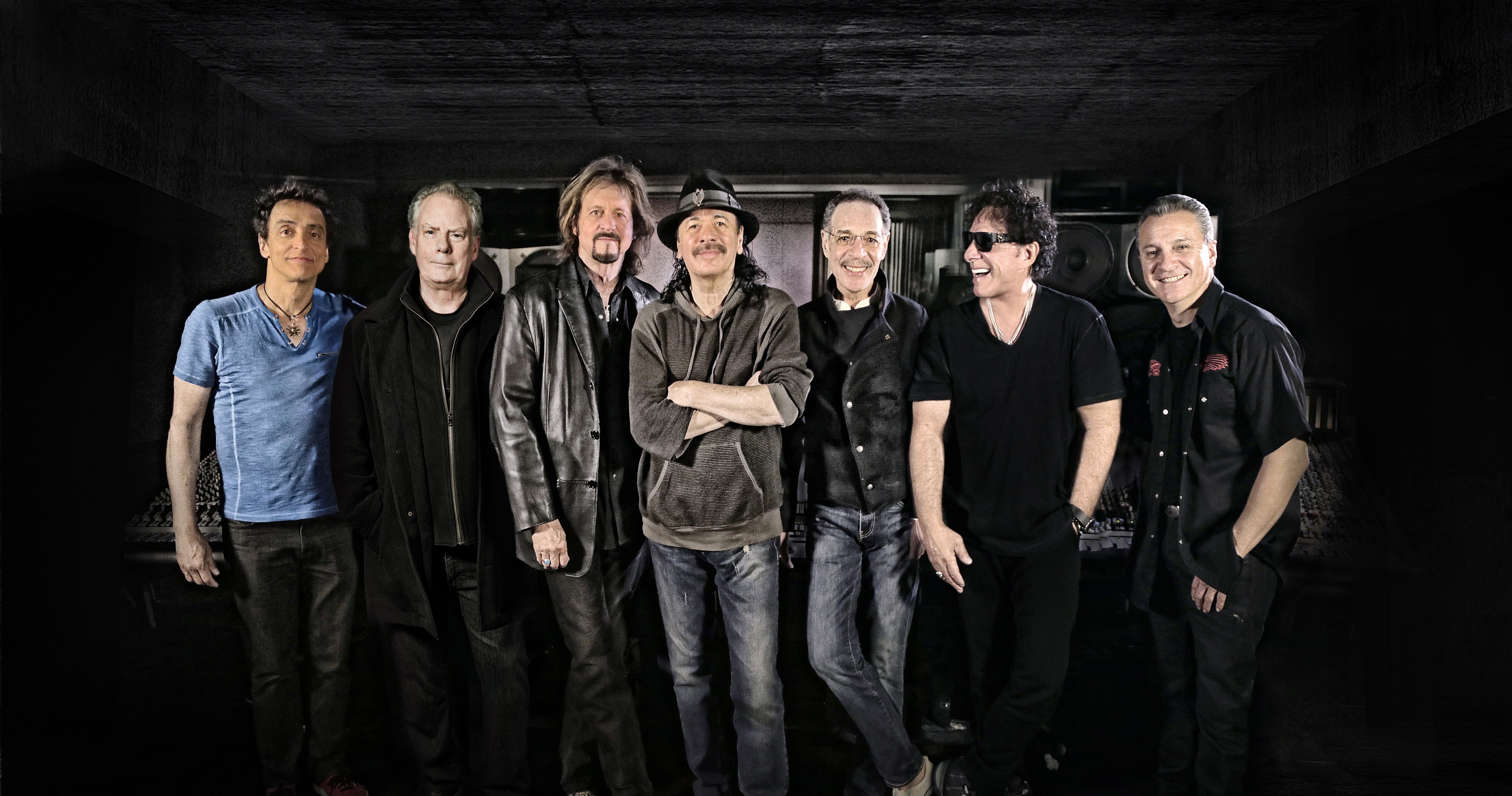 |
| "Santana IV" Recording Band with Benny Rietveld (b) and Karl Perazzo (perc/vo) |
|
|
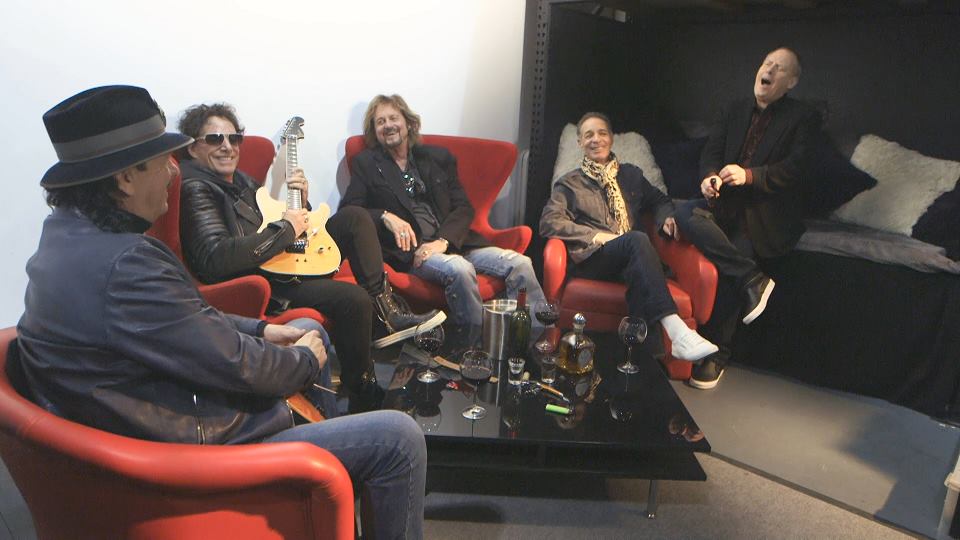 |
| "Santana IV" Reunion Band |
|
|
|
|
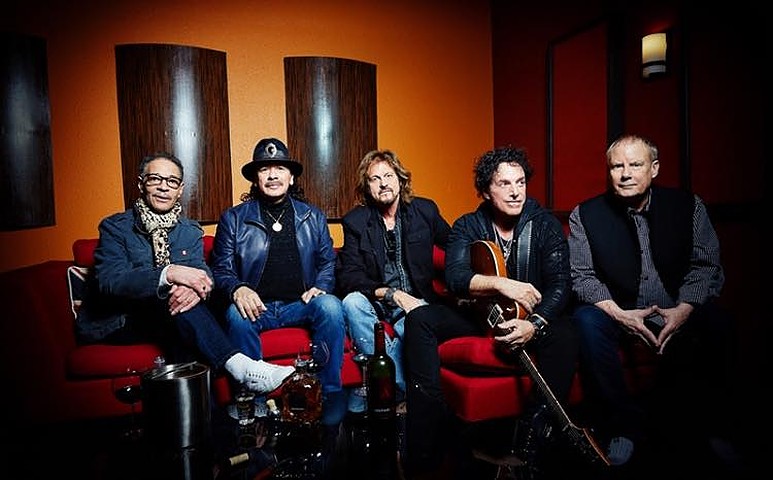 |
| "Santana IV" Reunion Band |
|
|
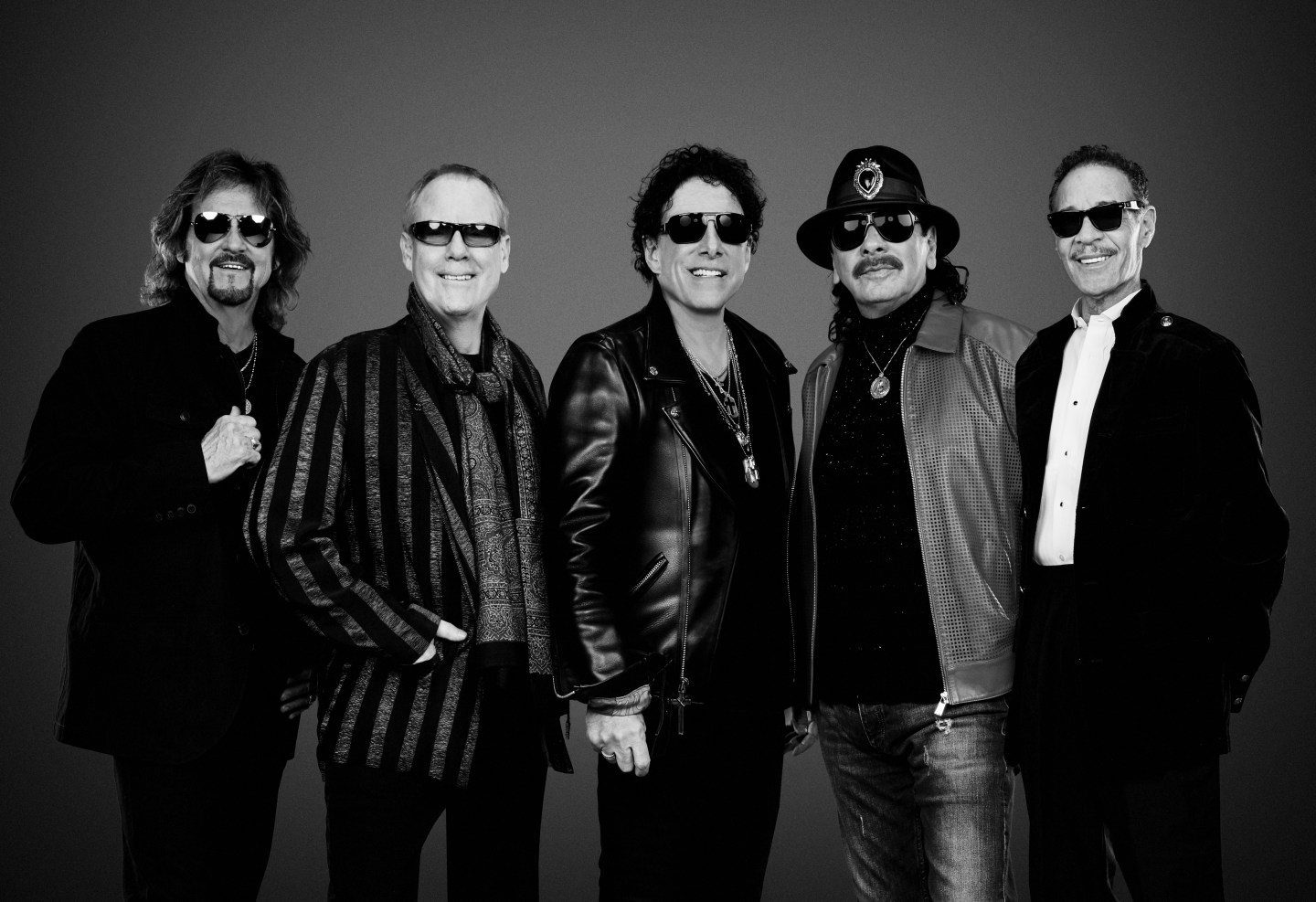 |
| "Santana IV" Reunion Band |
|
|
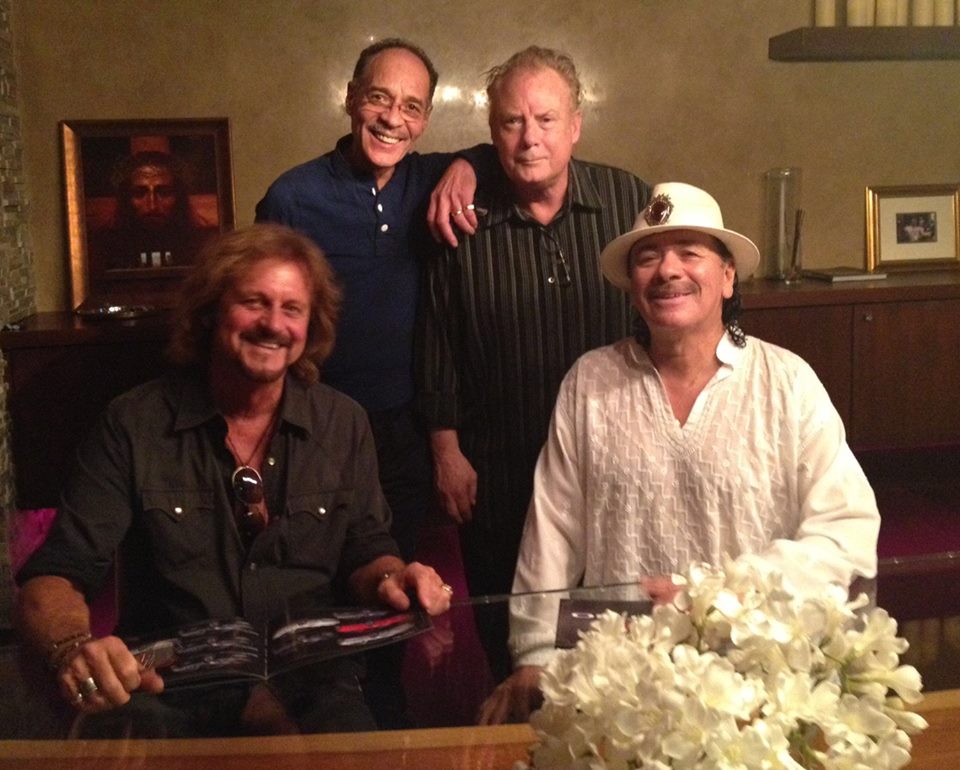 |
| "Santana IV" Reunion Band. Neal Schon (g) not pictured |
|
|
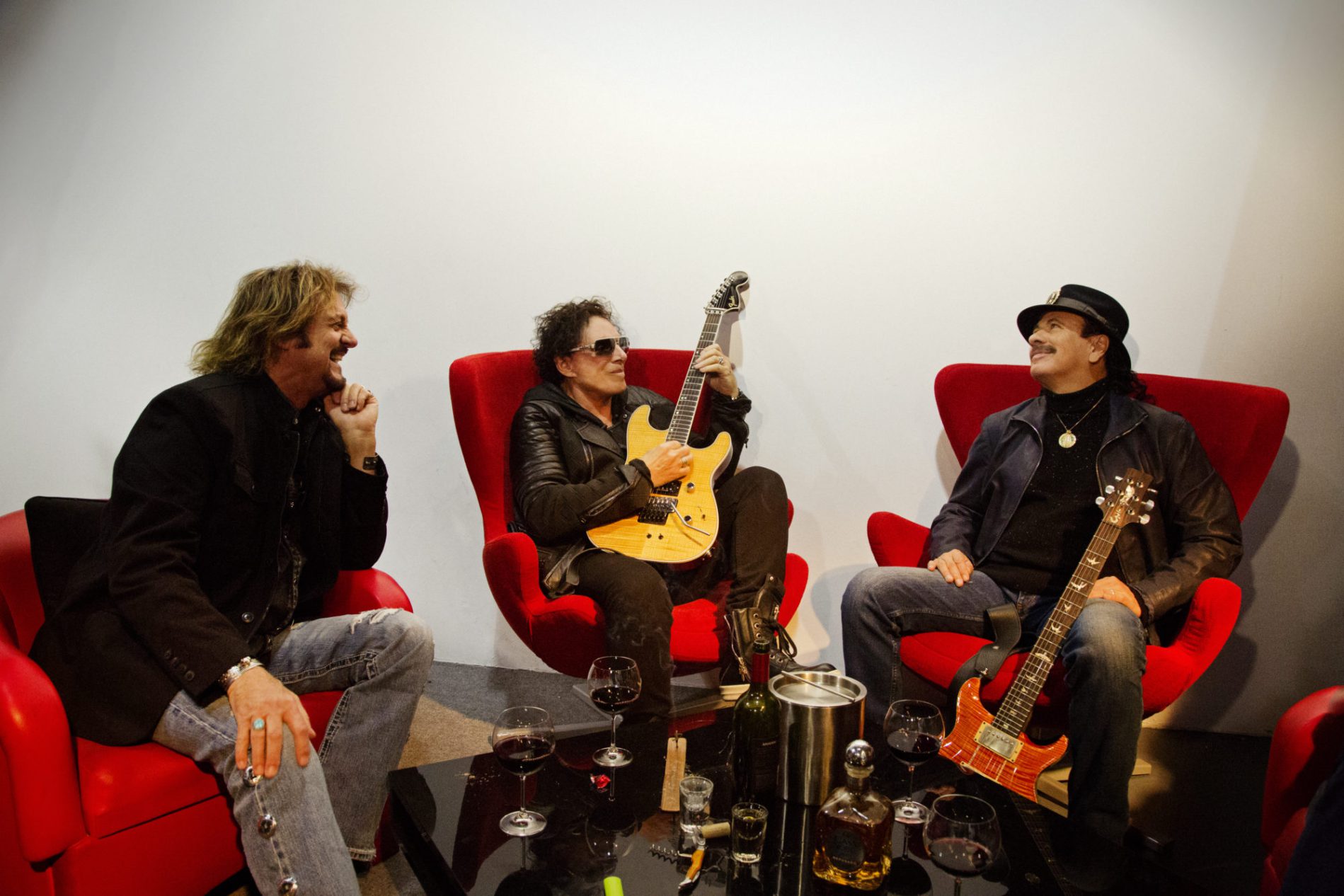 |
| "Santana IV" Reunion Band. Michael Carabello (perc), Michael Shrieve (ds) not pictured |
|
|
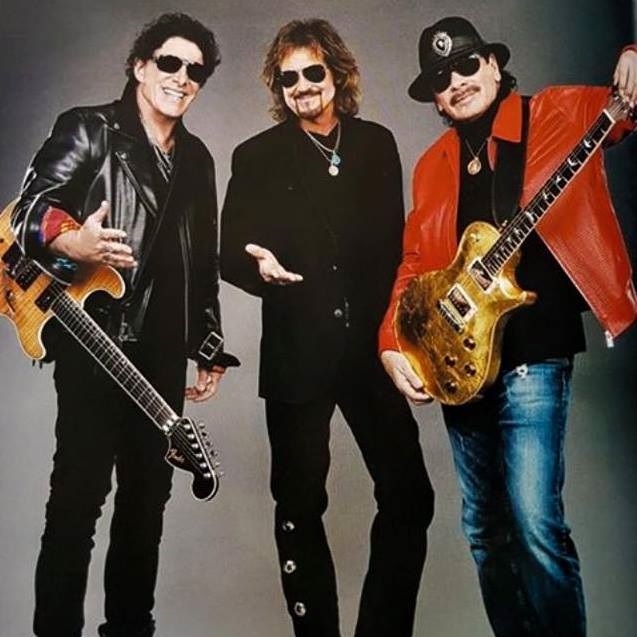 |
| "Santana IV" Reunion Band. Michael Carabello (perc), Michael Shrieve (ds) not pictured |
|
|
|
|
|
Santana #72: July 2016
(left to right ✔) Chad Wilson (Santana Management), Sean Guthrie (bodyguard), Karl Perazzo (perc/vo), ?, ? (pilot), ? (pilot), Cindy Blackman-Santana (ds), Carlos Santana (g/perc/vo), ?, Tommy Anthony (rhythm g), Benny Rietveld (b), Ray Greene (vo, tb), Paoli Mejias Ramos (perc/vo), David K. Mathews (kbd/vo), ?, Andy Vargas (vo)
Note: Ray Greene is not present in 2021 (last show on Feb 1, 2020, and comeback on Jan 26, 2022).
|
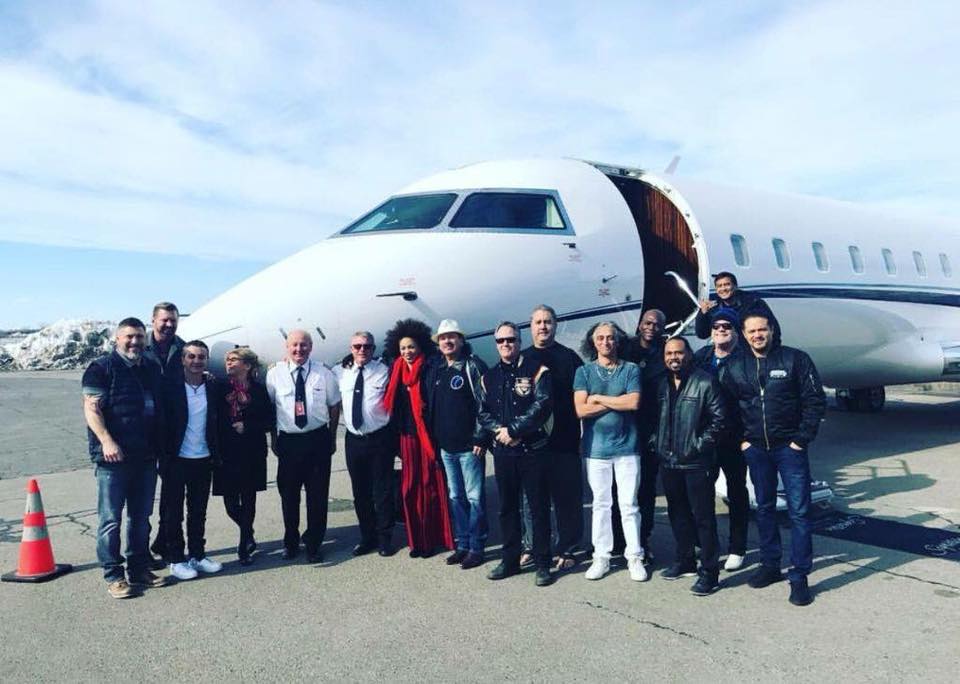 |
| ✔ Santana #72 |
|
|
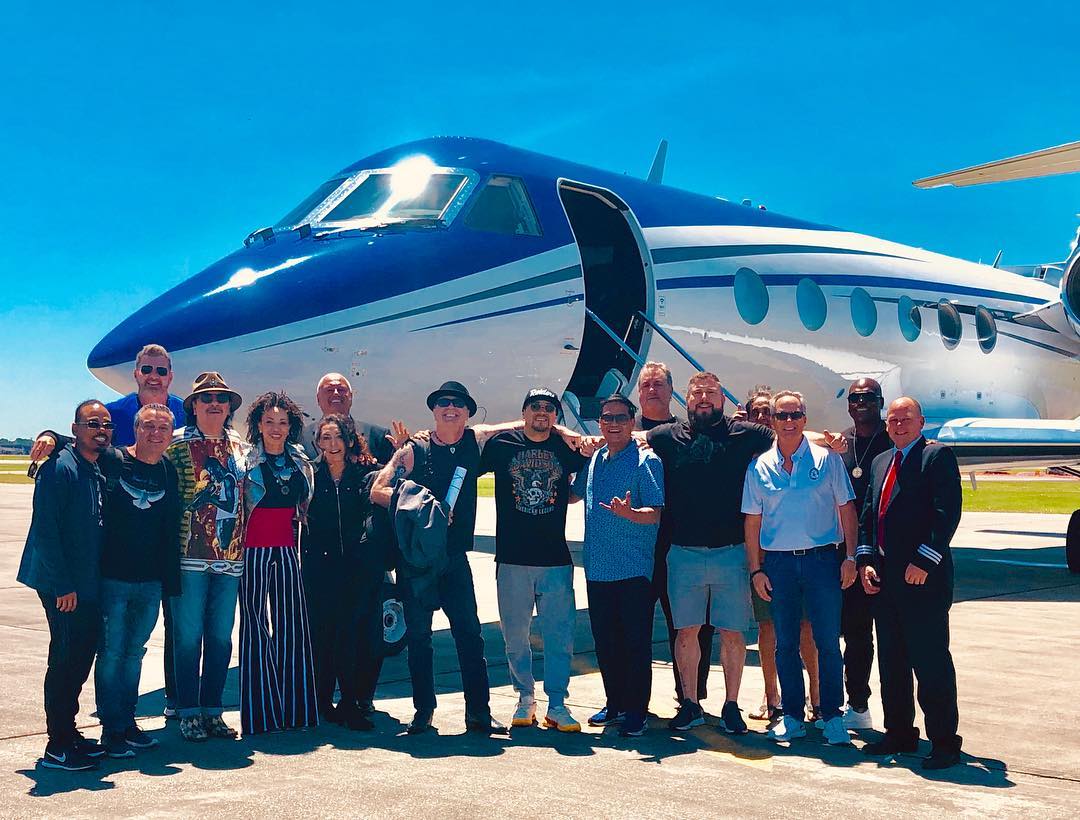 |
| Santana #72. New Orleans, LA April 27, 2019 |
|
|
 |
| Santana #72. Tampa, FL Aug 28, 2022 |
|
|
|
|
|
"From the mellow hills of San Francisco, please welcome... SANTANA!"
Bill Graham
This project is dedicated to the memory of Michel Delorme and Carl Kunstorff.
© 1999 Santanamigos
|
|
|
|



























